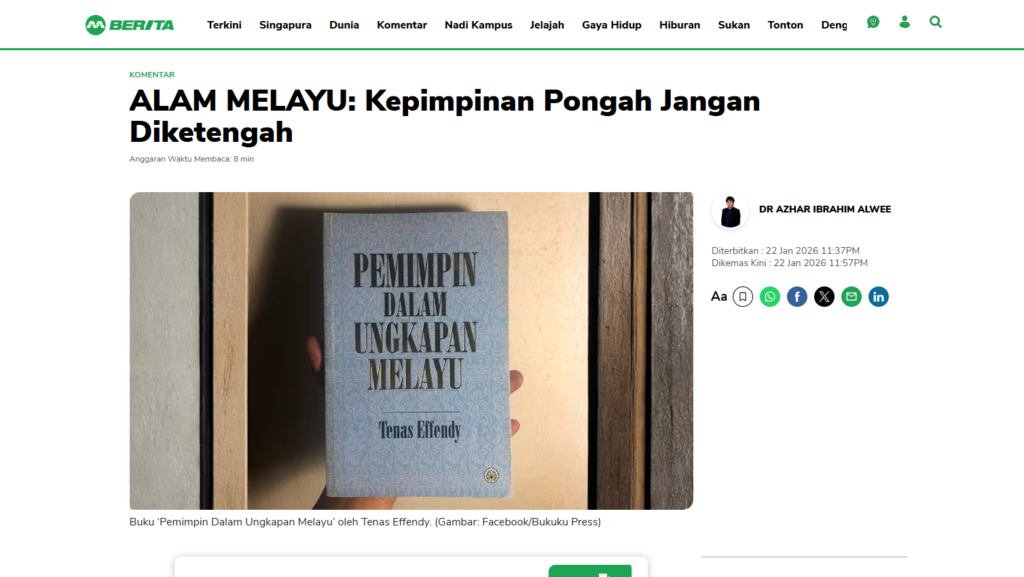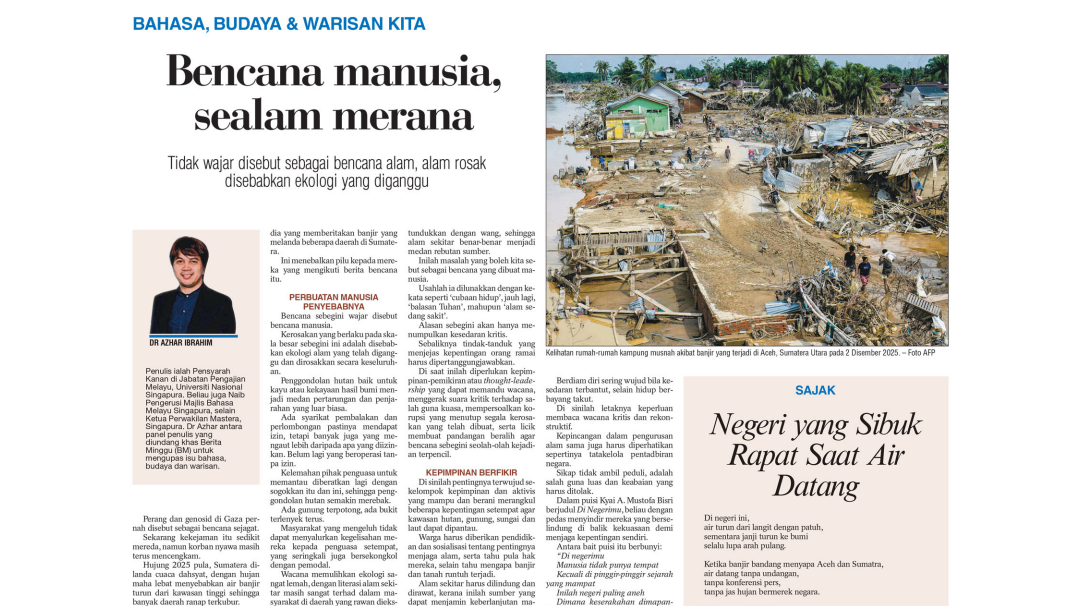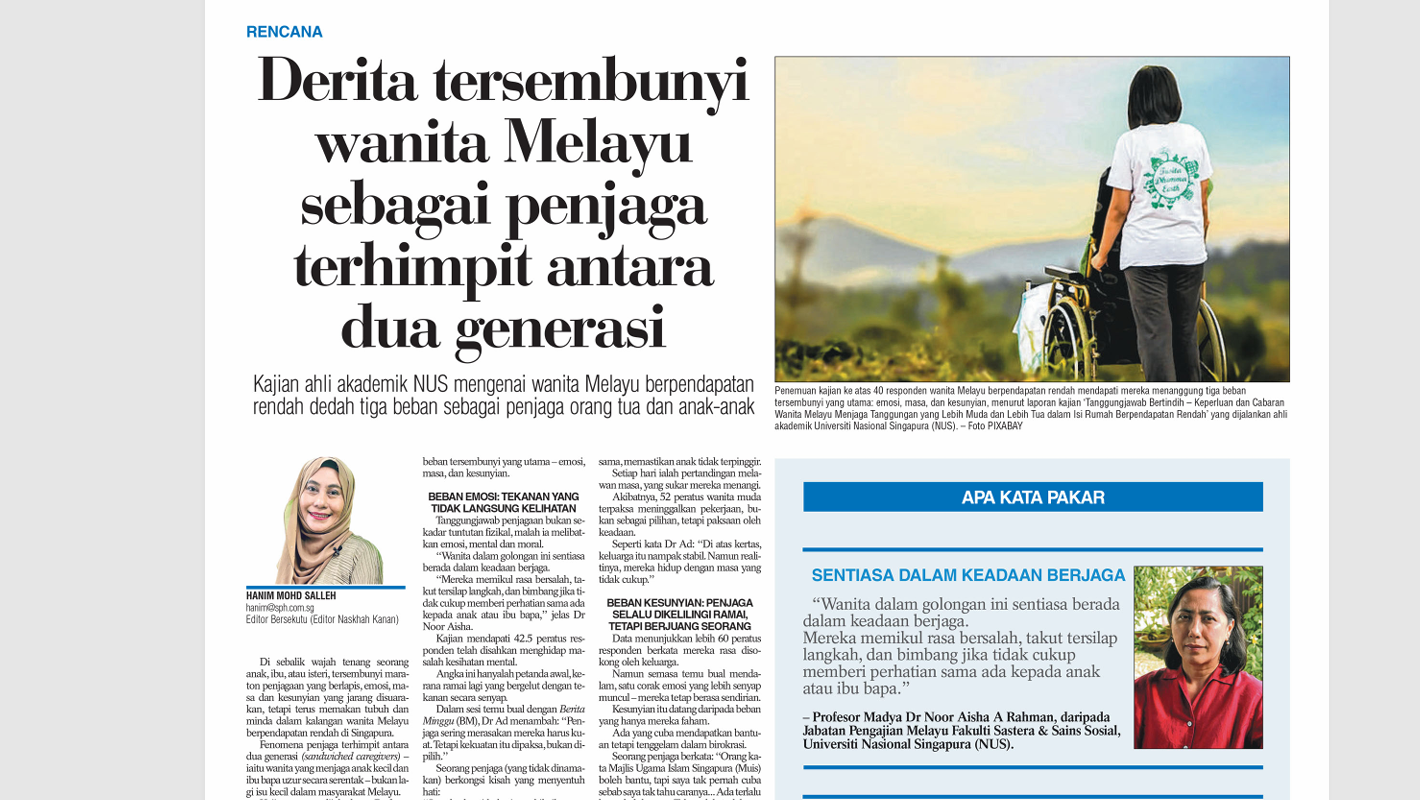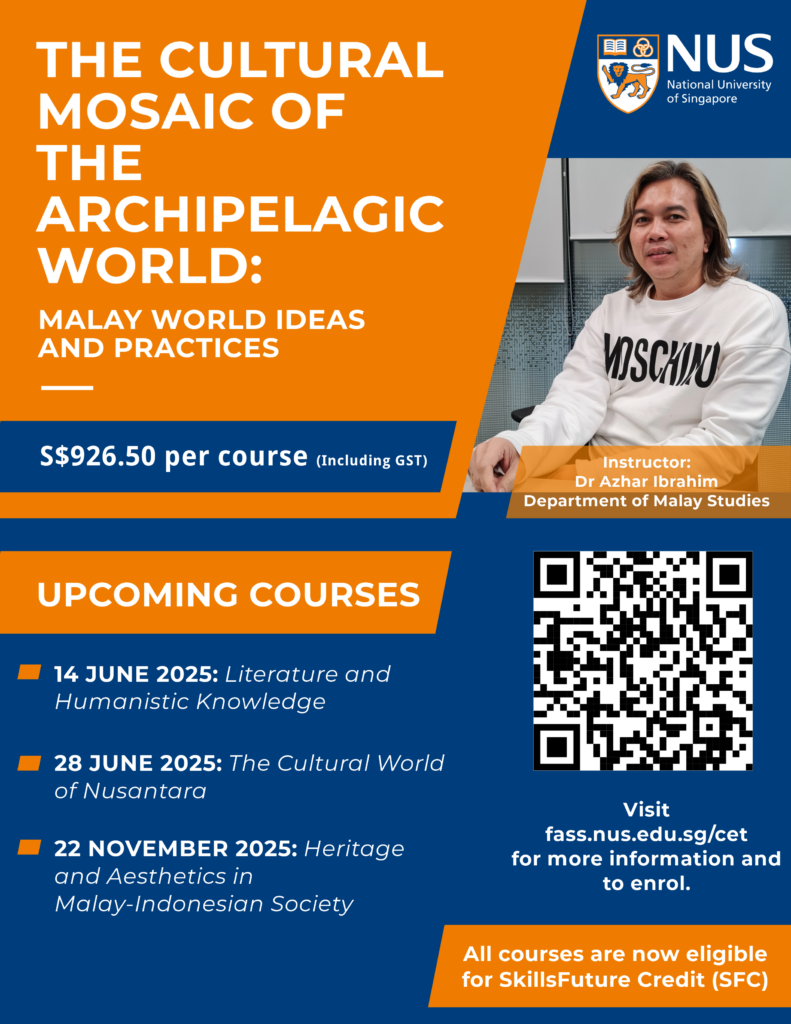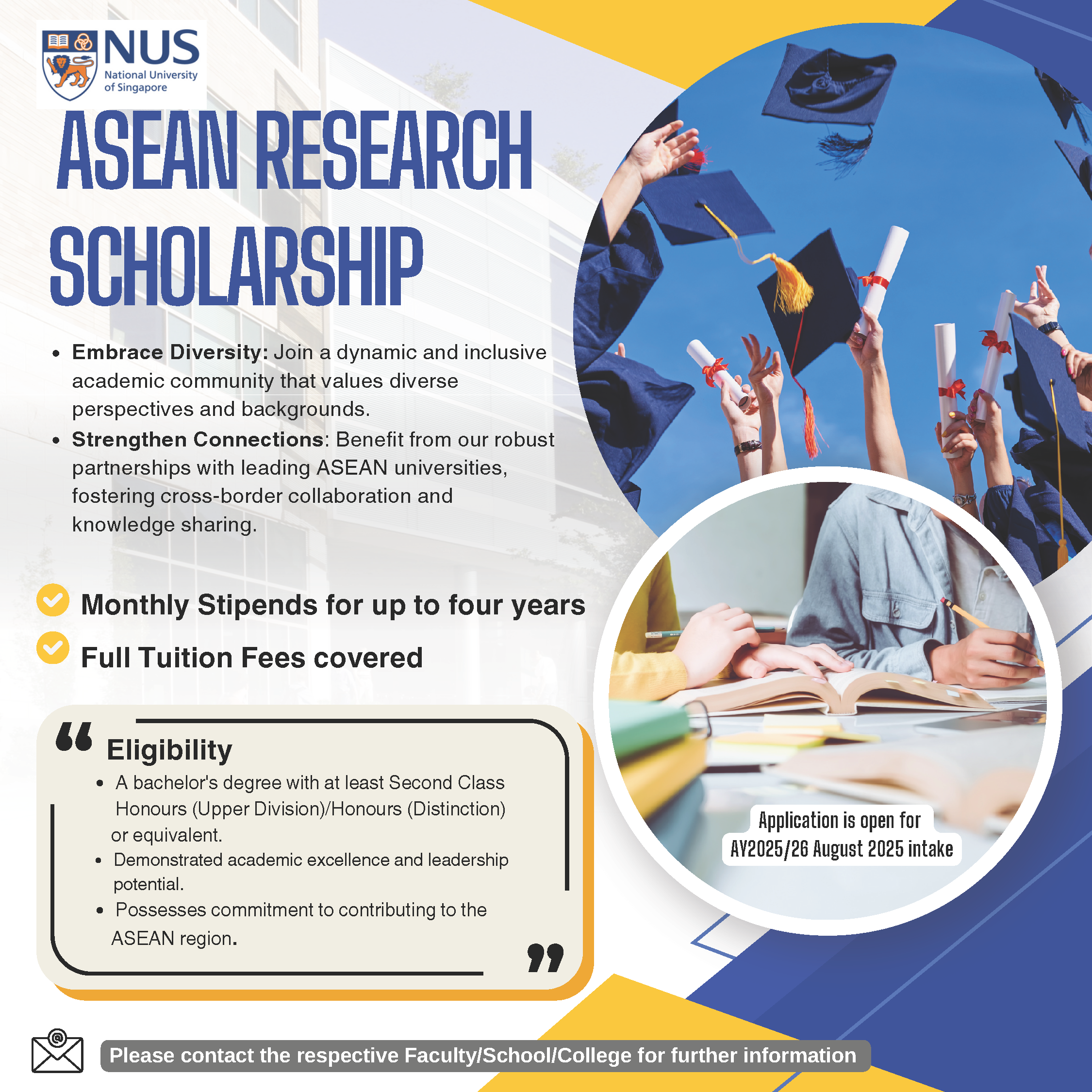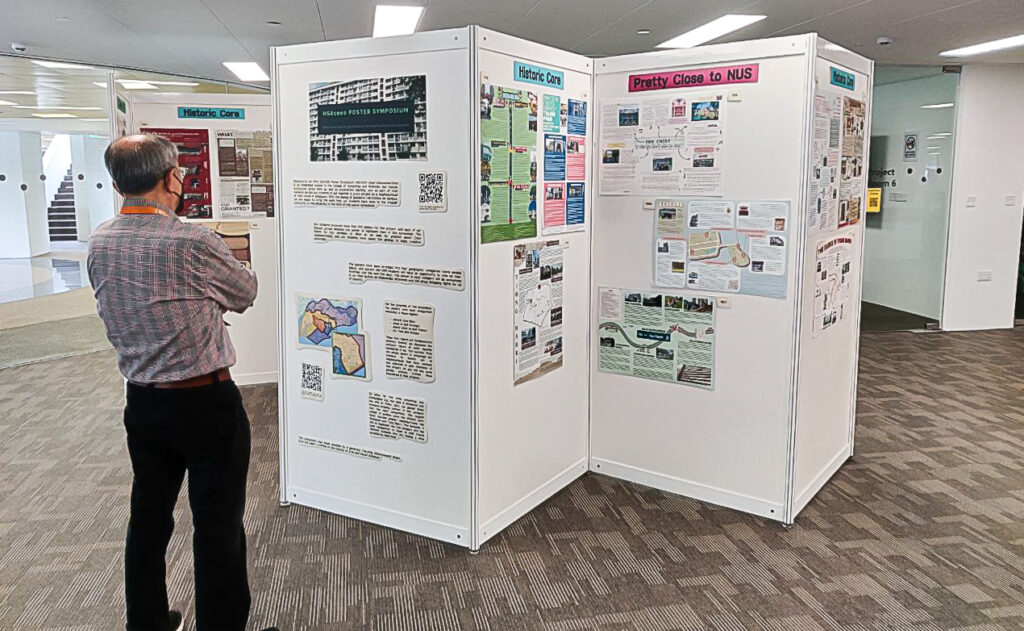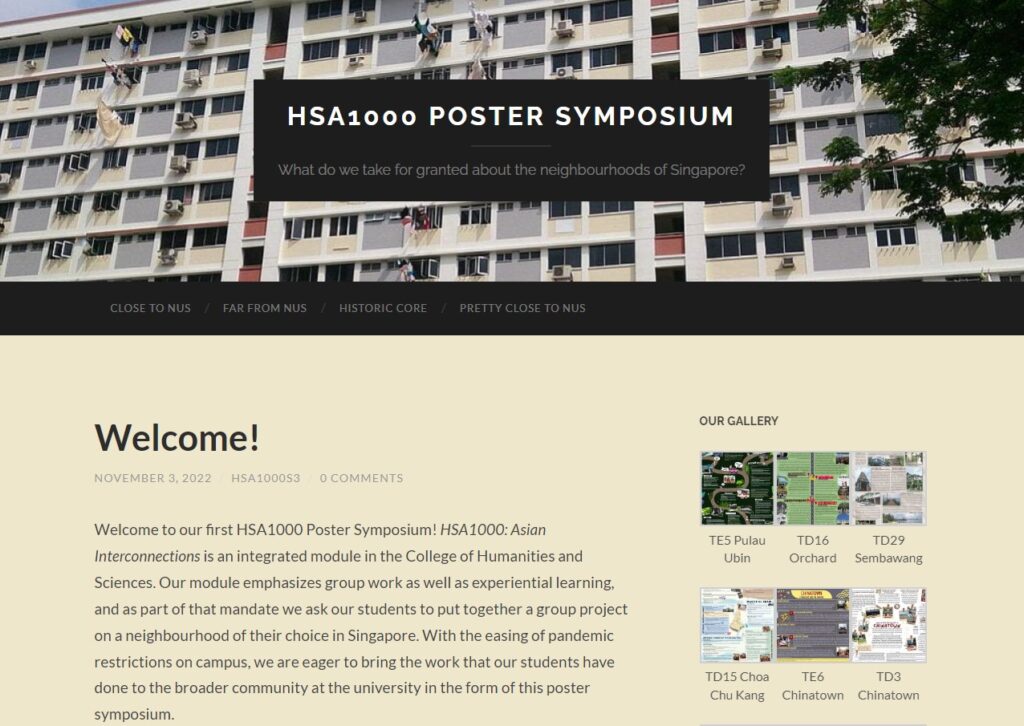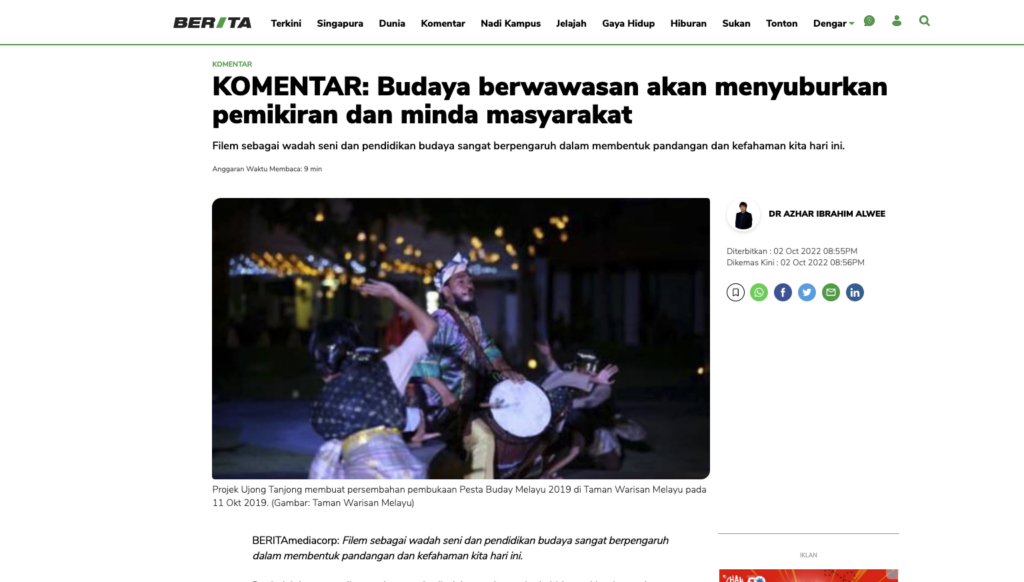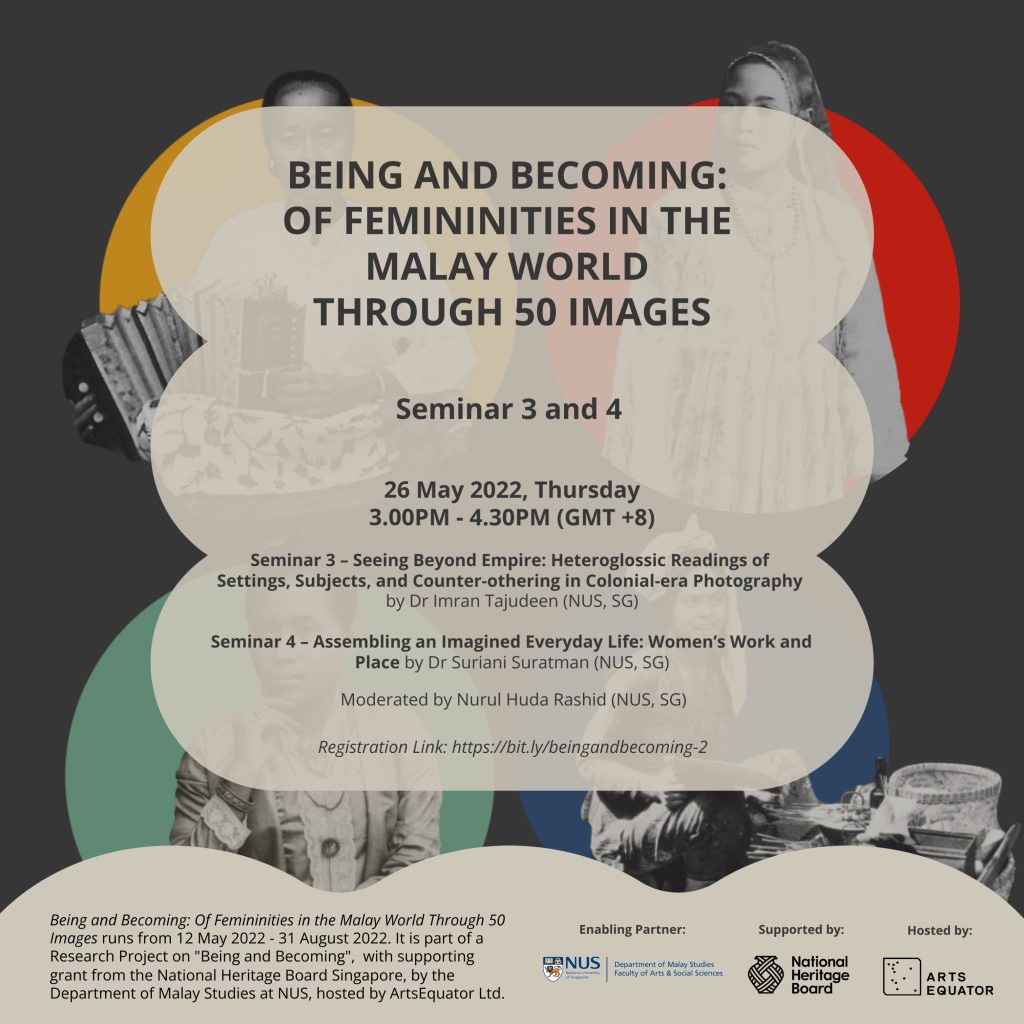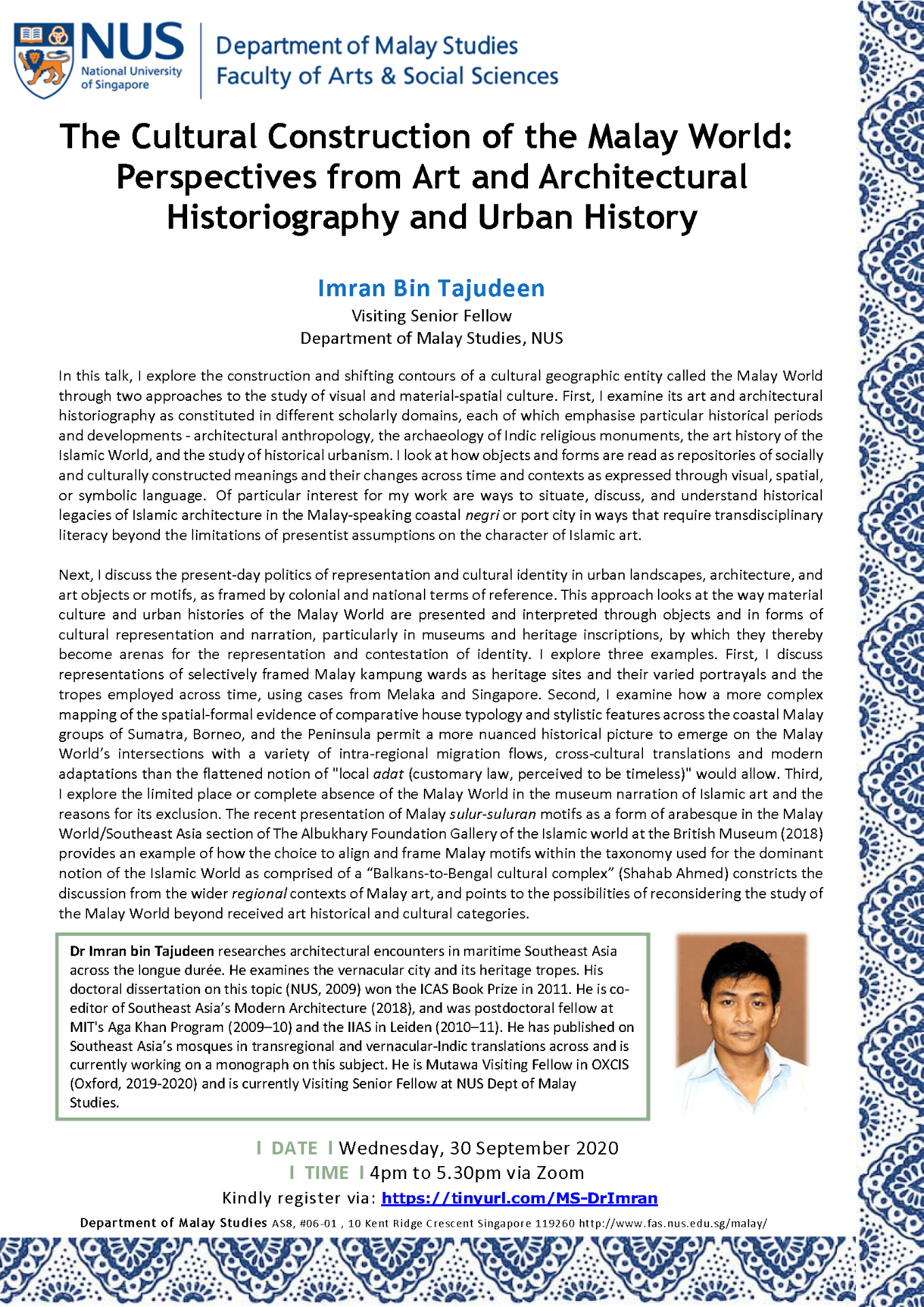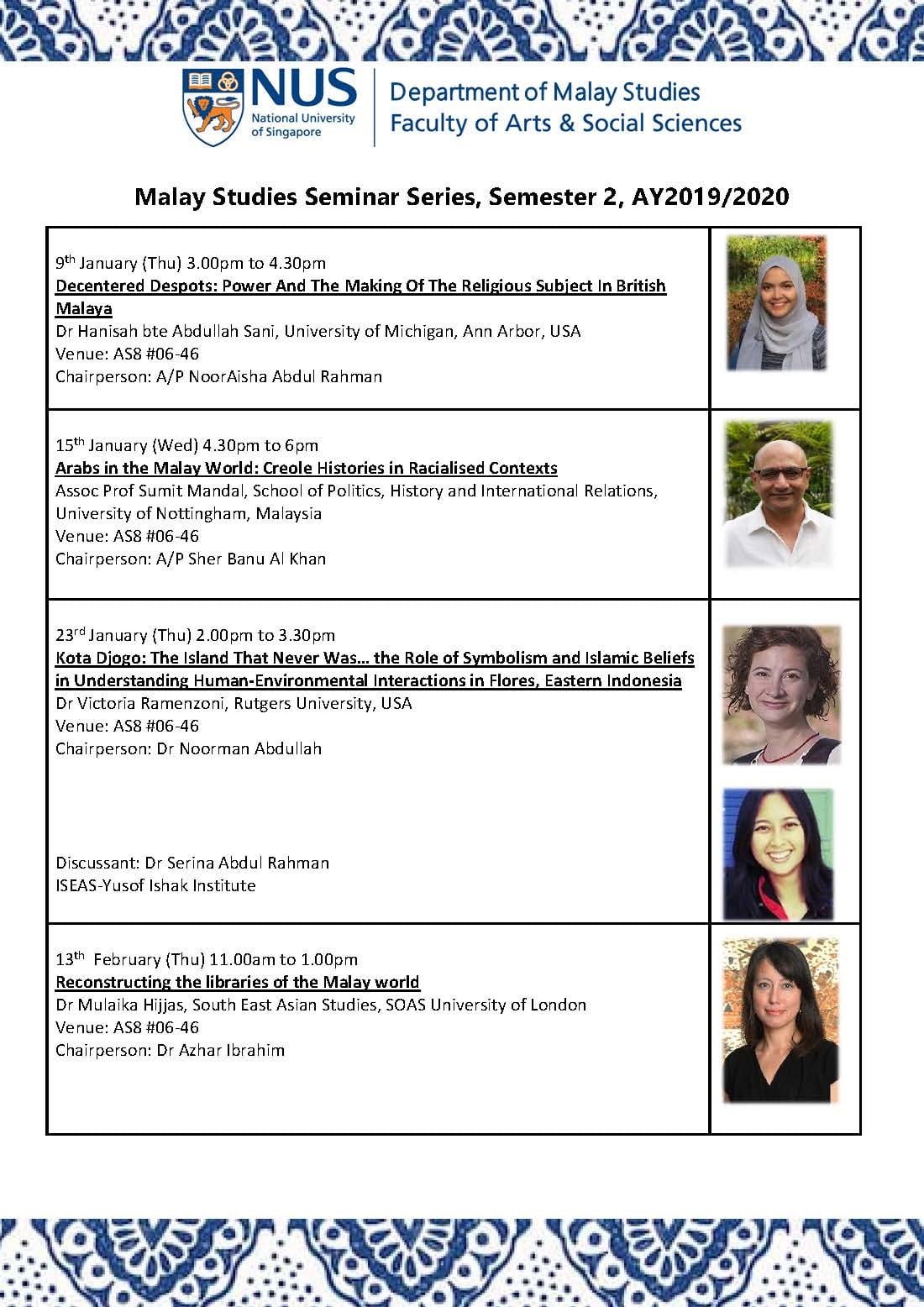News and Postings
Arrogant leadership should not be promoted
Click through image below to read this piece.
This story first appeared in Suria News Online and on NUSNews on 22 January 2026.
The flower of language blooms with human care
Click through image below to read this piece.
This story first appeared in Berita Minggu and on NUSNews on 11 January 2026.
Human calamity, a world in misery
Click through image below to read this piece.
This story first appeared in Berita Minggu and on NUSNews on 4 January 2026.
Hidden suffering of Malay women as caretakers caught between two generations
Click through image below to read this piece.
This story first appeared in Berita Minggu and on NUSNews on 4 January 2026.
It takes a “kampung”: Creating a sustainable ecosystem of care for everyone, by everyone
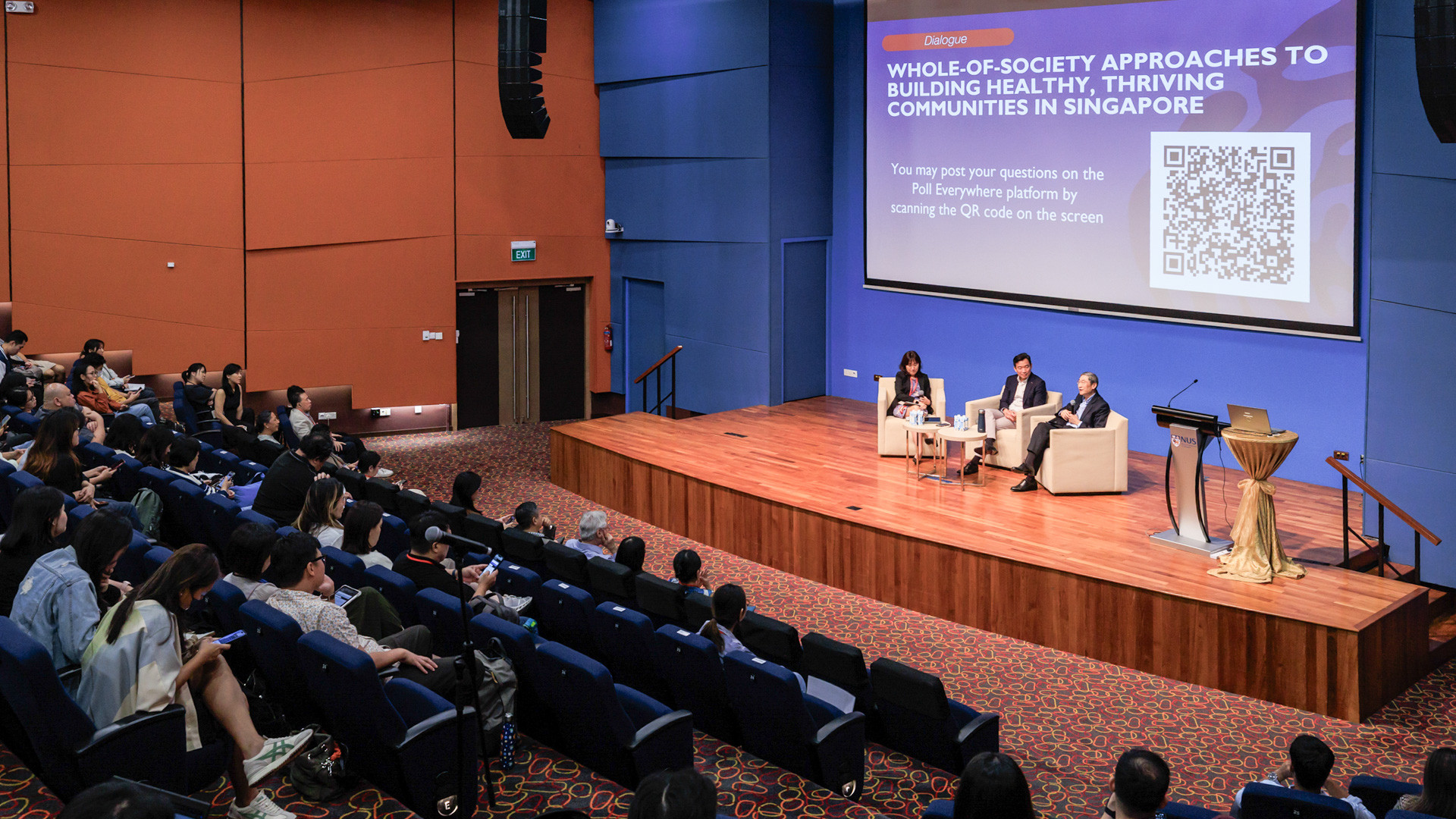
There was a time when neighbours in villages or kampungs kept an eye out for one another, shared food, and revelled in this shared sense of community and care.
As Singapore stands on the brink of becoming a "super-aged" society, with one in five citizens set to be over 65 by 2026, bringing back the kampung spirit, where everyone cares for everyone, might be the key to enabling healthy ageing here.
"This is neither a new formula for success, nor is there anything magical about it. I feel it is simply a resurrection or rejuvenation of our kampung spirit in action, where residents take ownership of their own health and look out for one another, alongside professionals and volunteers," said Mr Eric Chua, Senior Parliamentary Secretary for Social and Family Development, and for Law.
Speaking at the NUS SSR-TOUCH Conference, jointly organised by the NUS Social Service Research Centre (SSR) and TOUCH Community Services, Mr Chua said achieving positive health and well-being outcomes for all requires everyone's effort.
"Building a healthier Singapore that focuses on ageing well by going upstream, starting young, means all of us must pitch in: government, community organisations, family members, and individuals. We must all work together and play an active part in addressing social-health challenges," he added.
Themed "Sustained Well-Being in Future-Ready Communities", the conference, held on 11-12 November 2025, brought together about 300 participants from academia, research, practice, and policymaking. The goal was to advance dialogue and strengthen sectoral capabilities in social service research, evidence-to-practice translation, sustainable collaborations, and impact measurement.
Discussions focused on topics such as the use of technology and AI in social service planning and delivery, the importance of disability inclusion in building strong communities, and the challenges and opportunities for healthy longevity.
Strengthening the caregiving circle
One key focus of the NUS SSR-TOUCH Conference was supporting caregivers, an essential part of the kampung ecosystem. Grandparents, in particular, were highlighted as important caregivers in the family structure.
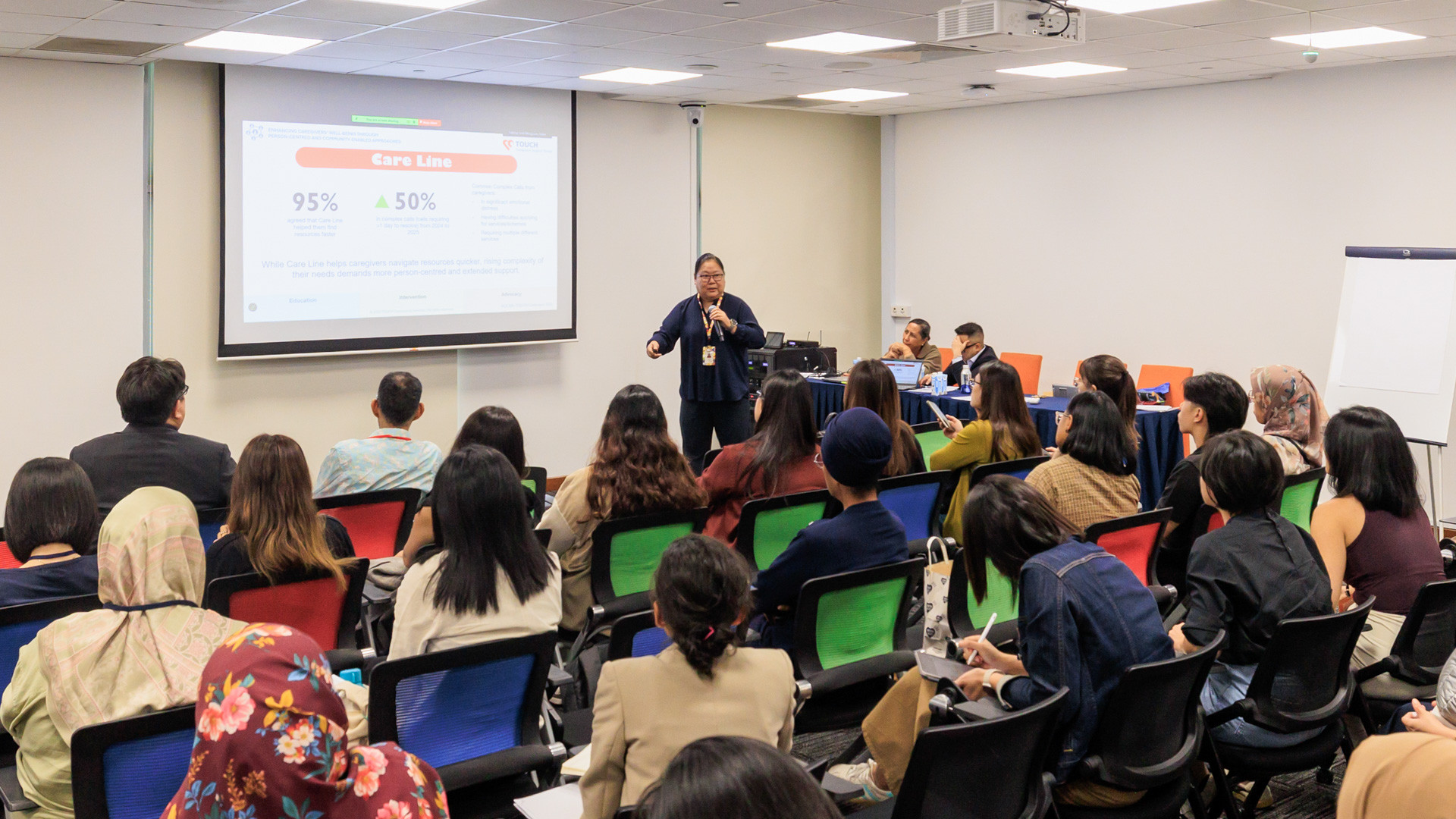
"There's a need for much more research on respite for custodial grandparents and other things that we generally grant parents," said Professor Premchand Dommaraju, Associate Professor of Sociology and Director of the Master of Science in Applied Gerontology programme at Nanyang Technological University, who presented on the topic.
He suggested policies such as childcare leave and flexible work arrangements for grandparents, citing Sweden's 2024 Parental Leave Reform as an example; the reform allows parents to transfer up to 45 days of paid parental leave to grandparents and other child caregivers.
Ms June Sim, Group Head of TOUCH Caregivers Support Group, also underscored the need for proper support systems for caregivers. "Instead of thinking of caregivers as care deliverers, I encourage you to think of caregivers as people with their own needs and aspirations," she said. Caregiver helplines, online communities, and raising awareness about caregiver challenges are necessary initiatives to support them, she added.
Designing together for stronger neighbourhoods
Another important area of discussion at the conference was the need to co-create programmes among stakeholders, as community initiatives cannot be created in silos.
Professor John Eu-Li Wong, Co-Chair of the Health District @ Queenstown (HD@QT) Steering Committee, who spoke on the initiative at the conference, emphasised this point, saying, "Things don't work if you develop something for somebody else. We must involve the person we're trying to develop for because that's how they own it, and that's how the chances of success are so much higher."
HD@QT is a multi-stakeholder initiative spearheaded by NUS, National University Health System (NUHS), and the Housing & Development Board (HDB), bringing together partners from the public, private, and people sectors to develop lasting health and social solutions in Singapore.
Among the projects that have made an impact are Happy Village @ Mei Ling, a community space staffed by a team of healthcare and social workers who work closely with residents to co-develop personalised care plans, and "Come 4Tea Lah!", a collaborative space where residents of all ages can come together to co-design community activities.
Prof Wong described "Come 4Tea Lah!" as "thriving", with residents themselves spearheading activities such as "yum cha" (tea drinking) sessions with board games, sing-alongs, monthly birthday celebrations for all ages (funded by residents), and the Woofy Club, a 120-strong group of dog-lovers who meet regularly to share tips on obedience training. These initiatives are complemented by other regular activities such as educational talks by NUS and health screenings by NUHS.
"Our commitment is: not only do we collect the data, we also share it with the residents, and then we co-create the solution. We have them in the planning, and actually have them take a seat at the table in designing the intervention," said Prof Wong.
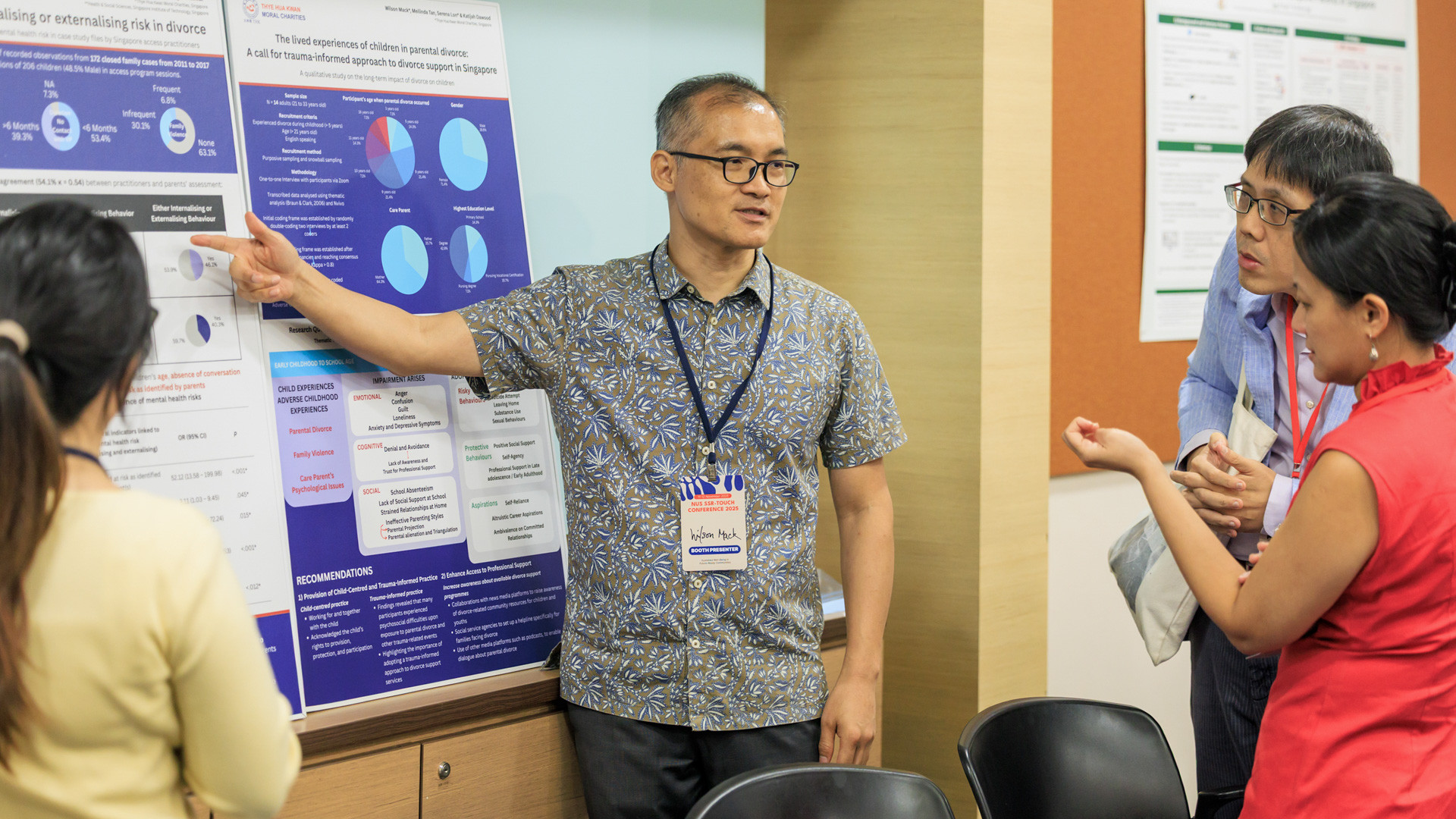
When carers get "sandwiched"
Many Singaporean adults today face the pressure of having to care for their elderly parents or family members while raising children of their own. This 'sandwiched generation' phenomenon can be particularly stressful for those with large families or low incomes.
Associate Professor Noor Aisha bte Abdul Rahman from the Department of Malay Studies at the NUS Faculty of Arts and Social Sciences highlighted that Malay family units tend to be larger, often including three to four children and elderly relatives living in the same household.
As such, Assoc Prof Noor Aisha said that Malay Muslim caregivers - particularly women - shoulder the heavy burden of being "sandwiched caregivers", juggling both eldercare and childcare. They often face concurrent challenges, such as health and well-being gaps, social isolation and burnout risk, as well as financial insecurity and employment barriers.
"Supporting them requires a coordinated effort," said Dr Ad Maulod, Principal Research Scientist at the Centre for Ageing Research & Education at Duke-NUS Medical School, who also presented on the topic. He cited raising health and well-being literacy, as well as quality and accessibility of health and social support services, as key to helping these sandwiched caregivers.
To better support our communities, Assoc Prof Noor Aisha stressed that social support systems should be caregiver-centric - programmes should be co-created with caregivers, rather than designed for them - to ensure timely and meaningful support. Such an approach is essential for supporting sandwiched caregivers across all demographic groups in Singapore.
Commenting on the success of the conference, Associate Professor Lee Jungup, SSR Co-Director said that the event has shown that it truly 'takes a kampung' to build a sustainable ecosystem of care - not just for older persons or caregivers, but for every generation in Singapore.
"By bringing together researchers, practitioners, policymakers and community partners, the NUS SSR-TOUCH Conference has created a shared space to listen, learn and co-create solutions grounded in real lives and real neighbourhoods. As we move towards a super-aged, future-ready society, our hope is that these collaborations will translate into concrete, community-led initiatives that sustain well-being for everyone, by everyone," said Assoc Prof Lee.
This story first appeared in NUSnews on 12 December 2025.
Between Scientific and Sensory Knowledge: Exploring the Enactment of Clay Sensibilities Among Clay Artists in Singapore
Clay-making is often acknowledged for its profound sensory experience, where skilled potters engage in meticulous moulding and refinement. In ‘Between Scientific and Sensory Knowledge: Exploring the Enactment of Clay Sensibilities Among Clay Artists in Singapore’ (American Behavioral Scientist, 2024), Professor Kelvin E.Y. Low (NUS Sociology and Anthropology) and Dr. Suriani Suratman (NUS Malay Studies) illuminate the dual nature of this craft. Alongside the tactile aspects of clay art, scientific thermoreceptive knowledge – such as precise control over firing processes, temperatures, and glazing – plays an equally crucial role in the creation of fine pottery.
The researchers highlight a dynamic interplay between activity and receptivity, as well as dominance and submission, in the relationship between the potter and the clay. They observe that the potter's movements and perception-action loops are intricately linked with the physical qualities and affordances of the clay.
The article draws on a combination of primary and secondary data, including semi-structured interviews with local clay artists as well as media archives, clay exhibition booklets, and online texts. The artists interviewed varied widely in their experience, and their methods for acquiring clay knowledge differed significantly. Architect Daphne Pok discovered her passion for pottery during her time in Hong Kong. She has since become a strong advocate for using clay as a medium in both art therapy and education. Meanwhile, glaze chemist Seng Khoon and his family practised wood firing for over 50 years. Seng Khoon honed his craft by learning essential sensory techniques from his father to master the intricate processes involved.
In general, the researchers found that sensory knowledge in clay making is closely linked with scientific understanding through two main themes – the technical skills required for firing and glazing clay, and the shared experiences between artists and teachers. Seng Khoon, despite not considering himself as an “art person”, integrates technical knowledge with their sensory insights to perfect his firing process. Teachers also blend sensory and technical knowledge when guiding beginners, emphasising that recipes and formulas are essential for mastering glazing and firing, which then makes sensory practice more intuitive in the long term.
The article concludes with a discussion of the concept of kairos, a Greek term meaning the opportune moment. In pottery, this involves using intuition to seize critical moments in the crafting process. Despite the apparent sensory nature of pottery, experts recognize kairotic moments by combining scientific and sensory knowledge, such as assessing flame colour with the naked eye. Ultimately, artists must balance their technical and sensory approaches, allowing the clay to guide the process, to truly master the art of pottery.
Read the article here.

Muhammad Ariff Ahmad – a wise and exemplary figure
IN BRIEF | 10 min read
- By Dr Azhar Ibrahim Alwee (NUS Malay Studies).
Click through image below to read this piece.
This story first appeared in Berita Minggu and on NUSNews on 2 November 2025.
Prominent Malays of Singapore: A Digital Archive Celebrating Malay Contributions to Singapore’s History and Society
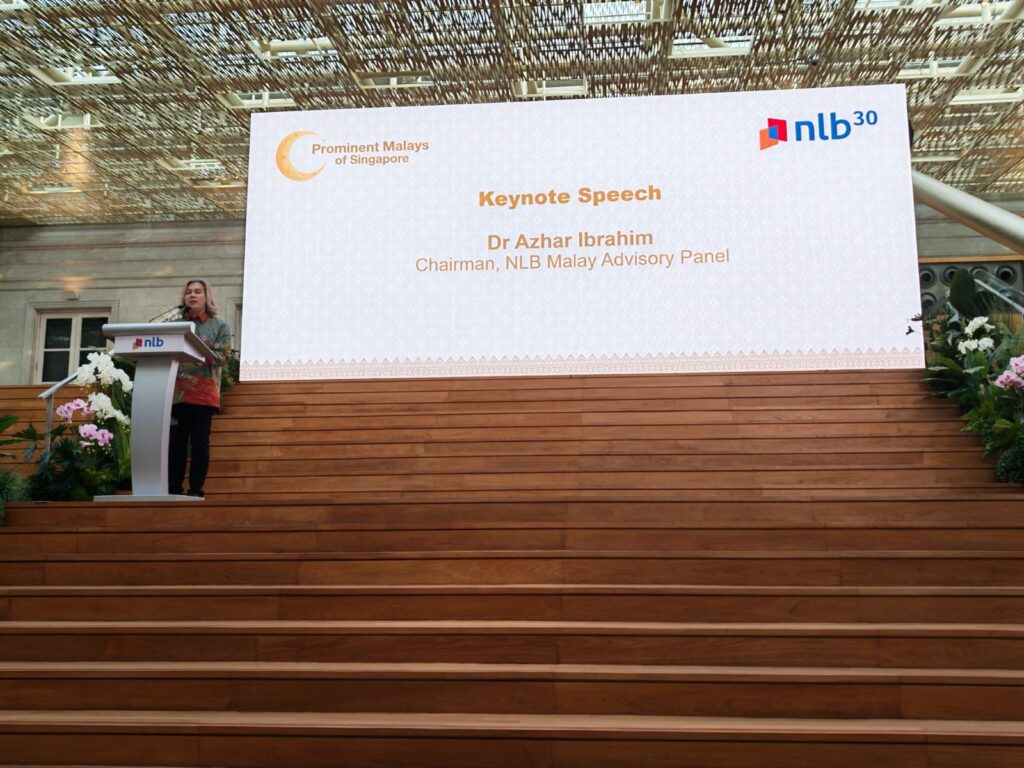 Photo Credit: Assoc Prof Sher Banu AL Khan The National Library Board (NLB) just dropped the "Prominent Malays of Singapore" (PMoS) portal, a fresh digital space celebrating over 100 Malay trailblazers who've shaped Singapore's story. From arts and sports to community and government, the portal gives you the lowdown on their achievements-all in English and Malay. Packed with pics, videos, and interactive content, PMoS isn't just about reading-it's about experiencing history. Users can even pitch in by submitting info to help keep the portal updated, making it a community-driven celebration of culture. To bring the stories offline, a roving exhibition will tour libraries across Singapore from October 2025 to March 2027. Dive in and explore the lives of these inspiring figures at https://go.gov.sg/nlb-Prominent Malays of Singapore portal
Photo Credit: Assoc Prof Sher Banu AL Khan The National Library Board (NLB) just dropped the "Prominent Malays of Singapore" (PMoS) portal, a fresh digital space celebrating over 100 Malay trailblazers who've shaped Singapore's story. From arts and sports to community and government, the portal gives you the lowdown on their achievements-all in English and Malay. Packed with pics, videos, and interactive content, PMoS isn't just about reading-it's about experiencing history. Users can even pitch in by submitting info to help keep the portal updated, making it a community-driven celebration of culture. To bring the stories offline, a roving exhibition will tour libraries across Singapore from October 2025 to March 2027. Dive in and explore the lives of these inspiring figures at https://go.gov.sg/nlb-Prominent Malays of Singapore portal
Role models, community pride
IN BRIEF | 10 min read
- By Dr Azhar Ibrahim Alwee (NUS Malay Studies).
Click through image below to read this piece.
This story first appeared in Berita Minggu and on NUSNews on 5 October 2025.
The declaration of the Independence of Malaysia
IN BRIEF | 10 min read
- By Dr Azhar Ibrahim Alwee (NUS Malay Studies).
Click through image below to read this piece.
This story first appeared in Suria News Online and on NUSNews on 31 August 2025.
The sovereign echoes of freedom by Indonesian poet W.S. Rendra
IN BRIEF | 10 min read
- By Dr Azhar Ibrahim Alwee (NUS Malay Studies).
Click through image below to read this piece.
This story first appeared in Berita Minggu and on NUSNews on 17 August 2025.
Love for the nation as a sacred trust: Unite hearts, uphold noble values
IN BRIEF | 10 min read
- By Ustaz Syafiq Mardi, a PhD candidate in NUS Malay Studies.
Click through image below to read this piece.
This story first appeared in Berita Harian and on NUSNews on 15 August 2025.
Heroines of the nation, role models for others
IN BRIEF | 10 min read
- By Dr Azhar Ibrahim Alwee (NUS Malay Studies).
Click through image below to read this piece.
This story first appeared in Suria News Online and on NUSNews on 11 August 2025.
An independent nation, a cultured society
IN BRIEF | 10 min read
- By Dr Azhar Ibrahim Alwee (NUS Malay Studies).
Click through image below to read this piece.
This story first appeared in Berita Minggu and on NUSNews on 10 August 2025.
When tears flow, songs of grief and sadness
IN BRIEF | 10 min read
- By Dr Azhar Ibrahim Alwee (NUS Malay Studies).
Click through image below to read this piece.
This story first appeared in Suria News Online and on NUSNews on 6 August 2025.
Libraries, books, and a celebration of knowledge
IN BRIEF | 10 min read
- By Dr Azhar Ibrahim Alwee (NUS Malay Studies).
Click through image below to read this piece.
This story first appeared in Berita Minggu and on Suria News Online on 30 July 2025.
The Kebaya is a cultural icon; the traditional attire of a nation
IN BRIEF | 10 min read
- By Dr Azhar Ibrahim Alwee (NUS Malay Studies).
Click through image below to read this piece.
This story first appeared in Berita Minggu and on NUSNews on 27 July 2025.
Writer Na Tien Piet, a Peranakan Chinese, skilled in verse
IN BRIEF | 10 min read
- By Dr Azhar Ibrahim Alwee (NUS Malay Studies).
Click through image below to read this piece.
This story first appeared in Berita Minggu and on NUSNews on 29 June 2025.
NUS students’ production ‘Memori’ explores grief and loss of loved ones; nearly all tickets sold
IN BRIEF | 10 min read
- A review of "MEMORI", a performance staged by the NUS Malay Language Society (PBMUKS, Persatuan Bahasa Melayu University Kebangsaan Singapore) on 20 and 21 June 2025, by Mediacorp producer Syazwani Sanep (alumna, NUS Malay Studies '22).
Click through image below to read this piece.
This story first appeared in Suria Online and on NUSNews on 24 June 2025.
Hari Raya Haji, a pinnacle of spiritual and humanitarian struggle
IN BRIEF | 10 min read
- Dr Azhar Ibrahim Alwee, NUS Malay Studies.
Click through image below to read this piece.
This story first appeared in Berita Minggu and on NUSNews on 8 June 2025.
#Minimosque: Cov-Eid as Image, Event, and Archive
The COVID-19 pandemic led to the closure of mosques in Singapore, preventing Muslims from gathering for communal prayers and rituals. Projects such as "Living with COVID-19 in Southeast Asia: Personal and Visual Experiences of Crisis, Control, and Community", the NUS Asia Research Institute’s crowdsourced visual archive on pandemic life in Southeast Asia attempted to organise the plethora of archives produced during this time. However, the bulk of digital artefacts, such as images under the hashtag #minimasjid, are scattered across the internet, with some hidden behind private accounts while others circulate in public domains. While the use of hashtags connected public and private realms, images could detach from their original context and be linked to different narratives. In her book chapter, '#Minimosque: Cov-Eid as Image, Event, and Archive' (CoronAsur, 2023) Assistant Professor Faizah Zakaria (NUS Southeast Asian Studies and NUS Malay Studies) explores the current and potential future interpretations of Cov-Eid images. She tracks the mini-masjid (mosque) and the home-delivered khutbah (sermon) from the morning of Eid ul-Fitr as both an event that occurred, and an emerging archive that is not yet defined by a single set of narratives. Specifically, she shows how power dynamics are influenced by both algorithmic determinations of digital platforms and real-world events. The #minimosque challenge, which emerged during Cov-Eid, aimed to inspire parents worldwide to create mini-prayer areas for their children. Zakaria observes how images from such events can acquire multiple meanings over time, serving as both events and archives. As an event, the #minimasjid challenge sought to reshape the narrative about Muslims during the pandemic, offering a positive portrayal of creative Muslim resilience, amid reports linking Tabligh mass prayer events to infection clusters. Sharing these images countered the stereotype of Islam as fatalistic and superstitious, and highlighted the creativity and resilience of quarantined Muslims instead. Looking ahead, future researchers might encounter these images without the context of social media algorithms and interpret them as symbols of ingenuity and strength during a difficult time. Following Dr Nazirudin Mohd Nasir, the mufti of Singapore who livestreamed the sermon while holding his staff, the ‘asa, from an empty mosque due to congregational prayer restrictions, families conducted smaller Eid prayers at home. These were led by a male family member acting as an "insta-imam" with their own creatively improvised 'asa, such as a fishing rod or an IKEA hat stand. The images of family imams' ‘asas were documented and circulated on private sharing platforms like WhatsApp. However, tracking the meaning and distribution of images in private spaces is challenging due to algorithms and sharing choices. Similarly, preserving an archive of WhatsApp images raises questions about their coherence and continuity. Ultimately, the study reveals how digital images during the pandemic reflect individual agency among quarantined Muslims. The online circulation of Cov-Eid images not only mirrors the absence of physical congregational spaces but also highlights the evolving landscape of virtual public interaction. As Singapore adapts to this unprecedented shift towards virtual engagement, it is crucial to acknowledge the significance of digital imagery in shaping new realities, including our engagement with religious practices during crises. Read the chapter here.

The NUS Malay Studies Society celebrates 30 years of efforts in enriching discourse on community issues.
Campus Pulse | 3 min read
Click through image below to read this piece.
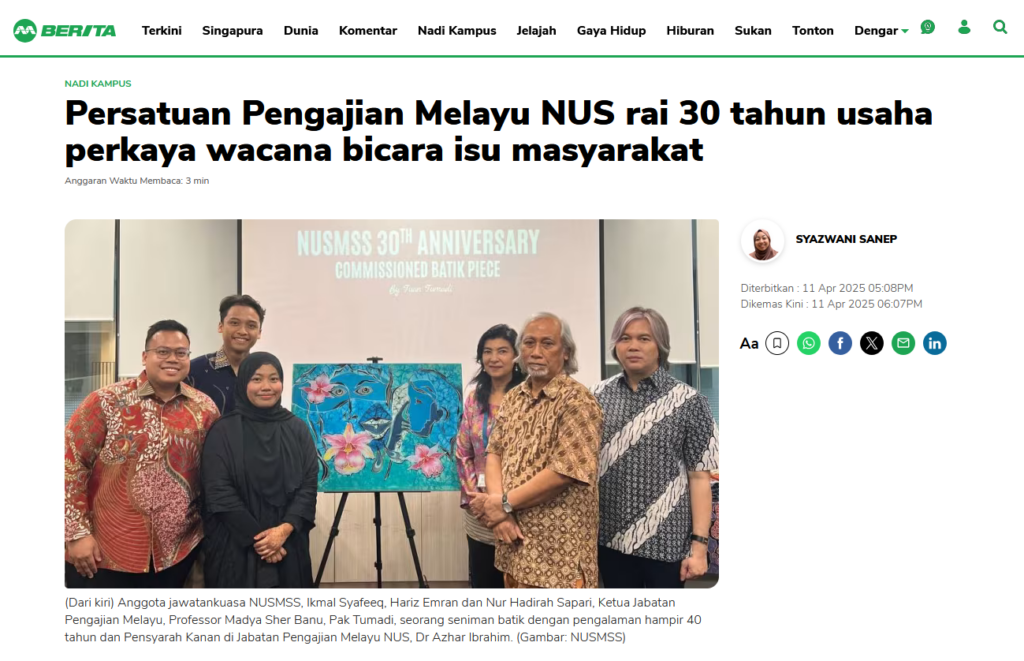
This story first appeared in Berita Mediacorp on 11 April 2025.
Celebrating the noble day of the soul
IN BRIEF | 10 min read
- By Dr Azhar Ibrahim Alwie (NUS Malay Studies).
Click through image below to read this piece.
This story first appeared in Berita Minggu and on NUSNews on 13 April 2025.
Book on religion and the environment by Dr Faizah Zakaria accorded prestigious Association for Asian Studies award
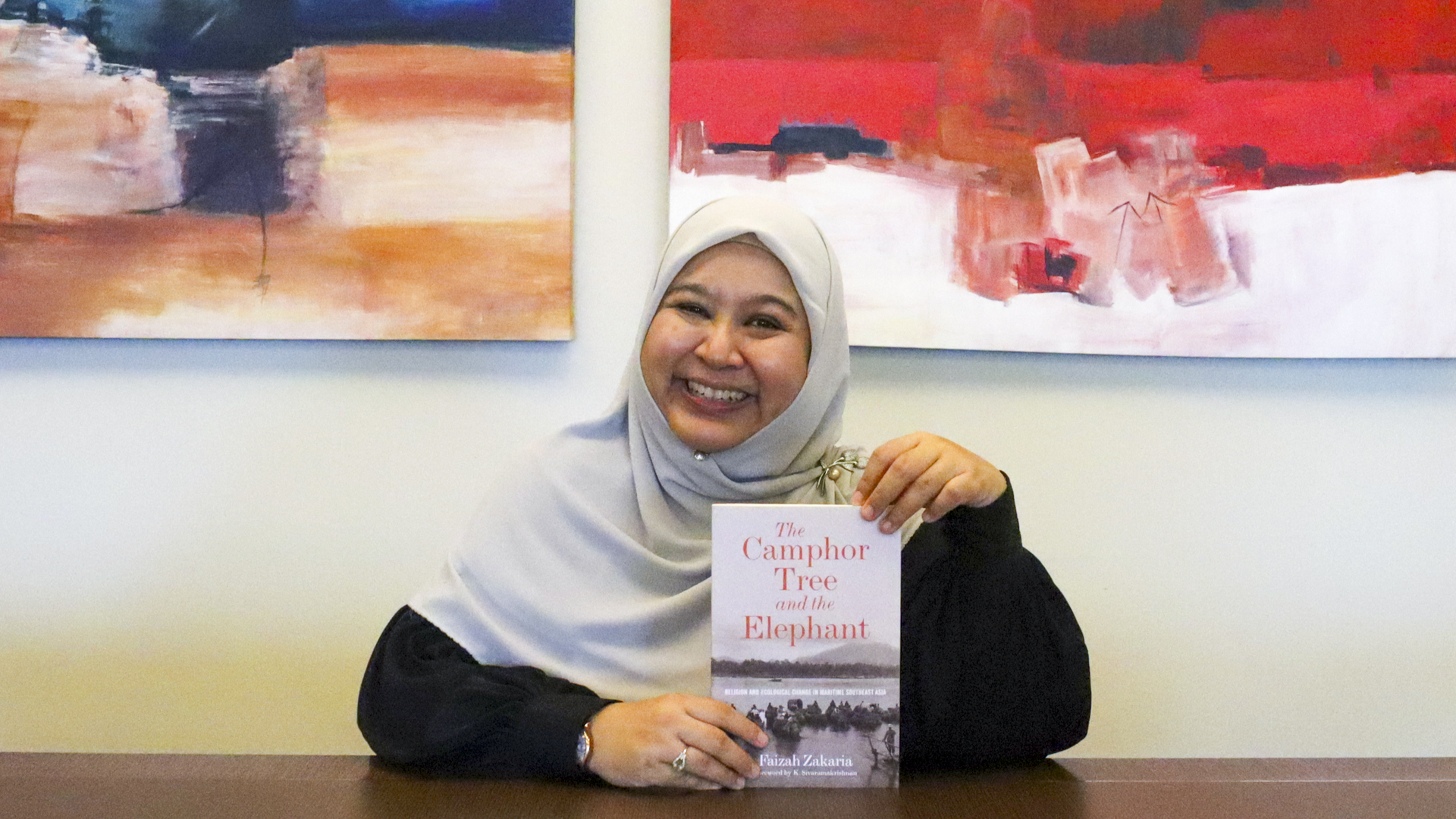
The esteemed Harry J. Benda Prize was awarded to Dr Faizah Zakaria for her book "The Camphor Tree and the Elephant: Religion and Ecological Change in Maritime Southeast Asia".
A book titled "The Camphor Tree and the Elephant: Religion and Ecological Change in Maritime Southeast Asia" by historian Dr Faizah Zakaria has claimed the prestigious annual "Harry J. Benda Prize (First book on Southeast Asian Studies)" by the Southeast Asia Council of the Association for Asian Studies. Established in 1977, the Prize honours books that make exceptional contributions to the understanding of Southeast Asia, specifically to authors publishing their first major work on the topic. One of the most esteemed awards in the field, receiving this prize is considered a major milestone for early-career scholars.
Published in February 2023 by University of Washington Press, Dr Zakaria's book explores how religious beliefs and practices have influenced the way people in the region interact with their environment, specifically with respect to the natural world. She traces the conversion of the Batak people in upland Sumatra and the Malay Peninsula to Islam and Christianity during the 19th century, and finds that the process helped shape social structures that voided the natural world of enchantment, ushered in a cash economy, and placed the power to remake local landscapes into the hands of elites.
Dr Zakaria shared how she felt honoured to receive the distinction in the company of many wonderful scholars whose field-shaping books in Southeast Asian studies have been recognised through this award.
She added, "More importantly, I hope that my book will spark new conversations about environmental history and ethics as well as the role of religious communities in co-creating a sustainable world. Area studies, with its phenomenological approaches to understanding the region's communities, continues to offer grounded views to the pressing issues of our time and I hope that more students will be interested to explore the region on their own terms."
Dr Zakaria holds a joint appointment in the Departments of Southeast Asian Studies and Malay Studies at the NUS Faculty of Arts and Social Sciences. Her research interests focus on religion and ecology, environmental justice and indigenous movements in Southeast Asia. She is currently working on a research project on the role of religion and science in disaster responses, focusing on volcanic eruptions, and she also co-coordinates a digital humanities project comparing Malay and Chinese heritage medicine.
This story first appeared on NUSNews on 11 April 2025.
Awareness of history is a must
IN BRIEF | 10 min read
- By Dr Azhar Ibrahim Alwee, NUS Malay Studies.
Click through image below to read this piece.
This story first appeared in Suria News Online and NUSNews on 14 March 2025.
Listen Now: Associate Professor Khairudin Aljunied on the MIM Podcast – "Boleh ke Melayu Maju??"

🎧 Tune in! Associate Professor Khairudin Aljunied joins the latest episode of the MIM Podcast, "Boleh ke Melayu Maju??" 🌟 In this episode, he shares his expert insights on the Malay community, exploring key issues and ideas for progress. Don't miss out on this thought-provoking discussion!
Click the image for the Spotify link
Love stories come full circle as NUS campus couples give back

In the 1990s, an unlikely friendship blossomed at NUS Sheares Hall between a motorcycle-riding long-haired Arts student and a popular bubbly freshman from the NUS Faculty of Science. When Mr Aznan Bin Ghazali (Arts & Social Sciences - Economics and Malay Studies, '92) jokingly quipped to Ms Khalijah Binte Masud (Science - Mathematics and Biology, '92) that one day she would marry him, she shot back: "No way I am going to marry you!"
Years after graduation, fate proved her wrong - they fell in love and married on Valentine's Day in 1999.
26 years later, they have returned to their alma mater to reminisce and support the next generation of NUS students through the NUS Campus Couples Bursary. They were among 250 guests at the Celebration of Love and Giving Dinner held on 13 February 2025 at NUS.
"Reflecting on our blessed life and giving back are ways of commemorating our time in NUS," shared Mr Aznan, quoting his wife during his speech at the event. "At this point in our lives, it's also important for us to set an example for our children."

The annual donor appreciation event, which brings together couples who found love and purpose on the University's grounds, is organised by the NUS Campus Couples Alumni Group and supported by the Alumni Student Advancement Committee (ASAC) and the NUS Development Office.
Reflecting on how the Campus Couples Bursary began, Mr Yeo Keng Joon (Business '85), Chairman of the event's organising committee and ASAC member, shared how he rallied fellow alumni with a heartfelt appeal: "If you met your spouse on campus and have achieved a fulfilling life, it's important to acknowledge the role the University played in shaping your journey, as it may have been quite different without it."
His message resonated deeply with the NUS community, and over $1 million has been raised for the NUS Campus Couples Bursary since its establishment in 2015. To date, the funds have supported 223 students in financial need.

Among the bursary's dedicated supporters are Ms Wong Lai Quen (Science '80) and Mr Steven Lau Hwai Kien (Accountancy '80), who found love as undergraduates and built a life together after graduation. "We are very thankful for whatever we have received, whether through our hard work or from our lecturers, the community and the government," said Ms Wong. "That's why we believe in giving back. Even when Steven is now living with dementia, he is always thinking about how to support others. That's how we came to support the Bursary."

For Mr Yeo and his wife Mdm Kong Yuet Peng (Business '86), watching their contributions transform students' lives brings deep fulfilment. "We talk to the students, and we get to understand the difficulties and suffering they face. When we know that we have made a difference in their lives, it makes us happy," he said.
The NUS Campus Couples Bursary and other financial aid for university students showcase the profound impact of alumni giving-turning generosity into life-changing opportunities.

One such beneficiary is Ms Nur Husna Faqihah, a Year 4 Geography student at the NUS Faculty of Arts and Social Sciences, whose story exemplifies social mobility through education. When her parents faced retrenchment during the pandemic, a bursary became her lifeline. Not only did it enable her to continue her studies, the bursary also opened doors to experiences she never imagined possible - from representing NUS at the Youth Green Summit in Bangkok to participating in an exchange programme in Croatia.
"I feel so lucky to be born in Singapore and to be part of an institution like NUS," she reflected. "Because of these bursaries and financial aid schemes, students can pursue their passions as long as they have the desire to do so. Thank you for impacting the lives of students like me, and for making a difference that extends far beyond our time at NUS. You have helped us walk a smoother path, free from the worries of burdening our families, so that we can focus on our education and future contributions to society."
These stories of NUS campus couples have come full circle. What started as serendipitous meetings in lecture halls and dormitories have evolved into a legacy of giving, creating ripples of impact that continue to shape future generations.
This story first appeared on NUS Giving News on 20 February 2025.
An Interdisciplinary Exploration of the Body in Malay Society by Dr Alicia Izharuddin
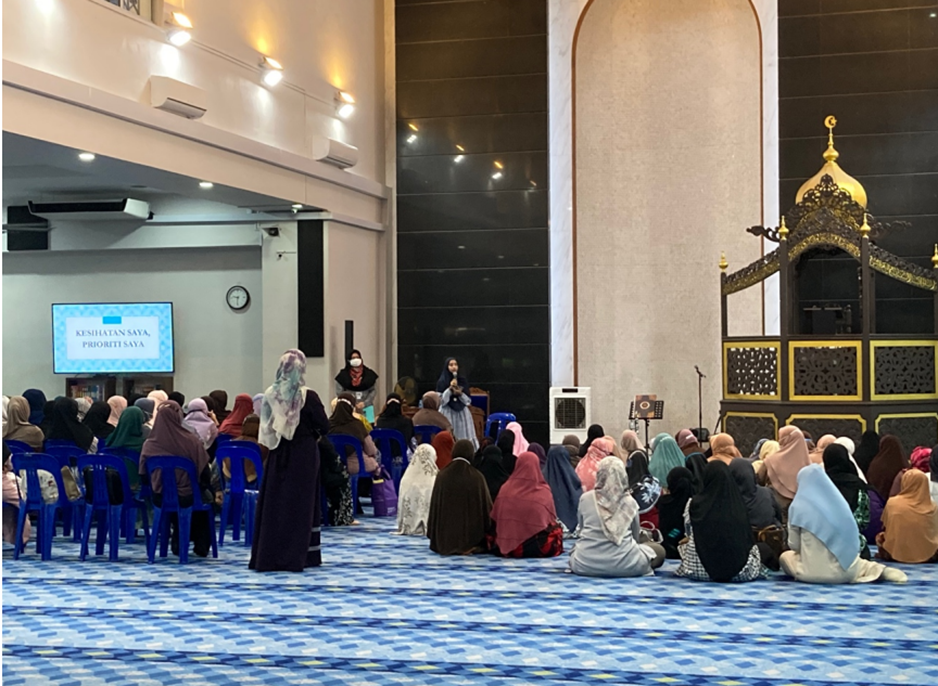
HS2919
Blood and Womb: Culture and the Body in Malay Society
Why do so many people turn to traditional healers to treat serious ailments even when they can access modern biomedicine? How do culture, religion, and history influence a community's health behaviour and decision-making? Can cultural competency make healthcare more equitable? These questions are answered in 'Blood and Womb: Culture and the Body in Malay Society', the first ever interdisciplinary course offered by the Department of Malay Studies at NUS. Taught by lecturers from the Malay Studies Department and the Saw Swee Hock School of Public Health, Alicia Izharuddin and Wong Mee Lian, the course brings together their expertise and approaches from sociology, anthropology, public health education, and community health to bear on contemporary matters related to the health and wellbeing of Malay communities across Southeast Asia.
In this course, students get to develop a deeper understanding of the body as both biological and social sites of intervention. Topics covered in the course include the cultural meanings of blood, the colonial history of mental illness, racialised trends in cancer screenings, the biopolitics of population control, and religious challenges of artificial reproductive technology. But there are lighter moments, too. There are fun activities in the course that encourage a range of creative and transferable skills. For example, students gain an opportunity to write, role-play and recite Malay healing incantations used in traditional healing, and develop campaign posters to encourage older Malay men to perform muscle strengthening exercises. There are many multifaceted aspects to the course that have enriched students' learning experience and appreciation of the social sciences. Past students who have taken this course have said it is 'one of the most interesting courses they have taken' at NUS and have 'highly recommended it' to friends and other prospective students. There are no special requirements for students interested in enrolling in this course.
FASS Outreach & Engagement Award 2024 Winners
Congratulations Dr Azhar Ibrahim! The FASS Outreach and Engagement Award programme acknowledges the service efforts and contributions of faculty members who have been instrumental in promoting the visibility and presence of FASS Departments and Programmes among prospective students, parents, schools, alumni and the broader public.
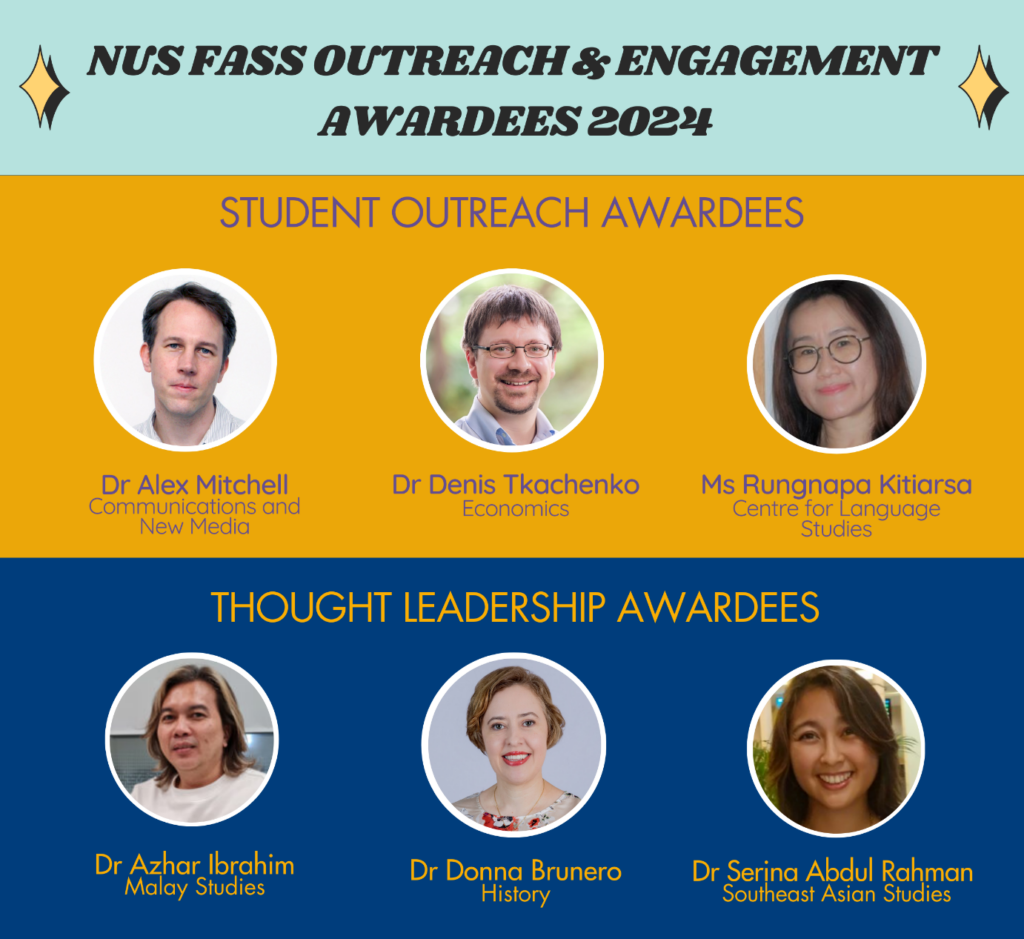
Dr Faizah Zakaria Wins Prestigious Harry J. Benda Prize
Dr Faizah Zakaria Wins Prestigious Harry J. Benda Prize Dr Faizah Zakaria has been awarded the prestigious Harry J. Benda Prize for her groundbreaking book, The Camphor Tree and the Elephant: Religion and Ecological Change in Maritime Southeast Asia. Presented by the Southeast Asia Council of the Association for Asian Studies (AAS), the prize recognizes outstanding first books in Southeast Asian Studies.
https://www.asianstudies.org/aas-2025-prizes/
Established in 1977, the Harry J. Benda Prize honors exceptional contributions to the study of Southeast Asia and is one of the most esteemed awards in the field.
Congratulations to Dr Faizah Zakaria on this well-deserved recognition!
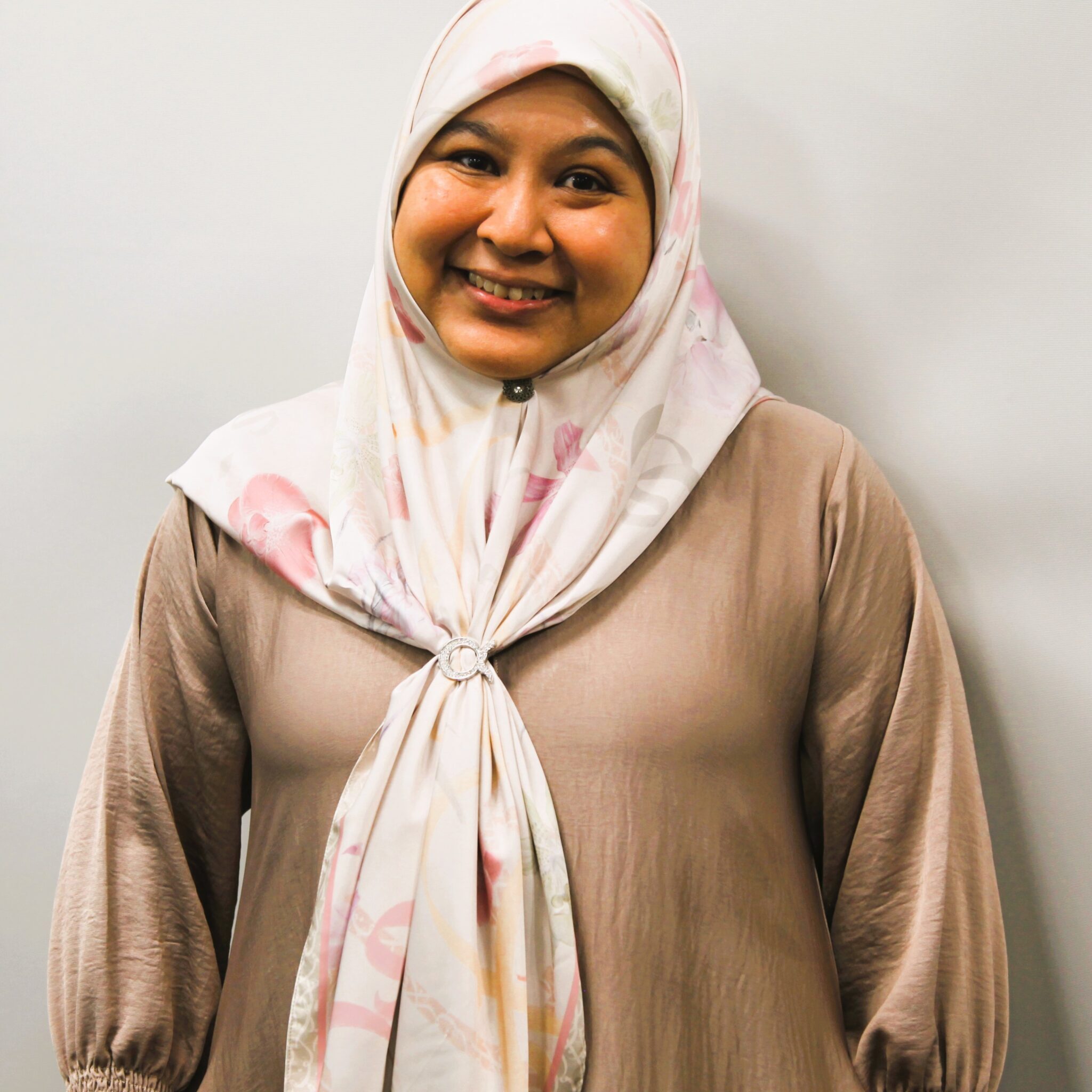
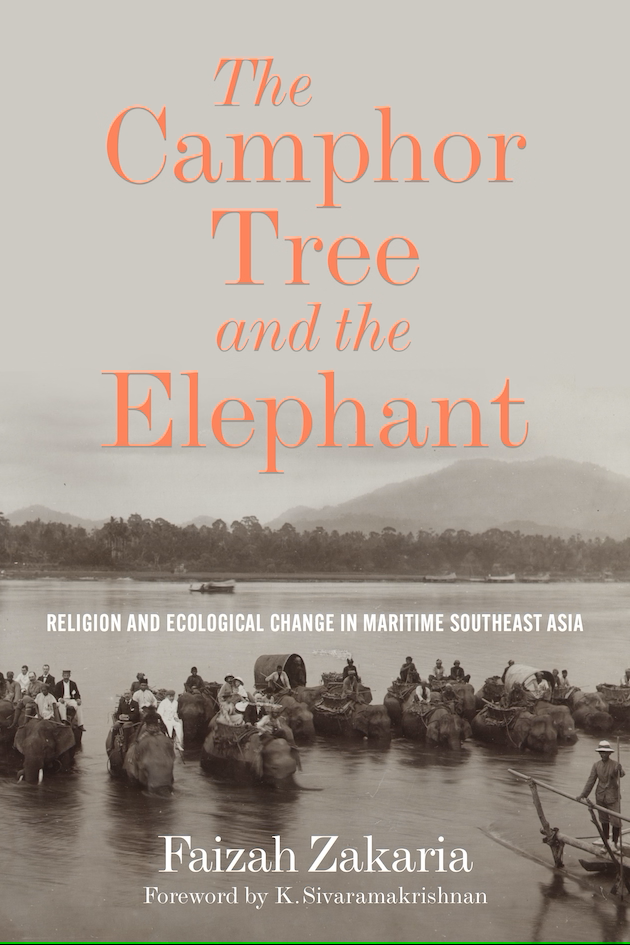 The Camphor Tree and the Elephant
The Camphor Tree and the Elephant
Religion and Ecological Change in Maritime Southeast Asia
By Faizah Zakaria
Uncovers a spiritual dimension in the transition to the Anthropocene
What is the role of religion in shaping interactions and relations between the human and nonhuman in nature? Why are Muslim and Christian organizations generally not a potent force in Southeast Asian environmental movements? The Camphor Tree and the Elephant brings these questions into the history of ecological change in the region, centering the roles of religion and colonialism in shaping the Anthropocene-"the human epoch."
Historian Faizah Zakaria traces the conversion of the Batak people in upland Sumatra and the Malay Peninsula to Islam and Christianity during the long nineteenth century. She finds that the process helped shape social structures that voided the natural world of enchantment, ushered in a cash economy, and placed the power to remake local landscapes into the hands of a distant elite. Using a wide array of sources such as family histories, prayer manuscripts, and folktales in tandem with colonial and ethnographic archives, Zakaria brings everyday religion and its far-flung implications into our understanding of the environmental history of the modern world.
Ghost, supernatural class at NUS receives positive response
IN BRIEF | 10 min read
- A feature on Dr Noorman Abdullah (NUS Arts and Social Sciences - Assistant Dean of External Relations and Student Life, Senior Lecturer at NUS Sociology & Anthropology and NUS Malay Studies, and alumnus - BSocSci '02 and MSocSci '05) and one of his more popular courses, GEH1062/GEC1024: Ghosts and Spirits in Society and Culture.
Click through image below to read this piece.
This story first appeared in Berita Harian and NUSNews on 31 January 2025.
[Pendaftaran kini dibuka!] Bahasa dan Literasi di Alam Melayu oleh Dr Azhar Ibrahim, Pensyarah Kanan, Universiti Nasional Singapura

The Classes that Haunt Us
IN BRIEF | 15 min read
- NUS Faculty of Arts and Social Sciences alumnus Dr Noorman Abdullah (BSocSci '02 and MSocSci '05) is FASS' Assistant Dean (External Relations & Student Life) and a Senior Lecturer within NUS Sociology & Anthropology and NUS Malay Studies. His research interests include religion and society; race relations; decolonial pedagogies; and sensory studies. Late last year he shared how he came to teach one of his popular courses - GEH1062/GEC1024: Ghosts and Spirits in Society and Culture - and why the supernatural fascinates us all.

NUS Faculty of Arts and Social Sciences alumnus Dr Noorman Abdullah (BSocSci '02 and MSocSci '05) is FASS' Assistant Dean (External Relations & Student Life) and a Senior Lecturer within NUS Sociology and Anthropology and NUS Malay Studies, spoke late last year with The AlumNUS (a publication of the NUS Office of Alumni Relations) about his work and passions, and shared how he came to teach one of his popular courses - GEH1062/GEC1024: Ghosts and Spirits in Society and Culture - and why the supernatural often fascinates us all.
What led to your interest in the supernatural, and why did you decide to pursue this academically?Growing up in Singapore, I was exposed to different stories surrounding the supernatural: family members and relations who have had personal experiences or encounters, or instances of those seeking out a spiritual practitioner to address health or business issues. And then, of course, watching horror films and being around friends who would trade ghost stories. I was really petrified of this when I was young and continue to be till now!
All of that though led to my interest in trying to understand why, in a modern, industrialised society such as Singapore-and many other societal contexts for that matter-we still have large segments of the population that are interested in and believe in spirits, ghosts, and other supernatural entities. Why is it that we still have people finding appeal in ghost tourism and hauntings, paranormal investigations, as well as horror films and stories?
More broadly speaking, in terms of becoming an academic, I was drawn to sociology and anthropology because these provided me with a toolkit to understand the world we live in, as well as a way to think differently about explanations for why certain phenomena continue to happen. That curiosity in trying to engage critically and compassionately with issues-as well as exposure to great teachers during my undergraduate training-pushed me into the kinds of research and teaching that I'm presently doing

Modern living is oftentimes characterised by a certain routine, banal, everyday existence. There's a level of control and comfort that is derived from a rational, standardised and empirically-driven approach to how we think and behave. The fascination with the supernatural that we see with some groups could be a desire to break out of the routine.
There's also a fascination in wanting to be enchanted. One of the characteristics of modern society is that it's quite disenchanted; there are answers to almost everything. But for aspects that remain difficult to explain, there's a lure in the mystery of what could lie beyond the physical.
Modern society is also often associated with a rise in secularism. How has this impacted the belief in ghosts and spirits?What's quite fascinating is that the process of secularisation has not necessarily cancelled out other kinds of perspectives. While we do see individuals and groups drawing reference to the importance of empirical evidence in making sense of the world, they often remain open to other explanations, especially if scientific reasoning doesn't resonate with what they're experiencing.
Some groups are therefore drawn to the supernatural because it provides them with a therapeutic approach or a way to make sense of particular challenges that are not necessarily addressed by rationality or empiricism. This could be an openness to a religious or spiritual perspective or even an approach that combines biomedicine with supernatural beliefs.
And interestingly, quite a number of supernatural practitioners have now borrowed the language of science to legitimise their craft as well.

What variation do we see in how different cultures understand ghosts?
Typically, the idea of the ghost comes from a somewhat Eurocentric basis. It comes from a particular context itself which draws reference to dead people. But the category of the supernatural itself is more wide-ranging, and certain societies will make distinctions between different kinds of ghosts and spirits through terms like hantu, jinn, poltergeists, phantoms, wraiths, and so on.
One question I often ask students is whether these concepts are derived from a particular cultural milieu. Do they necessarily make sense? Do they resonate with their own experiences, and their own understanding of the supernatural world? Are there ethnic, class, or gendered components to the classifications we see?
In this respect, one of the important takeaways is that these concepts and typologies are not universal, and that, while there are interesting parallels that can be drawn, there are also important differences between such cultural contexts we can try to explain.

When I ask my students what comes to mind when they think about witches, there admittedly does tend to be a dominant representation and a gendered dimension to how a witch is often portrayed. But the category has also transformed over time.
In the past, accused witches tended to be women who were often maligned or considered to be heretic, and they were persecuted on the perception of transgressing certain moral or religious norms.
In today's context, however, we find that the category has become much more diverse and interestingly has a component of female empowerment as well. For instance, one of our NUS alumnae has embarked on a career as a witch-she has a shop in Sim Lim Square-and this is an example of how we've had to rethink what being a witch means now in distinction from its historical past.
What I also try to demonstrate to our students is that, while witches are dominantly framed as women, there are societies in which men and children are labelled as witches as well. And again, the boundaries of these definitions are also quite porous; the Malay bomoh, the Chinese tangki, or other examples within Southeast Asia, for instance, might have some characteristics of what may traditionally be defined as a witch, but they're also combined with other characteristics that might be more associated with a spirit practitioner.

In one lecture, I use horror films to examine the gendered component of monsters within Southeast Asian films. The dominant representation we find is typically female, and malevolent, but that so-called malevolence needs to be contextualised as well, as it's often interpreted through a limited patriarchal lens.
For instance, the Pontianak is often portrayed as someone who has died from childbirth and come back to take revenge against, more often than not, men who have wronged her. These representations have in fact transformed over time historically and between different groups. So, our class discusses why and what this says about the societies in which these films are situated.
What do you hope students take away from the course?I would say the key objective is to demonstrate that the realm of the supernatural is in many ways a social and cultural phenomenon. Studying the beliefs and practices around the supernatural allows us to understand the social, political and cultural context in which they're situated, as well as to better appreciate the cultural diversity that is observed.
Also, that there is a continued fascination with the supernatural, despite the fact that Singapore is an increasingly modernised, rational society, allows us to move beyond the idea that modern societies are characterised in particularly static ways. It shows that we still try to remain enchanted and engage in moments of re-enchantment in our lives.
Have you heard any NUS ghost stories?I haven't personally experienced one and don't wish to either! But one of my tutors, who claims to have the ability to "see," said that she could sense an entity lurking along the corridors of the tutorial rooms and in the lifts. And there was another colleague who mentioned that while he was working late at night, and when the office was deserted, he could hear a computer being turned on and the sound of typing-so maybe the entity was telling him that work-life balance and wellness is important and that we should go home! Don't work so late into the night. You're an NUS alumnus and now an alumni representative for the Faculty of Arts & Social Sciences (FASS). Can you tell us more about your role and its importance to you?
As an FASS alumnus myself, the kind of work that we are involved in in alumni relations is both gratifying and meaningful. FASS is admittedly a large and diverse faculty - we have 15 departments and programmes, as well as CLS, and offer 20 majors and a host of minors. Unsurprisingly, our alumni base comes from different backgrounds and pursue a range of interesting and rewarding careers. From an alumni relations perspective, harnessing and engaging a cohesive network between our more recent alumni and those who are well-established in their respective fields is important work.
Dr Noorman On...
FASS alumnus and Assistant Dean of External Relations and Student Life Dr Noorman Abdullah (BSocSci '02 and MSocSci '05) spoke recently with The AlumNUS (a publication of the NUS Office of Alumni Relations) about his work and passions. Dr Noorman is also Senior Lecturer at NUS Sociology and Anthropology and NUS Malay Studies.
Academic Interests"Sociology and anthropology provided me with a toolkit to understand the world we live in. That curiosity in trying to engage critically and compassionately with issues pushed me into research and teaching." Senses & Society
"I've been involved in Senses and Society, a thematic group of the International Sociological Association, for over 10 years. We bring together like-minded academics to discuss how our understanding of society is shaped by and through our senses. For instance, how do sight, sound and smell influence our perception of the world, our identities and our interactions?" Joy in the Work
"Research is, of course, very illuminating and I find a lot of meaning in it. But being able to translate that research into teaching - and seeing my students grapple with and engage ideas - is incredibly gratifying." Adapting to Change
"The world is now more uncertain and volatile; the University has undertaken significant curricular changes as a result, as well as increased its emphasis on student wellness and other issues. But at the same time, our core values have remained, including our desire to shape students who are compassionate and critical thinkers." Alumni Connections
"As an FASS alumnus, I find the work we do in alumni relations both gratifying and meaningful. FASS is admittedly a large and diverse faculty…harnessing and engaging a cohesive network between recent alumni and those who are well-established in their respective fields is important." Outside the Classroom
"I am curious about the world that we live in, and love to travel and explore new experiences. In some ways, it's tied very closely to my discipline and research; when I do fieldwork overseas, it gives me a lens for understanding different cultures and contexts."
The story and interview by Katherine Chin first appeared in TheAlumNUS in October 2024 and January 2025, respectively.
Hopes for the New Year, strengthening our commitment to humanity
IN BRIEF | 10 min read
- By Dr Azhar Ibrahim Alwee, NUS Malay Studies.
Click through image below to read this piece.
This story first appeared in Suria News Online and NUSNews on 30 December 2024.
Journalism and literature of A Samad Ismail moves the times
IN BRIEF | 10 min read
- By Dr Azhar Ibrahim Alwee, NUS Malay Studies.
Click through image below to read this piece.
This story first appeared in Suria News Online and NUSNews on 13 December 2024.
Storytelling brings heritage to life beyond entertainment
IN BRIEF | 10 min read
- By Tauhid Bakhit, a final-year student from NUS Malay Studies.
Click through image below to read this piece.
This story first appeared in Berita Harian and NUSNews on 2 December 2024.
NUS Malay Studies Society encourages youth to engage in SCIS discussions
IN BRIEF | 10 min read
- Coverage of the Musyawarah Masyarakat: A Community of 'Progress' in a Society of Success Forum organised by the NUS Malay Studies Society..
Click through image below to read this piece.
This story first appeared in Berita Harian and NUSNews on 28 and 29 November 2024, respectively.
The artistic career of Khairul Anwar serves as a role model and inspiration
IN BRIEF | 10 min read
- By Dr Azhar Ibrahim Alwee of NUS Malay Studies.
Click through image below to read this piece.
This story first appeared in Berita Harian and NUSNews on 21 November 2024.
Heritage traditions should serve a purpose
IN BRIEF | 10 min read
- By Dr Azhar Ibrahim Alwee, Senior Lecturer at NUS Malay Studies.
Click through image below to read this piece.
This story first appeared in Suria News Online and NUSNews on 10 October 2024.
Pottery expert shares knowledge, nurturing youth confidence.
Click through image below to read this piece.

The art of sharing feelings, exchanging courtesies
IN BRIEF | 10 min read
- By Muhammad Ilyia Khamsani, a master's student from NUS Malay Studies.
Click through image below to read this piece.
This story first appeared in Berita Harian on 30 September 2024 and NUSNews on 1 October 2024.
Embraced by Tradition, a Life of Usefulness
IN BRIEF | 10 min read
- By Dr Azhar Ibrahim Alwee (NUS Malay Studies) in Suria News Online (12 September 2024).
Click through image below to read this piece.
This story first appeared in Suria News Online and NUSNews on 12 September 2024.
Building the Homeland with Humanistic Literature
IN BRIEF | 10 min read
- By Dr Azhar Ibrahim Alwee (NUS Malay Studies) in Suria News Online.
Click through image below to read this piece.
This story first appeared in Suria News Online and NUSNews on 5 September 2024.
Bringing MASTERA to Community, Developing Literature
IN BRIEF | 10 min read
- By Dr Azhar Ibrahim Alwee (NUS Malay Studies) in Suria News Online.
Click through image below to read this piece.
This story first appeared in Suria News Online and NUSNews on 22 August 2024.
NUS Receives Philanthropic Gift to Advance Healthy Longevity Initiatives in the Health District @ Queenstown
IN BRIEF | 10 min read
- The newly established Gloria Lee Woo Award will start with supporting initiatives focused on mental and social wellbeing and Malay female caregivers.
The National University of Singapore (NUS) has received a gift from the family of the late Mrs Gloria Lee Woo, founder of stock brokerage Kim Eng Holdings, towards the Health District @ Queenstown (HD@QT).
HD@QT is a multi-stakeholder, whole-of-society endeavour spearheaded by NUS, the National University Health System and the Housing & Development Board, to increase healthy longevity, enable purposeful longevity, promote intergenerational bonding, and support a community of all ages.
The gift was made by Mr Douglas Ooi, Mr Ronald Ooi, and Ms Carole Ooi to honour their late mother, Mrs Gloria Lee Woo. In appreciation of their generosity, NUS has established the Gloria Lee Woo Award, which was formalised at an appreciation luncheon held on 12 June 2024. The Award aims to provide important seed funding for research projects in HD@QT.

The first Awards will support three projects in the HD@QT: the development of an intergenerational programme to improve mental and social health in adolescents, adults in the sandwich generation, and older adults; to understand the challenges of Malay women caregivers in the sandwich generation and from low-income families as well as the factors that impede their access to health services and support; and investigating the impact of labour market engagement on retirees' socioeconomic, physical, and mental well-being.
Professor Liu Bin, NUS Deputy President (Research and Technology), said, "We are deeply grateful for the philanthropic gift from Mr Douglas Ooi, Mr Ronald Ooi, and Ms Carole Ooi. Their gesture is a significant boost for the forward-thinking projects undertaken by the Health District @ Queenstown. This support enables us to seed fund new research endeavours which can potentially attract more competitive grants and be scaled for greater future impact."
"Our mother was deeply committed to the wellbeing of others. In her memory, we chose to support the impactful initiatives at the Health District @ Queenstown. This gift is our way of giving back to Singapore and ensuring her legacy lives on and continues to benefit future generations, and we hope to be able to support this meaningful project at Queenstown in years to come," shared Mr Douglas Ooi.
"This gift by Mr Douglas Ooi, Mr Ronald Ooi, and Ms Carole Ooi is testament to the generosity of Singaporeans in developing programmes to enhance the lives of the residents of Singapore. We are honoured by the trust they have placed in the vision of the Health District @ Queenstown in shaping a better Singapore," commented Professor John Wong, Executive Director of the NUS Centre for Population Health, and Co-Chair of the HD@QT Steering Committee.
Intergenerational programme for wellness building
Assistant Professor Cyrus Ho, who holds a joint appointment in the Department of Psychological Medicine at the NUS Yong Loo Lin School of Medicine and the Department of Psychological Medicine at the National University Hospital, will be leading the development of an intergenerational programme to address the underlying psychological and emotional factors contributing to mental resilience in individuals across various life stages - older persons, adolescents, and adults.
During the 12-week programme, 30 adolescents will be paired up with 30 older persons and 30 adults in the sandwich generation to engage in various activities such as arts and crafts, storytelling, park exercises and gardening. By assessing the effectiveness of the different approaches, Asst Prof Ho and his multidisciplinary team hope to develop effective interventions to improve the mental and social health of the participants by targeting areas such as psycho-social behaviour, lifestyle, help-seeking behaviour, and economical assessment.
The project, which will be conducted in collaboration with schools, elder care centres and senior activity centres, will commence in July 2024 and is expected to be completed by June 2025.
Health needs and access to services among sandwich generation Malay women caregivers from low-income families
Led by Associate Professor Noor Aisha Abdul Rahman from the Social Service Research Centre and the Department of Malay Studies at the NUS Faculty of Arts and Social Sciences, this pilot study seeks to understand the challenges and needs of Malay female caregivers from low-income families who are in the sandwich generation.
By understanding their needs and the factors that impede their access to health and support services, early interventions can be designed to facilitate their participation in health services and programmes to mitigate their own health challenges and improve their wellbeing. This, in turn, will help enhance the quality of their caregiving for their elderly care recipients.
This qualitative study will involve 40 Malay female caregivers between 40 and 60 years old who are living in Queenstown and social service providers with relevant knowledge and experience working with this generation of caregivers. The study is expected to commence in June 2024 and be completed by December 2025.
Healthy and fulfilling ageing through micro jobs
Research shows that retirement or separation from the labour market may influence mental and physical health. Assistant Professor Shan Xiaoyue from the Department of Economics at the NUS Faculty of Arts and Social Sciences, together with Professor Uri Gneezy, visiting professor at the NUS Yong Loo Lin School of Medicine, will be conducting a study to investigate the impact of labour market engagement - such as taking on part-time work - on the senior population's socioeconomic, physical, and mental wellbeing after retirement.
About 250 participants who are above the age of 50 and living in Queenstown will be recruited for this project, which will commence in July 2024. Over a 12-week period, the project will provide participants with part-time work at different intensities and monitor their wellbeing along various dimensions, such as physical health, mental health, cognition, sleep quality, happiness levels, quality of relationships with family, and sense of financial security. A follow-up survey will be conducted about three months after the end of the study.
This project will provide an understanding of the short-term and long-term impact of micro jobs on the well-being of older persons.

A healthy town for all
These three programmes, which will involve residents in HD@QT as well as stakeholders from across society, contribute towards the development of effective, scalable and sustainable interventions to achieve the goals of HD@QT. Sustainable and successful implementation of these programmes in HD@QT could lead to similar programmes being adopted across Singapore.
This story first appeared in NUSNews on 12 June 2024.
The ‘Pelita’ Performance Invites the Public to Learn the Story of Children Entrusted to their Care
IN BRIEF | 10 min read
- Undergraduate Sharifah Umairah Syed Idros Alhabshi (NUS Malay Studies) writes about the play 'Pelita', staged by the NUS Malay Language Society earlier this month - in Suria News Online.
Click through image below to read this piece.
This story first appeared in Suria News Online and NUSNews on 4 June 2024.
Malay Studies Alumni Hari Raya Gathering 2024
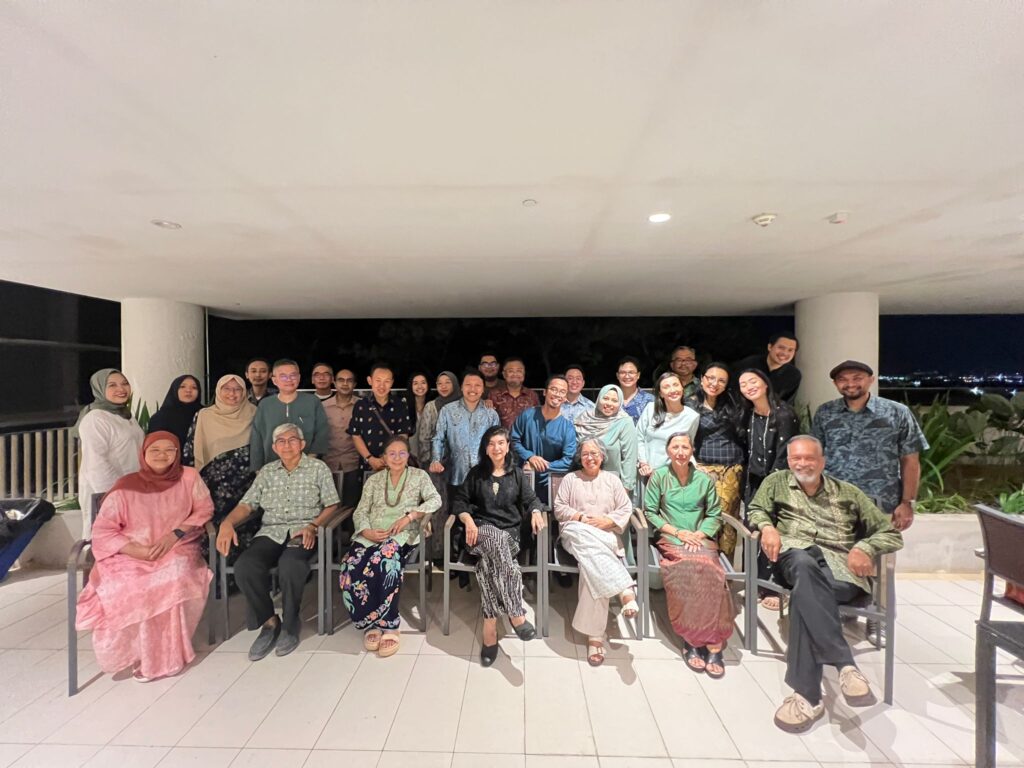
Sovereignty on Humans’ Hardwork
IN BRIEF | 10 min read
- Column on Suria News Online by Dr Azhar Ibrahim Alwee, Senior Lecturer from NUS Malay Studies.
Click through image below to read this piece.
This story first appeared in Suria News Online and NUSNews on 1 May 2024.
Remembering Juffri Supa'at - a Figure who Actively Contributed to SG Malay Language & Literature
IN BRIEF | 10 min read
- Column on Suria News Online by Dr Azhar Ibrahim Alwee, Senior Lecturer from NUS Malay Studies.
Click through image below to read this piece.
This story first appeared in Suria News Online and NUSNews on 19 April 2024.
Poetry: Kartini, Who Acted Bravely
IN BRIEF | 10 min read
- Column on Suria News Online by Dr Azhar Ibrahim Alwee, Senior Lecturer from NUS Malay Studies.
Click through image below to read this piece.

This story first appeared in Suria News Online on 21 April 2024 and NUSNews on 22 April 2024.
The Term “Raya Anak Dagang”
IN BRIEF | 10 min read
- Column on Suria News Online by Dr Azhar Ibrahim Alwee, NUS Malay Studies.
Click through image below to read this piece.
This story first appeared in Suria News Online and NUSNews on 7 April 2024.
Suratman Markasan: The Guardian and Weaver of Literature
IN BRIEF | 4 min read
- Column in Suria News Online by Dr Azhar Ibrahim Alwee, Lecturer from NUS Malay Studies.
Click through image below to read this piece.
These stories first appeared in Suria News Online and NUSNews on 23 March 2024.
NUS Malay Studies Society Opens Safe Space for Social Issue Discussions
IN BRIEF | 4 min read
- A story on the NUS Malay Studies Society in Berita Harian on 19 March 2024.
Click through image below to read this piece.
This article first appeared in Berita Harian and on NUSNews on 19 March 2024.
Dr Faizah Zakaria Receives John A. Lent Prize for Exceptional Scholarly Paper at AAS 2024 Conference

The NUS Malay Studies Society opens a safe space to discuss social issues
Unlike similar societies in other universities, NUSMSS prioritizes social issues within the Malay community. Through lecture series and forums, we aim to foster discussions and encourage critical thinking on topics related to Malay language and culture.
Click through the image below to read this piece

NUS Open House 2024 Attracts more than 8.4m visitors as Screens and Campuses Buzz with Action
IN BRIEF | 10 min read
- Open House 2024 returned to an enthusiastic reception as visitors turned up in force to experience one of NUS' largest events of the year. Held in a hybrid format from 2 to 9 March 2024 and pulled together by the efforts of 2,674 faculty, staff, students and alumni, the event attracted more than 8.4 million visitors - up from 7.7 million in 2023 - as they explored the comprehensive showcase of what NUS has to offer both online and in-person.

Open House 2024 returned to an enthusiastic reception as visitors turned up in force to experience one of NUS' largest events of the year. Held in a hybrid format from 2 to 9 March 2024 and pulled together by the efforts of 2,674 faculty, staff, students and alumni, the event attracted more than 8.4 million visitors - up from 7.7 million in 2023 - as they explored the comprehensive showcase of what NUS has to offer both online and in-person.
Kicking off the eight action-packed days was a slate of engaging virtual talks, webinars, and social media sessions. NUS Business School put together an informative line-up of virtual sessions featuring an Ask-Me-Anything session with its Vice Dean Associate Prof Chng Chee Kiong, an overview of the various majors with insights from faculty and students alike, and a glimpse of its vibrant student life via the Bizad Club.
At the online showcase by NUS Computing, prospective students joined a Discord live chat to get their questions answered by professors and student ambassadors on topics such as the differences between the school's five degree programmes. During a Zoom session by NUS Global, they heard about the University's exciting study abroad opportunities from students who embarked on exchange programmes with universities in Scotland, Canada, Switzerland and Hong Kong.
The on-campus segment on 9 March saw crowds throng the programme booths, talks, special classes, campus tours, student life performances and residential venues, with students gaining perspectives into all aspects of a world-class education at NUS, from the comprehensive curricula and career prospects to student life and global opportunities.
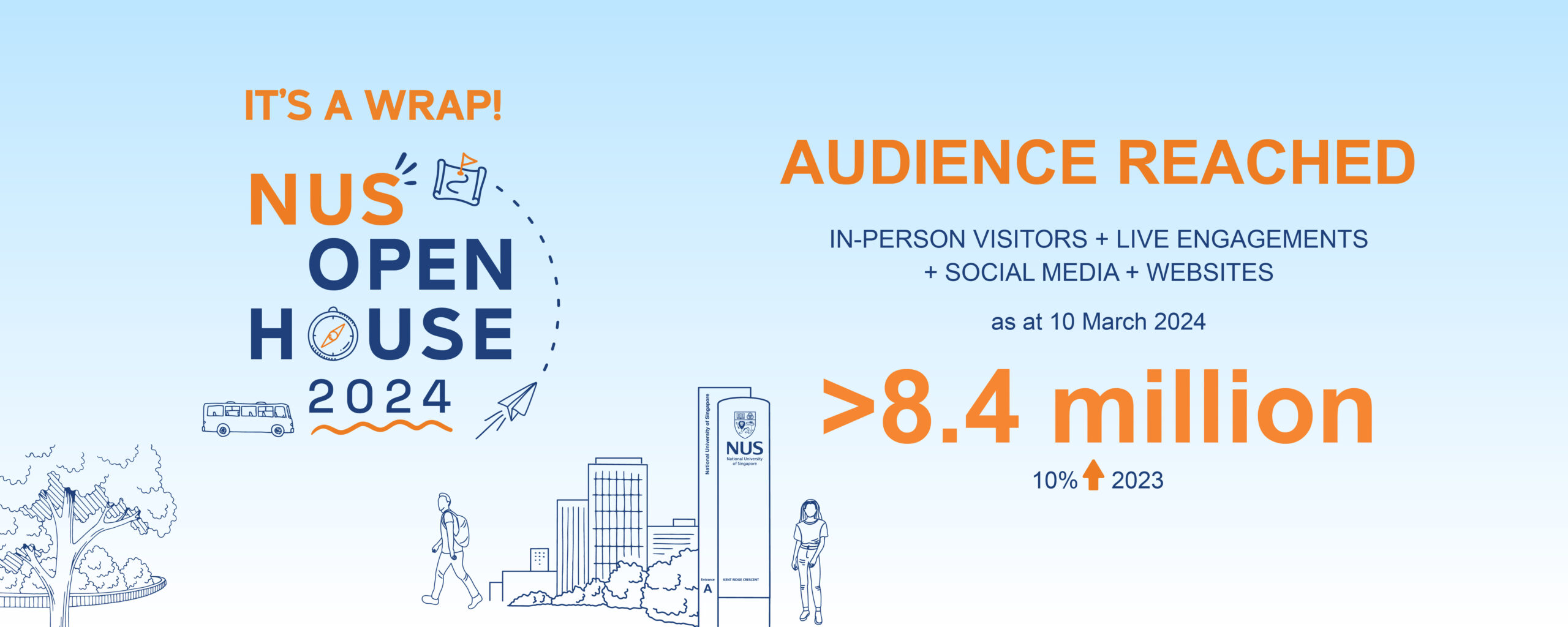
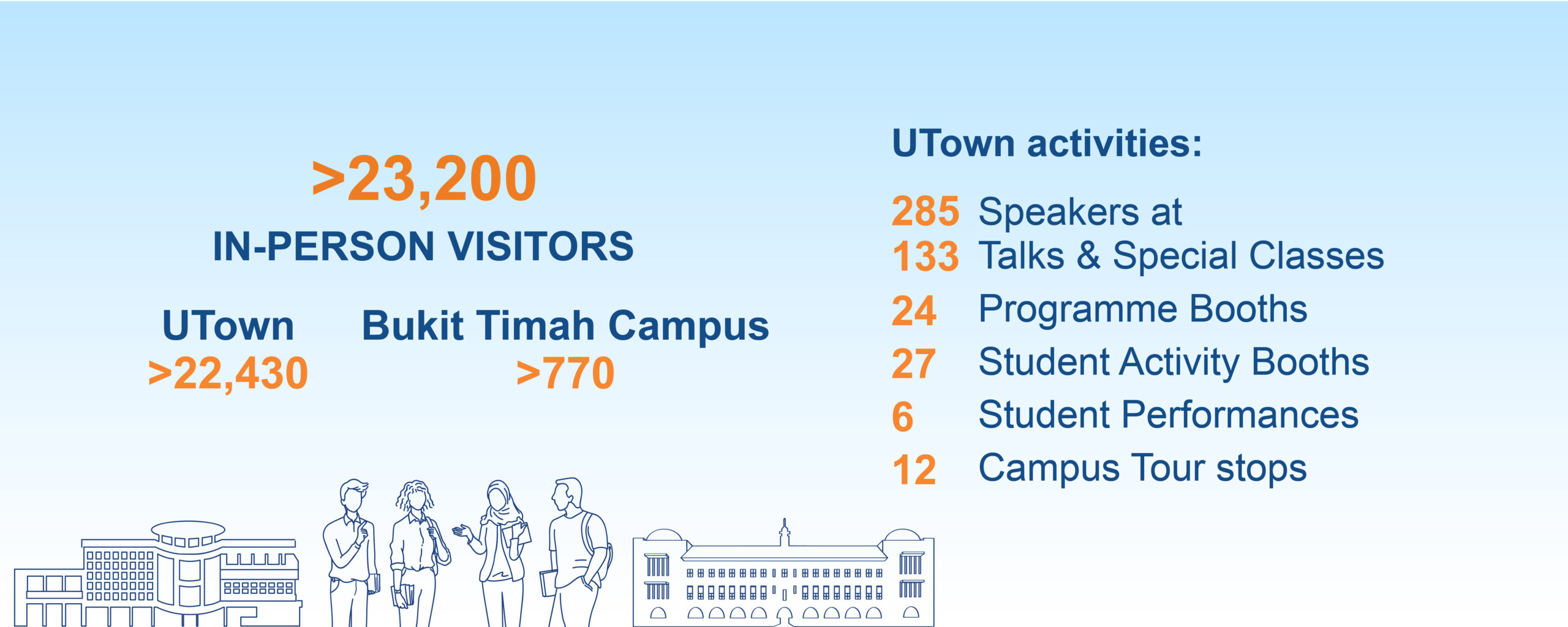


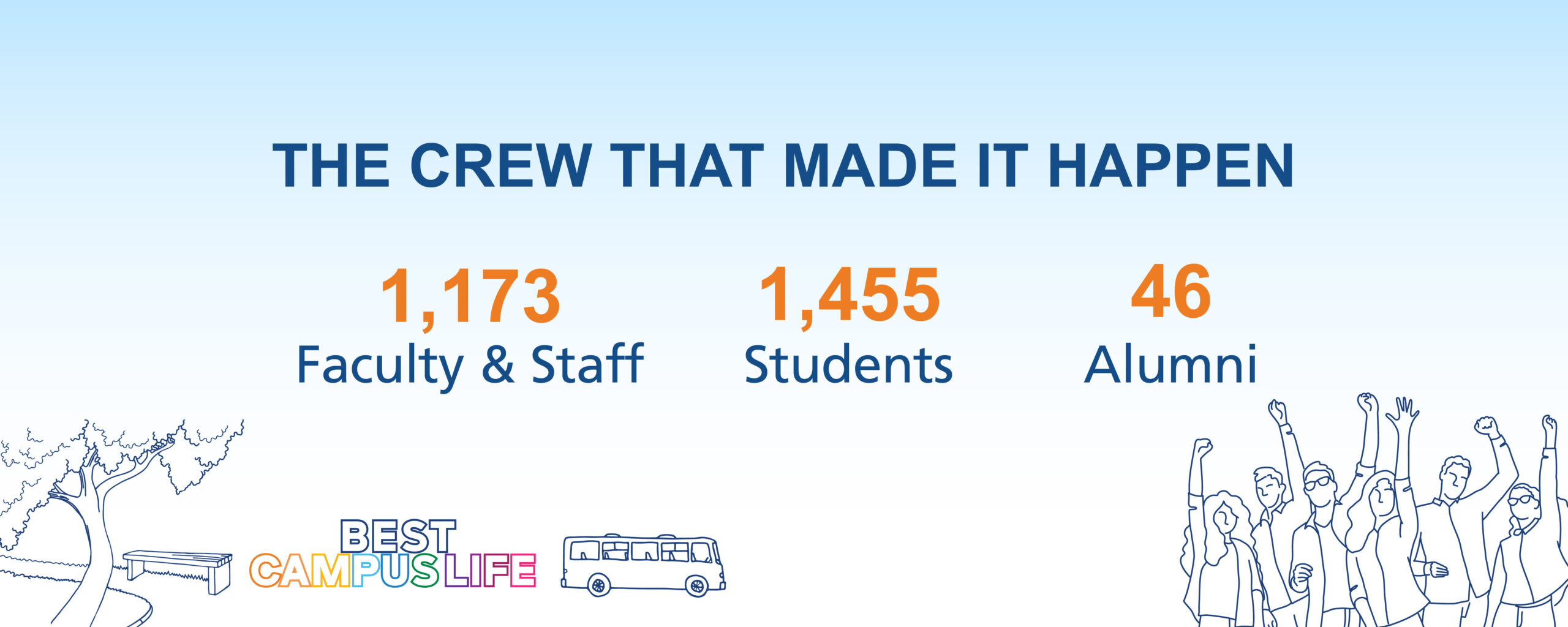 "The NUS Open House was an absolute delight! It provided me with invaluable insights into campus life and academic offerings," said prospective student Sim Wen Hao, who is currently in national service. "From informative discussions to first-hand testimonials, every interaction left me feeling more confident about my potential home away from home."
"The NUS Open House was an absolute delight! It provided me with invaluable insights into campus life and academic offerings," said prospective student Sim Wen Hao, who is currently in national service. "From informative discussions to first-hand testimonials, every interaction left me feeling more confident about my potential home away from home."

Charting pathways in humanities and sciences
The College of Humanities and Sciences (CHS), comprising the Faculty of Arts and Social Sciences (FASS) and the Faculty of Science (FOS), showcased how it is equipping students with skills to integrate knowledge across these domains and the wide range of programmes they can choose from through a variety of major and minor combinations.
An FASS panel featuring a Geography major, a Political Science major with a minor in Economics, a Philosophy major pursuing a Double Degree, and a Southeast Asian Studies major taking a minor in History dispelled misconceptions about their disciplines while discussing the potential career paths. Another joint talk by Psychology and Social Work on addressing mental health challenges in the 21st century explored how the issue is approached from their respective disciplines.

The boom in big data was the focus of the Data Science and Analytics talk that highlighted how the programme offers students industry exposure through real-world projects and internships. Another talk by the Environmental Studies Cross-Disciplinary Programme discussed its mission to develop environmental sustainability advocates keen to derive creative solutions to complex problems, along with its exciting fieldwork opportunities.
Lee Sue Ning, a Hwa Chong graduate who is interested in applying to Psychology, said of the FASS student panel: "The four students were from courses that I would never have considered. Hearing their experiences opened new doors for me, making me consider these courses as possible minors that I can take," she added.
Intersection of design and engineering
The talk on Chemical Engineering, Materials Science and Engineering, and Biomedical Engineering, held by the College of Design and Engineering (CDE) gave students valuable insights on the curriculum and disciplines, as well as showcased students' research. In an Ask-Me-Anything panel, the professors also shared about the flexibility of the curriculum, future career prospects, intersections between the various fields of engineering, and their thoughts on the most challenging yet rewarding aspects of taking a degree in Engineering.

The talk on Architecture, Industrial Design, and Landscape Architecture gave students the inside scoop on how the programmes provide the core foundation, training, skills, and knowledge for students to become the next generation of effective and innovative architects and designers.
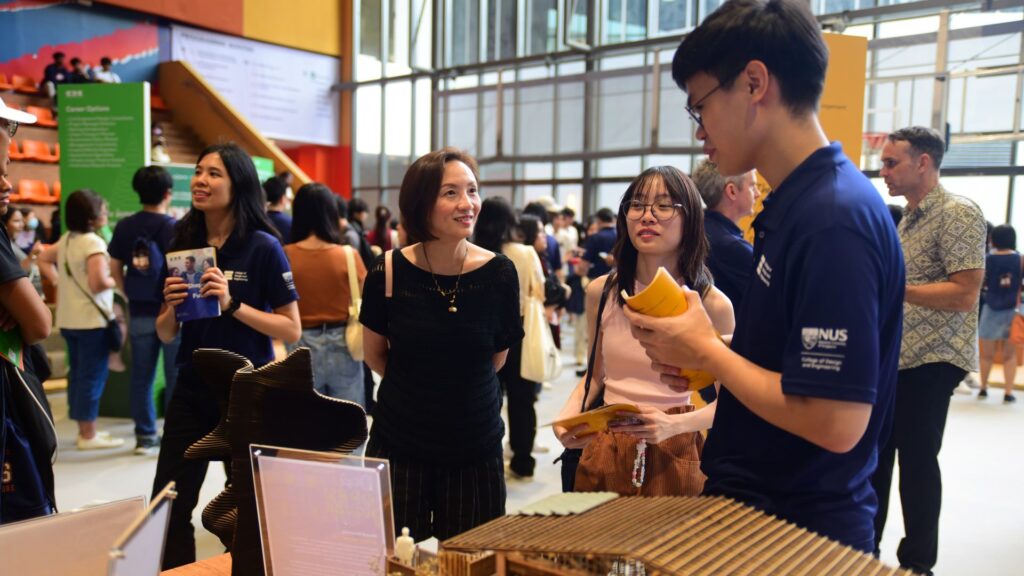
Over at SDE3, CDE's Built Environment Research Tour took participants behind the scenes-from live demonstrations of how 5G robotics reduce manpower and increase efficiency, to a lab tour of NUS' hydraulics laboratory facilities to explore wave mechanics and how natural coastal ecosystems like mangroves can protect shorelines against climate change. Students also participated in a hands-on session to design their own shoreline adaptation, choosing from models of nature-based solutions as well as traditional infrastructure.

"It was nice to be able to see the facilities and get an idea about what Singapore is currently trying to improve on-designing a world with humans and robots, and coastal protection," Nur Annatasyia Binte Joferi, from Singapore Polytechnic, said. "It made me think about how things will progress and what comes next after those goals are met."
Immersive learning experiences
NUS College offered prospective students a window into its extensive interdisciplinary education that blends small-group seminars with experiential learning and a rich residential immersion through special classes on topics such as love, food, and even Shakespeare's plays. During Dr Chan Chi Wang's class on quantifying facial attractiveness using mathematics and statistical methods, prospective students busily plotted measurements of facial features on graph paper. In Associate Professor Stuart Derbyshire's class, they decoded mysterious sounds and intriguing illusions - sometimes with the aid of 3D glasses - understanding the science behind brain mechanisms that influence our perception.

Foo Jun Wei, a Hwa Chong Institution graduate who will be joining Computer Science and NUS College, came away with useful information on what to expect as an incoming NUS student. "I enjoyed taking part in the guided tour where I got to see first-hand the facilities and accommodations that NUS College provides, as well as the immersive sample lesson on quantifying facial attractiveness. Above all, I was glad to be able to clarify my existing doubts and seek advice from the friendly student ambassadors on the ground," he added.

Over at Bukit Timah Campus, visitors to NUS Law had the choice of two masterclasses on criminal justice and conflict resolution approaches. At its mock moot sessions, visitors sat attentively in the gallery witnessing a simulation of a court case.
Mastering the 'heart' and science of healthcare
Prospective students interested in Medicine, Dentistry, Nursing and Pharmacy had the chance to find out about the new Common Curriculum for Healthcare Professional Education, which has been designed to align with Singapore's shift towards preventive healthcare. Aside from touching on the Common Curriculum, talks by NUS Medicine offered an overview of its academic journey, highlighting features such as its strong mentorship support and Pathway programmes aimed at broadening their skill sets. During a special class by NUS Nursing, visitors tried out basic nursing skills like using a stethoscope and learnt the importance of collaboration between healthcare professionals.

Prospective students interested in Medicine, Dentistry, Nursing and Pharmacy had the chance to find out about the new Common Curriculum for Healthcare Professional Education, which has been designed to align with Singapore's shift towards preventive healthcare. Aside from touching on the Common Curriculum, talks by NUS Medicine offered an overview of its academic journey, highlighting features such as its strong mentorship support and Pathway programmes aimed at broadening their skill sets. During a special class by NUS Nursing, visitors tried out basic nursing skills like using a stethoscope and learnt the importance of collaboration between healthcare professionals.
The interactive Pharmacy masterclass, titled "Unveiling the Pillars of Pharmacy: The Science and Art of Medication Therapy", saw prospective students participate in the decision-making process of a real-life clinical case study. They also gained insight into how NUS Pharmacy structures its curriculum to incorporate live interactive classes, science practicals, skills labs, and collaborative learning workshops, to help students apply concepts in real case studies.
Prospective student Wong Hon Wei from Anderson Serangoon Junior College said, "The Pharmacy masterclass was quite enjoyable yet unique, as the way the collaborative learning workshop was structured was engaging, incorporating the Biology and Chemistry concepts learnt in classrooms into real-world medical applications."
Innovating solutions for society and the world
Another popular feature at this year's Open House was the Innovation and Impact Hub, which showcased groundbreaking projects by students from CDE, Chua Thian Poh Community Leadership Centre, NUS College, and FOS that are making a tangible impact on society and the world.

Visitors caught the interactive projects in action, from The Moving Farm, a movable modular tower system for hydroponics farming that increases crop yield sustainably, to TinkerThings, a project on AI-based gamified activities innovated to improve seniors' mental wellbeing and cognitive faculties.
Aside from exploring academic pathways, visitors also discovered NUS Enterprise's suite of entrepreneurship initiatives, including the NUS Overseas Colleges, NUS Enterprise Summer and Winter Programmes in Entrepreneurship, and incubation hub THE HANGAR.
At a panel session on student entrepreneurship, prospective students heard from NUS alumni who founded three start-ups - Pitchspot, Wateroam and Skilio. The founders shared how their involvement in Enterprise's entrepreneurship programmes and the support they received through the HANGAR enabled them to nurture their business ideas.
Exciting array of student and residential life activities
Over at the Student Village, a smorgasbord of vibrant student performances took Town Plaza by storm throughout the day, treating visitors to an exhilarating kaleidoscope of talent from student clubs and interest groups.

Getting a glimpse of the diverse student life opportunities that await, visitors were hyped up by the energetic cheerleading displays of King Edward VII Hall's KE Titans, the snazzy beats of NUS Rappers, and the slick dance moves of the NUS Korean Cultural Interest Group. They were also serenaded with catchy tunes from the Sheares Hall band, a capella group NUS Resonance, and NUS Fingerstyle Guitar.
On top of A-Day-in-the-Life videos and 360° virtual tours of the various Residential Colleges, Halls, and Houses, Masters and student representatives from the residences mingled with prospective students at the booths, talks, and Ask-Me-Anything panels, where they shared their insights and anecdotes on the on-campus experience, as well as the distinct culture of each residential unit.
Along with offering guided in-person tours and simulated classes, the residential units also showcased the interest groups available. Other engaging activities, such as Tembusu College's live performances and Ridge View Residential College's sports experience zones, coffee pour demonstrations, and warli art making gave prospective students a taste of the many facets of holistic residential life.

Prospective students Inez Ang from National Junior College and Vishnu Raj from Millennia Institute said the residential showcase gave them a better picture of living on campus.
Runyi Zhang, a graduate of St Andrew's Junior College who is applying to Business, said she had an enlightening experience sampling both the academic and extracurricular options. "Through the Open House, I've managed to capture a glimpse of student life in NUS… allowing me to have a clearer and more vivid image of what my future could be like here," she added.
This story first appeared in NUSNews on 14 March 2024.
Will we see the rise of Malaysian-style constitutional monarchy system?
IN BRIEF | 10 min read
- A column in Lianhe Zaobao by Ms Liaw Pey Wen, PhD student from NUS Malay Studies.
Click through image below to read this piece.

This article first appeared in Lianhe Zaobao and on NUSNews on 6 March 2024.
NEW PUBLICATION: Shapers of Islam in Southeast Asia : Muslim Intellectuals and the Making of Islamic Reformism
Shapers of Islam in Southeast Asia
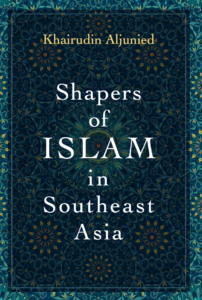 Muslim Intellectuals and the Making of Islamic Reformism
Southeast Asia is home to one of the largest Muslim populations in the world today. The region has also produced a cohort of reformers who have critiqued the limits of Islamic thought and propounded new lines of thinking with an eye toward constructing a better ummah.
Shapers of Islam in Southeast Asia captures the progressive and pluralistic nature of Islamic reform in Southeast Asia from the mid-twentieth century onward, a period that can now be regarded as the age of networked Islam. Offering a fresh conceptualization, the book shows how several influential Muslim intellectuals have given rise to an "Islamic reformist mosaic" in Southeast Asia. Representing different strands of reformist thinking, these shapers of Islam have constructed a unified and coherent frame of thought that distinguishes itself from the ultra-traditionalist and ultra-secularist leanings. This fascinating study is indispensable to anyone interested in understanding the challenges facing Islam and other religions in the modern world.
Khairudin Aljunied is a Professor of Southeast Asian Islamic and Intellectual History at the University of Brunei Darussalam and Senior Fellow at the Alwaleed Centre for Muslim-Christian Understanding at Georgetown University. A recognized specialist in the study of Islam in Southeast Asia, he is the author and editor of thirteen books, most recently Islam in Malaysia: An Entwined History (2019) and The Handbook of Islam in Southeast Asia (2022).
Muslim Intellectuals and the Making of Islamic Reformism
Southeast Asia is home to one of the largest Muslim populations in the world today. The region has also produced a cohort of reformers who have critiqued the limits of Islamic thought and propounded new lines of thinking with an eye toward constructing a better ummah.
Shapers of Islam in Southeast Asia captures the progressive and pluralistic nature of Islamic reform in Southeast Asia from the mid-twentieth century onward, a period that can now be regarded as the age of networked Islam. Offering a fresh conceptualization, the book shows how several influential Muslim intellectuals have given rise to an "Islamic reformist mosaic" in Southeast Asia. Representing different strands of reformist thinking, these shapers of Islam have constructed a unified and coherent frame of thought that distinguishes itself from the ultra-traditionalist and ultra-secularist leanings. This fascinating study is indispensable to anyone interested in understanding the challenges facing Islam and other religions in the modern world.
Khairudin Aljunied is a Professor of Southeast Asian Islamic and Intellectual History at the University of Brunei Darussalam and Senior Fellow at the Alwaleed Centre for Muslim-Christian Understanding at Georgetown University. A recognized specialist in the study of Islam in Southeast Asia, he is the author and editor of thirteen books, most recently Islam in Malaysia: An Entwined History (2019) and The Handbook of Islam in Southeast Asia (2022).Japanese, Chinese Students Follow the Rhythm of the NUS Malay Dance Group
IN BRIEF | 10 min read
- Report in Berita Harian on the multicultural, multinational membership of the NUS Malay dance group Ilsa Tari by student Nur Zakirah Rosman (NUS Sociology and Anthropology and NUS Malay Studies).
Click through image below to read this piece.
This article first appeared in Berita Harian and on NUSNews on 6 February 2024.
Malay Kampung House on Ubin Restored
IN BRIEF | 9 min watch
- The completion of the restoration of house number 22E in Kampung Surau on Pulau Ubin was announced on Saturday (25 November 2023). Work on it is part of a wider effort to conserve the Malay village houses on the island, and preserve the heritage of village life in Singapore
- Dr Imran Tajudeen (NUS Malay Studies and NUS Architecture), who in his own personal capacity has contributed to the rebuilding of the house especially in its architectural design, construction, and historical perspective by engaging the previous family of the house in the orientation of the rooms, furniture and colours.
- This project was also a further development from the architectural and social history documentation of selected houses on Pulau Ubin by students at the NUS Architecture led by Dr Imran in 2018.
Click through image below to read this piece.
This article first appeared in Berita Harian on 25 November 2023.
127 Recipients Honoured at Ceremonies Celebrating the Best of Student Achievements
IN BRIEF | 8 min read
- Smiles, hugs and congratulatory handshakes were all in order at the NUS University Cultural Centre on 27 and 28 October 2023, as NUS recognised the best of student achievements at the Tan Ean Kiam Arts Awards and the NUS Achievement Awards (NAA). A total of 127 recipients were honoured over the two evenings for their contributions to student life in the Academic Year 2022-2023.
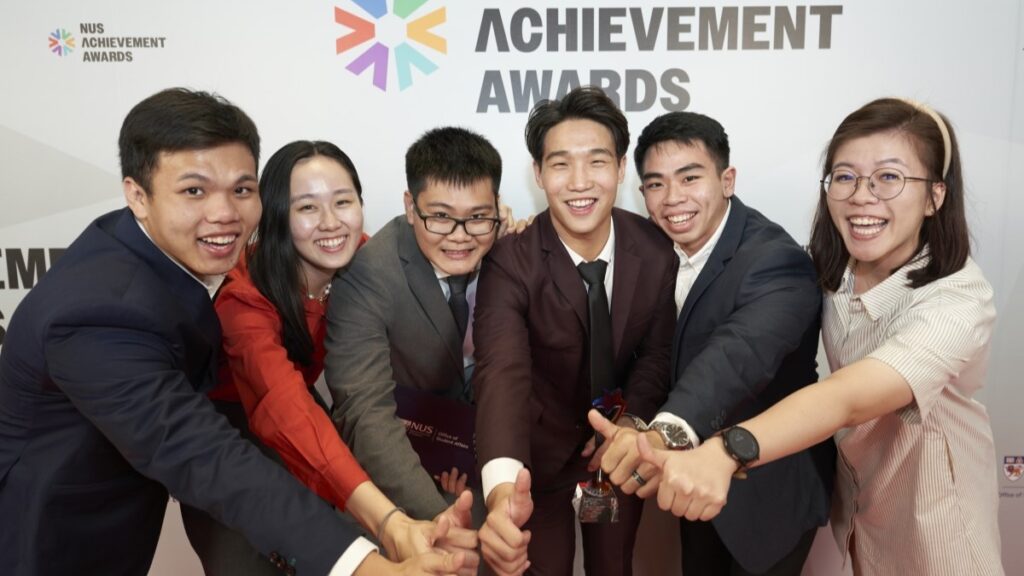
Smiles, hugs and congratulatory handshakes were all in order at the NUS University Cultural Centre on 27 and 28 October 2023, as NUS recognised the best of student achievements at the Tan Ean Kiam Arts Awards and the NUS Achievement Awards (NAA). A total of 127 recipients were honoured over the two evenings for their contributions to student life in the Academic Year 2022-2023.
The NUS Achievement Awards (NAA), formerly known as the Student Life Awards, is the most prestigious and only University-level award honouring the exceptional achievements of student life beyond academics. The Awards were renamed in 2023 to reflect and celebrate the full range and diversity of student life overseen by the NUS Office of Student Affairs.

Guest-of-Honour NUS President Professor Tan Eng Chye, who opened the awards ceremony, commended the student leaders for their exceptional contributions during his speech.
"It is a fitting and joyous occasion, to celebrate the unique journeys of our students, how you have grown in mettle to scale new heights in what you set out to do," said Prof Tan. "This evening, the recipients of the NAA are outstanding individuals; they are role models and an inspiration to the NUS community. Not only have they excelled academically, but they are also trailblazers."
Excelling Beyond AcademicsAccolades in Community Impact, Sports, Competitions (General) and Leadership were given out in three tiers - Commendation, and where applicable, Merit and Distinction.
Coming up on top at this year's NAA were three outstanding students who were honoured with Distinction awards for their achievements in various fields:
- Competitive sports shooter Adele Tan Qian Xiu (Communications and New Media, Class of 2023) was awarded the Sportswoman of the Year Distinction award. While pursuing her studies at NUS, she represented Singapore on the international stage, including at the Southeast Asian Games, the Asian Games, and the 2020 Summer Olympics in Tokyo.
- Ryan Quah Kun Hao (Year 5, Department of Architecture) received the Distinction award in the Competitions (General) category. He is making his mark in the Architectural field, having won Gold at Nippon Paint's Asia Young Designer Awards in 2022.
- Final-year Social Work undergraduate Tan Wei Shuang received the Distinction award for her leadership as the two-term President of the NUS Community Service Club.
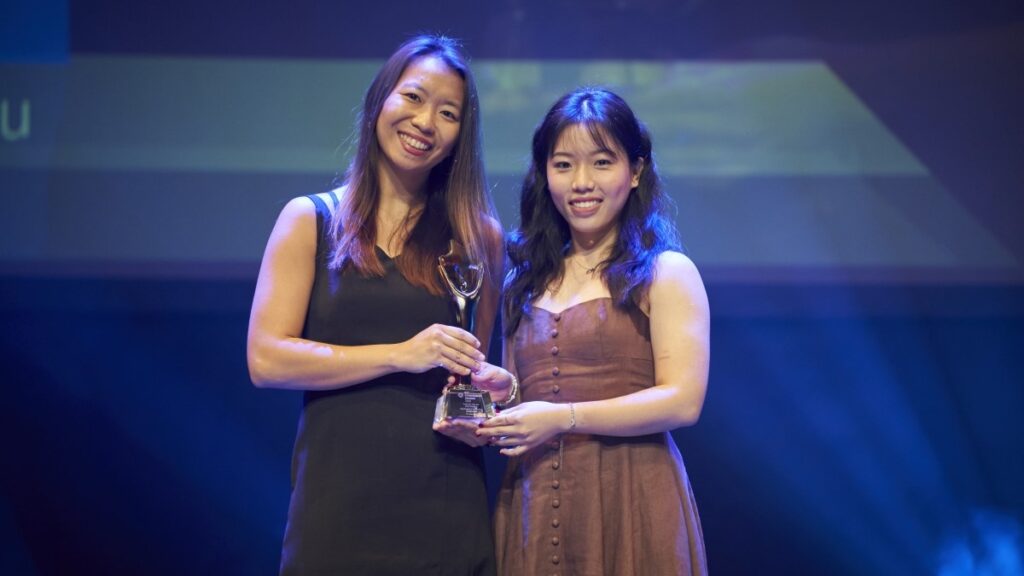
The honourees received their trophies from recipients of the same award in previous years, signifying the passing of the baton from one generation of outstanding student leaders to another. Likewise, the newly minted Distinction award recipients offered words of advice to budding student leaders in the audience.
"This award is only possible because of the efforts of all NUS Community Service Club members, and I would like to thank them for the opportunity to lead a meaningful student club," said Wei Shuang.
"To all juniors, I truly enjoyed my student life being a student leader and learnt a lot more about myself outside of academia. I encourage all of you to step forward and give yourself a chance to try some leadership roles," she added.

The NAA also included the Campus Choice Awards, which are awarded to recipients through voting by the NUS community. Pearlyn Koh (Year 2, NUS Business School), Women's Captain of both the NUS Table Tennis team and the SunNUS team from NUS Students' Sports Club, emerged victorious in the individual and group categories after a month-long campus-wide online campaign.

The evening's ceremony also celebrated 12 Staff Advisors who have offered their support and wisdom to various student groups at NUS throughout the year. The awards also recognised student organising teams of university-wide projects such as the Inter-Faculty and Inter-College Games, as well as NUSSU Rag & Flag Day, an event exemplifying the vibrancy of campus life, in the Recognition category.

Celebrating the Brightest Stars in Arts and Culture

The Tan Ean Kiam Arts Awards on 27 October was a memorable night for Malay dance group NUS Ilsa Tari, which bagged the Group of the Year award. In addition, former NUS Ilsa Tari President (Academic Year 2022-2023) Muhammad Hariz Bin Emran also took home top honours as Student of the Year.
The Tan Ean Kiam Arts Awards celebrates student achievements in arts and culture in six categories, all of which had a respective distinction award winner this year.
- Student of the Year: Muhammad Hariz Bin Emran, President of NUS Ilsa Tari (AY22/23). Hariz is a Year 3 undergraduate at the Department of Malay Studies, with a second major in Communications and New Media.
- Group of the Year: NUS Ilsa Tari, the university's Malay dance group. With strong foundations in various traditional Malay dance forms, as well as the traditional Malay martial art of Silat, NUS Ilsa Tari experiments with both traditional and contemporary Malay dance to push the boundaries of creativity and modernity.
- Original Work of the Year: Bairagi by the NUS Indian Instrumental Ensemble.
- Production of the Year: Essentially Macbeth byNUS Chinese Drama and NUS Chinese Orchestra.
- Outstanding Community Arts Project of the Year: Helping Hands, Moving Bodies 3.0 by NUS Dance Synergy.
- Outstanding Alumni Recognition Award: Since graduating, Ms Ong Xue Min (Economics, Class of 2019), a founding member of NUS Stage Alumni, has held several masterclasses on improvisation and acting for NUS students.
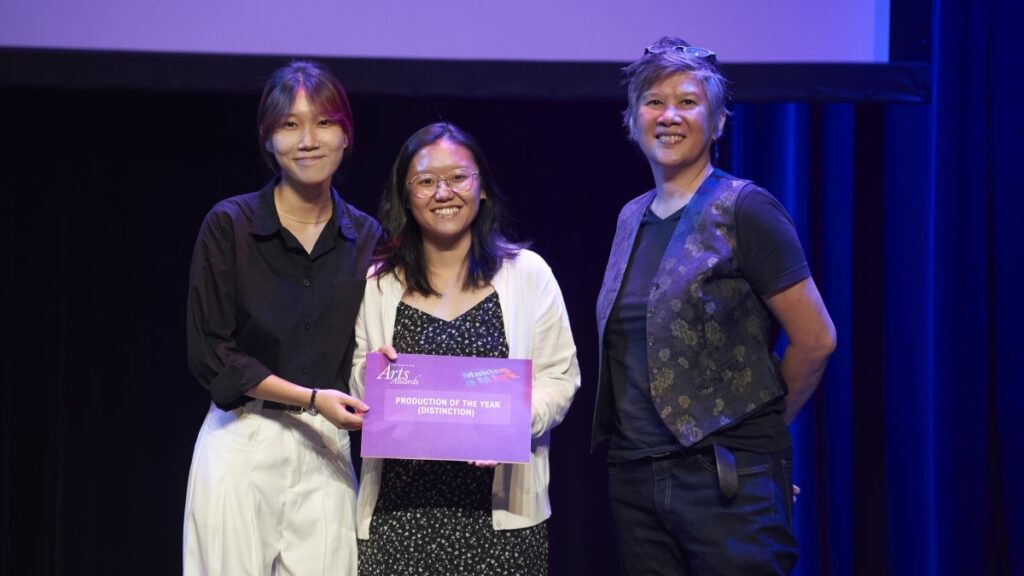
Essentially Macbeth, which won the Production of the Year Distinction award, is a first-of-its-kind collaboration between NUS Chinese Drama and NUS Chinese Orchestra. Staged as a play-within-a-play, the performance follows the lives of young graduates who reconnect with theatre after a prolonged absence, questioning the relevance of the arts in our everyday lives.
Jin Jianzuo and Liew Chet Ming, President of NUS Chinese Drama and Vice-President of NUS Chinese Orchestra respectively in Academic Year 2022-2023, expressed their gratitude for the opportunity to have worked together to create Essentially Macbeth, and to NUS for honouring student achievements through an awards ceremony, a celebration shared by their parents, coaches and peers.
"These awards serve as an affirmation and recognition for the efforts that the students have put in," said Jianzuo, who is also a Year 3 student majoring in Data Science and Analytics. "It also makes us, the student leaders, believe that whatever we have done is truly meaningful," she added.
Moving Ahead TogetherArts groups have much to look forward to in 2024, when the arts category is integrated into the NAA, combining both ceremonies into one event to honour and celebrate the best student achievements beyond academics, cementing the role of student life as an essential part of a holistic university experience.
"I'm happy to hear that the arts are being included as part of the NAA from next year onwards," said Chet Ming, a Year 3 undergraduate at the College of Humanities and Sciences majoring in Chemistry and History.
"I've always believed that the arts have the potential to change people and make an impact on communities, and it's great that its influence is being recognised in a university-wide platform such as the NAA!" he enthused.
Watch the Event Highlights!
This story by the NUS Office of Student Affairs appeared in NUSNews on 8 November 2023.
NUS Alumni Awards 2023: Celebrating Outstanding Changemakers and Trailblazers
IN BRIEF | 8 min read
- NUS honoured the achievements of 21 outstanding alumni and three alumni teams comprising another 14 alumni, at the prestigious NUS Alumni Awards 2023.
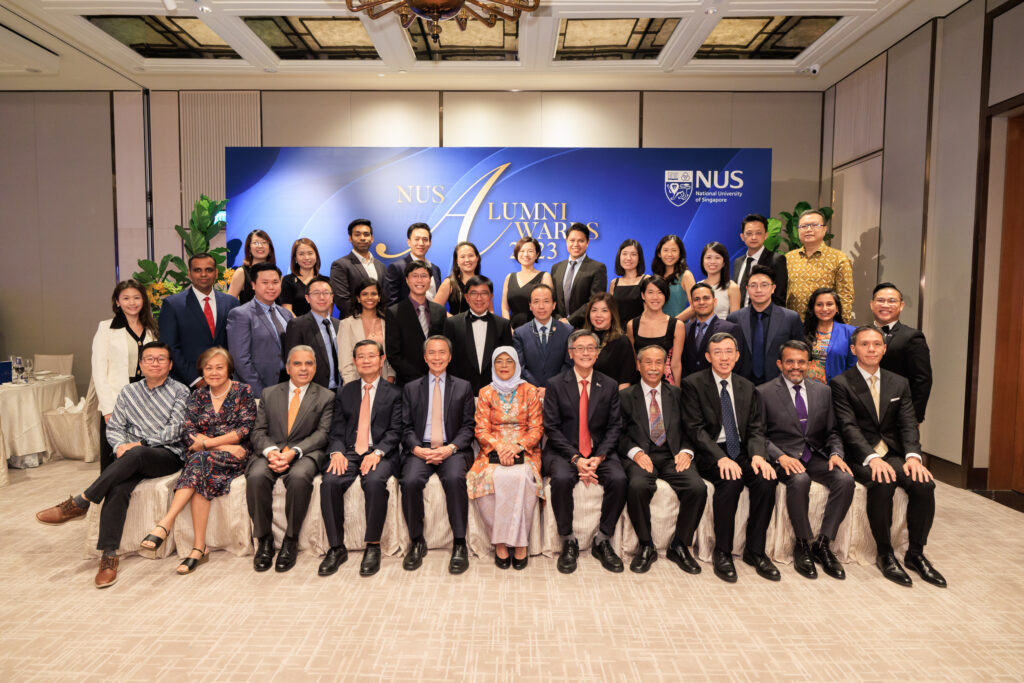
Twenty-one individual alumni and three alumni teams, comprising another 14 individuals, were honoured at the NUS Alumni Awards 2023 on 2 November.
Now in its 10th edition, the biennial NUS Alumni Awards recognise alumni who have distinguished themselves through significant and impactful contributions to their alma mater, society and the world.
Speaking at the celebratory event, NUS President Professor Tan Eng Chye noted that the award recipients have, “not only found success in their respective fields, but elevated what it means to be an alumnus or alumna of our institution: their achievements have enriched our culture, advanced our science, deepened our humanity, and bettered our society”. Read Prof Tan's speech here.
Eminent Alumni AwardThe Eminent Alumni Award was conferred on Mdm Halimah Yacob, former President of the Republic of Singapore, for her achievements in public service, as well as her exemplary service to the University as the former Chancellor of NUS from 2017 to 2023. Mdm Halimah Yacob
Mdm Halimah graduated in 1978 with a Bachelor of Laws from the University of Singapore and obtained her Master of Laws from NUS in 2001. She spent 33 years with the labour movement, rising to become Deputy Secretary-General of the National Trades Union Congress (NTUC). In 1999, she became the first Singaporean elected to the International Labour Organisation (ILO), where she served for 12 years, representing workers globally. She entered politics in 2001, serving as a Member of Parliament until 2017. In a career filled with firsts, she became the first woman appointed Speaker of Parliament in 2013; and the first woman to be elected President of Singapore in 2017, a role she held until 2023. For her service, she was conferred the Order of Temasek (With High Distinction), the nation’s highest civilian honour, this year.
As Chancellor of the University, Mdm Halimah conferred close to 76,000 undergraduate, master’s, doctorate and honorary degrees over six years, and presided over the Main Commencement ceremonies for graduates and honorary graduates. She also graced various NUS events, including NUSSU Rag & Flag Day 2018, NUS Bizad Charity Run 2020, the Bukit Timah Homecomings of 2018 and 2022, the Institute of Policy Studies’ Women’s Conference in 2021, and the 52nd UM-NUS Inter-University Tunku Chancellor Golf Tournament in 2023.

Delivering the citation for Mdm Halimah’s conferment, Prof Tan commended Mdm Halimah as an “inspiring leader” and “trailblazing alumna”, noting her “unwavering dedication to advancing the lives of individuals and communities, particularly the underprivileged”. Read the citation here.
“I am deeply honoured to receive the Eminent Alumni Award from my alma mater. NUS has played a formative role in my life, shaping not only my academic development but the values I have carried throughout my career,” said Mdm Halimah.
Watch this tribute video on Mdm Halimah’s contributions to the University and Singapore.
Distinguished Alumni Service AwardEight NUS alumni were conferred the Distinguished Alumni Service Award for their achievements in their chosen fields, as well as their excellent volunteer service to NUS, its predecessor institutions and/or the community.
These award recipients were:
- Professor Kishore Mahbubani (NUS Philosophy '71), Distinguished Fellow at NUS Asia Research Institute
- Mr Kok Heng Leun, founder of the Drama Box theatre group
- Ms Janet Lim Yuen Kheng (NUS Sociology, 75), former Assistant High Commissioner (Operations) at the United Nations High Commissioner for Refugees (UNHCR)
- Justice Andrew Phang Boon Leong, Senior Judge of the Supreme Court of Singapore
- Mr Ravi Menon (NUS Economics '87), Managing Director of the Monetary Authority of Singapore
- Mr Brian Tan Kai Piang, Regional President of Applied Materials Southeast Asia
- Mr Wong Kan Seng (NUS History and English '70), former Deputy Prime Minister of Singapore
- Mr Yatiman Bin Yusof (NUS Geography and Malay Studies '72), High Commissioner of Singapore to Kenya and Malay language champion
Twelve young NUS alumni were honoured for their achievements and outstanding contributions to their chosen fields.
These award recipients were:
- Dr Aishwarya Bandla, Regional R&D Manager at Paxman Coolers
- Ms Akanksha Batura Pai, Head of Strategy and Growth at Sinoda Shipping Agency
- Dr Rena Dharmawan, Assistant Dean and Assistant Professor at Duke-NUS Medical School
- Mr Faris Bin Ridzuan (NUS Sociology '15), academic tutor at the National University of Singapore
- Dr Izzuddin Bin Mohd Aris, Assistant Professor at Harvard Medical School and Harvard Pilgrim Healthcare Institute
- Mr Khoo Yi Feng (NUS Southeast Asian Studies and Psychology '17, Social Work (postgraduate diploma) '20), social worker and mental health advocate
- Mr Kwok Ka Ming Andre, founder of Good City Foundation
- Mr Samson Leo, Chief Legal Officer of Fazz
- Mr Raghuram Natarajan, Chief Executive Officer of Blueleaf Energy
- Mr Seah Li Song Shawn (NUS Economics '10), local history author
- Dr Shravan Verma, Co-founder of Speedoc
- Ms Frances Tho Siao Ting, Vice President of Sales at Numerix
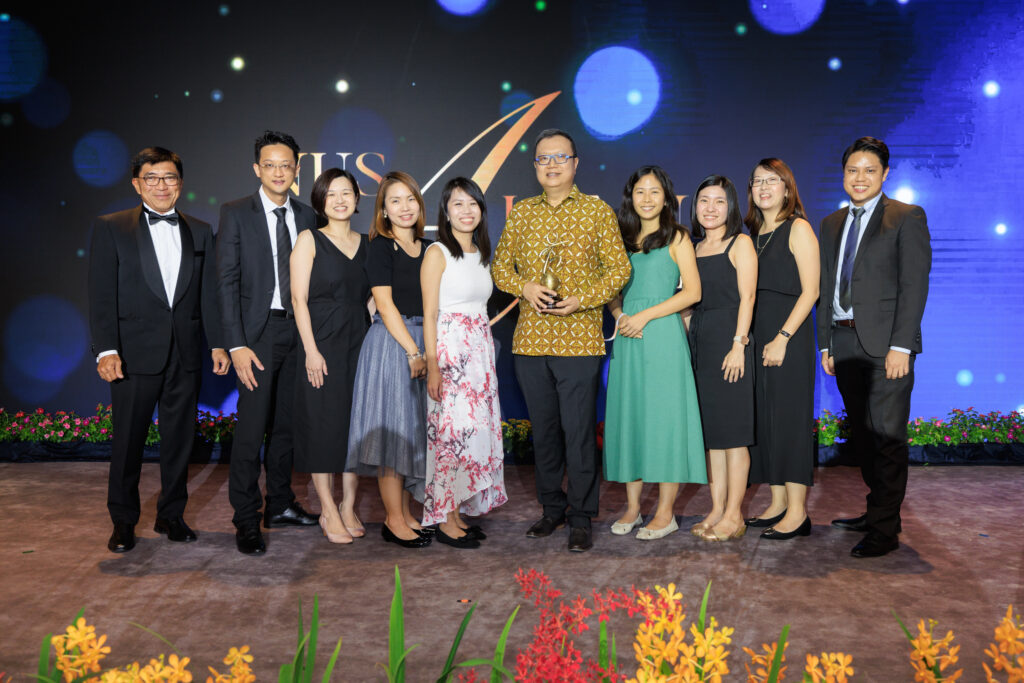
Team (Alumni) Award Recipients
The Team (Alumni) Award recognises the outstanding achievements of alumni teams who have collectively distinguished themselves in their chosen fields.
Three awards recipients were:
- Co-founders of Growthbeans: Ms Shamantha Yan Shiya (NUS Sociology '09) and Ms Shane Yan Shiyan (NUS Psychology '09)
- Co-founders of Janio Asia: Mr Ng Jun Kai and Mr Nathaniel Asher Yim
- REACH (Response, Early Intervention and Assessment in Community mental Health) Team, Institute of Mental Health: Ms Esther Chew Yuki (FASS '14), Dr Daniel Fung Shuen Sheng, Mr Ho Weng Siong (FASS '16), Ms Li Jiaying Grace, Mr Ong Guo Xiong Jeffrey (FASS '09), Ms Ong Tze-I Cheryl (FASS '08), Ms Sim Si Lin (FASS '12), Ms Tan Ke Jia (FASS '03), Mr Tan Zheng Xin, Jason (FASS '08) and Ms Kelly Yeo (FASS '07)
Read more about the NUS Alumni Awards 2023 recipients here and here.
This story by the NUS Office of Alumni Relations first appeared in NUSNews on 2 November 2023.
Assistant Professor and Associate Professor (Malay World Studies)
Assistant Professor and Associate Professor (Malay World Studies)
The Department of Malay Studies at the National University of Singapore (NUS) seeks to appoint outstanding candidates for the following two positions: Assistant Professor (on tenure track) and Associate Professor (with tenure). Those seeking to apply must have expertise on the Malay-Indonesian region as well as strong credentials in at least one discipline in the social sciences or humanities. Research accomplishments and linguistic mastery on a wider plane of studies to include Malay world connections and comparisons with the Arabic-Persian, Mediterranean, East Asian and Indian Ocean worlds, including the global Malay diaspora, would be an added strength. Candidates are also expected to have competence or a strong potential in conducting inter-disciplinary research and teaching to fit into the larger vision of the College of Humanities and Sciences in which the department is housed. Application Process To apply, please submit the following as a package:- Cover letter explaining your interest in the specific position and how your qualifications and plans fit into the long-term advancement of the department of Malay Studies
- Curriculum vitae
- Statement of your teaching expertise, and a proposed curriculum design for a course in the field of Malay World Studies and/or a course with inter-disciplinary contents and approach.
- Evidence of teaching experience (sample syllabi, student feedback, teaching awards).
- Two to three writing samples
- Other strong evidence to demonstrate your publication potential (in the case of hire at Assistant Professor level)
- Statement of your research and publication plan
- Statement describing your personal qualities and prior experience in leadership and collaborative work.
- A list of 8 to 10 names of referees (with affiliation, contact details and connection to applicant). For the position of Assistant Professor, you may provide a list of 3 to 5 names. They will be invited to submit their recommendation only if a candidate is shortlisted.
Journeying through Maritime Southeast Asia on the NUS Southeast Asia Friendship Initiative
IN BRIEF | 8 min read
- As part of the new Southeast Asia Friendship Initiative, students from various NUS halls, residential colleges and houses went on experiential study trips to countries in the region.

With a population of almost 640 million people, Southeast Asia (SEA) is one of the most culturally diverse regions in the world. To further explore this region, students from various NUS halls, residential colleges and houses embarked on inaugural experiential study trips to neighbouring SEA countries, spanning 10 weeks from May to July this year, as part of the new Southeast Asia Friendship Initiative (SFI) under the auspices of the Office of the Provost and NUS Global.
Focusing on the United Nations Sustainable Development Goals (UN SDGs), SFI aims to expose students to real issues and challenges faced by Southeast Asian communities, while fostering a deeper appreciation of the diverse cultures, histories and complexities in the region.
“SFI blends classroom teaching and a carefully curated study trip in the targeted country to help students gain insights into the history, culture, peoples, and potential of Southeast Asian countries,” explained NUS Associate Provost (Special Projects) Associate Professor Melvin Yap, who is also Chief of SFI.
Reflecting on the intent of the SFI, Associate Vice President (Global Relations) Associate Professor Reuben Wong added, “We hope that through SFI, NUS students will build long-term friendships and connections, appreciate the challenges and opportunities in the region; and that many more NUS graduates will work and live in SEA countries.”
Tapping on the academic expertise of the NUS Southeast Asian Studies and Malay Studies departments, students were given a broad introduction to a selected country of study through informative lectures and tutorials, before heading to their destinations with their fellow resident-mates. For the pilot launch, NUS residential units organised 12 unique overseas field trips to SEA, each narrowing in on specific SDGs and exploring the challenges faced by their chosen destination of travel.
This is the first of a two-part series on the SFI study trips, where students share their insights into the Maritime Southeast Asia region, which is made up of the world’s two largest archipelagos situated between the Indian Ocean, the South China Sea, and the Western Pacific.
Sustainable Agricultural Practices in Malang, Indonesia
Sixteen residents of Pioneer House (PH) were whisked away on a seven-day trip, in May, to Malang, Indonesia, to learn about sustainable agricultural practices. Led by PH Resident Fellow, Dr Andi Sudjana Putra and three other NUS staff, the group interacted with staff and students from Universitas Brawijaya, gaining a deeper understanding of the culture and customs in Malang, as well as the sustainability issues in the city. They also visited Ngroto, a village in Malang, and Bumiaji, an adjacent village outside Malang, where they were introduced to sustainable and organic farming practices, as well as innovative ways to cultivate crops while preserving the ecosystem and promoting biodiversity.
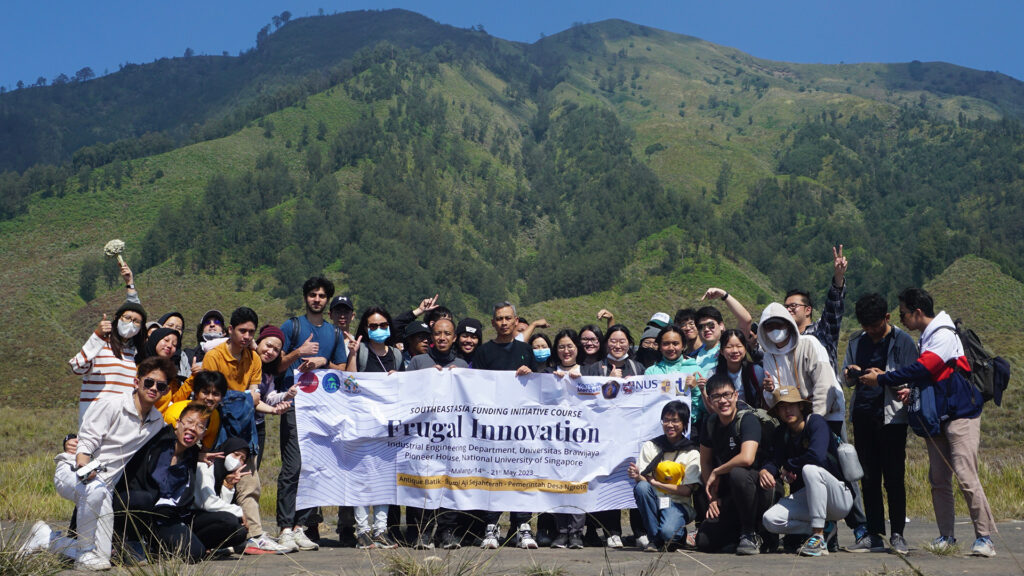
Gideon Tay, a first-year student from NUS Business School recounted that his time at Bumiaji Farm was an immersive, eye-opening experience that allowed him and his fellow students to establish a genuine connection with the land. “As we worked alongside the farmers, we felt a sense of camaraderie and admiration for their commitment to nurturing the earth. The experience went beyond education and was invigorating and transformative,” said Gideon.
“By actively participating in their activities like planting seeds, tending to the crops, and observing the farmers' techniques, we gained practical knowledge and an understanding of the importance of sustainable farming practices,” he added.

Gideon's testimony highlighted the transformative power of hands-on experiences in sustainable agriculture, which is vital in fostering a deep appreciation for the natural world and an understanding of the interconnectedness between humans and the environment.
To find out more about SFI at PH, click here.
Sustainability and Education in Bali, Indonesia
For the 23 students who took up the SFI course offered at LightHouse (LH), their discovery of the meaning of education and sustainability, amidst Indonesia’s booming tourism industry, was an enriching experience.
With concrete learning outcomes in mind, LH Resident Fellow Dr Lynette Tan who led the study trip explained, “I wanted our students to be equipped with skills to solve real-life issues faced by our partner organisations and universities. At the same time, it was an opportunity for them to learn to develop and apply a framework to evaluate the sustainability of solutions proposed.”
Dr Tan also made sure to include experiential learning throughout the itinerary, by incorporating forest visits and meetings with Junglo and Green School, organisations which focus on forest regeneration via the Miyawaki Method to regrow ecosystems.

At a half-day workshop organised by Bali’s Udayana University and Plastic Bank, a social enterprise seeking to stop ocean plastic by allowing coastal communities to exchange plastic waste as currency for necessities, the students examined the SDG Goals on Quality Education and Sustainable Cities. The event was complemented with lively group discussions on Bali’s challenges given their economy’s heavy reliance on tourism.
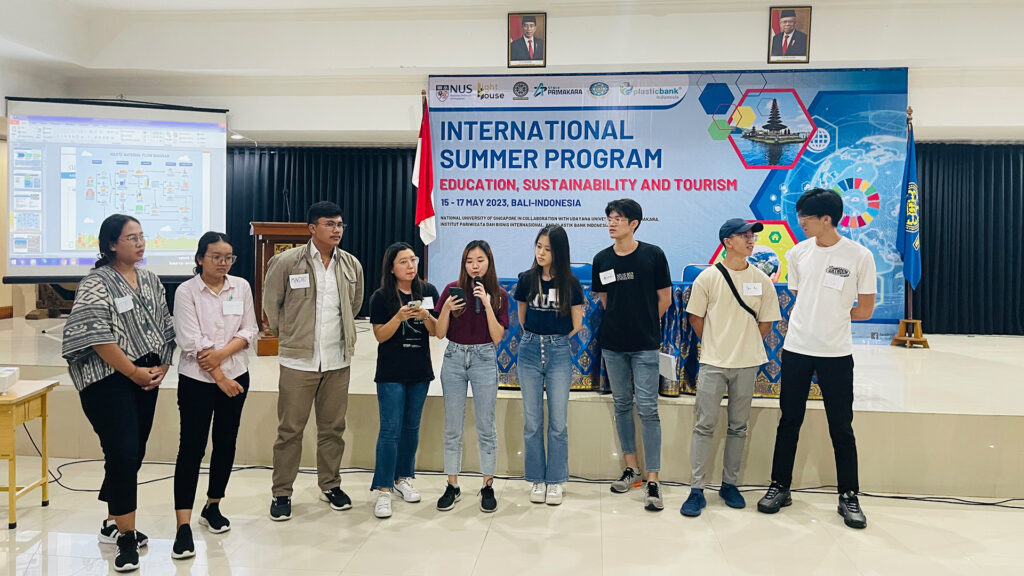
At another visit, to the International Institute of Tourism and Business (IPB), students learnt about the principles of Tri Hita Karana, which refers to the interconnectedness of ‘God, Community and Environment’, and how this influences sustainable tourism in Bali. IPB thoughtfully curated a series of activities which gave the students a taste of Balinese culture, hospitality and dining.
LH students also spent two days at Generasi Bali (Gerasa), where they learnt about sustainable education from a non-governmental organisation (NGO) that helps the marginalised in the local community. After meeting with and hearing the stories of the beneficiaries supported by Gerasa, the students then discussed and proposed ideas to increase the awareness and impact of the meaningful work done by the organisation.
L Keerthnah Lectchumanan, a Year 2 student from the Faculty of Science, had no regrets signing up for the programme. “I’m so glad that I took the opportunity to join the inaugural LightHouse SFI. What I learned on this trip cannot be taught within a classroom. My conversations with the locals gave me a Balinese perspective on education and sustainability. I really appreciate Dr Tan for taking care of us so well, and am grateful for the support from NUS and LH in making this trip possible for us.”
To find out more about SFI at LH, click here.
Leadership at the Fringe in Lombok and Pulau Sumba, Indonesia
Across two study trips in May and July, 41 students from Residential College 4 (RC4) discovered the captivating rural locales of Lombok and Pulau Sumba islands located in eastern Indonesia. Led by RC4 Fellows, Associate Professor Tan Lai Yong and Senior Lecturer Li Jingping, the trip sought to explore leadership at the fringe, with a focus on two UN SDGs – food security (Zero Hunger) and climate change (Climate Action).
The SFI programme provided an invaluable platform for staff and students to engage with local partners involved in sustainable development efforts across SEA. “The study trips deepened our understanding of the interconnected issues of food security and climate change in the Indonesian context,” said Assoc Prof Tan.

One such example was their early morning trip to Tanjung Luar village in Lombok, a bustling coastal hub. It was there that they heard first-hand from the local fishermen of the challenges of rising sea levels, unpredictable storms and escalating petrol costs. Thereafter, they ventured to a fish farm to better understand their challenges, and the viability of fish farming as compared to open-sea fishing.
Moving further inland, the students met with farmers and community volunteers from Desa Gangga, whose dedication to tree-planting brought about economic benefits and reduced soil erosion along riverbanks. When the first delegation from RC4 visited in May, they had planted approximately 100 trees; and barely two months later in July, the next group of RC4 students were able to witness the fruits of their labour!
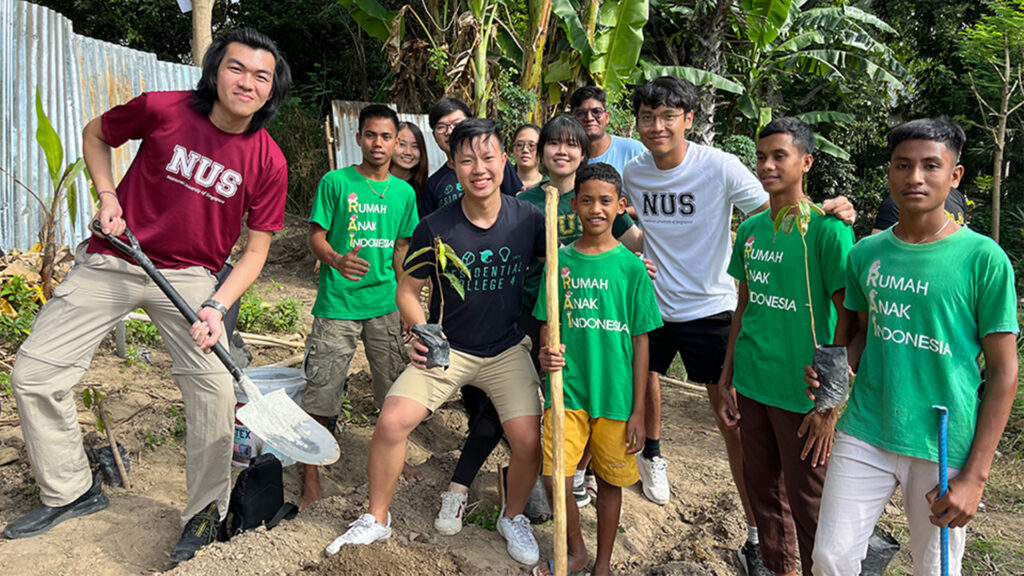
Such close interactions with the local communities left indelible memories for participants, igniting a passion in many of them to actively contribute to positive change and finding innovative solutions. Having two study trips back-to-back also allowed for greater continuity in terms of RC4’s engagement with the local communities.
“This trip has been incredibly fulfilling, packed with learning and filled with experiences. Not only have I learned much about food security and food production, I have also gained an intense appreciation for Indonesia and its diverse culture and people,” remarked Dion Chua Yee Kin, a freshman from the College of Design and Engineering. “I will definitely return to Indonesia not just to experience its incredible culture and the warm hospitality of the locals, but also hopefully to contribute to helping push the sustainability frontier of its food production systems.”
Watch the team’s journey to Lombok and Pulau Sumba below.
Conservation Matters in Pahang, Malaysia
There is beauty in out-of-classrooms learnings. With this in mind, Ridge View Residential College (RVRC) Fellow Dr Patricia Lorenz led 17 students to Pahang, Malaysia to explore facets of conservation. Despite the sweltering heat, the study trip allowed students to take a closer look at biodiversity loss, threats to the ecosystem, the role of indigenous peoples and ecotourism in conservation areas.
Venturing into the forest trails of the Sungai Yu Ecological Corridor, Taman Negara, and Universiti Kebangsaan Malaysia’s (UKM) research centre at Fraser’s Hill, RVRC students went on day treks and night drives to get a taste of the region’s diverse wildlife. At UKM, the team got up close and personal with wildlife through activities like a frog night walk and dragonfly walk.
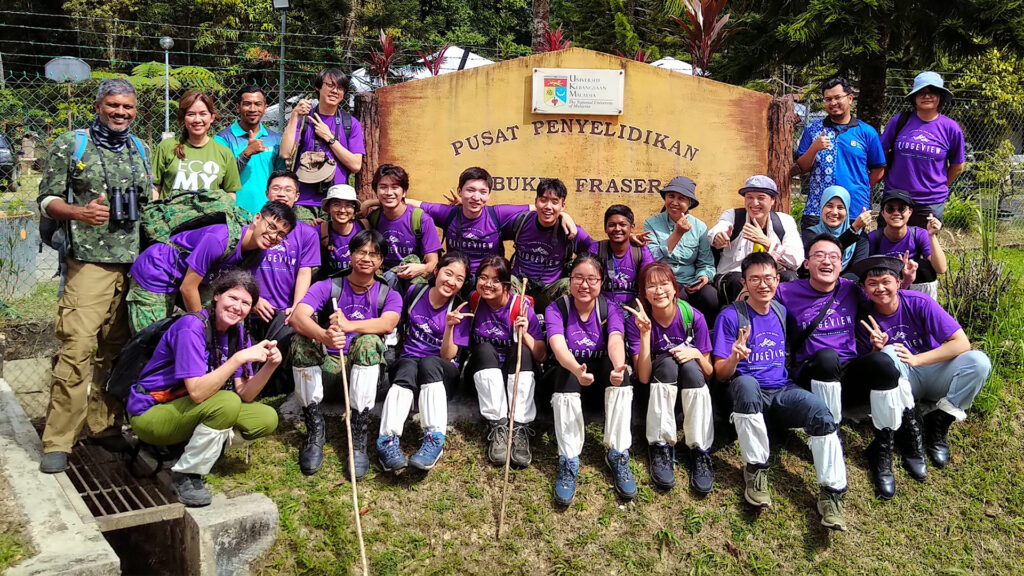
To better understand the intention behind the various conservation efforts, the team also met with Malaysian Conservation Alliance for Tigers and Ecotourism and Conservation Society Malaysia – two main community partners in Pahang dedicated to conservation and working with the local indigenous Bateq communities.

Freshman Ngoi Kai Sheng from the Faculty of Arts and Social Sciences spoke candidly of his initial intention to sign up for the combination of outdoor experiences – the hikes, landmarks and scenery. The experience, however, made him gain an appreciation of the value of conservation.
“I discovered so much beyond what I was familiar with, from visiting the Orang Asli villages, to experiencing night life in the dark of the palm tree plantations, to engaging the eloquent representative from Fraser's Hill Nature & Heritage Association,” he shared.
“The biodiversity and cultural heritage we risk losing for ‘development’ is shattering,” he said. “Conservation is not some far-fetched ideal,” even if people may compartmentalise and disassociate themselves from the realities of environmental destruction, he observed. “Development, on the other hand, will always come at the price of precious life.”
To find out more about the SFI at RVRC, click here.
This story – the first instalment of a two-part series on the NUS Southeast Asia Friendship) – first appeared in NUSnews on 22 August 2023.
Singapore's Civic District
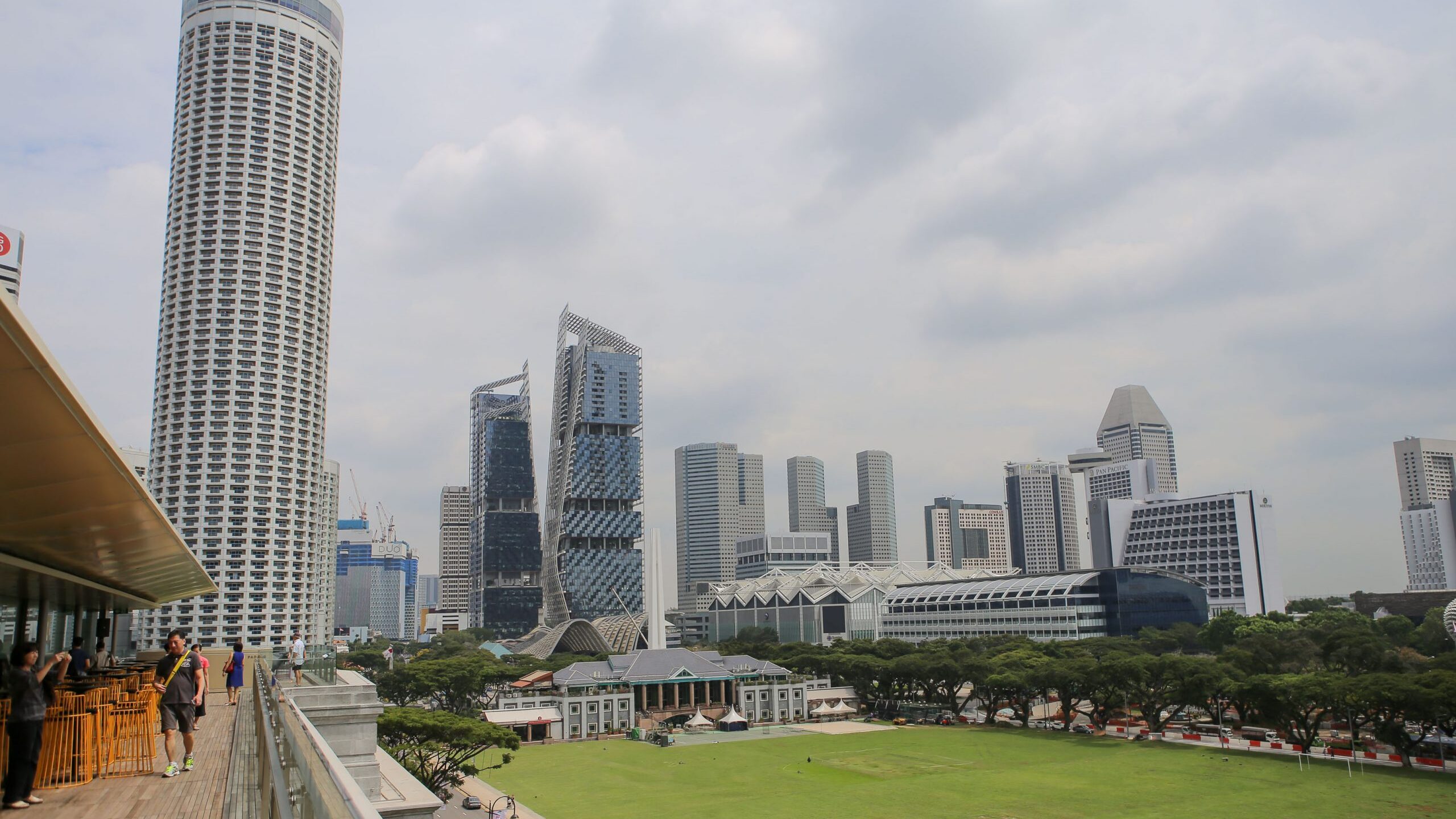
The Civic District of Singapore stands as a captivating tapestry woven with historical threads, architectural marvels, and cultural significance. In this BERITAMediacorp documentary on Singapore’s Civic District, broadcast on 2nd August 2023, Dr Imran Tajudeen (NUS Malay Studies) and archaeologist Professor John Miksic (NUS Southeast Asian Studies), along with the owners of businesses and relatives of former residents of the area, provide intimate insights on its rich history, architecture, and culture.
Watch the documentary (in Malay) here.
Finding Home: The Value of Community
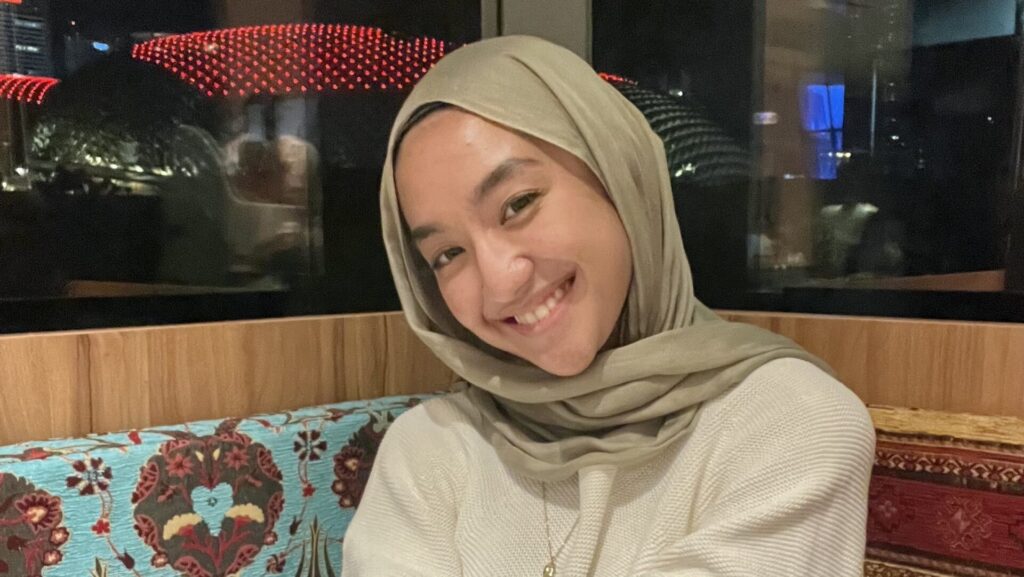
For Zohra, pursuing Malay Studies at the Faculty of Arts and Social Sciences (FASS) meant more than just reading a major. It was something close to her heart, something intimate that enabled her to grow more familiar with her own culture, identity and community.
As a freshman entering the FASS, Zohra had her eyes set on a Political Science major – exposing herself to the world of governance, international relations and political theory. However, after taking the introductory course to Malay Studies, she found that the content addressed many of the unanswered questions about her culture and identity. “The topics discussed in Malay Studies courses seemed a lot more intimate to me,” said Zohra. “They prompted me to explore the term ‘Malay’ and what it means to identify as part of the community, and to seek deeper knowledge of the populace’s history – and by extension my own.” Wanting to become more familiar with her interests as well as her identity, Zohra decided to take on a double major in Political Science and Malay Studies.
As Zohra embarked on this journey, she was motivated to engage closely with the Malay community and connect with her roots, inspired by the lessons imparted to her as she was growing up: to never forget her heritage and to always give back. The coursework was challenging, but she soon found that it helped build her confidence to connect more meaningfully. “I think studying my heritage and culture, as well as having critical discourse with my peers catalysed my efforts to re-plant my roots comfortably among others in my community,” says Zohra.

Zohra representing the NUS Muslim Society at BAPA's food distribution initiative during Ramadhan in 2021.
Committed to giving back to the community, Zohra made consistent efforts to be involved in clubs and societies focused on promoting awareness of Malay culture and also to the betterment of its members. She was constantly on the lookout for committee sign-ups almost every academic year, and having a community around her also granted her the opportunity to participate in various events and outreach activities. This led her to become the Programmes Executive for the NUS Muslim Society in AY 2020/21 and the Vice President of NUS Malay Studies Society in AY 2021/22.
Serving in clubs and societies provided Zohra with the platform to connect with people and fresh perspectives. “Forging new friendships and networks with those I met along the way granted me a great deal of warmth and fondness, and their support has always guided me forward and buoyed me through many tough times,” says Zohra. “Meeting new people and exchanging perspectives has also widened my horizons to welcome ideas I was once unfamiliar with, helping me grow as an individual.” She also believes that participating in student activities allowed her to develop key skills and competencies in administration and project management that will prepare her well for the workforce.
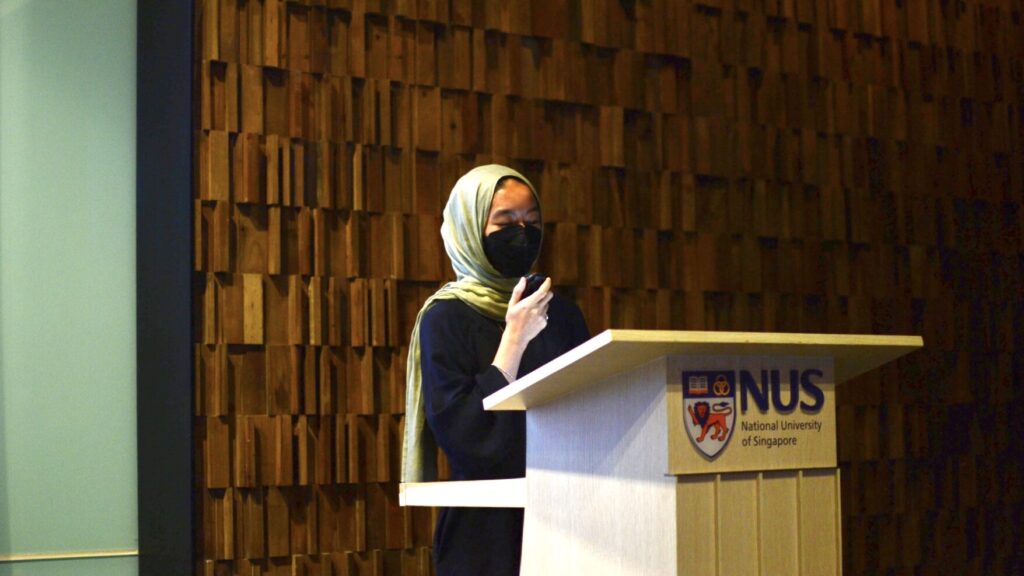
Zohra presenting her part at the NUS Malay Studies Society's Annual General Meeting in 2022.
As a final year student, Zohra has used her experience at FASS to crystallise two guiding principles for herself. One is to consider nuance from different perspectives — because issues are never as shallow and one-dimensional as they may seem to be. The other is to choose to work somewhere that allows her to engage closely with people. “I think my experiences during my undergraduate years have made me grow out of my shell and be comfortable with the idea of working around people and for people,” says Zohra.
Dr Azhar Ibrahim, lecturer at NUS Malay Studies who has taught Zohra in multiple courses, commends her for the unique perspective that she brings. “Teaching Zohra has been a remarkably rich encounter for me. I like her individualised style, which also always affirms the larger collective background,” says Dr Azhar. “Her sense of rootedness and the will to unravel ideas in critical fashion is very promising and I know that she will go far.”
NEW PUBLICATION: The Camphor Tree and the Elephant: Religion and Ecological Change in Maritime Southeast Asia
The Camphor Tree and the Elephant
Religion and Ecological Change in Maritime Southeast Asia
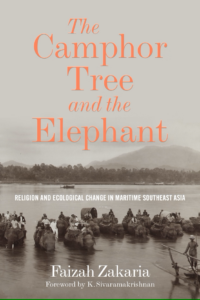
What is the role of religion in shaping interactions and relations between the human and nonhuman in nature? Why are Muslim and Christian organizations generally not a potent force in Southeast Asian environmental movements? The Camphor Tree and the Elephant brings these questions into the history of ecological change in the region, centering the roles of religion and colonialism in shaping the Anthropocene—“the human epoch.”
Historian Faizah Zakaria traces the conversion of the Batak people in upland Sumatra and the Malay Peninsula to Islam and Christianity during the long nineteenth century. She finds that the process helped shape social structures that voided the natural world of enchantment, ushered in a cash economy, and placed the power to remake local landscapes into the hands of a distant elite. Using a wide array of sources such as family histories, prayer manuscripts, and folktales in tandem with colonial and ethnographic archives, Zakaria brings everyday religion and its far-flung implications into our understanding of the environmental history of the modern world.
Faizah Zakaria is assistant professor in the Departments of Southeast Asian Studies and Malay Studies at the National University of Singapore. She is coeditor of Fatwas of Singapore: Science, Medicine and Health.Associate Professor/Professor (with Tenure) on Malay-Indonesian Region
Job Description
The Department of Malay Studies at the National University of Singapore (NUS) seeks to appoint an outstanding candidate for a full professorial or associate professorial hire (with tenure). Those seeking to apply must have expertise on the Malay-Indonesian region as well as strong credentials in at least one discipline in the social sciences or humanities. Research accomplishments and linguistic mastery on a wider plane of studies to include Malay world connections with the Arabic-Persian, Mediterranean, East Asian and Indian Ocean worlds, including the global Malay diaspora, would be an added strength. It is expected that the appointment holder will demonstrate a strong capacity for academic leadership and management.
Application Process
To apply, please submit the following as a package:
- Cover letter explaining your interest in the position and how your qualifications and plans fit into the long-term development and enhancement of the Department of Malay Studies at NUS.
- Curriculum vitae
- A list of 10 referees (names, contact details and applicant’s relationship to them). They may be invited to submit their recommendations if a candidate is shortlisted.
Application materials should be submitted online via the NUS Careers Portal and addressed to:
Chair, Search CommitteeDepartment of Malay Studies
Faculty of Arts and Social Sciences
National University of Singapore
Application Timeline
Candidates should submit all application materials by 30 April 2023. The position will remain open until a suitable candidate is found. Only shortlisted candidates will be notified.
Contact for further enquiries
Potential candidates are welcome to get in touch with the Chair of the Search Committee to answer any questions they may have at mlssec@nus.edu.sg
Exploring the Spaces between the Arts, Social Issues and Academia
IN BRIEF | 8 min read
- This year’s edition of NUS Arts Festival features over 20 performances, films, public art, installations, and dialogues. It is also the first to return to pre-pandemic levels, and involves more than 700 NUS students, alumni, faculty, staff and collaborators, nearly twice of 2022 figures, and remains the largest performing arts event on campus..

What can we learn from uncomfortable transitions and ambiguous spaces? The highlight of NUS’ performing arts calendar, NUS Arts Festival 2023: Spaces Between, returns to campus from 10 to 26 March 2023, and explores the idea of liminal spaces and the exciting, yet uncomfortable unknown that accompanies the transition between phases and states.
This year's theme, Spaces Between, is the finale to a trilogy of themes that began with A Question of Time in 2021 and Shades of Light(ness) in 2022. All three are universal concepts that drive the purpose of our everyday lives.
This year’s edition of NUS Arts Festival features over 20 performances, films, public art, installations, and dialogues. It is also the first to return to pre-pandemic levels, and involves more than 700 NUS students, alumni, faculty, staff and collaborators, nearly twice of 2022 figures, and remains the largest performing arts event on campus.
“The purpose of the festival theme is to allow us to reflect on the times we live in through art. Furthermore, art has always been a vehicle in which we rediscover ourselves, encounter a confluence of different ideas, and ask difficult questions,” said Festival Director, Jobina Tan.
“As we live in a world of diverse and divided views, I hope the theme demonstrates our perennial need to constantly negotiate between varied perspectives and find more meeting points with each other."
Professor Audrey Yue, Head of Department of Communications and New Media, and Festival Faculty Advisor, added, “While we recover from the downturn of the pandemic, we also arrive at the intersection of concurrent crises including global economic, racial and geopolitical unrests. How do we boldly unfold and spring forth from the complexity of this conjunction?”
Indeed, the theme has inspired a bumper crop of interdisciplinary artistic collaborations, bringing together different art forms, student groups, and academic departments. Many of these are rare partnerships or first-of-its-kind pairings within NUS, with a handful pushing the envelope to address contemporary issues which resonate with youths in Singapore.
One such collaboration is the festival opening show, Inter/change, which marries the two contrasting traditional art forms practiced by NUS Chinese Dance and NUS Indian Instrumental Ensemble. Led by Artistic Director, Jenny Neo, dance choreographer, Xiao Jing, and musician Nawaz Mirajkar, the production is inspired by the history and evolution of the Silk Road as well as its cultural impact and relevance in our world today.
“Inter/change allows us to explore and interpret the theme as spaces between two different parts of the world joined together by the Silk Road, as well as the idea of spaces between different viewpoints, ideologies and cultures. The idea of liminality can possibly be explored through the interactions between these two civilisations and through the comparisons which highlight similarities between the Indian and Chinese ways of life,” said Lee Ruo Shi, Dance Captain of NUS Chinese Dance, and a second-year Accountancy student.
Another unique collaboration is Essentially Macbeth, featuring NUS Chinese Drama and NUS Chinese Orchestra. A Chinese language play-within-a-play, the production follows the lives of young graduates who reconnect with theatre after a pronounced absence, and questions the relevance of the arts in our everyday lives. The play is inspired by the public conversations about artists being considered “non-essential” workers in Singapore, during the COVID-19 pandemic.
“I suggested to Moses, conductor of NUS Chinese Orchestra to let NUS Chinese Drama and NUS Chinese Orchestra tackle a Western classic by Shakespeare. Moses suggested getting composer Phang Kok Jun to write original music for this daring piece of work. I think we both saw this as a chance to play, learn and explore new boundaries for our art form,” said NUS alumna Judy Ngo, who directs the play.

Presented by Malay cultural dance group NUS Ilsa Tari, together with NUS Dikir Barat, Pengabdian Batin (or “Inner Enslavement” in Malay) aims to deconstruct the stigma surrounding Intimate Partner Violence amongst the Malay/Muslim community. This production is helmed by Artistic Director, Osman Abdul Hamid.

Promise of a Future celebrates the union of artists and their art forms, bringing the largest number of performers on stage within the festival. Some 182 musicians from NUS Symphony Orchestra, The NUSChoir, and NUS Yong Siew Toh Conservatory of Music, will present musical interpretations of the triumph of hope over uncertainty, which includes Mozart’s famous Coronation Mass. This is the first in-person collaboration between NUS Symphony Orchestra and The NUSChoir since 2018.
“Now that we are back to pre-pandemic productions, watching everything unfold again at full scale, how it was meant to be, is far grander and exciting than what any of us could've imagined. It's certainly only a special, magical moment that you can only feel it in person, live, either as a performer on stage or an audience,” said Wong Ting Feng, President of NUS Symphony Orchestra, and a fourth-year Philosophy, Political Science, and Economics student.
The NUS Arts Festival is generously supported by donors, namely, Hong Leong Foundation, Shaw Foundation, Kwan Im Thong Hood Cho Temple, The Ngee Ann Kongsi, Salleh Marican Foundation and the Ministry of Culture, Community and Youth’s Cultural Matching Fund.
For more information, please visit nusartsfestival.com.
This NUS Centre for the Arts story first appeared on NUSnews on 9 March 2023.
NUS Open House: More than 7.7M Visitors Drawn to Action-Packed Showcase over 10 Days
IN BRIEF | 25 min read
- NUS Open House 2023 saw a strong showing by visitors eager to find out about the University’s academic programmes, as it returned in from 25 February to 6 March. Some 7.71 million visitors attended the physical and online showcase which involved 3,071 faculty and staff, students and alumni.
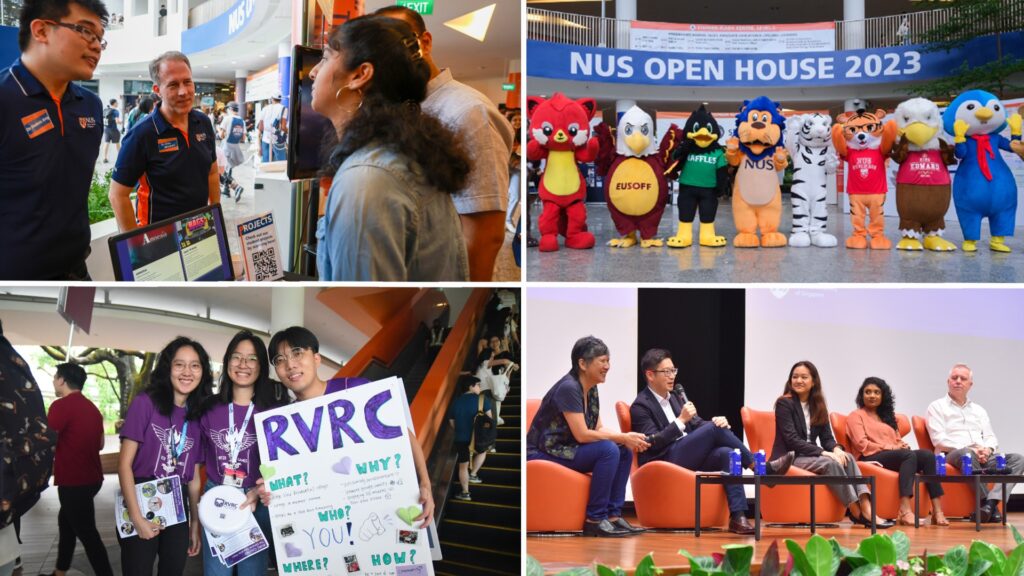
NUS Open House 2023 saw a strong showing by visitors eager to find out about the University’s academic programmes, as it returned from 25 February to 6 March. Some 7.71 million visitors attended the physical and online showcase which involved 3,071 faculty and staff, students and alumni.
Kicking off the 10 action-packed days were the informative virtual talks, webinars, and social media sessions. The on-campus event on 4 March saw packed crowds at the programme booths, talks, special classes, campus tours, student life performances and residential venues despite the heavy downpour. Prospective students gained valuable insights from faculty members, explored the University’s extensive global opportunities, as well as its diverse entrepreneurship platforms and lifelong learning courses, giving them a comprehensive overview of what NUS has to offer.
“I really enjoyed meeting the professors and students who are from the courses I'm interested in as I gained many insights from them on life in NUS and the various possibilities that are open for exploration,” said prospective student Karthika Warrier, an alumna from Raffles Institution who is considering applying to NUS Computing or the College of Humanities and Sciences (CHS).
Jasmine Chiam, an alumna from Nanyang Junior College (NYJC) who is interested in applying to CHS and NUS College, agreed. “The programme was well-run despite the fact that it was raining,” she said. “I felt that it was well-curated for students with different interests.”
A draw for many prospective students were CHS, the newly launched NUS College, and the College of Design and Engineering (CDE) – the University’s recent interdisciplinary pathways aimed at meeting the evolving demands of the workforce.
Addressing Shared Challenges with the Humanities and Sciences

CHS, which provides an enhanced undergraduate experience for students of the Faculty of Science (FOS) and the Faculty of Arts and Social Sciences to pursue breadth and depth across academic disciplines, showcased its Common Curriculum throughout the Open House.
Currently accepting its third intake, it held talks on hot topics such as sustainability, food science and technology, and mental health to demonstrate how students can apply various perspectives to address complex real-world issues.
The panel entitled “Why Sustainability and Climate Change Matter” saw speakers from the Geography, Japanese Studies, Anthropology and English, Linguistics and Theatre Studies departments weighing in on the topic from their respective disciplines. Another session by the Department of Food Science and Technology explained how its programme applies principles from chemistry, biology, engineering and nutrition to address issues such as food safety and security, as well as the careers its graduates can pursue.

In the same vein, the panel “What Mental Wellness and Health Means in the 21st Century” saw speakers from the Social Work, Sociology and Psychology departments discuss perceptions of mental health in society. Dr Lee Jungup, an Assistant Professor in Social Work, pointed out the close relationship between social work and psychology. “Many of our Social Work students consider a double major with Psychology,” she said, noting that social work emphasises the practical while psychology is more theoretical and clinical in nature.
Jasmine, the NYJC alumna, said the various informative talks reaffirmed her decision to apply to NUS. “The NUS College tour as well as the CHS Common Curriculum sharing were particularly informative. They made the programmes seem quite appealing and I am looking forward to applying for both,” she said.
For some like Christian Chua, an alumnus from the NUS High School of Math and Science, attending the Open House talks helped clarify the career options available for the different programmes.

Christian, who is currently considering the Medicine, Pharmacy, and Pharmaceutical Science programmes, attended the Pharmacy talk and booth, where faculty members of different specialisations touched on the various career pathways and the collaborative practices of the discipline.
“It was useful that they discussed the different careers that Pharmacy graduates had gone into so I knew a degree in Pharmacy wouldn't just limit me to community or hospital pharmacy but also to the R&D, drug approval side, or the business side as well,” he said.
Shaping the Future of Design and Engineering
Meanwhile, there was action aplenty over at both the online and in-person Open House by CDE, which is accepting its second intake. Officially launched in November 2021, CDE was a merger of the Faculty of Engineering and the School of Design and Environment, ramping up the distinctive interdisciplinary experience at NUS.

From the Common Curriculum and the multidisciplinary education model, to the Student Exchange Programme and future career prospects, CDE faculty and students shared their insights on a plethora of topics with prospective students.
The talks, such as the one on Biomedical Engineering, Chemical Engineering and Materials Science & Engineering, also provided valuable information. Prospective students learnt how undergraduates are exposed to a range of interdisciplinary topics with global-scale applications in class, and how NUS engineers are taking on the world’s biggest challenges, such as clean energy.

The talk on Architecture, Industrial Design and Landscape Architecture also saw a large turn-out. Discussing the breadth and depth of CDE’s curriculum, it touched on how students will be equipped to face the 21st-century challenges through their education in CDE.
Kaisyn, who is graduating from Nanyang Polytechnic this year, said, “I appreciated that they covered the basic skills and activities done throughout the curriculum. It allowed me to confirm that the Industrial Design course is relevant to my study and career plan.”
The in-person Ask-Me-Anything sessions with student panels also allowed participants to get their burning questions answered.
Tee Jia Hong, a graduate of Anglo-Chinese Junior College who intends to apply to Industrial and Systems Engineering (ISE) and attended the student sharing, said, “By listening to the experience from the ISE senior, I am able to get the hang of the academic and co-curricular prospect of being an ISE student.”
Over at CDE’s Rise of the Robots campus tour, participants were given a look at the Advanced Robotics Centre, which displayed projects such as an autonomous wheelchair, an artificial robotic arm, and a haptic feedback machine.

Robert Lim from Singapore Polytechnic, who attended the tour, said, “It was a memorable experience . . . I was able to learn more about what the courses have to offer and what undergrad students have accomplished in NUS.”
Exploring experiential learning

NUS College, Singapore’s first honours college, offered a glimpse of its flagship experiential learning programmes during its online and physical showcase. Faculty members highlighted the Impact Experience programme, where students develop solutions to real-world issues with community partners, and the Global Experience programme, which immerses them in global cities for specially curated courses and field visits based on specific themes.
The college, which is accepting its second intake, also held special classes for prospective students to get a feel of its small-group seminar-style lessons. Dr Ang Yuchen’s special class introduced his field course Biodiversity and Natural History in Singapore, which combines scientific concepts with the visual and language arts and environmental philosophy.
“I found the sample lessons useful in helping me not just get a sense of how lessons are conducted over at NUS College, but also how my potential Profs are like as teachers and facilitators,” said Eugene Teo, an alumnus of Raffles Institution, explaining that small, collaborative discussions was better suited to his learning style. Attending the Open House “also gave me a better understanding of the people I will be interacting with and the environment in which I would be studying in upon entering university life”, he added.

Interactivity was a prominent feature of the Open House. NUS Nursing offered visitors a chance to try basic wound treatment and resuscitation, while NUS Law held moot demonstrations at its Bukit Timah Campus.
 |
 |
Aqirah Bte Azam, who will be graduating from Temasek Polytechnic in May, had the chance to see the Nursing students in action and attended a talk by its alumni. “Hearing their experiences in NUS and their careers have given me the courage to pursue my aspirations in nursing”, she said.

Smorgasbord of Student Life
Visitors also got a taste of the vibrant NUS student life on display. Student clubs and societies, as well as the Hall and Residential College (RC) interest groups, put their best foot forward at the Student Village.

Visitors were wowed by the striking moves of NUS Wushu, the energetic cheerleading displays of King Edward VII Hall’s KE Titans, and the snazzy K-pop dance moves of the Korean Cultural Interest Group. They were also treated to renditions of catchy tunes from Mandopop group NUS CAC Voices, acapella group NUS Resonance, Raffles Hall rock and jazz band RHockerfellas, and many more.

Representatives from the RCs, halls, and houses were present to offer prospective students the inside scoop on the on-campus experience. Complemented by A-Day-in-the-Life videos and 360° virtual tours, the booths, talks, and Ask-Me-Anything panels by student leaders gave participants a sense of the residential options at their fingertips.
“The House Life talk was the most enjoyable and informative event to me since the masters and students really explained to me what living in houses was like, while keeping us engaged through jokes and videos,” said Jia Hong.

Charlotte Toh from Singapore Polytechnic, said the Halls talk helped her better understand the hall culture and admission criteria.
Guided in-person tours of the various halls and residences, such as King Edward VII Hall, Tembusu College, Ridge View Residential College, and Residential College 4, opened a window to the close-knit community of residential life.
Samuel Liu, who graduated from National Junior College, said, “The well-guided tours and booths set up for each RC that I visited gave me a good indication of which RC would be most suitable for my character and goals.”
This story first appeared on NUSnews on 9 March 2023.
FASS Inspiring Mentor 2022 Award Winners Announced

The NUS Faculty of Arts and Social Sciences is proud to announce the winners of the 2022 FASS Inspiring Mentor Awards.
Congratulations to:
- Assoc Prof Melvin Yap Ju-Min, Associate Professor, Department of Psychology
- Assoc Prof Robin Loon Seong Yun, Associate Professor, Department of English Language and Literature
- Dr Amazaki Osamu, Senior Lecturer, Centre for Language Studies
- Dr Natalie Pang Lee San, Senior Lecturer, Department of Communications and New Media
- Dr Kamalini Ramdas, Senior Lecturer, Department of Geography
The NUS Career Compass 2023
IN BRIEF | 5 min read
- Find out how the University has developed and broadened our curriculum to better prepare our graduates for the swiftly evolving workplace, and how interdisciplinary learning can help students solve complex issues in our society.

In collaboration with CNA938
How does NUS cultivate highly sought-after talents in the workforce of the future?
Find out how the University has developed and broadened our curriculum to better prepare our graduates for the swiftly evolving workplace, and how interdisciplinary learning can help students solve complex issues in our society.
This story first appeared on NUSnews on 23 February 2023.
CHS at NUS Open House 2023: Download the FASS Essentials on 27 February 2023
IN BRIEF | 10 min read
- On 27 February, get the full download on the essentials of academic programmes, student life, career preparation, overseas opportunities and financial aid at CHS via Zoom in the ‘virtual’ edition of CHS@NUS Open House 2023.
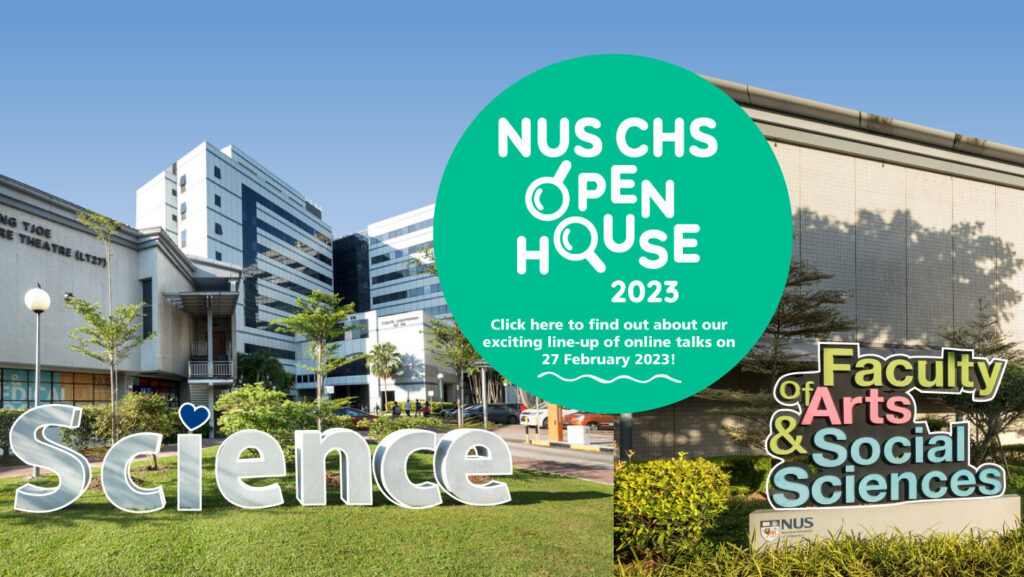
If you have not already marked your calendars for two dates with the NUS College of Humanities (CHS) during NUS Open House 2023, do it now!
On 27 February, get the full download on the essentials of academic programmes, student life, career preparation, overseas opportunities and financial aid at CHS via Zoom in the ‘virtual’ edition of CHS@NUS Open House 2023. Go to https://bit.ly/CHSatNUSOH2023-Virtual for the full 27 February programme.

Then prepare to come on-campus on 4 March to engage with our award-winning faculty members, advisors and students to experience interdisciplinary education and explore your future vocation. Go to https://bit.ly/CHSatNUSOH2023-OnCampus for the full 4 March programme.
To help you plan your way through the lineup of FASS-specific talks and activities, read on for some of our highlights on 27 February 2023 that ought not to be missed.
Academics at the Forefront
The online edition of CHS@NUS Open House is meant to provide you with as comprehensive a briefing of what CHS, and its component Faculties of Arts and Social Sciences, and Science, have to offer students.
Academics is at the forefront and the day starts with a session devoted to the CHS Core Curriculum (9:00 – 11:00 am), a specially curated interdisciplinary programme that provides unprecedented freedom to choose the pursuit of breadth and depth across a broad spectrum of disciplines. This session will be led by Professor Sow Chorng Haur, Vice Dean (Outreach & Admissions), NUS Faculty of Science (FoS), and Dr Noorman Abdullah, Assistant Dean (External Relations & Student Life), FASS.

Associate Professor Luke O'Sullivan
The CHS Cross-Disciplinary Programmes
Three one-hour talks devoted to introducing Cross-Disciplinary Programmes (XDPs) offered by CHS will be running concurrently from 11:00 am. One programme FASS offers that embodies the concept of interdisciplinarity is the Philosophy, Politics, and Economics XDP, and the session for that will be led by Associate Professor Luke O’Sullivan (NUS Political Science) in discussion with fellow PPE Joint Programme Committee member, Dr Joel Chow (NUS Philosophy).
"This session is an opportunity to ask questions about the PPE-XDP. Philosophy, Politics, and Economics is a classic combination of disciplines that was first taught in Oxford and has spread globally because of its proven effectiveness. It brings together the ability to think about ideas in abstract and analytical terms, explore their practical implications for society, and model their costs and benefits in quantitative terms,” says Assoc Prof O’Sullivan. “PPE students can expect to develop a unique knowledge base and set of skills that leaves them suited for a wide range of careers in today's complex and fast-changing world."
Attendees are required to come prepared, because in addition to providing an overview of the PPE-XDP, Assoc Prof O’Sullivan expects audience engagement. Join the PPE-XDP session on 27 February at 11:00 am here.
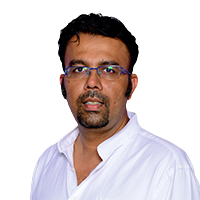
Associate Professor Rajesh Rai
Asian Studies @ CHS
NUS is recognised as a global centre of excellence in Asian Studies, where a multidisciplinary and comparative approach to the study of Asia and its regions is adopted. The session on programmes by the various Asian Studies departments at NUS (2:00 – 2:50 pm) will feature Associate Professor Rajesh Rai (NUS South Asian Studies), Dr Faizah Zakaria (NUS Malay Studies), Associate Professor Tham Shiao Wei (NUS Chinese Studies), Dr Clay Eaton (NUS Japanese Studies) and Dr Mohamed Effendy Abdul Hamid (NUS Southeast Asian Studies).
“You probably hear a lot about how Asia is the largest continent in the world, with the greatest diversity of cultures, philosophies, political thought and economic might, as well as scientific and technological advancement,” says Assoc Prof Rai, offering up a brief on the discussion he will be leading as moderator. “This session will take you through an interdisciplinary journey through history and current affairs to show you just how influential Asia has been a force for change, both positive and negative, on the world’s stage.”
Join this session by clicking here.

Humanities @ CHS
Learn more about the academic disciplines that focus on studying different aspects of the human condition from: Dr Donna Brunero (NUS History); Associate Professor John Whalen-Bridge, Associate Professor Graham Wolfe and Dr Leslie of NUS English, Linguistics and Theatre Studies; and Dr Zachary Barnett (NUS Philosophy).
“Do you: Ponder big questions regarding life, society, and culture? Wonder how language develops? Hold theatrical ambitions? Find yourself curious about connecting the past and present, the local and global?” session moderator Dr Brunero asks rhetorically. “If so, join us as we answer questions regarding our disciplines and share insights into how studying with us at NUS can broaden your horizons.”
To join Dr Brunero and her fellow speakers in this 3:00 - 3:50 pm session click here.

Social Sciences I: Same, Same but Different
This session features Dr Kamalini Ramdas (NUS Geography), Associate Professor Feng Qiushi (NUS Sociology and Anthropology), Dr Elaine Tan (NUS Political Science) and Dr Georgios Georgiou (NUS Economics), and will delve into their respective programmes as well as approaches toward forging a “collective identity”.
Session moderator Dr Kamalini explains. “This panel brings together social scientists from Economics, Geography, Political Science and Sociology to discuss what it takes to develop a collective identity as social scientists,” says Dr Kamalini, who will be working with her fellow speakers toward answering questions such as, “What are the benefits and challenges of a collective approach to learning and research? How might our students benefit from our commitment to engage?”
Click here to join the Social Sciences I (4:00 – 4:50 pm) session.

Social Sciences II: Understanding Social Complexity
Dr Adelyn Lim (NUS Sociology and Anthropology), Associate Professor Irene Ng (NUS Social Work), Dr Nina Powell (NUS Psychology) and Dr Alex Mitchell (NUS Communications and New Media) will be introducing the disciplines offered by their respective Departments, and show how they can each be applied to enable a deeper understanding of our world.
“The world we live in today can feel exciting but also downright contradictory. Global friendships are in many ways easier to make than in the past, yet we see terrorism, violent crime, wars, and enduring social inequality,” says session moderator Dr Lim, who will be discussing in detail with her fellow speakers complex issues thrown up by questions such as, “How did this world come about? Where are we heading in the future?”
To join the Social Sciences II (5:00 – 5:50 pm) session, click here.

Ms Sasiwimol Klayklueng
Foreign Language Studies: Passport to the World
Meet leading Language instructors Ms Sasiwimol Klayklueng (Thai), Dr Sandhya Singh (Hindi and Tamil), Ms Indianti Tjan (Indonesian), Ms Rungnapa Kitiarsa (Thai) and Ms Sophie Undorf Bouvier (French), who will elaborate on the Minor in Language Studies and Proficiency Certificates conferred by the NUS Centre for Language Studies, which are very much sought after by students looking to enhance their career prospects.
Celebrating Love and Generosity
IN BRIEF | 15 min read
- NUS alumni couples and donors raise over S$357,000 for financially-challenged NUS students.
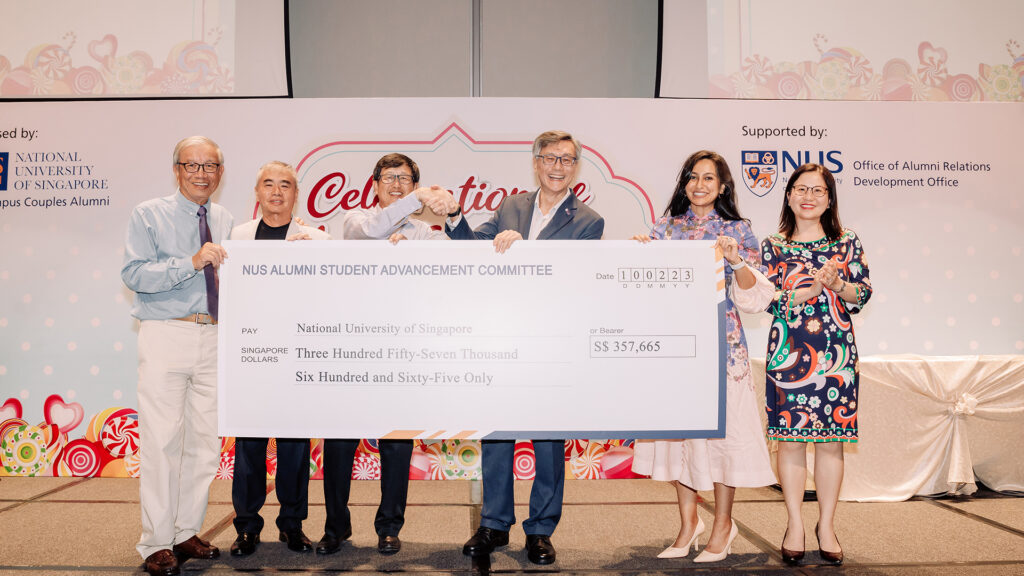
In line with Valentine's Day, the NUS Campus Couples Alumni hosted more than 200 alumni couples and donors at its annual Celebration of Love and Giving Dinner in appreciation of their efforts to support financially-challenged NUS students.
This year, alumni couples raised a total of S$357,665 for the NUS Campus Couples Bursary Fund and other bursaries. Over S$816,000 has been raised since the NUS Campus Couples Bursary’s inception in 2015, benefitting 127 financially disadvantaged NUS students.
Held at the National University of Singapore Society Kent Ridge Guild House on 10 February 2023, the event brought together a community of campus couples from various generations to celebrate love and generosity. The heart-warming celebration was also a meaningful occasion to acknowledge and thank the donors who help raise funds for underprivileged students in NUS.

Supported by the Alumni Student Advancement Committee, NUS Office of Alumni Relations and NUS Development Office, the event saw a lively turnout as alumni cheerfully reconnected with each other – some for the first time in person in three years.
Guests were treated to a romantic musical performance by the NUS Jazz Band during the dinner. The night continued with a heartfelt recognition of the donors' generosity, concluding with a cheque presentation to NUS President Professor Tan Eng Chye (Science ’85).
Ms Khalijah Masud (Science ’92) and Mr Aznan Ghazali (Arts ’92, Economics and Malay Studies) said they were grateful for the chance to be able to give back to their alma mater. “Reflecting on our blessed life (and) giving back commemorates the remarkable time we had in NUS and specifically in Sheares Hall. At this point in our lives, it's also important for us to leave a legacy and set an example for our children,” said Ms Khalijah.

Ms Jessica Leong (Arts ’85) shared that she and her husband, Mr Wong Jin Kok (Engineering ’85), were keen to contribute as education held a special place in her husband’s heart.
Their first gifts to NUS were made in honour of their parents, particularly Mr Wong’s father who was a school headmaster and set an example by supporting the education of relatives and close friends in need. The Sheares Hall couple said they understood the financial struggles faced by some undergraduates and hoped to “make it easier for current students in need”.
The NUS Campus Couples Bursary Fund was initiated by Mr Yeo Keng Joon, who met his wife, Madam Kong Yuet Peng (Business ’86), when they were pursuing their MBA degrees at NUS Business School. The pair had established the bursary as a way to give back to the NUS community after receiving financial assistance with their education.
This story first appeared on NUSnews on 14 February 2023.
Pre-University Educators Experience Interdisciplinarity at NUS
A delegation of teachers from Catholic Junior College (CJC) visited the National University of Singapore (NUS) campus on Tuesday (5 January 2023) as part of their annual Teacher’s Learning Retreat. With teaching expertise spanning various subjects and departments, they were keen to better understand interdisciplinarity at the NUS Faculty of Arts and Social Sciences (FASS), as well as how the learning experience differs between Junior College and University.
Participating in different panel sessions, the teachers heard directly from faculty and students, who shared their unique experiences and insights. Panelists included Dr Noorman Abdullah, Associate Professor Loy Hui Chieh, Dr Donna Brunero, Dr Denis Tkachenko, Dr Alex Mitchell, as well as two current undergraduates, Andrea Lim and Shruthi Kumar.
Exploration of New NUS Facilities
The delegation was also provided a tour of the newly renovated Central Library (NUS Libraries), where they were introduced to some up and coming technology, like the 360 Imaginarium, that NUS faculty have already incorporated into their teaching. The teachers were also allowed access to the rare bookbridge, where NUS houses its vintage and rare collections. Preparing Students to have the Best Educational Mindset
"Thank you for bringing together such a vibrant panel of Professors from diverse range of specialities. From this panel we can see how NUS is bringing together interdisciplinarity into the classroom. The discussion was rich, lively and extremely informative to understand how we can prepare our students to be future ready; “Ready for University, Learn for Life" said Vice Principal Philip Avlar.
"We welcome the opportunity to share our best practices, and insights from interdisciplinary curriculum development and delivery in FASS with Catholic Junior College teachers. The panel session and discussions were both candid and encouraging. It is always helpful to engage and connect with teachers of our future students, to share experiences and align our educational philosophy," said Dr Noorman Abdullah, Asst Dean (External Relations and Student Life).
"As both an NUS alumnus and Catholic Junior College educator - I myself am an interdisciplinary product from many years ago. I pursued Science and double majors in Economics and English Lit, purely driven by passion. It’s wonderful our students can pursue this seamlessly today. The panel sessions today were both enlightening and inspiring and provides us with lots of insights we can apply to our classroom and students," said Mervyn Sek, Head of Department (Project Work and Integrated Curriculum).
HSA1000 Poster Symposium (Cherishing the Neighbourhoods We Live In)
The Half-life of Knowledge
IN BRIEF | 10 min read
- There is now an indisputable requisite to equip graduates with interdisciplinary knowledge and skillsets. We need both the agile lenses of interdisciplinarity as well as the deep-cutting laser of deep domain expertise. The former trains us to aim and focus the laser, while the latter allows us to cut to the heart of a problem.

| By Professor Tan Eng Chye |
“Teach a person to fish, and you may feed them for three-and-a-half years” may sound less inspiring than “Teach a person to fish, and you feed them for a lifetime”, but the former more accurately reflects the current realities of tertiary education.
Breaking news travels at warp speed, accelerated by social media and instant messaging. In a matter of minutes, news can reach the four corners of the world. Such interconnectedness highlights the leaps made in information technology over the years while underscoring a persistent and inexorable phenomenon – the reduction of the half-life of knowledge.
The half-life of knowledge, coined by Fritz Machlup in 1962, refers to the amount of time elapsed before half of the knowledge in a particular field is superseded or becomes obsolete. Given the speed with which knowledge develops and is shared, it is perhaps not surprising that this value is ever decreasing in many fields.
This phenomenon raises fundamental questions about our university degree programmes. How should a fresh graduate, filled with aspirations to change the world, deal with the harsh reality that a significant portion of their undergraduate training may be rendered irrelevant by the simple passage of time?
Distilling a degree programme is one possible, albeit drastic approach. We can consider equipping students only with evergreen core domain concepts. This training should take less time than our current degree programmes. As and when students require specific new knowledge, or need to upgrade existing knowledge, they can take short courses to bridge knowledge gaps and meet their professional needs. This type of “just in time” learning, also known as micro-credentialing, helps to circumvent the shortened half-life by injecting cutting-edge knowledge at just the right time.
Another less disruptive approach is revitalisation. We can maintain the current degree programme structure, but provide avenues for graduates to return to university in the future. Such short stints of study can follow existing models for bite-sized, self-contained courses, or semester-long study periods undertaken with the support of employers.
One certainty is that university study will cease to be just one stage of life. Instead, “university studies” will become the de facto way of studying, with a person continually refreshing and renewing their knowledge in tandem with or in anticipation of developments in industry, society and the world.
In anticipation of this, we created the NUS Lifelong Learners Programme (or NUS L3), which promises a 20-year period of student enrolment, from the point of undergraduate or postgraduate admission. In other words, a graduate of NUS can choose to come back to campus to take courses for at least 20 years from the day of matriculation.
Interdisciplinarity
Beyond the way knowledge is acquired, we are also grappling with working in an increasingly VUCA (volatile, uncertain, complex, and ambiguous) world. In such a context, can we continue to hold a siloed view of domain disciplines? In training law students, for example, we would be remiss not to show them basic programming, which can allow them to create customised commands to quickly and easily trawl through databases, with millions of legal records, to identify precedents.
Deep domain expertise is like a laser – a focused beam of knowledge that can cut through dense problems. However, real-world issues are increasingly multifaceted and ill-defined, often lacking a clear vulnerable spot at which a laser beam can be aimed.
As a mental experiment, consider the challenge of introducing autonomous electric vehicles to a city. This proposition involves urban design, city planning, the law, and engineering for accessibility. We can form a multidisciplinary team of experts, where each member is a domain expert, to tackle the issue. However, in all likelihood, we will encounter misalignment between domains, simply owing to differences in problem-solving methodology, thinking models or even nomenclature.
If we liken domain training to equipping students with specific lenses through which they can see and focus on information to solve a problem, then interdisciplinarity suggests that we should train students to operate across more than one domain. By educating them in core ideas from multiple domains and providing opportunities to apply their knowledge in authentic settings, students with interdisciplinary training can switch domain lenses as needed, solving problems using novel and unorthodox approaches that transcend domains.
To be clear, we are not advocating for dismantling deep domain training. Rather, we recognise that there is now an indisputable requisite to equip graduates with interdisciplinary knowledge and skillsets. We need both the agile lenses of interdisciplinarity as well as the deep-cutting laser of deep domain expertise. The former trains us to aim and focus the laser, while the latter allows us to cut to the heart of a problem.
NUS strongly believes in providing interdisciplinary pathways for our students. In 2020, we created the College of Humanities and Sciences (CHS) to provide an enhanced interdisciplinary undergraduate experience for students of the Faculty of Science and the Faculty of Arts and Social Sciences. CHS undergraduates can choose between deep domain training or the flexibility of interdisciplinary training of varying breadth and depth in modules offered by both faculties. Continuing our efforts to pave more interdisciplinary pathways for students, in 2021, we merged the School of Design and Environment and the Faculty of Engineering to form the College of Design and Engineering. More recently, NUS launched NUS College, Singapore’s first honours college offering pathways to more than 50 majors across a half dozen degree programmes. The aim of NUS College, as explained by its inaugural dean, Professor Simon Chesterman, “[is to offer] broad, interdisciplinary competencies that equip students for life, along with the opportunity to dive deep into areas in which you are passionate.”
To quote Charles Dickens, “It was the best of times, it was the worst of times, it was the age of wisdom, it was the age of foolishness.” Indeed, our experiences with the global pandemic and its effects on education over the past two years have given us the rare opportunity to engage in deep reflection and introspection. Witnessing the breakdown of resistance to adopting and adapting technology for teaching and learning during this time, we should be emboldened to re-examine and revolutionise some of our established, and perhaps outmoded, notions of how to offer higher education.
About the Author
 Professor Tan Eng Chye is President of the National University of Singapore. A passionate academic and educator, Prof Tan is a member of the World Economic Forum’s Global University Leaders’ Forum, as well as Singapore’s Future Economy Council, which is tasked with driving the growth and transformation of the country’s future economy.
Professor Tan Eng Chye is President of the National University of Singapore. A passionate academic and educator, Prof Tan is a member of the World Economic Forum’s Global University Leaders’ Forum, as well as Singapore’s Future Economy Council, which is tasked with driving the growth and transformation of the country’s future economy.
This article was first published in the Times Higher Education World University Rankings 2023 supplement and first appeared in NUSNews on 4 November 2022.
Seeing the World Through Different Lenses: NUS Malay Studies
?????? ??? ????? ??????? ????????? ??????: ??? ????? ???????
"I think the multi-disciplinary approach that I am introduced to in Malay Studies is really helpful because the discipline does not use just one lens to view different issues, but rather it utilises different lenses, exposing me to a wide array of methods and methodologies."-Nur Hikmah Md Ali (National University of Singapore Malay Studies, '22) Hikmah explains how majoring in #MalayStudies sharpened her critical thinking and analytical skills and ability to relate to people and the community, giving her a competitive edge as she starts to build her career. Watch this interview to find out more about Hikmah's experience at NUS Malay Studies and her plans for the future: https://youtu.be/zMLCloVscPs 
Call for Nominations | FASS Inspiring Mentor Award 2022
IN BRIEF | 3 min read
- We invite NUS FASS members of staff to nominate the colleagues who have served as their truly inspiring mentors - who have gone beyond the call of duty to positively impact their work and life - for FIMA 2022 honours.
Click through image below (or just write to fassmentoraward@nus.edu.sg) to file your nomination.
Visionary Culture will Nourish the Thoughts and Minds of the Community
IN BRIEF | 10 min read
- In this commentary piece for Suria News Online, Dr Azhar Ibrahim Alwee (NUS Malay Studies) looks at the value and role of films and how they function as channels of the arts and cultural education that are highly influential and effective in shaping the perspectives of society.
Click through image below to read this piece.
This article first appeared in Suria News Online and NUSNews on 2 October 2022.
Last Convocation of Nanyang University 16 August 1980
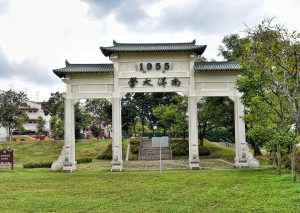
Abdullah al-Misri and why Hikayat Mareskalek is Still Relevant to this Day
IN BRIEF | 6 min read
- Commentary by Dr Azhar Ibrahim Alwee (NUS Malay Studies) on Abdullah al-Misri's 'Hidayat Mareskalek'.
Click through to read this piece on Beritamediacorp.
This article first appeared on Beritamediacorp on 4 August 2022 and NUSNews on 5 August 2022.
Receiving NUS’ Highest Honour Despite Having to Care for Sick Parents
IN BRIEF | 10 min read
- Berita Harian's feature on Nur Aisyah Lyana Mohamed Satria (NUS Global Studies and Malay Studies, '22), who juggled a part-time job and caring for her parents along with her studies to graduate with First Class Honours this year.
Click through to read this story on Nur Aisyah: part 1 (Front Page) and page 7.
This article first appeared in Berita Harian on 12 July 2022 (Front Page and page 7), and in NUSNews on 12 July 2022.
Making a tangible difference in her community
- Nur Hikmah Binte Md Ali, making a tangible difference in her community.

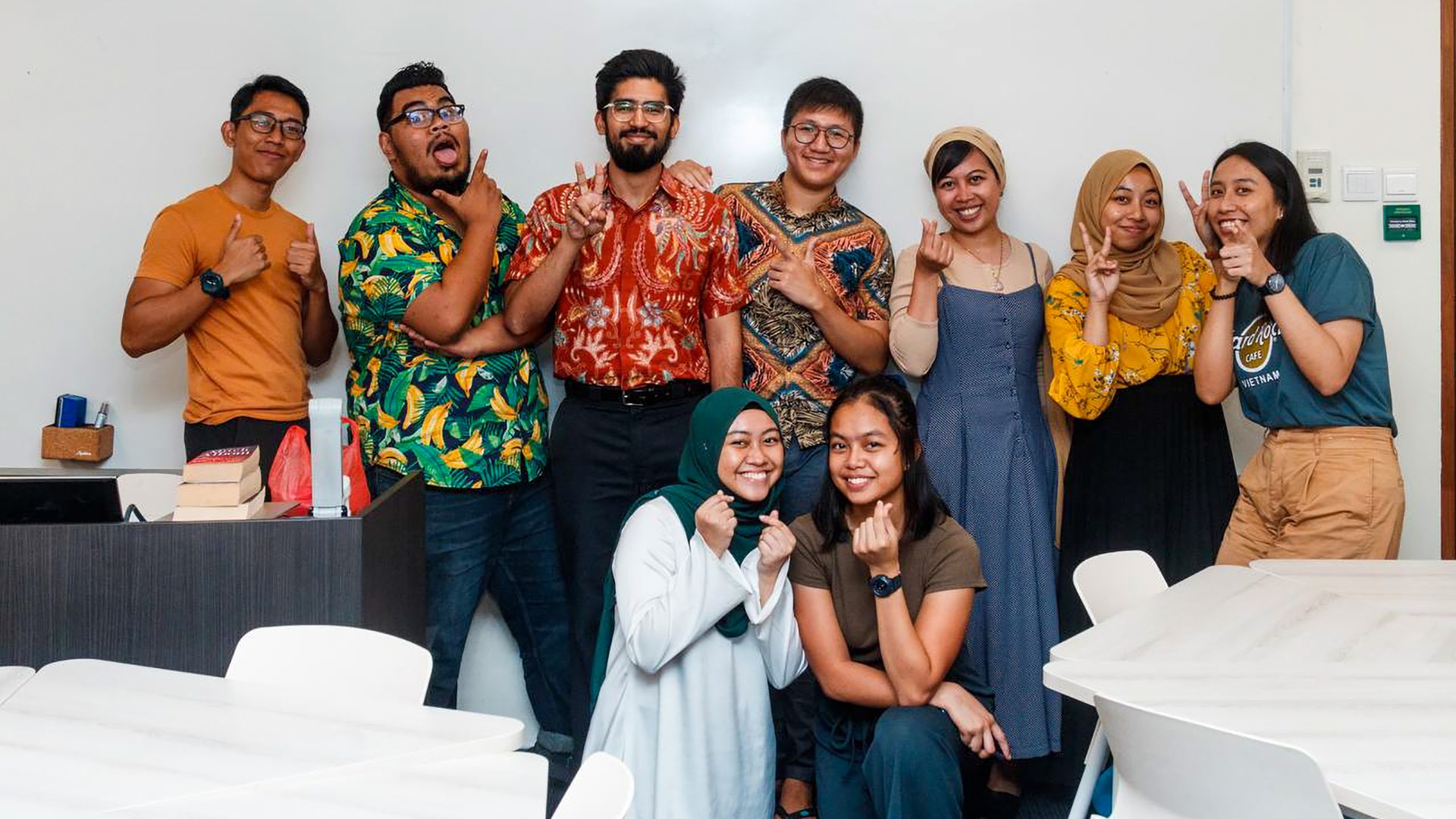

This story first appeared in NUSNews on 7 July 2022 as part of NUS News’ coverage of Commencement 2022, which celebrates the achievements of our 13,975 graduates through 28 in-person ceremonies. For more on Commencement, look out for our upcoming graduate profiles, check out the official Commencement website, or look up (and tag) #NUS2022 and #NUSFASS on NUS' and FASS' social media channels!
Commencement 2022: Kickstarting a Season of Celebration and Achievement
IN BRIEF | 10 min read
- NUS celebrates the milestone accomplishments of 13,975 graduates through 28 in-person ceremonies.

A long-awaited season of celebration is officially under way, with the inaugural ceremony of Commencement 2022 marking the milestone achievements of some 200 Faculty of Arts and Social Sciences (FASS) graduates, and seeing the conferment of two Honorary Graduates, Professor Tommy Koh and Professor Wang Gungwu.
Taking place at the University Cultural Centre, the ceremony kicked off bright and early on 6 July to an effervescent buzz of anticipation from the graduates and their loved ones, inaugurating a total of 28 in-person ceremonies to be held over the following 10 days.
In keeping with the Commencement traditions and the proud ceremonial heritage of NUS, the ceremony showcased the pageantry of the Ceremonial Procession, the fanfare, and playing of the National Anthem, all culminating in the highlight of the ceremony-the presentation of graduates. Graduates from the Class of 2022 celebrated their achievements amid the applause of family and friends, a momentous apogee of their time in NUS.
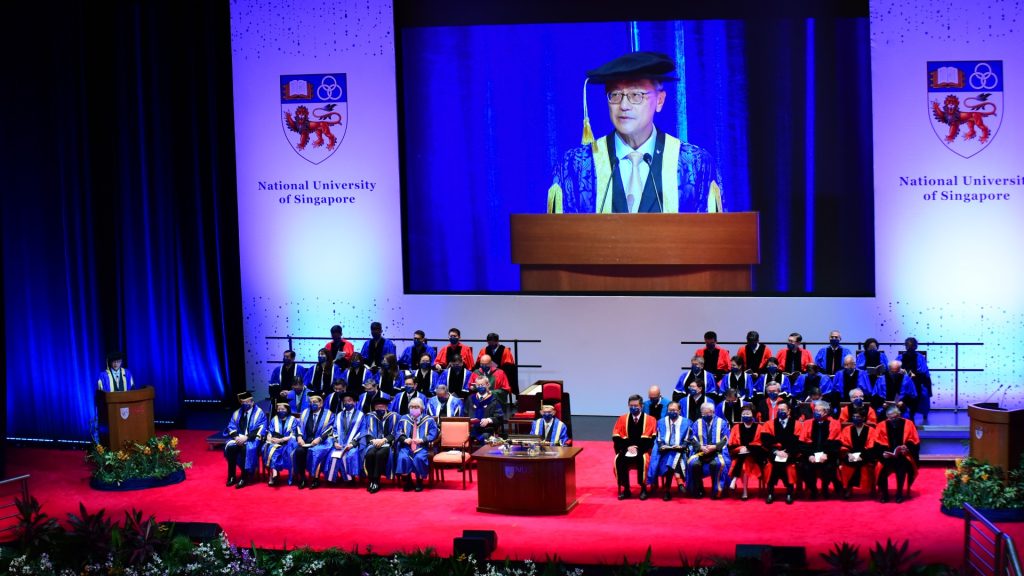
Speaking at the ceremony, NUS President Professor Tan Eng Chye reflected on the qualities needed for graduates to thrive in today's dynamic environment: an attitude of resilience and adaptability to overcome challenges, and a willingness and boldness to view problems as opportunities, exercise creativity, and apply their skills and knowledge to create solutions.
"For the Class of 2022, you are crossing the threshold into a wider world of dynamic change and great possibilities, but also of discomforting uncertainty," he said.
"But I am fully confident that the NUS graduates of today share the same ethos of excellence and service to community of generations past. In time to come, you will undoubtedly make your own unique contributions, and become the vanguard in elevating our collective prosperity and well-being."
Contributions to Law, Nature and Culture: Prof Tommy KohTwo illustrious NUS alumni were also honoured as Honorary Graduates for the Class of 2022-lawyer and diplomat Professor Tommy Koh, and historian Professor Wang Gungwu.
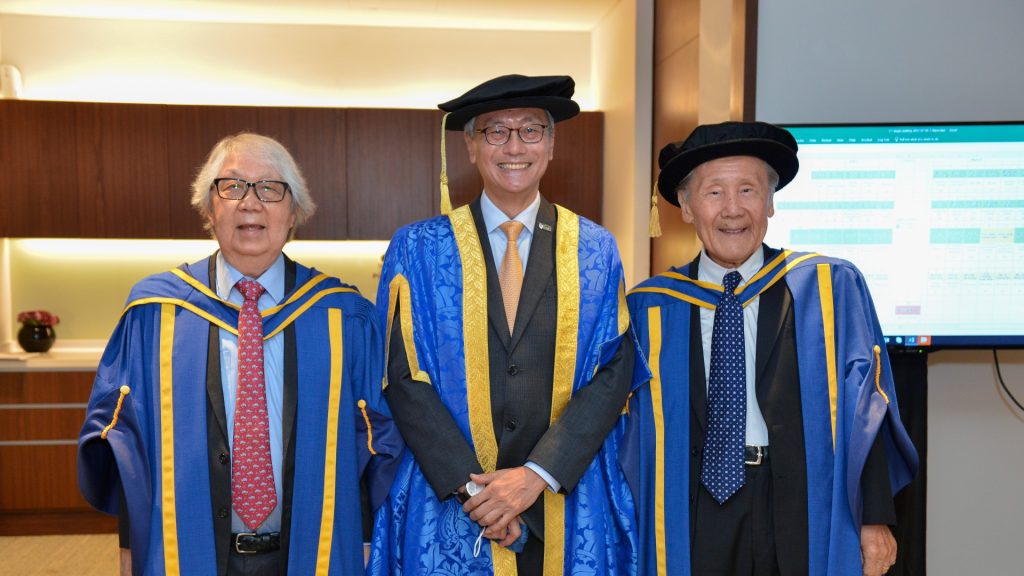
In recognition of his dedication as a practitioner-scholar and decades of service to the University, Singapore, and the world, Prof Koh, who wears many hats including Ambassador-at-Large at Singapore's Ministry of Foreign Affairs, Special Advisor of the Institute of Policy Studies, and founding Rector of NUS' Tembusu College, was conferred the Honorary Degree of Doctor of Laws.
Highlighting three areas on which he has focused his energies - law, nature, and culture - Prof Koh said, "I chose to study law, not to enrich myself, but to pursue justice and to promote the rule of law."
He also spoke about his work concerning nature and the environment, including chairing the 1992 Earth Summit, being patron of the Nature Society, and helping NUS establish the Lee Kong Chian Natural History Museum as its founding Chairman. "My vision is to live in harmony with nature. My agenda is to promote sustainability in all our endeavours," he added. "I am [also] glad that I have been able to play a very small role in transforming Singapore, from a cultural desert to a cultural oasis."
Delivering the citation for Prof Koh's conferment, Professor Simon Chesterman, Vice-Provost (Educational Innovation) and Dean of the NUS Faculty of Law and NUS College, referred to Prof Koh's "academic milestones [which] are but one strand of the rich tapestry of his professional life", as well as his leadership and guidance in education at NUS, and his eminent contributions to state and environmental diplomacy.
An Inspiring Story Worth Retelling: Prof Wang GungwuProf Wang, one of the world's foremost experts on the Chinese diaspora and Sino-Southeast Asian historical relations, was conferred the Honorary Degree of Doctor of Letters, the latest in a long list of accolades that includes the prestigious Tang Prize in Sinology, and the Distinguished Service Order of Singapore.

Reflecting on his time as a student of the University in colonial Malaya, Prof Wang said: "You can imagine how happy I am to be a graduand again with my alma mater. The university gave my generation a good start in life. It went on to adapt to the rapid changes of our time. In so doing, it has come out better and stronger."
He spoke about the "inspiring story worth retelling" of how the University had set out and followed its own aspirations, becoming a major centre of learning by being actively connected to the world, as well as regularly reinventing itself.
"The way our university strives to keep our humanity always in our sights is something to be very proud of. I hope that all of us graduating today, no matter where life leads us, will never hesitate to help our university to enhance this capacity to advance our human condition," Prof Wang stressed.
Prof Lionel Wee, Dean of FASS and co-Dean of the College of Humanities and Sciences, who delivered the citation on Prof Wang's conferment, lauded the latter as "an eminent figure and brilliant mind" who has made manifold contributions as a leading figure in Sinology, a renowned public intellectual, and a visionary leader and administrator at leading academic institutions around the world.
"This doctorate symbolises the meaningful connections between Professor Wang and the University, and it celebrates the long-standing contributions and value that Professor Wang's scholarly insights bring to Singapore, to Southeast Asia and, indeed, to the world," he said.
Parsing the Path ForwardInfusing the celebrations with a spirit of introspective gratitude, Valedictorian Mr Nickson Quak, who is graduating with a Bachelor of Arts with Honours (Highest Distinction) in Philosophy, Politics, and Economics said, "As varied as our journeys may have been, each and every one of us graduates here could have only made it thus far because of the unwavering support that our parents, our families, our loved ones, and our friends have so generously afforded us."
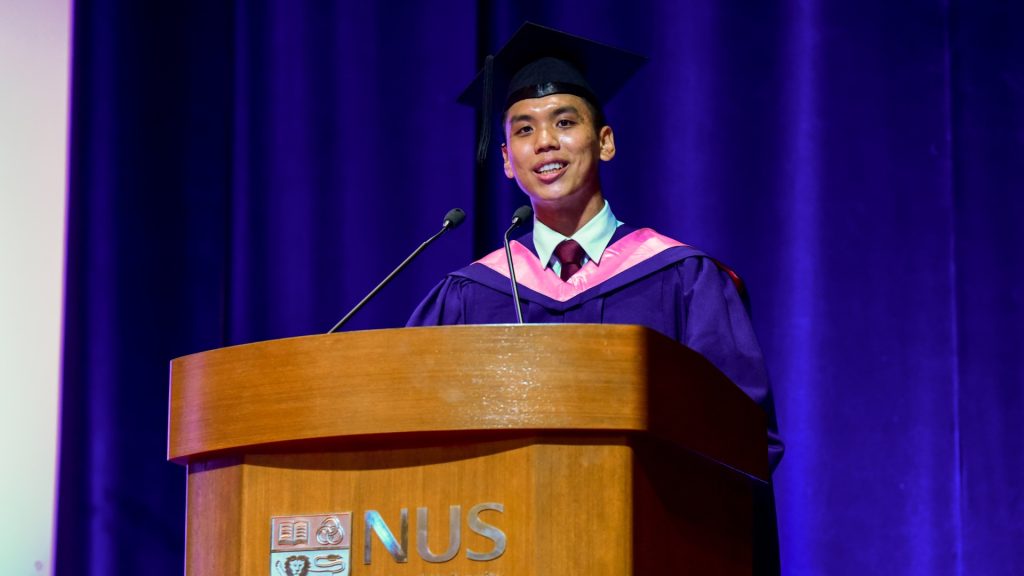
His words further summarised the spirit of determination and community that will carry graduates onwards in their lives: "If [the journey ahead] appears daunting to you, I say to you: fret not… because when you look to your left and your right, you see the resilient men and women who, forged by the challenges brought upon by the global pandemic, will always offer you a helping hand."
This story first appeared in NUSNews on 6 July 2022 as part of NUS News' coverage of Commencement 2022, which celebrates the achievements of our 13,975 graduates through 28 in-person ceremonies. For more on Commencement, look out for our upcoming graduate profiles, check out the official Commencement website, or look up (and tag) #NUS2022 and #NUSFASS on NUS' and FASS' social media channels!
Theatre, a Platform to Change Perceptions of Autism
IN BRIEF | 10 min read
- NUS Malay Society's performance of 'Bintang Norman', a play about the life of an autistic child, and its hope to change how people view autism.
Click through to read this article.
Source: Berita Harian, 21 June 2022, Singapore, p11.
Cultural Life is Like Upholding Trust and Human Nature
IN BRIEF | 10 min read
- A commentary by Dr Azhar Ibrahim Alwee (NUS Malay Studies) in Suria News Online.
Click through to read this article.
This story first appeared in Suria News Online on 23 May 2022.
Being and Becoming: Of Femininities in the Malay World Through 50 Images
Being and Becoming: Of Femininities in the Malay World Through 50 Images Virtual Exhibition and Seminars
NUS CHS Open House 2022: Discover #Interdisciplinary Education!
IN BRIEF | 5 min read
- The NUS College of Humanities and Sciences is hosting its Open House 2022 next week and all prospective students who have received offers are invited!
- A two-day hybrid programme – 11 May on Zoom (and viewable on CHS’ Facebook page) and 14 May on several locations across the NUS Kent Ridge campus, specifically the areas around the Faculty of Arts and Social Science (FASS), and the Faculty of Science (FoS) – CHS Open House 2022 aims to address all concerns a prospective undergraduate may have before committing to academic at the University and College.
- Highlights include opportunities to engage, discuss and explore academic pursuits, career development and student life at the College with key faculty and administrative staff and leadership — live and in person.
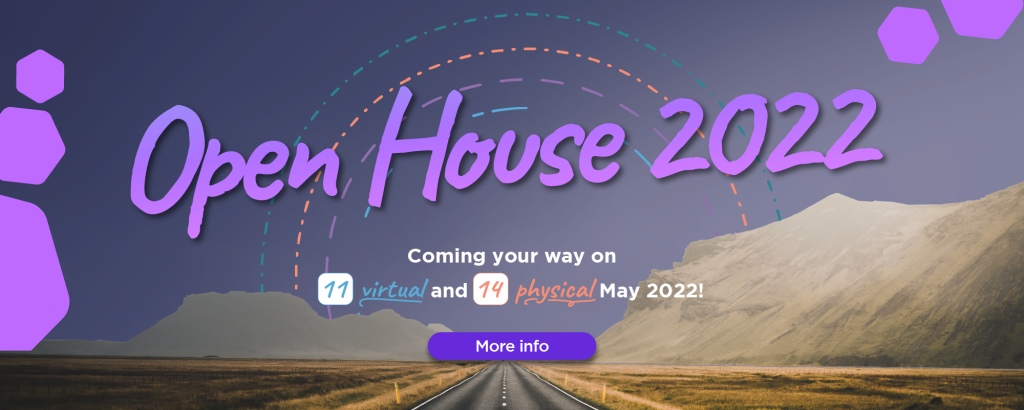
The NUS College of Humanities and Sciences is hosting its Open House 2022 next week and all prospective students who have received their offers are invited. As the deadline for them to accept their offers is looming, CHS has put together a programme aimed at answering all the questions they may have and clarifying all their concerns as much as possible.
Marking a cautiously calibrated return of the University to the normalcy of hosting large on-site events, this year’s CHS Open House is a two-day hybrid programme: 11 May on Zoom (and viewable on CHS’ Facebook page) and 14 May on several locations across the NUS Kent Ridge campus, specifically the areas around the Faculty of Arts and Social Science (FASS), and the Faculty of Science (FoS).*
11 May 2022 (Wednesday): The Essentials, OnlineThis a series of comprehensive information sessions (on Zoom and livestreamed on Facebook Live) covering everything new undergraduates need to know to get the most out of their education journey with CHS, including the:
- CHS Core Curriculum
- College’s three challenging but rewarding cross-disciplinary programmes
- Data Science and Economics (DSE-XDP)
- Environmental Studies (BES-XDP)
- Philosophy, Politics, and Economics (PPE-XDP)
- myriad Learning Pathways laid for you
- versatile career development programmes designed to prepare you for the future workplace
- CHS Student Experience—eye-opening and busy, yet energising and enriching
Speakers and panelists include CHS Co-Deans, Vice-Deans, key faculty staff members, career preparation and student services leader.
For more information and links to the 11 May sessions, click here.
14 May 2022 (Saturday): Get Personal, On CampusThe College is calling for prospective students to come on site, visit where they could well be spending their undergraduate years very soon, and speak to their future instructors and potential mentors. The full-day programme – running in key FASS and FoS locations across the NUS campus – offers:
- entry to witness and even participate in talks/lectures and panel discussions presented and hosted by award-winning instructors on a variety of academic subjects, interdisciplinary topics and specialised research areas
- face-to-face engagement with faculty, admin and student representatives from ALL Departments and student organisations under CHS, and opportunities to explore academic, financial aid and student activity options with the people in the know
- consultation with the career development teams of CHS
- guided Walking Tours across the facilities of FoS and FASS
For more information on the activities planned for 14 May, click here.
Discover Your #Interdisciplinary Future @ CHSThis Open House is the last chance for prospective students to learn more about the complete #interdisciplinary educational experience that they can expect at CHS. One that opens up a world of possibilities and equips them with skills and knowledge across the humanities, social sciences, physical sciences and applied sciences. One that inspires, cultivates and prepares them to work across diverse industries and sectors, with multidisciplinary teams, to solve some of the most complex wicked problems facing the world today — from social inequality to food shortage, unsustainable development and global warming. And one that grooms them to be the leaders of public institutions and private enterprise tomorrow.
* Campus shuttle bus services will be made available on 14 May to all visitors for easier movement across campus, which extends to Kent Ridge MRT.
‘Malay History' Sulalatus Salatin, Relevant to this Day
IN BRIEF | 10 min read
- In a Suria News Online (24 April 2022) article, Dr Azhar Ibrahim, Senior Lecturer from the Department of Malay Studies, Faculty of Arts and Social Sciences at NUS College of Humanities and Sciences, explains why 'Malay History' ('Sejarah Melayu') is one of the best works in the world of Malay literature and remains relevant to our modern times.
Click through to read this article.

Suria News Online, 24 April 2022
This story first appeared in Suria News Online on 24 April 2022.
Locating “Malay Places” and Ethnic Identity Making in Singapore

Open House 2022 Engages and Excites
IN BRIEF | 30 min read
- The ever-popular NUS Open House hit new heights this year, attracting over 8.61 million visitors – a 26.2 per cent increase from the 6.83 million visitors that attended last year's online Open House.
- From 26 Feb to 5 Mar, visitors crowded the websites, livestreams, webinars and social media sessions hosted by the University's colleges, faculties and schools. There was something for everyone, and the event covered everything from academic courses to student life and entrepreneurship programmes.

The ever-popular NUS Open House hit new heights this year, attracting over 8.61 million visitors – a 26.2 per cent increase from the 6.83 million visitors that attended last year's online Open House.
From 26 Feb to 5 Mar, visitors crowded the websites, livestreams, webinars and social media sessions hosted by the University's colleges, faculties and schools. There was something for everyone, and the hybrid event covered everything from academic courses to student life and entrepreneurship programmes.
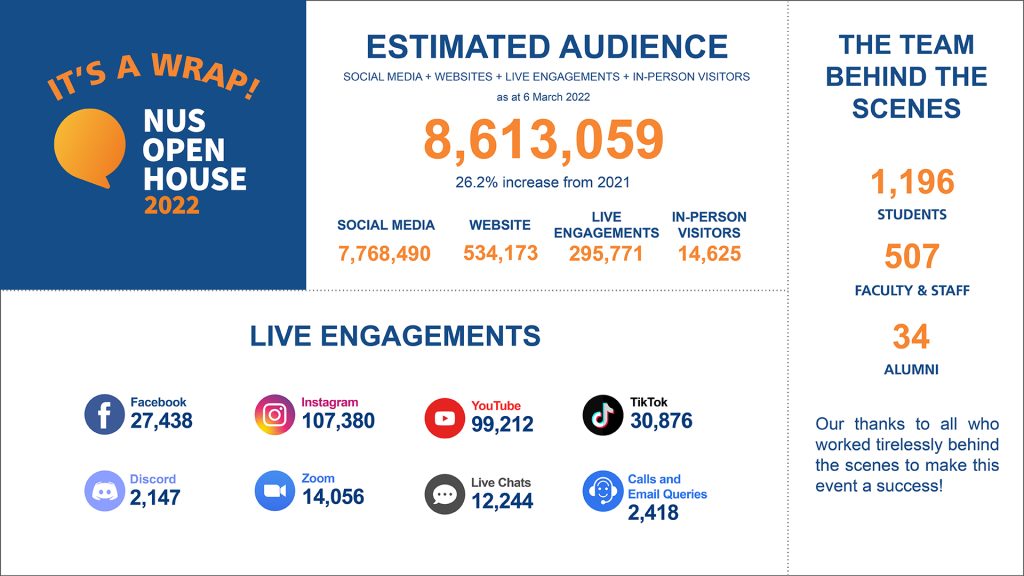
While much of the engagement happened online, prospective students got to meet NUS students and staff face-to-face for the first time since the pandemic started.
The physical Open House, held one sunny Saturday on 5 Mar, included numerous booths showcasing the University’s wide-ranging academic options and vibrant student life; sample classes and talks to get a taste of varsity life; and tours of the different colleges, faculties, and schools.
Prospective students gave the hybrid format a thumbs-up.
Joshua Chua, an alumnus of Anderson Serangoon Junior College, appreciated the online sessions and felt the physical Open House was a huge differentiating factor.
“The (physical) Open House really gave me a good image of what living and studying at NUS could look like by virtue of being an in-person event as opposed to it being virtual, so I'm really grateful to NUS and everyone involved for having this opportunity during the pandemic,” he said.
On her part, Hwa Chong Institution alumna Elsie Woo, who attended both the online and in-person sessions, said, “The experience was really welcoming and wholesome, and really exposed me to NUS as a whole.”
Showcasing the country’s first honours college
One of the highlights this year was the NUS College, Singapore’s first honours college. It will accept its first batch of students this year.
Prospective students were treated to online webinars on the College’s distinctive curriculum, its global pathways, and its focus on hands-on experiential learning. In more intimate breakout rooms, staff and student volunteers readily answered questions about student life and academic pathways. By having a home college or faculty – say Business or Science – while simultaneously being enrolled at NUS College, students will be able to get an educational experience that is as broad as it is deep.

The in-person activities featured a tour of the facilities and residential options that NUS College students would be able to enjoy.
Elsie Woo was one of many students drawn to NUS College’s unique offerings.
“I attended a few webinars, including introductory talks for NUS College and Food Science and Technology,” said Elsie, who also visited many booths in-person.
“The sessions were very well-planned and the seniors were extremely helpful and patient.”
Nanyang Polytechnic alumnus Koh Jin Yuen focused his time on NUS College, attending the College’s guided tour and virtual sharing sessions.
“The NUS College tour was informative as I got to ask the facilitators about their experiences. I think the curriculum is very meaningful,” said Jin Yuen.
“The Open House helped to deepen my understanding of how NUS College works, and allowed me to better understand the lifestyle of a student from NUS College.” He is intending to apply for the Information Systems programme offered by NUS Computing, as well as NUS College.
Ramping up interdisciplinary offerings
Exciting developments in the realm of interdisciplinary education—a major theme that NUS has been championing—were foregrounded at the Open House, with the College of Design and Engineering (CDE) also taking in its inaugural cohort. A result of the merger of the Faculty of Engineering and the School of Design and Environment, CDE is set to transform the NUS educational experience.

Across five galleries and 19 sub-categories, including Architecture, Industrial Design, Materials Science and Engineering, Biomedical Engineering, and Civil Engineering, visitors were presented with an informative display of the wide range of courses and programmes that will be on offer in the new College.
Raffles Institution alumna Grace Zai, who visited the Designing the Future exhibition and galleries, said, “The Engineering galleries were very informative as I could ask questions I had about the course, as well as student life, and get a clearer picture of what I would be studying and doing. It helped me make a more informed decision on my choices.”
Grace is considering applying to Engineering Science and Architecture, as well as Mechanical Engineering and Electrical Engineering with a specialisation in robotics.

There were also panel discussions, both online and in-person, where faculty and current students interacted with prospective students to share their experiences and answer questions about the new interdisciplinary curriculum.
“As a prospective student, I got to see first-hand the school facilities, as well as the accommodations. My experience was pretty enriching and enlightening because I could ask the professors questions I had in mind and learn more about the courses,” said Timothy Tay, a graduate of Victoria Junior College who visited the SDE gallery on Sustainable Innovations.
“For example, I did not realise Project Facilities Management (PFM) was recently changed to Infrastructure Project Management (IPM). The professor explained that students will now graduate with a BEng degree rather than a BSc degree,” he recalled, referring to the first interdisciplinary full-time undergraduate programme to cover engineering, design, management, technology, building science and law modules.
Information was also available on the vibrant student life of the College’s various clubs and societies, as well as career programmes that enable students to better understand their interests and what it takes to marry that with industry skills and experience.
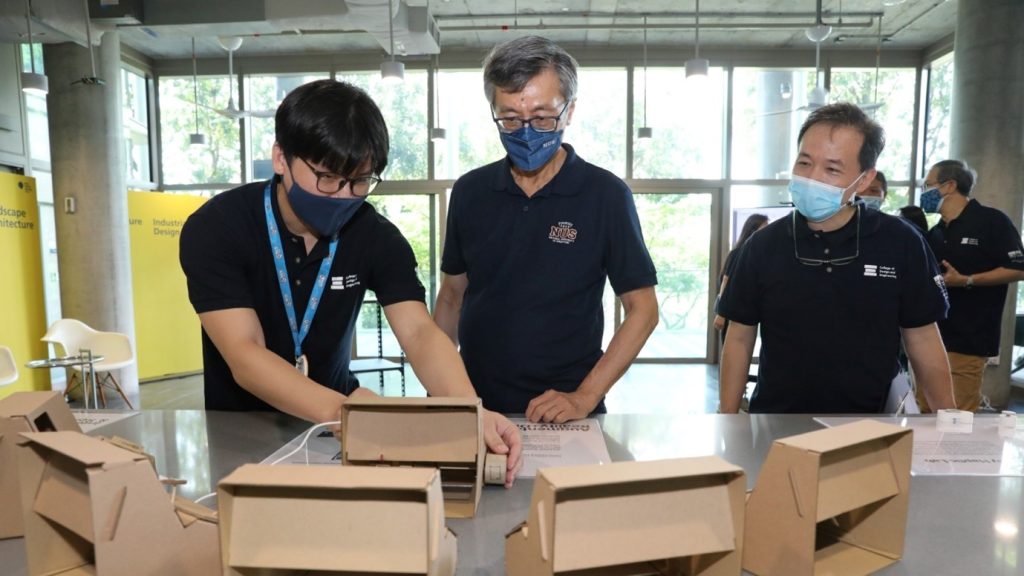
“The NUS Open House provided me with a more informed perspective on the courses offered in NUS. The various booths set up and run by students allowed for quick chats about what the courses have to offer. The responses by the students and professors were engaging and genuine, which I found informative in making my choice for courses in NUS,” said Kalepu Sai Sri Akshath, who attended CDE’s online and in-person events with his family and is intending to apply to Computer Engineering.
Drone-sensing demonstrations and the Solar Roof Tour, 5G Lab Tour, and BEEHUB Tour further showcased the College’s manifold facilities. Visitors also got a first-hand experience of NUS’ very own net-zero energy building through tours at SDE4, itself a product of both architecture and engineering, and the first of its kind in Singapore.
A marriage of the humanities and sciences
Continuing in the vein of interdisciplinarity and equipping students with a multifaceted, integrated toolbox of skills to thrive in the future economy is the College of Humanities and Sciences (CHS), which will be accepting its second intake this year.
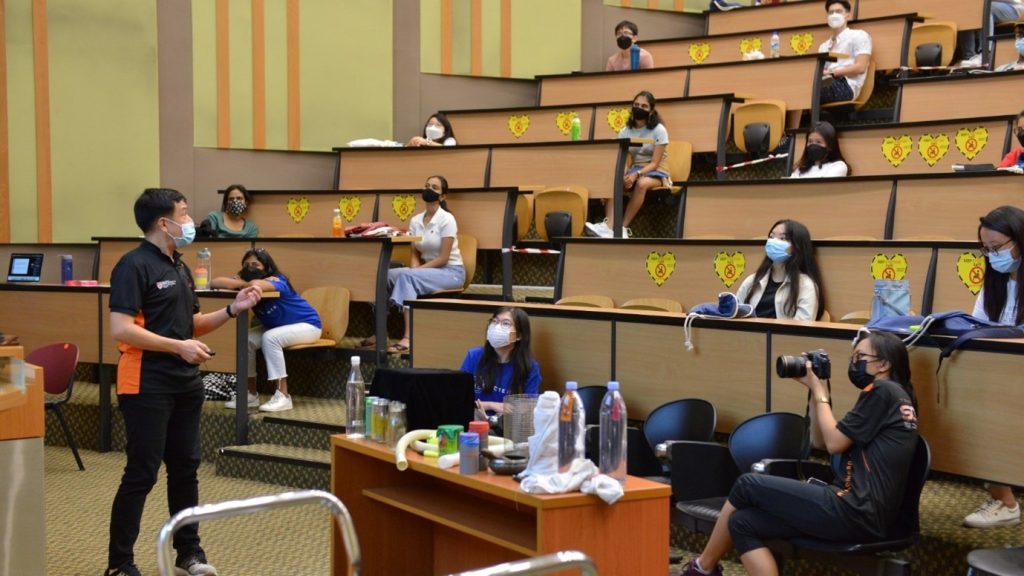
Seminars about the CHS Core Curriculum were available at the Open House, as well as informative masterclasses that covered a vast range of interdisciplinary topics.
The Data Science and Economics masterclass saw Assoc Prof Lim Tiong Wee and Assoc Prof Chen Ying (Statistics & Data Science, Faculty of Science) and Dr Denis Tkachenko (Faculty of Arts and Social Sciences) break down the complexities of the digital economy with real-life examples, and explicate its relevance to Singapore’s Smart Nation goals.
The new Data Science and Economics (DSE) cross-disciplinary programme will be the first of its kind in Singapore to integrate knowledge across these two disciplines.
“I got to understand how data science and economics complement each other,” said Russell Hor, a graduate of St. Joseph's Institution who has finished National Service and is enrolling in CHS this year.

Vanille Goh, who graduated from Anglo-Chinese Junior College and attended the Geography and Environmental Studies masterclasses, said, “[The masterclasses] provided me with a good overview of how passionate the lecturers were and how each course will adequately prepare me for what I would want to do in the future.”
Nanyang Junior College alumna Wen Xinyue also appreciated the in-person masterclasses, adding that they gave her a first-hand glimpse into studying humanities at the university level.
“I am interested in studying English, and from the English Language and Literature masterclass on Gender, Sexuality and Language, I learnt about how entrenched gender roles and stereotypes can be within the language we use,” she shared.
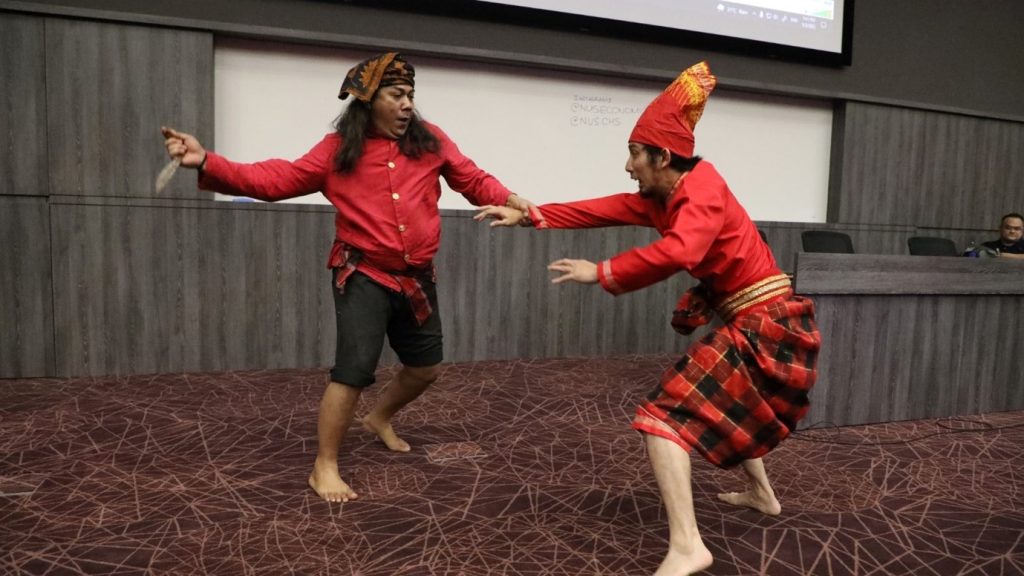
Meanwhile, over at the “Insights into Southeast Asia from the Martial Arts Perspective” masterclass, Dr Mohamed Effendy of NUS Southeast Asian Studies presented prospective students with a riveting intellectual and visual treat, demonstrating how useful unique perspectives on the region’s myriad communities can be gleaned by studying them through the lens of the martial arts. Students saw the concepts brought to life – witnessing first-hand an exciting live demonstration by practitioners of pencak silat – of how Southeast Asian warriors of old defended themselves using a wide array of techniques and weapons.
Action aplenty
There was action aplenty among other faculties. NUS Business School’s programmes included a 360 live tour, as well as live chats with the BBA Deans on the different majors offered by the School. Its in-person sessions included sharing sessions by the BBA Deans, BIZCareers advisors, and student ambassadors.

Year 4 Accountancy and Finance undergraduate Calvin Chur was one such student volunteer, serving as an emcee for the online Open House and sharing in-person on 5 Mar about life at the Business School.
“It was a tiring, but extremely fulfilling day engaging with prospective students, learning about their concerns with regards to entering a new phase of life and trying to address those concerns,” said Calvin. “In fact, many of their concerns mirrored those that I had as a fresh A-level graduate attending the NUS Open House back in 2016 – and I am glad that I could offer insider insights to help them make an informed decision at this major milestone of their lives.”
Year 4 Real Estate undergraduate Natasha Liem, another student volunteer who served as an emcee, added, “There was quite a large number of viewers for the panel and a prospective student actually sent me a message on Instagram to enquire more about real estate from a student's perspective. I think the panel went well!”

For NUS Business School Executive (Marketing & Outreach) Ms Casey Jean Grant, it was an eye-opener to experience the whole planning process.
“Most of the students and parents were very curious and excited about the prospect of coming to NUS Business School,” she added. “Their excitement definitely rubbed off on us and made the rest of us excited to share about our School.”
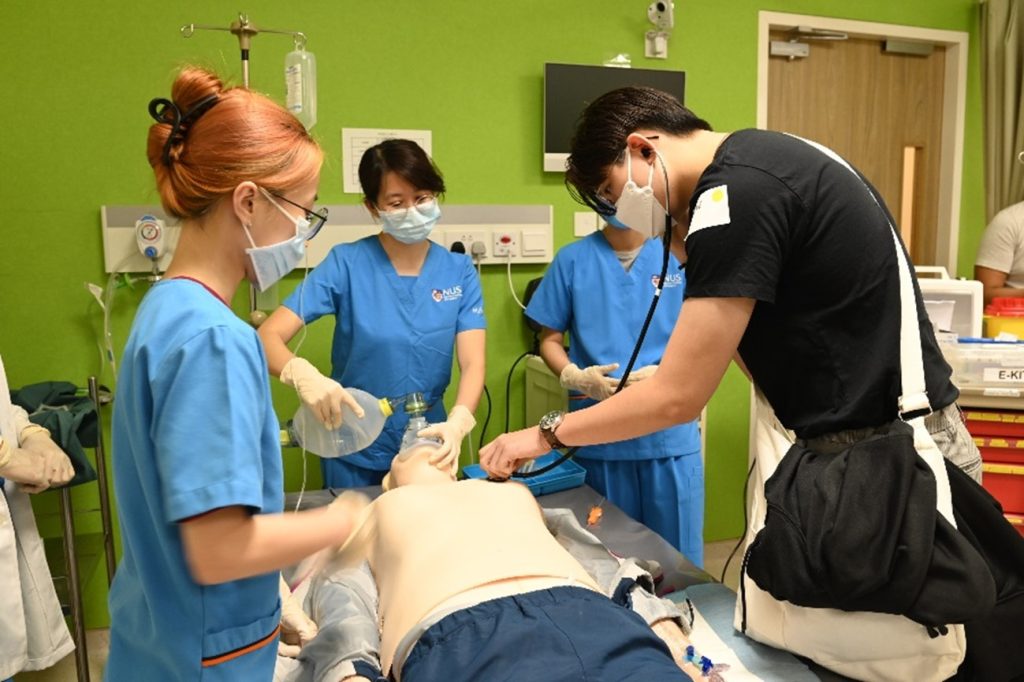
With frontline healthcare workers being in the spotlight these couple of years, there was plenty of interest in NUS Dentistry, NUS Nursing, NUS Medicine, and Duke-NUS Medical School. Live demonstrations were conducted and prospective students got a taste of what it would be like to be a dentist, nurse or doctor.

Serving up a slice of campus life
Whether on the screen or in the flesh, visitors to the Open House also witnessed the rich and vibrant student life beyond the classroom that NUS is known for.

Besides holding talks to acquaint visitors with the wide range of co-curricular activities available, student clubs and societies rose to the occasion at the Student Village showcases to feature a spectacular smorgasbord of music, dance and sporting performance across the eight days that Open House was on. Visitors were serenaded by soulful tunes by the NUS Jazz Band and wowed by the moves of NUS Kendo Club. They were also treated to cheerleading displays, snazzy dance performances by NUS Funkstyle and BreakiNUS, catchy renditions of contemporary pop and choral music by the a cappella group Resonance, and the dulcet tones of TheNUSChoir and the NUS Mandopop group Voices.

"It was really lively with dozens of booths as well as live performances put on by really talented students! It truly allowed me to understand the culture here and makes me want to be a part of it after experiencing first hand,” Vanille Goh shared.
Students and hall masters from the halls and residences also conducted informative residential life talks, A-Day-in-the-Life-Of vlog sessions and Ask-Me-Anything sessions to help students interested in on-campus living understand its manifold aspects like academic programmes and pastoral care.
These were complemented by in-person tours of King Edward VII Hall, NUS College, Ridge View Residential College, Tembusu College, RC4, and Pioneer House, NUS’ newest housing model, giving participants a real taste of the sense of community and camaraderie that comes with residential life in NUS.
Joshua Chua, who also participated in the RC4 tour, said, “The RC4 tour was definitely a highlight because the tour guide, as with most staff and students, was welcoming and frank, which eased my nervousness.”

Matthew Yeow, an alumnus of Anglo-Chinese School (Independent) who attended both online and in-person sharing sessions by student residents of the Residential Colleges, said, “During the physical Open House, I had the opportunity to find out a lot more about the residential colleges and what made them distinct from halls. Furthermore, I also got to find out more about the individual residential colleges and their communities, as well as the additional modules they took.”
“As a prospective student, I think the Open House was executed effectively through both the online and physical mediums. Having the opportunity to come down and visit the University and talk to the current students gave me a better understanding of student life in NUS,” he added.

This story first appeared on NUSNews on 8 March 2022.
New Courses for the New Economy
IN BRIEF | 5 min read
- NUS is offering a number of new programmes to prepare graduates for the future, including the much-anticipated Major in Anthropology, and Minor in Interpreting by the NUS Department of Chinese Studies.
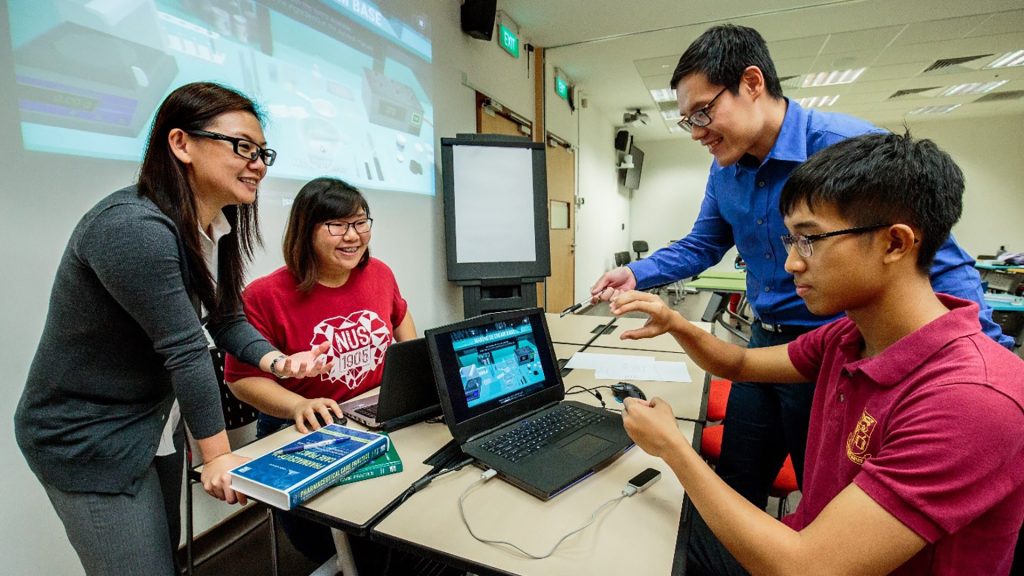
The University’s key theme of preparing undergraduates for the workplace of the future will be further enhanced with the launch of new majors, minors and degree specialisations in the upcoming academic year. About 10 new courses are on the cards.
New programmes from the NUS College of Design and Engineering (CDE), NUS Faculty of Science, NUS School of Computing, and NUS Faculty of Arts and Social Sciences will cover areas such as Artificial Intelligence, technology, data science, sustainability, globalisation. They will add on to the interdisciplinary offerings by the flagship NUS College, Singapore’s first honours college welcoming its first cohort in August – as well as those by the College of Humanities and Sciences (CHS).
“The overall goal of all our education reform efforts is to advance a university curriculum that prepares students well for a Fourth Industrial Revolution world and workplace,” said Professor Bernard Tan, NUS Senior Vice Provost (Undergraduate Education).
“Our education, focused on both breadth and depth, ensures that our graduates are held in high regard by employers. Last year, more than nine in 10 NUS graduates secured a job within six months of their final examinations.”
New majors and minors
Bachelor of Engineering (Infrastructure and Project Management)Offered by CDE’s Department of the Built Environment, this degree will equip graduates with the knowledge and interdisciplinary skills to excel in the multifaceted built environment. This is the first interdisciplinary full-time undergraduate programme to cover engineering, design, management, technology, building science and law modules. Major in Anthropology
Offered by the NUS Faculty of Arts and Social Sciences to all CHS students, this major will study the range of human diversity, accounting for how people in different times and places have developed into distinctly different societies. The degree will expose students to a vast variety of different beliefs and health practices, economic and political systems, material culture, and even different notions of beauty, the environment, food, family, and the good life.
Anthropology is much sought after for the sort of training it offers its students – a ground up approach to developing deep understanding on just about every aspect of the human condition. Students will be equipped to better understand and deal with the chaos, uncertainty, and ambiguity that characterises the contemporary age.
Second Major in Sustainable Urban DevelopmentOffered by CDE’s Department of Civil and Environmental Engineering, it aims to train the next generation of urban problem-solvers. They will be equipped with interdisciplinary knowledge and skills to create sustainable urban environments in the context of the changing climate. Open to all NUS undergraduate students, this major is stackable to students’ primary major in their chosen field, and can be completed in four years with no additional academic workload. Second Major in Nutrition
This will be offered by the Faculty of Science to all CHS students, including those reading Food Science and Technology as the primary major. It is designed to equip students with knowledge in human nutrition, providing them with the necessary foundation to develop a cross-disciplinary perspective along the food supply chain – from farm to fork to health. Minor in Interpreting
Multilingualism is a defining characteristic of Singapore’s multi-ethnic, immigrant society. With four official languages and with English as the working language, translating and interpreting between each of the mother tongues and English has always been a prominent feature of Singapore society. Against this backdrop, the NUS Department of Chinese Studies has placed as one of its core objectives, the training of graduates with strong Chinese-English bilingual skills who can become leaders in the translation and interpreting arenas.
This new Minor will allow students a related alternative to translation, or as an affiliated Minor to Translation which is already being offered at the Department.
New specialisations
Three new specialisations will be offered by the NUS School of Computing:
Specialisation in Digital Product and Platform ManagementThis will be offered to students pursuing the Bachelor of Computing (Information Systems) Degree. They will build up a repertoire of knowledge and skills sought after by both technology companies and the digital immigrant companies that are fast adopting the product- and platform-centric technology and business operating models. Specialisation in Intelligent Systems Solutioning
Students pursuing the Bachelor of Computing (Information Systems) Degree can also take this new specialisation to learn to implement and apply intelligent system solutions buttressed by the new technologies of Artificial Intelligence, the Internet of Things, and Augmented Reality. They will learn to apply these new technologies in software engineering, and to implement and manage intelligent system solutions. Graduates will be able to take on job roles in intelligent systems engineering and solutioning. Specialisation in Machine Learning-based Analytics
This new specialisation for Bachelor of Science (Business Analytics) students will enable students to tap into the analytics capabilities of Machine Learning, a sub-field of Artificial Intelligence. They will learn to rapidly and automatically develop models that can quickly and accurately analyse massive, complex data sets, in order to help businesses unlock the value of corporate and customer data and enact decisions that keep them ahead of the competition. Graduates will be able to take on careers in the rapidly-growing business and data analytics field, among others.
New modules
Aside from the new majors, minors and specialisations, a number of new modules are being offered. For instance, the NUS School of Computing is starting a Digital Ethics and Data Privacy module to educate students on this pertinent and pressing issue.
The NUS Faculty of Law is introducing two modules – one on Law & Technology and one on Data Literacy – as technology and data are increasingly being key drivers for the legal industry.
Find out more about the courses offered by the University, and explore this year’s Open House. Here are four things to look out for at the Open House.
This story first appeared on NUSNews on 24 February 2022.
NUS Open House 2022: Interdisciplinary Offerings, In-person Activities and More!
IN BRIEF | 5 min read
- NUS Open House 2022 is back with opportunities for prospective students to meet NUS professors, students and alumni face-to-face, after two years of connecting virtually.
- Running from 26 February through 5 March, NUS Open House 2022 will begin with a comprehensive line-up of informative activities, including the online segment, during the week leading up to the physical Open House, which takes place on Saturday, 5 March from 9 am to 7 pm across NUS’ campuses in Kent Ridge and Bukit Timah.

NUS Open House 2022 is back with opportunities for prospective students to meet NUS professors, students and alumni face-to-face, after two years of connecting virtually.
The physical event will take place on Sat, 5 Mar from 9am to 7pm across NUS’ campuses in Kent Ridge and Bukit Timah. This will be preceded by a comprehensive line-up of informative activities during the week leading up to the physical Open House.
Including the online segment, NUS Open House 2022 takes place from 26 Feb to 5 Mar. Here’s a heads-up on four things to check out:
1. Exciting interdisciplinary offerings
NUS College, Singapore’s first honours college, was formed by the merger of the University Scholars Programme and Yale-NUS College. Offering an immersive, experiential and interdisciplinary educational journey, it will welcome its first batch of students this year. Students will have a home college or faculty, say, Business or Engineering, while simultaneously being enrolled at NUS College. There, they will have the opportunity to enjoy a holistic interdisciplinary curriculum that is complementary to their major.
Another option for interdisciplinary learning can be found at NUS College of Design and Engineering. The College offers a programme that prepares students for the future through interdisciplinary learning and robust research in the fields of engineering and design. At the College, students are given the flexibility to build and design their own learning experience.
The NUS College of Humanities and Sciences, the enhanced undergraduate experience for students of the Faculty of Arts & Social Sciences and the Faculty of Science, is accepting its second intake this year. The College offers 13 Common Curriculum pillars consisting of modules such as scientific inquiry, humanities, digital literacy, design thinking, artificial intelligence and many more exciting options. These are complemented by majors and minors spanning the arts, humanities and sciences, such as global studies, philosophy, theatre and performance studies, quantitative finance, data analytics and pharmaceutical science. Students can pick and choose modules to create a customised curriculum that matches their interest and aspirations.
To ensure that graduates are ready to take on leading roles in the New Economy, NUS constantly develops new courses. Here are this year's new offerings.

2. Meeting you in person - again
After two years of meeting virtually, the NUS community is excited to get together in real life with prospective students once again!
You can look forward to an enlightening schedule of in-person activities including a tour of the Centre for Healthcare Simulation by NUS Nursing; tours of residential living options such as Tembusu College, CAPT (College of Alice & Peter Tan), and RC4; a live demonstration of a moot court session and tour of the NUS Bukit Timah campus by NUS Law; tours and a showcase of NUS College; as well as a live question-and-answer session with Duke-NUS Medical School.
3. Webinars, talks, live chats, hotlines and more
Get a taste of life as an NUS student, even before the physical event. A host of insightful webinars, talks, question-and-answer sessions, live chats, hotlines, and virtual tours have been arranged starting 26 Feb to give you a head start on topics such as admissions, student life, and on-campus living, as well as programmes offered by NUS College, the College of Design and Engineering, the College of Humanities and Sciences, Business, Music and many more.
Obtain behind-the-scenes knowledge from NUS student ambassadors and the NUS Students’ Union on the rich student life available at NUS, and be serenaded by NUS Choir and NUS Jazz Band.
Professors will be on hand to share information on their respective programmes, and you’ll even have a chance to sit in on classes. Have a question that is not covered by the briefing? No sweat! There’ll be chat sessions with NUS Admissions, professors and students from selected programmes during which you can get your queries addressed.
Click here for the list of virtual and in-person activities for NUS Open House.

4. Exciting student life
NUS offers a myriad options for a rich student life, and NUS Open House is the perfect place to start exploring the possibilities. Many alumni recall their NUS days fondly, remembering not only the academic progress they made, but the camaraderie forged with friends from clubs, societies and on-campus residences.
Throughout the period of the online Open House and during the physical event, representatives from various student-led groups will speak on topics including hall life, clubs and societies, as well as campus performing groups. Take part in a live session with music and dance groups, embark on a virtual residential tour, and more.
We’re looking forward to seeing you online from 26 Feb and in-person on 5 Mar!

This story first appeared on NUSNews on 23 February 2022.
FASS Inspiring Mentor 2021 Award Winners Announced

The NUS Faculty of Arts and Social Sciences is proud to announce the winners of the 2021 FASS Inspiring Mentor Awards.
Congratulations to:
- Prof Jack Qiu Linchuan, Professor, Department of Communications and New Media
- Assoc Prof Loy Hui Chieh, Associate Professor, Department of Philosophy
- Assoc Prof Robin Loon Seong Yun, Associate Professor, Department of English Language and Literature
- Dr Michael Yoshitaka Erlewine, Assistant Professor, Department of English Language and Literature
- Dr Nina Laurel Powell, Senior Lecturer, Department of Psychology
Winners of AY2020-21 Faculty Teaching Excellence Awards Unveiled
 The NUS Faculty of Arts and Social Sciences is proud to announce the 37 winners of the Faculty Teaching Excellence Award for their work in AY2020‐21, 16 of which have also been nominated for the Annual Teaching Excellence Award(ATEA) and Annual Digital Education Award (ADEA).
The NUS Faculty of Arts and Social Sciences is proud to announce the 37 winners of the Faculty Teaching Excellence Award for their work in AY2020‐21, 16 of which have also been nominated for the Annual Teaching Excellence Award(ATEA) and Annual Digital Education Award (ADEA).
Special thanks are due to members of the Faculty Teaching Excellence Committee–Dr Susan Ang (English Language and Literature and Chair of FTEC), A/P Loy Hui Chieh (Philosophy; FASS Vice‐Dean), A/P Lim Wee Hun, Stephen (Psychology), Dr Gilbert Yeoh (English Language and Literature) and Mrs Chen Ing Ru (Centre for Language Studies)–for their efforts in shortlisting and nominating the winners.
|
NAME |
DEPARTMENT |
|
Mr Appriou Yannick Francois |
Centre for Language Studies |
|
Ms Baranska, Malwina |
Centre for Language Studies |
|
Ms Klayklueng, Sasiwimol |
Centre for Language Studies |
|
Ms Morita, Kazuko |
Centre for Language Studies |
|
Dr Chaidaroon Suwichit |
Communications and New Media |
|
Dr Hong Renyi |
Communications and New Media |
|
Dr Mitchell, Alexander Ian |
Communications and New Media |
|
Dr Shobha Avadhani |
Communications and New Media |
|
Mr Tan Kai En |
Communications and New Media |
|
Dr Timothy Wong Chong Ji |
Economics |
|
Dr Vu Thanh Hai |
Economics |
|
A/P Michelle M. Lazar |
English Language & Literature |
|
Dr Miguel Escobar Varela |
English Language & Literature |
|
A/P Starr Rebecca Lurie |
English Language & Literature |
|
A/P Thell Anne Marie |
English Language & Literature |
|
Dr Roy, Tania |
English Language & Literature |
|
A/P Chang Tou Chuang |
Geography |
|
A/P Daniel Adam Friess |
Geography |
|
Dr Gretchen Christina Coffman |
Geography |
|
Dr Kamalini Ramdas |
Geography |
|
Dr Kenney-Lazar Miles Richard |
Geography |
|
Dr Teo Sheng Kiat, Shaun |
Geography |
|
Dr Donna Maree Brunero |
History |
|
Dr Lawrence, Kelvin |
History |
|
Dr Sayaka Chatani |
History |
|
Dr Beddor, Robert Speeter |
Philosophy |
|
Prof Bain, William Ward |
Political Science |
|
Dr Dunya Deniz Lepori |
Political Science |
|
Dr Jia Lile |
Psychology |
|
Dr Nina Laurel Powell |
Psychology |
|
Dr Wong Shi Hui Sarah |
Psychology |
|
Dr Peace Wong Yuh Ju |
Social Work |
|
Dr Chua Hui Ching, Emily |
Sociology |
|
Dr Elliott Edward Prasse-Freeman |
Sociology |
|
Dr Jennifer Emily Estes |
Sociology |
|
Dr Noorman Abdullah |
Sociology |
|
Dr Radics, George Baylon |
Sociology |
Congratulations to them all!
FASS Announces New Additions to Leadership Team
IN BRIEF | 2 min read
The NUS Faculty of Arts and Social Sciences is pleased to announce recent new appointments to the Faculty's leadership team.
Three eminent members of the Faculty received new appointments to the Deanery at the beginning of this year:
- Professor Joseph Park (English Language and Literature)
Vice-Dean (Undergraduate Studies) - Dr Zhang Yang (Economics)
Associate Dean (Undergraduate Studies) - Dr Noorman Abdullah (Sociology)
Assistant Dean (External Relations and Student Life)
We wish them the very best with their new portfolios. Click here to visit the FASS Deanery page.




NUS Bags Major PR Award for College of Humanities and Sciences Campaign

One year since the official inauguration of the NUS College of Humanities and Sciences (CHS), the publicity campaign for the new College has gained recognition at the recent Public Relations in the Service of Mankind (PRISM) Awards.
The University bagged a Distinction Award in the category “Outstanding Campaign by a Non-Government Organisation or Not-For-Profit Organisation” for the launch and publicity of the interdisciplinary College.
The award recognises NUS’ effective communications regarding the necessity of an interdisciplinary education to faculty members, prospective students and their parents, alumni, employers, and members of the public.
The campaign also underscored what CHS offers students in a world plagued by complex challenges that require integrated interdisciplinary approaches. The campaign included the launch event, student profiles, social media, and CHS collaterals and media assets in the form of CHS-specific infographics, news and FAQs.
The campaign also included a video series on interdisciplinarity, a podcast series by the teaching team of the common curriculum Humanities module, and stakeholder endorsement in the form of testimonials from students and alumni of NUS Faculty of Arts and Social Sciences (FASS) and the NUS Faculty of Science (FoS) who have pursued interdisciplinary studies. A successful admissions publicity campaign was run, including the 2021 NUS Open House which drummed up interest in the College with student and employer panels, small group tours, and student chat rooms.

The accolade from PRISM, which coincides with the one-year anniversary of the official inauguration of CHS, bears testament to the concerted effort on multiple fronts of the campaign by various stakeholders, including the Communications teams from FASS and FoS, the NUS Office of University Communications and communications agency AKA Asia.
“The award comes as a truly wonderful one-year anniversary gift to all our colleagues involved in the CHS campaign,” said NUS Chief Communications Officer Ms Ovidia Lim-Rajaram.
“It is gratifying to know that our efforts to kickstart a meaningful, groundbreaking programme at the College are paying off, and that the journey to promoting an interdisciplinary, 21st-century educational experience at NUS is off to a great start.”
Communications at CHS is co-led by Mr Nisar Keshvani, Associate Director for Strategic Outreach and Communications at FASS, and Ms Janice Quah, Associate Director for Corporate Communications at FoS.
“The campaign award, a result of the synergy and collaboration across diverse University faculties and departments, epitomises the spirit of interdisciplinarity that CHS values, and the idea of capitalising on each other’s strengths to achieve the best outcomes,” Mr Keshvani said.
Ms Quah added, “It has been a challenging journey but seeing our communications ideas collectively come to fruition is truly fulfilling! The validation of the hard work motivates us to continue raising the bar, to sustain the impactful profiling of CHS to students and stakeholders.”
Recognising the best in public relations
Celebrating 44 winners across 27 categories, the PRISM awards ceremony was held on 15 Dec by the Institute of Public Relations Singapore (IPRS), the only accrediting body for public relations practitioners in Singapore. The Guest of Honour was Mr Tan Kiat How, Minister of State at the Ministry of Communications and Information (MCI).
Acknowledging the challenges of a shifting communications landscape, Mr Tan said, “MCI recognises the importance of excellence in public relations and communications across all sectors of the economy.”
“The campaigns up for awards today show how all of you have worked around these challenges and continued to achieve excellent levels of reach and impact.”

Held biennially since 1987, the PRISM Awards is one of the oldest and most prestigious awards in the industry, celebrating Singapore’s brightest stars in the communications and public relations industry. It is judged by a panel of established business leaders and senior practitioners, recognising and honouring organisations and individuals for excellence in public relations and communications.
Ms Koh Juat Muay, President of the IPRS Council 2021/2023 said, “The winning entries and the winners this year reveal a singular story – the resilience of our people, the ingenuity of the campaigns and strength of the organisations that continues to thrive in an evolving local and global communications landscape.”
“IPRS is privileged to hold PRISM Awards 2021 and share in the pride of profession demonstrated by our people and in the brilliance of their campaigns. Our winners truly embody the meaning of PRISM and that is Public Relations In the Service of Mankind,” she added.
This story first appeared in NUSNews on 21 December 2021.
An Interview with Emeritus Prof S. Vasoo and Assoc Prof Winston Goh on The Strange Start of Psychology at the National University of Singapore
The Strange Start of Psychology at the National University of Singapore (NUS Department of Psychology, 2021), showcases the history of the NUS Faculty of Arts and Social Sciences' Department of Psychology, Singapore's oldest psychology programme. The programme, which kicked off during the 86/87 academic year at the Department of Social Work (renamed the Department of Social Work and Psychology), became a department in 2005.

Author Dr John Michael Elliott (1945-2019), who was at the time a psychologist at the then Ministry of Social Affairs, joined the programme six weeks after it began and retired in 2018.
As the book explains, in Singapore, historically psychology was viewed more as clinical work that supported psychiatry, and mental health care was deprioritized. Instead, during the island's colonial era, patients requiring mental health treatment were institutionalized in The Insane Hospital, which commenced operations in 1841 with 30 beds. This hospital evolved into The Lunatic Asylum (1862, 100 beds), followed by The New Lunatic Asylum (1887, 300 beds), and then the Mental Hospital in 1928, which became Woodbridge Hospital in 1951.

In 1993, Woodbridge Hospital moved to Buangkok Green, becoming the Institute of Mental Health's new inpatient facility.
There was a definite need for trained psychologists in Singapore, as well as a programme to train them, since, post-independence, all psychologists in the country completed their education abroad. When the NUS psychology programme got started in July 1986, however, the discipline was still often seen as non-Asian and more as medical training than a social sciences course, and also as a luxury in the realm of social work. The Department of Social Work was an ideal place for the new programme, Dr Elliott notes, as it would contribute to the department's own development, enabling it to offer an honours degree in social work and psychology.

The NUS psychology programme's initial cohort had 72 students and 1 staff and grew rapidly. There are currently around 900 students in the introductory psychology module and 220 honours graduates annually. At its inception 35 years ago the programme offered a three year general degree with a competitive fourth year honours degree. In 1989, 50 students received a general degree, 11 of whom went on to get an honours degree. Today, the department's own clinical psychology master's programme graduates approximately 15 annually, and psychology graduate students can also obtain a Master of Social Sciences or PhD.
The NUS Department of Psychology ranks 16 out of 303 on the Quacquarelli Symonds list and psychology is a well recognized and respected course of study in Singapore. Many graduates go on to engage in psychological work in the public sector, such as in Singapore's Ministries of Health, Defense, Home Affairs, and Social and Family Development. A number of graduates are also employed in private sector positions involving psychological work like human resource management and marketing, or in private practice in the fields of clinical, counselling, and industrial-organisational psychology, among others.

We discussed the The Strange Start of Psychology at the National University of Singapore, which has an online launch on Friday, 10th December at 11 am, with Associate Professor Winston D. Goh, the current NUS Department of Psychology Head, and Emeritus Professor S. Vasoo, who led the then NUS Department of Social Work and Psychology from 1987 to 1999.
 A/P Vasoo Q & A
A/P Vasoo Q & A
1. What were your most memorable experiences developing the new psychology programme during your term leading the NUS Department of Social Work and Psychology?
I have been teaching students and working with academic staff for about 50 years. In the course of these years, I always encouraged and advised them not to look back on events that had surpassed them. This is because memorable matters would not come back and one would not be able to deal with the bygones. No point spending time lamenting over things that have gone past as it can be emotionally costly and tiring. I always encourage students and academic staff to look ahead on events that will be forthcoming as these can be managed as they unfold and are within their control. I am of the opinion that various human issues that we can grasp at hand are largely solvable as long as we persistently tackle them with empathy. It is only with good empathy that we can have clearer insights to deal with human issues and relationships.
I recall that one of the challenging tasks that I had to deal with as the Head of the Department of Social Work and Psychology was to quickly recruit a group of Psychology academic staff to deliver the undergraduate psychology programme in 1986. I had selected staff with diverse psychology training such as a developmental psychologist, a cognitive psychologist, a social psychologist, an experimental psychologist, a clinical psychologist, and a psycholinguist. You can imagine with these varied backgrounds coming together to agree on a basic undergraduate curriculum was not easy. Each of them had different hobby horses to ride, which was understandable while mind-boggling, as there were protracted views within the group and at times heated arguments that I had to mediate. I brokered a deal as a non-partisan and drew a consensus among the different psychological academic personalities for the need to develop a top-notch undergraduate psychology programme based on the best psychology departments in the United Kingdom and United States. The foundation laid for the early phase of the psychology programme saw the fruition of some of our top psychology scholars in the Faculty of Arts and Social Sciences. I am indeed proud to witness that some of these accomplished scholars have become lead anchors of the NUS Department of Psychology and later appointed Heads. The nurturance of these top scholars have helped stabilize the psychology programme and provided succession of leadership. They also supported the Deanery of the Faculty of Arts and Social Sciences.
2. What can psychologists learn from social workers, and what can social workers learn from psychologists?

To put it simply, both psychology and social work are non-identical twin disciplines with each having to deal with human behaviour and social issues. As a psychologist, one has to understand human behaviour and the cause of such behaviour, and as a social worker, one has to understand the cause of social and human problems and then enable people to find ways to problem solve. Both disciplines deal with human and psychosocial issues, and human behaviour requires a multidisciplinary focus. I would say that no single discipline is adequate to solve human life course issues. I must add that a good psychologist will require social work lenses and a competent social worker needs to have helpful psychological lenses. As one will appreciate, we are all human beings and are ecologically bounded. Therefore both psychological and social work analyses are critical to better appreciate human behaviour and social interactions, and these can contribute to effective human and social problem solving.
3. What do you see as the most notable impacts in practice of social work and psychology in Singapore so far and in the future?

Psychology graduates as well as social work graduates are making robust contributions in public service, private enterprises, and non-governmental organisations. Psychologists hold highly respectable positions in areas such as clinical services, rehabilitation, health, human resources, education, the armed forces and the police, besides others. Increasingly, psychologists are needed to contribute psychological solutions to strengthen our psychological defences against various societal crises.
Likewise, social workers are also appointed in highly regarded positions in fields such as social services, rehabilitation, health, social research, counselling and mental health, education, the armed forces, and childcare, among others. Both psychologists and social workers have so far given valuable suggestions and inputs to policy changes to the care and protection of children, youth, and women, and in the support of the vulnerable and the promotion of inclusiveness of people with special needs.
Singapore like the rest of the world will be confronted with serious social and ecological changes, including the consequences of unabated climate change. In view of these changing scenarios, our future psychologists will have to be equipped with psychological skills in assessing the impact of human behaviour on mitigating issues related to the environment and climate change as well in order to have good insight into the social and psychological consequences of an ageing Singapore community. Trainee social workers can be better equipped with social analytical skills, which will make them more versatile in predicting specific vulnerable sectors of the community. Thereby, the future social workers can enhance their community problem solving capacity by building more support networks to build a socially healthy community. Specifically, more attention can be paid by both social workers and psychologists to deal with the social and psychological implications of the growing social divide between the haves and have-nots, and find more innovative ways to deliver services to enable the less well-off to move up.
 A/P Goh Q & A
A/P Goh Q & A
1. What are some of your fondest memories of Dr John Elliott, first as a teacher, and later as a colleague?
John encouraged critical thinking and we always had very illuminating discussions during his tutorials (see photo on page 28); of course, tutorials at that time only had between 5 and 7 students, so very difficult to hide! He was quite a tough marker though - never got an A from him for my term papers; but then again, As were given out very sparingly during that period (and there were no CAs at that time; the term paper grades were not counted). As a colleague, he was always willing to give advice to young hires, and his experience helped me immensely in the crafting of exam questions when I first started helming my own modules. I also remember he was very particular in signing or agreeing to legal documents - he once refused to upload materials into IVLE (the forerunner of LumiNUS) because he felt NUS did not provide enough protection for staff.
2. What motivated you to study psychology at NUS as an honours and then Masters student, and what prompted you to return to the department to teach and carry out research projects?
 I was in the pre-med programme in junior college, so the path seemed straightforward for me. But I started reading about psychology as a course in various government information booklets and thought this was more interesting than medicine - I also didn't do well at the A levels, so perhaps this was fate telling me to take another path. However, this meant you had to go overseas as there was no psychology programme offered locally and my parents could not afford an overseas education. So when I was accepted in FASS, I was set to major in the closest one at the time - Sociology. I didn't start right away as I had to serve National Service; and in my second year of NS, I found out that NUS had started a psychology programme (again, fate may have been looking out for me!). Fortunately, I did well enough in the aptitude test (required then) to be allowed to major in Psychology. Everyone was hoping to do Honours, and at the time, you had to be invited, so I was elated when the Department of Social Work and Psychology offered me Honours, no motivation required. As for the Masters, I worked as an RA after completing my Honours, so I wanted to see if a research and academic career appealed to me, and decided to do my Masters while I was a TA for the Department. After that, NUS funded my PhD overseas on a staff development scheme, so I was obligated to return to serve a bond. In a sense, NUS Psychology has been my home since I started as an undergrad student, for I never left!
I was in the pre-med programme in junior college, so the path seemed straightforward for me. But I started reading about psychology as a course in various government information booklets and thought this was more interesting than medicine - I also didn't do well at the A levels, so perhaps this was fate telling me to take another path. However, this meant you had to go overseas as there was no psychology programme offered locally and my parents could not afford an overseas education. So when I was accepted in FASS, I was set to major in the closest one at the time - Sociology. I didn't start right away as I had to serve National Service; and in my second year of NS, I found out that NUS had started a psychology programme (again, fate may have been looking out for me!). Fortunately, I did well enough in the aptitude test (required then) to be allowed to major in Psychology. Everyone was hoping to do Honours, and at the time, you had to be invited, so I was elated when the Department of Social Work and Psychology offered me Honours, no motivation required. As for the Masters, I worked as an RA after completing my Honours, so I wanted to see if a research and academic career appealed to me, and decided to do my Masters while I was a TA for the Department. After that, NUS funded my PhD overseas on a staff development scheme, so I was obligated to return to serve a bond. In a sense, NUS Psychology has been my home since I started as an undergrad student, for I never left!
3. What future plans are in the works for NUS Psychology and how do they connect to the need for scholars and practitioners of the discipline in Singapore and the region?

Top psychology departments in the world are very well resourced with research spaces, laboratories, and facilities; so we hope to move in that direction and provide all of our research-active staff dedicated lab spaces to do research that will benefit Singapore and the discipline in general. We will also need to see how many more students (we have always been one of the more in-demand majors since inception) will want to be Psychology majors with the advent of the College of Humanities and Sciences, and perhaps develop various teaching innovations to serve an even more expanded student body (the days of 5-7 pax tutorials, or a 10-student Honours cohort in my year, are long gone). But we have very good educators in the department, so I am not worried about that. Our Clinical Psychology Masters programme is also in very high demand, given the focus on mental health needs nowadays. So we will need to see how we can support training for manpower needs in the public and private sectors in terms of workshops for associate psychologists, in additional to training people to be professional clinical psychologists.
Thank you very much for your time and answers, Prof Vasoo and A/P Goh! Readers can learn more about the history of the NUS Department of Psychology here. Catch the book launch on Friday December 10th at 11 AM by registering via Zoom.
CFP - 31 Jan 2022 | Malay World Manuscripts: Medium and Method in Decentring Dominant Narratives | 22-23 Sep 2022, Singapore
CALL FOR PAPERS DEADLINE: 31 JANUARY 2022
MALAY WORLD MANUSCRIPTS
Medium and Method in Decentring Dominant Narratives
| DATE | : | 22-23 September 2022 |
| VENUE | : | National University of Singapore @ Kent Ridge Campus |
| LINK | : | https://ari.nus.edu.sg/events/mwm/ |
This workshop is jointly organised with the Department of Malay Studies, National University of Singapore; funded by the Ministry of Education (MOE) Academic Research Fund Tier 1 Grant.
This proposed workshop will convene physically in Singapore (subject to travel conditions at the time of the workshop period). Research related to this workshop is funded by the MOE Academic Research Fund Tier 1 grant. It aims to explore different methods, approaches, and perspectives to the study of an important medium – Malay World manuscripts. The workshop attempts to advance the study of Malay manuscripts as a new epistemic source for the redefinition of social, ecological and cosmological life within the fields of historiography and the sociology of knowledge, as well as to reinvigorate the relevance of Area Studies in contemporary times, where state-centrism and nation-state borders are being contested.
Manuscripts are generally defined as handwritten and hand decorated. They may be works of original compositions, translated from other languages, copied from other sources, recopied, and added by an author or many authors through time. However, with the advent of new technologies, these handwritten manuscripts were lithographed, printed, and are now being digitised. What significance do these developments have for the study of manuscripts? How do we define “manuscript” and what are the novel approaches to studying, collecting and using manuscripts? Indeed, this must be problematised.
Manuscripts written in Malay prior to the colonial period, even with later additions, constitute a significant corpus of local knowledge production and representation. However, rather than viewing the manuscript as the repository of authentic ‘indigeneity’, we propose to interrogate the manuscript as a medium and method for ‘decentring dominant narratives’. This can be interpreted as a project for the decentring of epistemic narratives which have centred the epochal sway of imperialism, colonialism and nationalism (primarily European-driven) as the ‘singular dominant’ point in the historicisation of ‘Asia’ versus the rest, or of the Malay world, in comparison to others. Will the examination of these Malay manuscript texts uncover alternative paradigms that provide the longue durée perspective of social processes? Could this result in coloniality and its effects to be nudged from their dominant and centred position to a more multi-layered, interconnected, and circulatory time frame where ‘other’ plural paradigms with new meaningful categories, new imaginaries and new methodologies will be discovered? The method of inter-referencing and multiplying frames of reference without placing Europe and coloniality at the centre allows for many other agents to be recognized as the significant and interconnecting points of reference. The Malay world before colonialism was not parochial or ‘local’ but one that was already connected to the other power centres such as in China, India, Middle East and Eurasia before the rise of Europe.
Malay Manuscripts have long been and considerably studied before this, within the fields of literature, history, linguistics, philology, and cultural studies. This workshop proposes to investigate novel and innovative approaches to studying these manuscripts where they will straddle both medium and method and as a multiple site of meaning-making. Textualism as a tool for reading and re-reading the manuscripts, intertextuality, or the process of deconstructive reading, in which the text and its textuality can be read as the intersection of numerous social processes, and relationships within the Malay Archipelago and beyond.
Texts and contexts or “new historicism” is another method for establishing the historicity of texts and the textuality of history by triangulating or corroborating manuscripts with other contemporary sources to reconstruct societies from which manuscripts were deemed to have been produced. Manuscripts could also be considered as a ‘social thing’ with a biographical narrative of mobility and circulation. Old manuscripts are material artifacts, with a history of ‘travelling’ and of ‘utility’ and ‘function’. The method for tracing this will combine both historical and ethnographic study of how manuscripts and their meanings have been used within contemporary political and cultural discourse. This workshop invites such studies in the hope of establishing a forum to explore novel approaches to facilitate more inter-disciplinary collaborations and initiate new dialogues between experts from diverse fields and geographical areas of study.
Thematic readings will assist workshop participants to focus on specific genres of manuscripts such as the kitab-sejarah (historical-religious), the hikayat (stories), syair (narrative poems), silsilah (genealogies) court chronicles and letters. The following themes may be examined: 1) State Formation 2) Gender Relations 3) Conceptions of Power and Inequality 4) Diplomacy and Intercultural Engagements 5) Enchantment and Magic 6) Origin and Founding stories and 7) Political Economy.
The outcome of the workshop will be the identification of new global relationships and cross-cultural borrowings where circulation, connectivity, interactivity and interdependency of knowledge production is key. Understanding the past through decolonising genealogies will enable a more complete understanding of how future trajectories on issues of power, inequality and conflicts may be projected.
The workshop welcomes empirically grounded papers that explore new approaches, perspectives on the various themes and areas found in Malay manuscripts through theoretical and/or methodological innovation.
Useful General References
1. Capan, Zeynep Gulshah, “Beyond Visible Entanglements: Connected Histories of the International”, International Studies Review (2020) 22, 289–306
2. Douki, Caroline and Minard Philippe, “Global History, Connected Histories: A Shift of Historiographical Scale?” Revue d’histoire moderne et contemporaine Volume 54-4, Issue 5, 2007, 7-21
3. Duara, Prasenjit, “Asia Redux: Conceptualizing a Region for Our Times”, The Journal of Asian Studies, November 2010, Vol. 69, No. 4 (2010), pp. 963-983
4. Shih, Shu-Mei, “World Studies and Relational Comparison”, PMLA, 130.2 (2015):430-438
5. Subrahmanyam, Sanjay, “Connected Histories: Notes towards a Reconfiguration of Early Modern Eurasia”, Modern Asian Studies, Jul., 1997, Vol. 31, No. 3, Special Issue: The Eurasian Context of the Early Modern History of Mainland South East Asia, 1400-1800 (Jul., 1997), pp. 735-762
SUBMISSION OF PROPOSALS
Paper proposals should include a title, an abstract (250 words maximum) and a brief personal biography of 150 words for submission. Please use the paper proposal form and send it in doc/docx format to Sharon at arios@nus.edu.sg by 31 January 2022.
Successful applicants will have their travel and accommodation costs covered to enable them to present their papers at this workshop. Please also include a statement confirming that your paper has not been published previously, it is not committed elsewhere, and that you are willing to revise your paper for potential inclusion in a special issue submission (in collaboration with the workshop organisers and other participants).
Successful applicants will be notified by end of February 2022. Panel presenters will be required to submit drafts of papers (5,000-8,000) words by end August 2022. These drafts will be circulated to fellow panellists and organisers in advance. Drafts will be subject to revision since we expect that presenters will be open to feedback from fellow participants.
WORKSHOP CONVENORS
Assoc Prof Maznah Mohamad
Co-Convenor, Malaysia Study Group, Asia Research Institute, and
Department of Malay Studies, National University of Singapore
E| mlsmm@nus.edu.sg Assoc Prof Sher Banu A. L. Khan
Department of Malay Studies, National University of Singapore
E| mlssbalk@nus.edu.sg
Mind Your Language
IN BRIEF | 4 min read
-
Education entrepreneur Ms Rilla Melati (NUS Theatre Studies, ’96) is reimagining the way Malay is learnt.

Ms Rilla Melati is a pioneer of Malay speech and drama programmes for schools in Singapore, and the founder of Mini Monsters, which reinvents the way the language is learnt. She is also a popular author of several Malay and bilingual children’s storybooks and has written scripts for many Malay children’s TV shows since the 1990s. Her name might ring a bell for children who grew up in the 1980s. That’s because she was a cast member of one of local television’s most popular children’s shows, Aksi Mat Yoyo.
Ms Rilla's prowess as a storyteller comes to life as she describes her childhood in the 1980s. “I was surrounded by the Malay language. It was on the radio, on television, in my books,” the 48-year-old recalls, adding that she spoke nothing but Malay at home. These conditions led to a lifelong love and passion for the Malay language.
Four decades on, she observes that a similar passion for the language is missing in today’s youths. “To them, Malay has become just a ‘Mother Tongue Language’ — something they learn in school for the sake of exams,” she explains. “Regrettably, there is no longer a visceral connection to the language.” When asked about the reasons for this change, she points to the general lack of creative local Malay content that is age-appropriate and a curriculum that used to focus too heavily on the technical aspects of the language. “Compare this to when I was a kid — it’s completely different now. Now it’s something you score in, not something you speak in.”
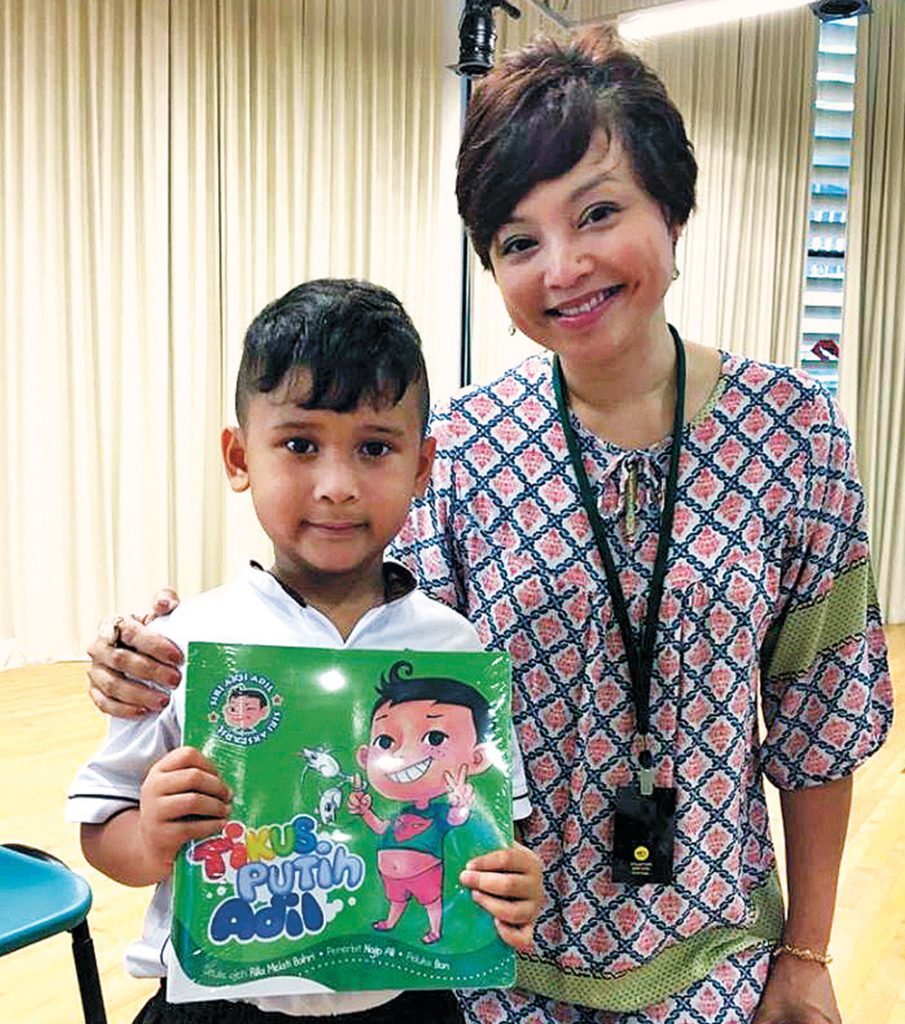
VALUABLE LESSONS
These are the things that Ms Rilla is trying to change with Mini Monsters, an educational venture that is charting new learning strategies to help young ones — and the young at heart — learn and relearn the Malay language. It does this through a popular enrichment programme for schools, where Ms Rilla and her team enliven the learning of the language through music and movement, drama and locally-authored storybooks. “These are things I learnt as a member of the inaugural batch of NUS Theatre Studies, and they are very powerful tools,” she explains, adding that they can be used across all age groups and proficiency levels.
It’s something she knows very well herself — as a child, she was a cast member of the popular Aksi Mat Yoyo television show, which ran from 1982 to 1992. Recalling those days of early fame, she says, “My weekends were spent on the show. I remember going to Caldecott Hill before the sun rose and then leaving only after it had set.” Still, the hard work was worth it as she was able to learn from the greats of Malay entertainment at the time, including Nona Asiah, a Cultural Medallion winner and mother of the late Iskandar Ismail, himself a Cultural Medallion winner. “It was the perfect blend of entertainment and education.”
That’s precisely what Ms Rilla hopes to do with Mini Monsters. Starting the venture was also a way of instilling in her son, now 20, the same appreciation for and comfort with the Malay language that she enjoys. “Some of the learning materials he had in school were very foreign to him because they were imported from the region. The main characters in the stories had errands like feeding the chicken or goat — which would not make much sense to a student in Singapore! So when children can’t relate, they tend to tune out.”
SUCCESS WITH ADIL
Realising that there was a dearth of localised Malay content, Ms Rilla decided to take the plunge and make Mini Monsters a publisher as well. After this, she began writing a series of books in the Malay language, known as the Siri Aksi Adil (Adventures of Adil) collection. Loosely based on her son, the series follows the adventures of Adil, an inquisitive five-year-old Singaporean Malay boy, along with his friends and family. It also teaches the values of tolerance and acceptance, by suggesting that Adil lives in a single-parent household — and is no less loved because of it. It’s a theme that draws on Ms Rilla’s own experience as a single parent. “I want kids who may be in such situations to know that it’s okay.”
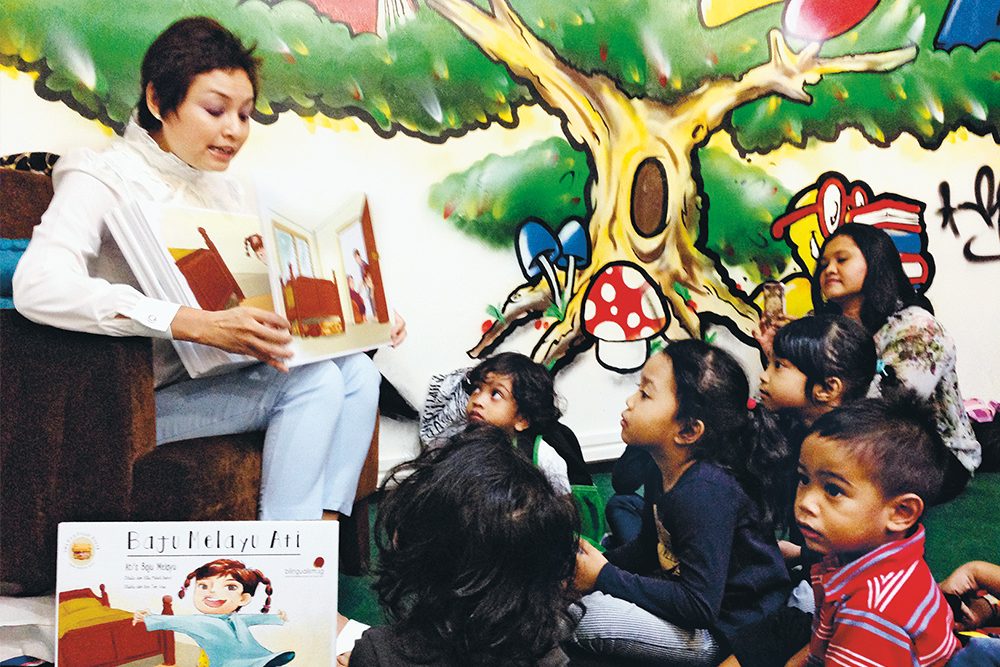


Alongside this, Ms Rilla never loses sight of her goal of fostering a greater appreciation for the Malay language. Each title in the Adil series ends with a bilingual Malay-English glossary. In her words, she wants this to be “an entry point for children who might be distant from their mother tongue to appreciate and understand the Malay language better”. And the series has been recognised for doing just that: in 2018, Payung Datuk Adil (Adil’s Grandfather’s Umbrella) won the National Arts Council’s Anugerah Persuratan (Malay Literary Award) for Children’s Literature. She credits her parents for the win, especially her father, who was a Malay language teacher for more than 40 years. “He was my editor and helped me go through draft after draft, making it better each time.”
The success of Mini Monsters is apparent from its rapid growth, both in terms of size and services. More than a decade ago, Mini Monsters started out as a two-person, two-table set-up for an educational outreach arm of a television production company. Today, it has expanded to include a junior academy – Mini Uni; as well as MonstarsTV — a bilingual children’s digital portal. Mini Monsters has also grown from being a provider of Malay enrichment programmes to schools, to a leading bilingual Malay-English edutainment institution recognised for producing high-quality educational materials with the perfect mix of cross-media engagement for its young audience. To Ms Rilla, this expansion was a way of ensuring the longevity of her vision. “If we were too small, we wouldn’t be able to go where we want to go and keep doing it for years to come. That’s why the expansion was important.”
Text by Koh Yuen Lin. This story first appeared in The AlumNUS (Issue 127, Oct-Dec 2021).
Deal with issues without gender, liberal labels
(Article is in Malay Language)
28 October 2021, Berita Harian Singapore
Bahasa & BudayaTangani isu tanpa label jantina, liberal
NUR FATHIN AWALLUDIN
MELABELKAN perbincangan mengenai jantina yang kritikal terhadap sesetengah amalan Islam sebagai idea 'feminis Barat' atau pandangan 'Muslim liberal' tidak akan membantu mengenal pasti dan mengesahkan isu-isu sebenar yang dihadapi wanita Islam.
Pada masa yang sama, melontarkan istilah-istilah seperti 'kelelakian toksik' dan 'patriarki' tanpa memahami isu berkaitan masalah menguruskan perubahan dalam masyarakat tidak akan menyumbang kepada penghapusan masalah tersebut.
Demikian menurut Sarjana Pengajian Melayu, Profesor Madya Noor Aisha Abdul Rahman dalam ceramahnya bertajuk Renungan Masyarakat Muslim Singapura: Kemajuan dan Hambatan Kebudayaan yang disampaikannya awal bulan ini di Wisma Geylang Serai.
Ceramah tersebut adalah yang terakhir dalam Siri Cendekiawan Lestari anjuran Yayasan Warisan Melayu.
Ketinggalan budaya atau 'cultural lag', menurut beliau, mempengaruhi pelbagai bahagian budaya masyarakat, dan ini merupakan masalah kompleks yang menentukan rentak dan sifat penyesuaian perbahasan retorik.
"Pelabelan tidak akan membantu kita memahami dan membangunkan perspektif yang relevan dan berguna untuk menangani masalah berkaitan wanita," ujar beliau yang juga pensyarah di Jabatan Pengajian Melayu, Universiti Nasional Singapura (NUS).
"Keadilan jantina mesti bermula dengan penerimaan perlakuan saksama terhadap wanita, dan sebarang perlakuan berbeza bagi wanita mesti beralasan dan wajar dengan mempertimbangkan cabaran, keperluan dan keadaan khusus yang dihadapi oleh wanita dalam masyarakat itu," tambahnya.
Isu kesenjangan jantina merupakan satu daripada tiga isu utama yang dibincangkan Profesor Madya Noor Aisha dalam ceramahnya itu.
Memberi contoh, beliau berkata bilangan wanita yang memegang peranan kepimpinan dalam pertubuhan-pertubuhan setempat termasuk dalam pertubuhan agama masih kurang.
"Wanita kurang diwakili dalam peranan kepimpinan dan kedudukan dalam badan-badan keagamaan kita sekalipun.
"Saya fikir para pemimpin Islam mempunyai peranan sangat penting untuk dimainkan kerana agama mempunyai potensi untuk membawa perubahan ini," ulasnya.
Profesor Madya Noor Aisha turut menyentuh isu berkaitan keagamaan dan mengetengahkan episod serangan 11 September sebagai salah satu kejadian yang telah menjejas masyarakat Islam Singapura.
"Umat Islam Singapura diminta menjelaskan agama mereka.
"Pemimpin Muslim terkemuka dan badan-badan Islam utama di Singapura diminta mengutuk serangan keganasan pada 11 September, sama seperti yang dilakukan seluruh dunia, dan secara tegas menolak sebarang tindakan tersebut yang tiada kaitan dengan Islam dan ajaran Islam," kata Profesor Madya Noor Aisha.
Namun, masalah keganasan sudah seolaholah difahami sebagai masalah budaya umat Islam dan pemahaman Islam.
Pengecapan (stigmatisation) Islam sedemikian rupa dikhuatiri boleh dimanipulasi dengan mudah sehingga menimbulkan kebencian terhadap masyarakat Melayu, yang rata-rata beragama Islam, tambah beliau.
Justeru, berikutan serangan 11 September itu, pemerintah mempelopori serangkaian inisiatif untuk meningkatkan perbincangan antara agama dan meningkatkan keharmonian antara kaum di sini.
Menyentuh sejarah Melayu pula, Profesor Madya Noor Aisha berkata sambutan dwiabad Singapura menyahkan naratif bahawa Singapura merupakan perkampungan nelayan yang longlai ketika Raffles tiba di sini.
"Pada awalnya, ramai orang, terutama masyarakat Melayu, melihatnya sebagai peluang menulis semula sejarah rasmi Singapura dengan memasukkan sejarah politik dan budaya prapenjajahan orang Melayu yang dikaitkan dengan Melaka dan kerajaan Srivijaya.
"Golongan elit Melayu melihat ini sebagai usaha penebusan sejarah orang Melayu sebagai orang asli Singapura," kata beliau.
Malah, buku Beyond Bicentennial: Perspectives on Malays telah diterbitkan untuk mendokumentasi sumbangan masyarakat Melayu kepada Singapura.
Merumuskan ceramahnya, Profesor Madya Noor Aisha berkata, setiap daripada isu yang diketengahkannya menyentuh bidang dan cabaran berbeza.
"Bagaimana golongan elit dan cerdik pandai budaya kita menangani isu-isu tersebut bukan sahaja mencerminkan perspektif mereka terhadap isu itu, malah membentuk dan menentukan budaya, pemahaman sejarah dan kepentingan dalam mengemudi cabaran perubahan serta pembangunan kontemporari kita sebagai satu masyarakat," ujar beliau.
"Pelabelan tidak akan membantu kita memahami dan membangunkan perspektif yang relevan dan berguna untuk menangani masalah berkaitan wanita."
- Profesor Madya Noor Aisha Abdul Rahman, pensyarah di Jabatan Pengajian Melayu, Universiti Nasional Singapura (NUS).
Congratulations Class of 2020 & 2021!
Congratulations to our Class of 2020 & 2021!
Another eventful year has come to pass. Another batch of graduating students marked the end of their formal school years and the beginning of an exciting future ahead. All the best in your new journey and a warm welcome to our alumni family!



We are hiring!
The Department of Malay Studies at NUS seeks to hire two tenure track assistant professors with a PhD in either the Social Sciences or the Humanities, one of whom will be on a joint appointment with the Department of Southeast Asian Studies. Candidates who have a strong track record with promising trajectory in research, publication and teaching in any one or a few of these areas are invited to apply: history, literature, globalization, politics, economy, religion, gender, population, migration, family, health, social services, digital culture, cultural politics and human-nature intersections. Candidates should have area studies knowledge of the Malay world in Southeast Asia. A comparative approach and/or inter-disciplinary expertise on the Malay world and its connections with other regions will also be considered. Hires should have a commitment towards fostering a collegial and collaborative work culture. For more information and to apply, please visit our Careers page!
Tamil Muslim publisher, Jawi Peranakan played an important role in 19th century Malay literature
(Article is in Malay Language) 7 October 2021, Berita Harian Singapore Bahasa & Budaya Penerbit Muslim Tamil, Jawi Peranakan berperanan penting dalam kesusasteraan Melayu abad ke-19 ATIYYAH MOHD SAID
PARA penerbit Muslim Tamil dan Jawi Peranakan telah memainkan peranan yang penting dalam kemakmuran industri cetakan dan kesusasteraan Melayu di Singapura pada abad ke-19.
Bersama dengan golongan penerbit buku orang Jawa, mereka membentuk bidang kewartawanan dan sastera Melayu sehingga ke abad ke-20, khususnya di kawasan Kampong Glam.
Demikian menurut para penceramah dalam Siri Seminar Antara Budaya mengenai 'Membentuk Budaya dan Minda di Awal Singapura: Muslim Tamil dan Rumah Penerbitan Melayu' yang dianjurkan oleh Taman Warisan Melayu dengan kerjasama Pusat untuk Budaya Tamil Singapura serta syarikat pendidikan dan konsultasi, Budhi, baru-baru ini.
Sesi itu bertujuan membincangkan tentang sumbangan golongan Muslim Tamil dalam dunia penterjemahan kesusasteraan dan penerbitan Melayu di kawasan Kampong Glam, yang dikenali sebagai nadi ekonomi dan hab cendekiawan Melayu.
Jawi Peranakan merupakan masyarakat yang campuran ibu bapa berbangsa Melayu dan India, dan mengamalkan budaya dan bahasa Melayu.
Muslim Tamil pula ialah masyarakat Tamil yang beragama Islam serta mengekalkan budaya dan bahasa Tamil.
Berkongsi pandangannya, pensyarah di Jabatan Pengajian Melayu, Universiti Nasional Singapura (NUS), Dr Azhar Ibrahim Alwee, berkata dunia kesusasteraan dan penerbitan Melayu pada abad ke-19 telah dibentuk oleh masyarakat dan pemain industri yang kosmopolitan.
"Bahasa Melayu sebagai lingua franca di Singapura bermakna penerbitan hasil sastera dan kewartawanan dibuka kepada mereka yang celik huruf, ada kemahiran keusahawanan dan keghairahan.
"Golongan Muslim Tamil dan Jawi Peranakan adalah penerbit buku yang utama di samping penerbit buku kaum Jawa, yang berjaya dalam perniagaan penerbitan mereka di Kampong Glam.
"Pandangan kosmopolitan dan berbagai kaum ini lama-kelamaan membentuk perkembangan kewartawanan dan kesusasteraan Melayu sehingga ke abad ke-20.
"Generasi perintis inilah yang menyediakan prasarana kepada perkembangan budaya dan sastera Melayu semasa tempoh pascapeperangan," jelas beliau.
Menyingkap sejarah dalam ceramahnya, Dr Azhar berkata umumnya pada peringkat awal, buku, akhbar dan jurnal Melayu telah diterbitkan oleh syarikat penerbitan Muslim Tamil.
Ini disusuli dengan kaum Peranakan India - atau dipanggil Jawi Peranakan - dan kemudian penerbit berketurunan Jawa.
Kemunculan penerbit Melayu dan berketurunan Arab, dan Melayu tempatan dilihat bertahap-tahap pada dekad kedua atau ketiga dalam abad ke-20.
Menurut Dr Azhar, landskap cetakan buku Melayu berkembang pesat hingga mencapai ke tahap yang begitu mengagumkan.
Menukil perangkaan oleh penulis Ian Proudfoot, beliau berkata bermula sejak 1840-an, 85 peratus buku Melayu dicetak di Singapura, khususnya kerana mahu mengelak daripada penapisan Belanda.
Pada 1890-an, jumlah itu mencapai secara purata 50,000 buku setahun.
Antara penerbitan yang menarik pada zaman itu ialah pencetakan Quran Palembang - Quran pertama yang dicetak di Asia Tenggara - pada 1848.
Menerangkan tentang peranan golongan Muslim Tamil, Dr Torsten Tschacher, dari Sekolah Siswazah Berlin bagi Budaya dan Masyarakat Muslim, berkata peranan penerbit dan editor akhbar yang mempunyai darah India dalam dunia penerbitan Melayu sudah lama dikenal pasti pakar sejarah.
Malah, sumbangan mereka diperhatikan jauh sebelum 1920-an, mungkin dalam era 1870-an dan 1880-an.
Dr Tschacher, yang kajiannya tertumpu kepada sejarah dan tradisi teks masyarakat Muslim berbahasa Tamil di Selatan India, Sri Lanka, Singapura dan Malaysia, berkata kehadiran masyarakat itu telah memanfaatkan industri cetakan Melayu.
Antara sebab ialah mereka sudah memiliki kepakaran dan kemahiran teknikal yang berguna untuk karya-karya Melayu, memandangkan industri pencetakan di India sudah berkembang maju.
Ini termasuk teknologi cetakan, kata Dr Tshcacher.
"Penerbit dan pencetak Muslim Tamil mempunyai teknologi cetakan dipanggil litografi, yang membolehkan teks tulisan tangan dan gambar dialihkan kepada cetakan... ini sebabnya antara buku terawal Melayu dicetak d Bombay, yang mempunyai pencetak Muslim yang khusus dalam buku dicetak menggunakan litografi daripada tulisan Arab.
"Jadi kemahiran teknikal pencetak ini adalah aspek paling penting dalam peringkat awal hubungan di antara pencetak India, khususnya Muslim Tamil, dengan firma penerbitan Melayu," ujarnya.
"Golongan Muslim Tamil dan Jawi Peranakan adalah penerbit buku yang utama di samping penerbit buku kaum Jawa, yang berjaya dalam perniagaan penerbitan mereka di Kampong Glam. Pandangan kosmopolitan dan berbagai kaum ini lama-kelamaan membentuk perkembangan kewartawanan dan kesusasteraan Melayu sehingga ke abad ke-20. Generasi perintis inilah yang menyediakan prasarana kepada perkembangan budaya dan sastera Melayu semasa tempoh pascapeperangan."
- Dr Azhar Ibrahim Alwee, pensyarah di Jabatan Pengajian Melayu, Universiti Nasional Singapura (NUS).
NUS Faculty of Arts and Social Sciences 18th Dean Takes Office
IN BRIEF | 2 min read
-
Dean of the Faculty of Arts and Social Sciences, Professor Lionel Wee, and other members of the Deanery take on their leadership roles today.
Professor Lionel Wee has assumed the position of Dean of the NUS Faculty of Arts and Social Sciences (FASS) and Co-Dean of the College of Humanities and Sciences (CHS) as of today, Friday, 1 October 2021. Prof Wee takes over the helm from Professor Robbie Goh, who is now the Provost of the Singapore University of Social Sciences.
Before becoming FASS' 18th Dean, Prof Wee was the Faculty’s Vice Dean of Research from 2014 till 30 September 2021 and is a Professor of Linguistics with the Department of English Language and Literature. He was also the Head of the Department of English Language and Literature from 2010 to 2014 and is a Provost's Chair Professor of Linguistics with the Department of English Language and Literature.
“It is an honour to be given the opportunity to helm the Faculty of Arts and Social Sciences. The Faculty has achieved much since its founding nearly a century ago, continually evolving to anticipate and address the needs and challenges of a changing society," said Professor Wee. "Together with the Deanery, colleagues, and students of the FASS, I am confident that we will continue to make breakthroughs in both education and research. While these benchmarks are important, diversity and inclusion are priorities for me, and essential pillars of every organisation. My plan is to further emphasise and ensure our staff and students feel empowered and safe in the Faculty in the coming years."

New Appointments to the Strong Leadership
Beginning their new roles with the FASS Deanery today are:
- Associate Professor Elaine Ho (Geography) as Vice Dean (Research). She was previously Assistant Dean (Research)
- Associate Professor Elmie Nekmat (Communications and New Media) as Assistant Dean (Research)
The following members of the Deanery will continue to serve in their respective positions:
- Associate Professor Melvin Yap, Vice Dean (Undergraduate Studies)
- Associate Professor Valerie Wee, Vice Dean (Undergraduate Studies)
- Associate Professor Bruce Lockhart, Vice Dean (Graduate Studies)
- Professor Chen Yi-Chun, Vice Dean (International Relations and Special Duties)
- Associate Professor Loy Hui Chieh, Vice Dean (External Relations and Student Life)
- Mr Mark Teng, Director of Administration
- Associate Professor Sidharthan Maunaguru, Assistant Dean (Undergraduate Studies)
- Dr Zhang Yang, Assistant Dean (Undergraduate Studies)
- Dr Jinna Tay, Assistant Dean (Undergraduate Studies) – recently appointed to the Deanery on 1 July 2021.
- Associate Professor Nicholas Hon, Assistant Dean (External Relations and Student Life)
COMMENTARY: Language Materials - Identity or Emancipation?
(Article is in Malay Language) 19 September 2021, Berita Mediacorp Singapore KOMENTAR: Bahana Bahasa - Jati Diri atau Emansipasi? DR AZHAR IBRAHIM ALWEE BERITAmediacorp: Bahana bahasa, yakni gemaan, bunyi atau gendangan sesuatu bahasa yang sering kita dengar dan terlazim, berlegar di sekitar persoalan jati diri atau identiti. Ertinya bahasa dan jati diri sering digandingkan. Sehinggakan kita cepat dan bersedia memalitkan bahasa sebagai salah satu teras jati diri kita, selain tradisi agama dan adat resam yang terlazim dipakai dalam diri seseorang atau masyarakat. Pasti persegandingan itu ada kewajarannya tetapi terpanggil pula untuk diperjelaskan mengapa semakin kuat bahana bahasa dan jati diri. MELESTARIKAN BAHASA, MELESTARIKAN BUDAYA Dalam konteks masyarakat majmuk, identiti kelompok (sering kali etnik, agama dan bahasa) menjadi simbol yang membeda dan mengkhaskan antara satu sama yang lain. Maka lahirlah ungkapan, melestarikan bahasa juga bererti melestarikan budaya bangsa. Sisi memelihara, mewarisi, menyambung terus dari generasi sebelumnya dianggap sebagai upaya murni, penting dan mesti diteruskan. Lantas dalam lembaran pendidikan, wacana kebudayaan di ranah awam dan kefahaman umum sering mengaitkan penguasaan bahasa sebagai penguatan budaya. Ini juga munasabah betapa kita tahu peranan dan sifat bahasa tidak harus terbatas kepada perihal jati diri. Sehinggakan jarang pula kita terdengar soal bahasa dikaitkan dengan emansipasi yakni bersangkutan dengan kesadaran untuk membangun bahasa dan kesadaran yang membebas, tidak terkongkong dan dibelenggu, ataupun setidaknya bahasa itu terkaya dengan asas intelektual yang kukuh. Sebaliknya, dalam sejarah, malah boleh kita perhatikan bagaimana komponen jati diri dan emansipasi terangkum sama dalam gerakan nasionalisme melawan kolonial. Namun di era stabil pasca kemerdekaan, dengan politik identiti semakin gemencar, maka sisi emansipatif tidak kuat bahananya lagi. Yang tampil sering ialah bahasa dan identiti kebudayaan. Sebagaimana dikatakan tadi, ini tentunya tidak menjadi masalah dan harus disambuti. Namun akan menjadi masalah apabila kefahaman bahasa dan identiti disempitkan dengan kecenderungan politik yang semakin kekananan sehingga bergema “segalanya dari kelompok kita, unggul, anggun dan haknya kita saja.” Dengan sentimen politik berlegar dengan tanggapan “Kita” lawan Yang Lain” maka simbol identiti menjadi tarikan utama. Bahasa yang mulanya menjadi alat pemersatu, menjadi alat untuk membedakan diri kita dari kelompok lain, khasnya yang bukan dari kelompok etnik dan agama kita. Syukur di tempat kita, tidak pula kita tersendat dengan faham jati diri seperti itu. JATI DIRI YANG DICITRAKAN Pentingnya kita merungkai persoalan keghairahan dan kepedulian tentang jati diri menjadi kian eksklusif dan taasub. Persaingan ideologi semasa akhirnya membuat takrif kepada jati diri semakin sempit, malah galak eksklusivismenya. Maka terpanggil kita untuk merungkai permasalahan ini, dengan mencari sebab musabab mengapa penyempitan ini berlaku dan apakah pula kesan kepada kehidupan bermasyarakat, selain menyarankan bagaimana dapat kita keluar dari sesakan dan gasakan idea dan pemikiran yang regresif ini. Wacana jati diri terbentuk di saat kita sedang berghairah mencari keautentikan budaya, di era kesadaran etnik dan keagamaan sangat memuncak, di saat era pasca kemerdekaan di mana kita tampil untuk mentakrif negara-bangsa yang sedang dicipta. Perhatikan dekad-dekad terdahulu. Rata-rata masyarakat waktu itu tidak menyebut, atau terlalu ghairah dengan persoalan jati diri. Persoalan maruah bangsa dan cekal bangun membina kemajuan bangsa dan negara diberikan keutamaan. Jati diri pun sebagai istilah belum terpakai meluas dan kalaupun ada, pastinya ia tidak merujuk kepada pengertian etnik/bangsa. Malah kekata bangsa itu sendiri sering juga dimaksudkan sebagai kualitas manusia (contohya dalam ungkapan, “Dia orang berbangsa”) yang memerikan kedudukan seseorang itu dari sisi budi pekerti, akhlak dan peribadi yang tangguh. Lain perkataan, mengidentifikasi diri seseorang bukan pada jati diri etniknya semata, tetapi mutu keperibadian pada seseorang itu. Menariknya dalam kalangan cendekiawan Melayu, hal bahasa menjangkau lebih daripada soal jati diri semata. Yang dikaitkan dengan bahasa adalah seperti “memajukan bahasa Melayu sebagai bahasa perantara ilmu” dan bahasa itu sebagai wadah pemersatu. BAHASA PEMACU KEMAJUAN DAN PEMBANGUNAN Cinta bahasa yang terlafaz oleh mereka bukan cinta hanya setakat untuk melestari budaya bangsa tetapi yang lebih penting iltizam membangun bahasa agar ia menjadi pemacu kemajuan dan pembangunan. Di saat kita akur akan cita melihat bahasa kita maju berkembang, maka tawaran dari ikhtiar mengemansipasi bahasa sayugia diberikan perhatian. Bahasa yang emansipatif itu memiliki ciri-ciri berikut:
- Bebas dan tidak terbelenggu oleh pola pemikiran atau gagasan tertentu. Contohnya dari cengkaman pemikiran kolonial atau minda tertawan;
- Bebas dari cengkaman hegemonik dari pemikiran patriakis, feudalis dan keagamaan yang eksklusif;
- Bebas dari populis kanan yang memancing sentimen cauvinis dan rasis -yakni bebas dari melihat bahawa hanya kita saja yang empunya kebenaran, kita yang paling bersih, kitalah yang paling berhak segalanya;
- Terbangun dari pemikiran yang humanis, demokratik dan inklusif;
- Merangkul kemajmukan sehingga bahasa itu benar-benar dapat terpakai dan dirasakan milik semua;
- Terkaya dengan konsep kritis dan transformatif sehingga ruang idea dan pemikiran menjadi anjal untuk menjana konsep-konsep penting;
- Pola atau orientasi pemikiran yang bersedia menyerap idea dan gagasan baru sehingga ranah bahasa terbangun sama dan kemudian pula menjadi wadah untuk menggerakkan pemikiran kritis, kreatif dan inovatif.
- Sikap tradisionalisme bahasa yang berkeras tidak mahu menerima arus perubahan yang perlu;
- wujudnya kependetaan bahasa yang tinggi di menara tetapi tidak tumbuh secara organik dalam masyarakat dan hanya menetapkan hukum bahasa itu dan ini, tanpa mempertimbangkan keperluan dan kondisi semasa;
- bahasa sekolahan yang formal yang teratur dan bernahu baik tetapi tidak bisa berfungsi untuk mengungkapkan pengunaaan bahasa yang cerdas di luar bilik darjah;
- sikap pengguna bahasa yang semakin kerdil dan berandaian bahasa kita sendiri tidak perlu atau tidak akan dapat bersaing dengan bahasa dunia yang lain sehingga sikap ini akhirnya berhujung dengan kegagalan menghargai bahasa sendiri dan sanggup meninggalkannya.
Eurocentrism in the study of the Malay world
IN BRIEF | 4 min read
-
Read this latest piece by Professor Syed Farid Alatas, from the Department of Sociology at the Faculty of Arts and Social Sciences, NUS College of Humanities and Sciences in Berita Harian.
Click through image below to read this article.

This story first appeared on Berita Harian on 23 August 2021.
New NUS Dean of Arts and Social Sciences Appointed
IN BRIEF | 5 min read
-
Professor Lionel Wee will be appointed the new dean of the NUS Faculty of Arts and Social Sciences (FASS) and co-dean of the College of Humanities and Sciences from 1 October 2021.
-
Prof Goh, who has served as the Dean since 2017, will be taking a leave of absence from the University, but will continue to contribute in the Singapore education sector as the new Provost at the Singapore University of Social Sciences from 1 October 2021.
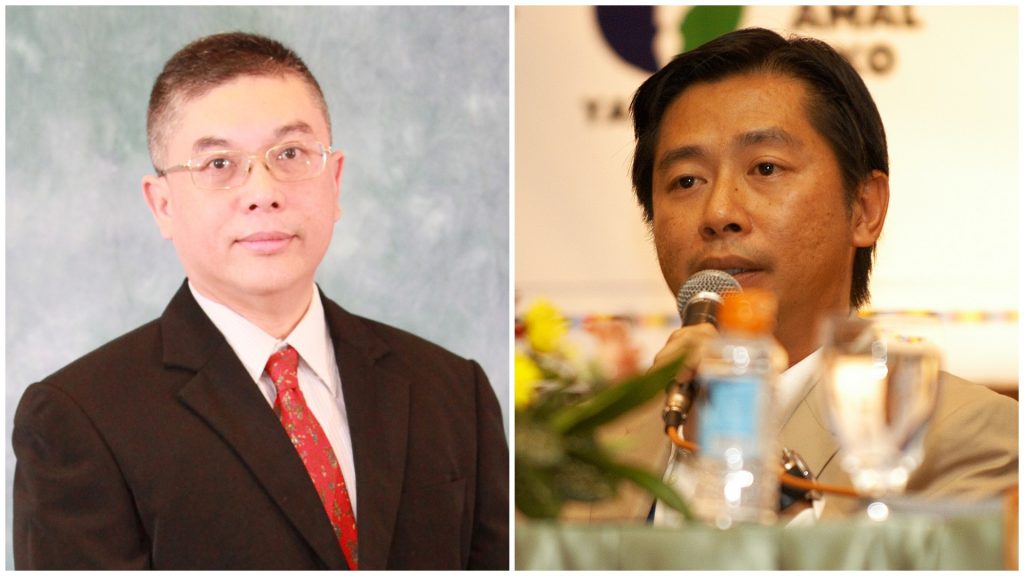
The University today announced the appointment of Professor Lionel Wee as the new Dean of its Faculty of Arts and Social Sciences (FASS) and Co-Dean of the College of Humanities and Sciences. Prof Wee will take over the helm from Prof Robbie Goh as the Faculty’s 18th Dean from 1 October 2021.
Currently FASS Vice Dean of Research and Professor of Linguistics in the Department of English Language and Literature, Prof Wee was appointed Provost’s Chair Professor in July 2017 for his outstanding scholarly achievements.
After graduating from NUS in 1988 with a Bachelor of Arts (First Class Honours) degree majoring in English Language and Sociology, Prof Wee embarked on an academic career, joining the University as a Teaching Assistant with the Department of English Language and Literature. He was awarded the NUS Overseas Graduate Scholarship where he pursued his PhD in Linguistics at the University of California, Berkeley. Prof Wee was appointed as a Lecturer upon his return to Singapore in 1995, and rose the ranks to full Professorship in 2012.
“NUS is pleased that after a rigorous global search, Prof Lionel Wee has been selected to be the next Dean. He is passionate about high quality education and research, and has an excellent understanding of FASS and the University, having served in numerous leadership roles at the department, faculty and university-levels. I am confident that he will bring the Faculty to new heights of international excellence,” said NUS President Professor Tan Eng Chye.
Besides serving as Vice Dean of Research at FASS from 2014 to present, Prof Wee was also the Head of the Department of English Language and Literature from 2010 to 2014. He had also contributed on various committees such as Chair of the FASS Faculty Promotion & Tenure Committee II, Chair of the University Mid-Term Advisory Report Committee, and Member of the University Promotion and Tenure Committee. In recognition of his dedicated service and contributions to NUS and education in Singapore, Prof Wee was awarded the National Day Awards Public Administration Medal (Bronze) in 2020 and the Long Service Medal in 2018.
“I am excited and honoured to be given this opportunity to lead my alma mater as its next Dean. Having spent more than three decades at FASS, both as a student and a faculty member, I have experienced firsthand the selfless commitment of my colleagues and impressive insights our students bring to the study of the arts, humanities and social sciences. I am confident that together, we can continue to make significant contributions to society while enhancing our Faculty’s standing as one of the leading humanities and social sciences faculties in the world,” said Prof Wee.
Besides his passion in linguistics, Prof Wee feels very strongly about animal welfare and is also very much an avid city traveller, although the pandemic has put quite a damper on travel in the past year or so. He also enjoys the cafes, a habit which he picked up during his time as a graduate student in Berkeley. Students and colleagues at FASS may have many a times seen Prof Wee deep in thought at the cafes across the NUS campus. He is very much focused in developing a particular idea or argument once he is seated down and would need to walk around before he can move on to another new idea.
Prof Wee has published widely in international and local journals, and also sits on the editorial boards of a number of academic journals and publications, including Applied Linguistics, English World-Wide, Multilingual Margins, The Journal of Asian Linguistic Anthropology, the “Cambridge Elements: World Englishes” book series, and the “Multilingualisms and Diversities in Education” book series. He is a well-respected scholar with research interests in the areas of language policy (especially in Southeast Asia), the grammar of Singapore English, metaphorical discourse, and general issues in sociolinguistics and pragmatics.
Prof Goh, who has served as the Dean since 2017, will be taking a leave of absence from the University. However, he will continue to contribute in the Singapore education sector as the new Provost at the Singapore University of Social Sciences from 1 October 2021.
Prof Goh said, “It has been a privilege and honour to serve as Dean of one of Singapore’s largest and most historied Faculties. I am grateful to my talented colleagues for all their hard work. I believe that together, we have brought the Faculty to new heights of excellence in teaching, research and service. I look forward to the work of creating new programmes and nurturing talent in my next role as Provost of the Singapore University of Social Sciences, and hope that I will also be able to forge new ties and collaborations between the two universities."
Having spent more than three decades at the University, Prof Goh has taken on numerous administrative and leadership roles outside of the Faculty. He was Deputy Director of the NUS Centre For the Arts from 1996 to 1999, and Deputy Director of the Asia Research Institute from 2008 to 2010.
“On behalf of the University, I would like to express my heartfelt appreciation to Professor Robbie Goh for his dedication and strong stewardship in leading NUS FASS. Under his visionary leadership, the Faculty has made significant contributions to the advancement of education and research in the humanities and social sciences. During his leadership, the FASS 2.0 Industry Tracks programme was started to enhance the employability of its graduates. New multidisciplinary initiatives such as the Philosophy, Politics & Economics programme were also established. The Faculty has also expanded collaborations with industry and further strengthened its high international reputation,” added Prof Tan.
This story first appeared on NUSnews on 13 August 2021. The full press release is here, and Professor Lionel Wee's biography is here.
FASS Community Recognised at the 2021 National Day Awards Ceremony
IN BRIEF | 2 min read
-
Eleven members of the FASS community have received awards, including the Public Administration Bronze, Commendation and Long Service Medals from the Prime Minister's Office.
-
Mr Mark Teng (Director Administration, Dean's Office) was conferred the Public Administration Bronze Medal and Dr Azhar Ibrahim (Malay Studies) received the Commendation Medal.
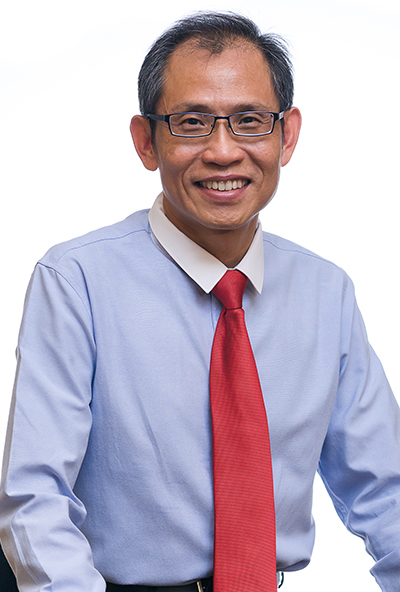
 Commendation Medal
Commendation Medal
Dr Azhar Ibrahim, Lecturer with the Department of Malay Studies, received the Commendation Medal. Dr Ibrahim earned his BA (Hons) in Southeast Asian Studies in 1997, and BA (Merit), MA and PhD from the Department of Malay Studies in 1997, 2001 and 2008. Just before returning to teach at his alma mater in 2009, Dr Ibrahim was Lecturer at the Asian Languages and Cultures (Malay Division) of the National Institute of Education, Nanyang Technological University for seven years. The author of numerous books, articles and papers in academic journals as well as mainstream media, Dr Ibrahim is also a notable speaker and active convenor and participant of academic conferences, FASS and community events. He teaches and supervises both undergraduate and postgraduate studies at the Department of Malay Studies, and his main research interests are in the areas of: religion and society, deviance and social control, and sensory studies. Long Service Medal
FASS awardees of the Long Service Medal include:
- Associate Professor Daniel Goh Pei Siong, Department of Sociology and NUS Associate Provost (Undergraduate Education)
- Associate Professor Su Jui-Lung, Department of Chinese Studies
- Associate Professor Wong Sin Kiong, Department of Chinese Studies
- Associate Professor Wong Wei Kang, Department of Economics
- Professor Henry Yeung Wai Chung, Department of Geography
- Mdm Angeline Ang Poh Kim, Associate Director, Department of English Language & Literature
- Ms Chee Lee Kuen, Management Assistant Officer, Department of Economics
- Mdm Amelia Yuen Fong Pheng, Management Assistant Officer, Dean's Office
- Mdm Salinah Binte Zuber, Management Assistant Officer, Department of Economics
The full list of NUS Recipients of National Day Awards 2021 is available here.
COMMENTARY: National Day Celebration - national sacred and citizen sovereignty
(Article is in Malay Language) 8 August 2021, Berita Mediacorp Singapore KOMENTAR: Sambutan Hari Kebangsaan - keramat kebangsaan dan kedaulatan warga DR AZHAR IBRAHIM ALWEE BERITAmediacorp: Setiap negara yang merdeka pasti ada sambutan Hari Kemerdekaan, kadang disebut Hari Kebangsaan ataupun Hari Peringatan kenegaraan yang dikaitkan dengan raja yang memerintah. Di republik ini, Hari Kebangsaan disambut pada tanggal 9 Ogos setiap tahun. Inilah hari keramat dan banyak masa, tenaga dan sumber diperuntukkan bagi sambutannya. Boleh dikatakan setiap negara mempunyai ritus kenegaraan ini. Singapura adalah salah satu negara di mana hari kebangsaannya sangat-sangat dinantikan, malah diikuti oleh pengagum negara luar yang terpegun dengan sambutan bertema tahunan Hari Kebangsaan kita yang spektakular, teriring dengan lagu tema dan pertunjukan yang sangat bertenaga, cekap dan kreatif. Kita turut bangga, malahan sering kali siang-siang hari kita menampah tiket untuk menyaksikan sambutan Hari Kebangsaan, yang sememangnya menggembeling pelbagai kepakaran dari pasukan berseragam di republik ini. Satu yang menarik tentang hari kebangsaan kita, ia benar-benar direncana dan diselaras sepenuhnya oleh negara. Di satu sisi, ia memperlihat negara dan masyarakat yang etos perancangan sangat tangguh. Namun kalau kita jengok di beberapa negara lain, hari kebangsaan atau kemerdekaan mereka, khasnya yang tersambut dalam kalangan rakyatnya lebih bersahaja, alami dan membumi. Ia bukan temasya negara semata-mata, tetapi temasya warga. Inisiatif dari bawah untuk menyambut hari kebangsaan diadakan dengan pesta lumba itu dan ini, terkumpul anak-anak desa, dengan pelbagai permainan, hiburan dan keupacaraan. PUPUK SEMANGAT CINTA TANAH AIR Hari Kebangsaan seperti itu terlihat sisi patriotisme yang berakar dan menumbuh. Dari rakyat terbanyak, cinta kepada tanah air, bangsa dan masyarakat datang dari sikap sayang kepada tanah tumpah darah, persaudaraan sebangsa dan senegara, keterikatan kepada daerah masing-masing yang bertali-temali dengan kuasa pusat yang memerintah negara. Menyebut tentang patriotisme, ada baiknya ia dikaitkan dengan sejenis pengabdian kepada kebajikan dan kesejahteraan terhadap sesebuah negara. Dalam negara moden sekarang, patriotisme ini adalah semangat dan dedikasi warga kepada negara tanah tumpah darahnya, bersedia memberikan yang terbaik atau berbakti demi kepada negara dan warga sesama. Dalam konteks kita di Singapura, kebajikan negara dan warga itu tercita dan terjamin dalam lafaz Ikrar Negara, yang setiap satu dari kita dibesarkan dengan mengucapkan ikrar ini semenjak di bangku sekolah lagi: “Kami, warga negara Singapura, sebagai rakyat yang bersatu padu, tidak kira bangsa, bahasa, atau agama, berikrar untuk membina suatu masyarakat yang demokratik, berdasarkan kepada keadilan dan persamaan untuk mencapai kebahagiaan, kemakmuran dan kemajuan bagi negara kami.” Terkandung dalam cita kebajikan itu untuk menjamin negara yang demokratik, dengan keadilan dan kesetaraan menyatukan setiap satu warga. Sebenarnya ini adalah sebuah lafaz patriotisme. Maksudnya patriotisme ini bukan sekadar simbol, atau terikat dengan kesetiaan mutlak kepada negara (atau pemerintah yang berkuasa) tetapi adalah pengakuran kepada nilai-nilai luhur yang boleh menjadikan kita sebuah bangsa dan negara yang adil, demokratik dan sejahtera untuk setiap satu warga dan penduduknya. PELUANG RAKYAT HAYATI ERTI SEBENAR HARI KEBANGSAAN Hari Kebangsaan sesungguhnya harus membawa kita merenung setiap tahun akan keberadaan kita dalam landasan patriotisme yang dihubungkaitkan dengan dasar kebajikan yang harus terjaminkan untuk semua. Sekadar menyambut dengan kemeriahan pelbagai kegiatan, Hari Kebangsaan itu akan menjadi sekadar temasya suka-ria, tanpa pengisian yang reflektif dan substantif. Tidak keterlaluan untuk dikatakan masyarakat yang berdaulat, bermartabat, dan beradab akan menumbuhkan sikap patriotisme yang teguh dengan nilai dan amalan derma bakti, pertanggungjawaban, cinta-kasih dan lain-lain segi budi manusiawi untuk masyarakat dan tanah airnya. Namun di banyak tempat, patriotisme telah dibelokkan maknanya. Patriotisme diseiraskan dengan sikap nasionalisme mundur, dijana oleh penguasa yang bermain sentimen etnik, agama, suku, bahasa dan daerah demi mengekalkan kuasa. Di sinilah banyak negara yang baru merdeka terjunam dengan konflik pemisahan. Bukan patriotisme yang menjamin kebajikan bersama yang dibangunkan, tetapi nasionalisme kepuakan yang akhirnya menjadi penyebab runtuh perpaduan nasional di kalangan rakyat. Begitulah juga yang telah diingatkan oleh Frantz Fanon, seorang pemikir dunia ketiga yang terbilang. Tegas beliau, nasionalisme harus bangun beralih daripada kesadaran nasional kepada ranah kesadaran sosial dan politik. Sekiranya ini tidak berlaku ia akan menggagalkan pembangunan politik dan sosial yang sebenarnya. “If you really wish your country to avoid regression, or at best halts and uncertainties, a rapid step must be taken from national consciousness to political and social consciousness.” The Wretched of the Earth (1963) JANGAN PUTAR BELIT MAKNA PATRIOTISME Hari ini kita telah saksikan betapa banyak negara tersembam ke lembah nasionalisme dangkal dan narsistik, bermain dengan api perkauman dan keagamaan. Makna patriotisme diputar-belitkan sehingga ia ditakrifkan sebagai kesetiaan dan kebaktian mutlak kepada sang penguasa, bersekongkol dengan pemerintah yang sering kali jadong (jahat-bodoh-pembohong dalam istilah S H Alatas). Penulis Afrika yang terkenal, Chinua Achebe, pernah melihat kecenderungan ini yang melarat di belahan benuanya. “There will always be some people whose personal, selfish interests are, in the short term at least, well served by the mismanagement and social iniquities. Naturally they will be extremely loud in their adulation of the country and its system and will be anxious to pass themselves off as patriots and to vilify those who disagree with them as trouble-makers or even traitors. But doomed is the nation which permits such people to define patriotism for it.” The Trouble With Nigeria. (1983) Syukur negara dan masyarakat kita tidak terjerat dengan budaya politik yang durjana seperti itu. Namun kita harus akur bahawa kita tidak sampai ke jeratan itu kerana adanya disiplin nasional yang telah terbina awal, integriti kepimpinan yang menolak rasuah dan salah guna kuasa. 'HARI KESYUKURAN' TERHADAP KESEJAHTERAAN & KEMAKMURAN NEGARA Hari Kebangsaan sebagai hari kesyukuran oleh kerana wujudnya keamaman, kesejahteraan dan kestabilan, jelas mengundang refleksi kritis akan keadaan kita. Sambutan riang gembira pastilah wajar, tetapi ruang untuk bermuhasabah juga harus terbudaya, dengan keberanian mengapung persoalan-persoalan seperti makna hidup bermasyarakat, tanggungjawab dan hak, bakti warga dan khidmat sosial, keluhuran demokrasi dan perlindungan perlembagaan, dasar negara dengan pertimbangan moral, hubungan pemimpin dengan rakyat, penagihan adil dengan kemajuan ekonomi yang cergas, kepelbagaian kelompok dan keutuhan individu dan banyak lagi. Refleksi yang ampuh inilah yang wajar disebut keramat kebangsaan dalam pengertian perluasaan kesadaran sosial politik, sebagaimana yang diserukan Fanon. Sekiranya ini dikaitkan dengan patriotisme, ia adalah cita dan amal untuk menegakkan kebajikan dan kesejahteraan kepada masyarakat dan negara. Kedaulatan negara bisa terjamin dengan panji kuasa, dan perundangan. Namun tiada negara akan utuh sejahtera sekiranya kedaulatan warganya tidak tumbuh dan terjamin sama. Dan kedaulatan itu berkait rapat dengan setiap warga mengidentifikasikan peranan masing-masing untuk kehidupan bermasyarakat dan bernegara dengan cemerlang dan sempurna. Dengan Hari Kebangsaan yang akan menjelang nanti, moga berdenting di benak fikiran dan perasaan kita untuk merenung sama akan makna patriotisme. Mungkin ujaran Achebe tentang siapakah sang patriot itu berguna diperhatikan: “Who is a patriot? He is a person who loves his country. He is not a person who says he loves his country. He is not even a person who shouts or swears or sings his love of his country. He is one who cares deeply about the happiness and well-being of his country and all its people. Patriotism is an emotion of love directed by a critical intelligence. A true patriot will always demand the highest standards of his country and accept nothing but the best for and from people. He will be outspoken in condemnation of their short-comings without giving way to superiority, despair or cynicism.” The Trouble With Nigeria. (1983) Sesungguhnya keramat kebangsaan ini sangat tersulam utuh dengan makna kedaulatan warga. Cita patriotisme dari warga adalah antara asas terpenting agar keduanya itu terus hadir dan berlangsung. Hari Kebangsaan di tempat mana pun tidak bisa terlepas dari pemaknaan seperti ini. Betapa lagi dengan tema sambutan kita tahun ini “Together, Our Singapore Spirit” atau “Bersama, Dengan Semangat Singapura” – terpanggil seruan itu yang berinti ranumnya makna kebangsaan yang merangkul kebersamaan warga dan patriotisme yang mencerah. Itu adalah lafaz cita sekali gus pertanggungjawaban. Dirgahayu Singapura dengan Kebangsaan Warga Menyatu! MENGENAI PENULIS: Dr Azhar Ibrahim Alwee ialah Pensyarah Pengajian Melayu di Universiti Nasional Singapura (NUS). Selain kesusasteraan klasik dan moden Melayu, fokus penyelidikan beliau adalah wacana penulisan kritikal dan pembangunan intelektual Melayu-Indonesia.
From Careers for a Lifetime, to a Lifetime of Careers
IN BRIEF | 5 min read
-
The top skills desired by employers will include critical thinking, analysis, problem-solving and self-management skills such as active learning, resilience, stress tolerance and flexibility.
What does the future of work look like? In this evolving world, new occupations and roles which did not previously exist continue to emerge, while certain traditional skills and jobs continue to become obsolete.
The World Economic Forum’s (WEF) The Future of Jobs Report 2020 (October 2020) highlighted a few key trends.
First, technological adoption of cloud computing, Big Data and e-commerce in many businesses will accelerate the transformation of jobs, skills and entire industry value chains. 85 million jobs are expected to be displaced by a shift in division of labour from humans to machines by 2025, while 97 million new roles may emerge.
Second, online learning and training boomed during the pandemic. The shift was a watershed moment, and there is no turning back for many industries. The pandemic also brought into sharper focus the importance of lifelong learning, with more employees upskilling and reskilling to stay relevant in the volatile job market. More workers are now pursuing personal and professional development, especially in digital skills.
Last but not least, the top skills desired by employers will include critical thinking, analysis, problem-solving and self-management skills such as active learning, resilience, stress tolerance and flexibility.

What skills do employers seek?
Many of these in-demand skills highlighted in WEF’s report corroborate CFG’s Industry Insights Survey (2020). Drawing on insights from career events, industry surveys and engagements, CFG’s survey cited a similar list of soft skills that are becoming increasingly imperative at the workplace.
These are abilities learnt through life experiences that are impervious to change, and relevant across all professions and workplaces. They are attributes we take with us when we embark on job pathways in the New Normal - which are shifting from one defined career over a lifetime, to a series of dynamic and rapidly changing careers.
Our survey clusters these abilities into two main categories: Personal Qualities and Workplace Traits.
Personal qualities
Many employers are looking for individual cognitive abilities such as problem-solving, learning agility and pattern-recognition. They are also seeking graduates who are equipped with design and computational thinking, as well as proficiency in quantitative analysis.
They want graduates who are able to look at problems from different perspectives, to solve complex problems in real-world environments. For example, can a customer service issue be resolved with a combination of user interface design changes, IT infrastructure automation and manpower staffing? What are consumer consumption patterns and behaviours telling us?
Employers also seek character traits such as curiosity, resilience, empathy, proactivity, leadership and adaptability. These traits are predictors of future potential, and potentially determine career longevity and progression. For example, are you curious to learn what other teams or functions are doing beyond your job scope and discover potential synergies? Are you adaptable to changes in your project scope, and possess a “can-do” attitude in the face of obstacles?
Workplace traits
Besides personal qualities, employers are also looking for graduates who possess certain desirable workplace traits. These include good communication and presentation skills, cultural sensitivity and a global mindset. Graduates with business acumen, who are able to influence and negotiate, and are competent in managing different teams and projects, are much sought after.
These attributes mirror the realities of the modern workplace, where teams and projects are becoming more diverse, cross-functional, cross-cultural and business-driven. For example, can you work with a diverse team of colleagues towards achieving a common objective? Can you visualise your organisation’s business potential in an overseas market or a new customer segment?
The call to CHS students
In CHS, you will acquire interdisciplinary knowledge and skills by learning how to draw connections, links and insights across diverse disciplines. It is this important foundation of interdisciplinarity that will better prepare our students to become problem-solvers in an uncertain world beyond the pandemic.
Even as the pandemic has accelerated digital transformation, data is now the new asset that enables businesses to enhance efficiency and augment the ability of their teams to deliver greater value. CHS will focus on competencies like data literacy and design thinking, skills that are now in high demand by industries seeking to unlock value from Big Data.
Beyond academics, internships are one of the best ways to hone workplace experience. When you are on vacation, aim for at least two (if not more) internships, preferably one with an overseas employer. Immerse yourself in co-curricular activities, which provide hands-on opportunities to gain skills such as leadership, teamwork and project management. These experiences in your resume and portfolio will place you in a better stead with employers.

Enhancing employability, preparing for careers
CHS students will have a dedicated Career Advisor, who will guide you through the process of developing a personal career plan. You will be pre-assigned a career preparation module, Career Compass, closely following CFG’s four-year Career Readiness Roadmap which provides a formal framework for your career planning during your undergraduate journey.
You will be enrolled in Career Catalyst, a foundational freshmen module that identifies your core strengths and enhances your profile towards securing an internship. As you progress to Years Two/Three and your final year, you can also sign up for our Career Booster workshops or Career Advancement Webinar Series (CAWS).
Article contributed by the Centre for Future-ready Graduates (Ms Joan Tay, Director and Career Advisors Mr Ryan Ang and Mr Ng Buck Seng)
This story first appeared on CHS on 29 July 2021.
NUS CHS Case Competition: Driving EV Adoption in Singapore
IN BRIEF | 1 min read
- The just-released problem statement for NUS CHS' inaugural Case Competition – Encouraging electric vehicle (EV) ownership in Singapore – is an important real-world topic of especial relevance to us all, as the nation is driving toward a future of electric mobility that is essential to the Singapore Green Plan 2030.

Are you interested in translating your innovations to reality by applying interdisciplinary knowledge and skills?This is now possible with the inaugural College of Humanities and Sciences (CHS) Case Competition, launched on 26 July.
The competition is specially designed for NUS students, and enables participants to synthesise ideas and perspectives from different disciplines to solve complex, real-world challenges.

The competition themes, “Sustainability” and “Technology and Us”, are highly topical today. The problem statement - Encouraging electric vehicle (EV) ownership in Singapore - is an important real-world topic, even as Singapore ushers in a future of electric mobility as a key piece of the puzzle in the Singapore Green Plan 2030.
At the virtual launch, our competition partners - the Ministry of Transport, KPMG and Schneider Electric - discussed plans by the Singapore government to usher in the future of EV, Schneider Electric’s vision of a 100% electric mobility future with net-zero carbon emissions and upcoming trends in mobility solutions identified by the advisory arm of KPMG.
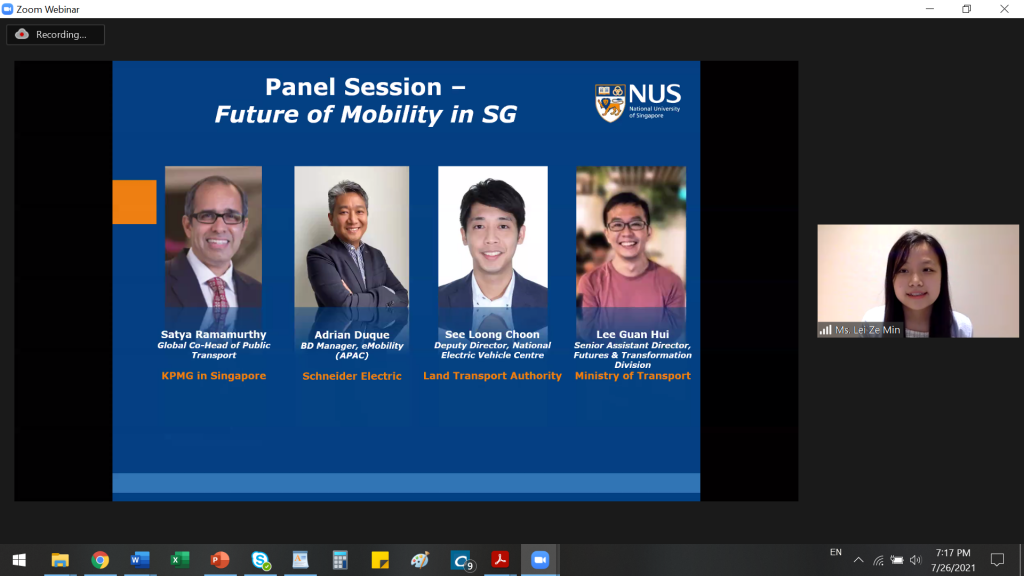
Participants will have the opportunity to attend mid-term workshops in mid-August, which provide important domain knowledge, including engineering and design, and communications skills.
The project submissions will be judged in the final round of the competition on 20 September by representatives from our competition partners. They will also be sharing their EV domain expertise with the participating teams throughout the competition.
The launch was attended by more than 100 participating teams (close to 200 individual attendees) from across NUS.
Find out more about the competition here and read the problem statement here.
Strong Interest in Interdisciplinary Learning With High Acceptance Rates
IN BRIEF | 5 min read
-
NUS President Professor Tan Eng Chye discusses the University’s recent interdisciplinary initiatives – the setting up of the College of Humanities and Sciences (CHS) and the new Common Curriculum for the Faculty of Engineering and the School of Design and Environment – and the importance of lifelong learning in ensuring that students are adaptable and future-ready.
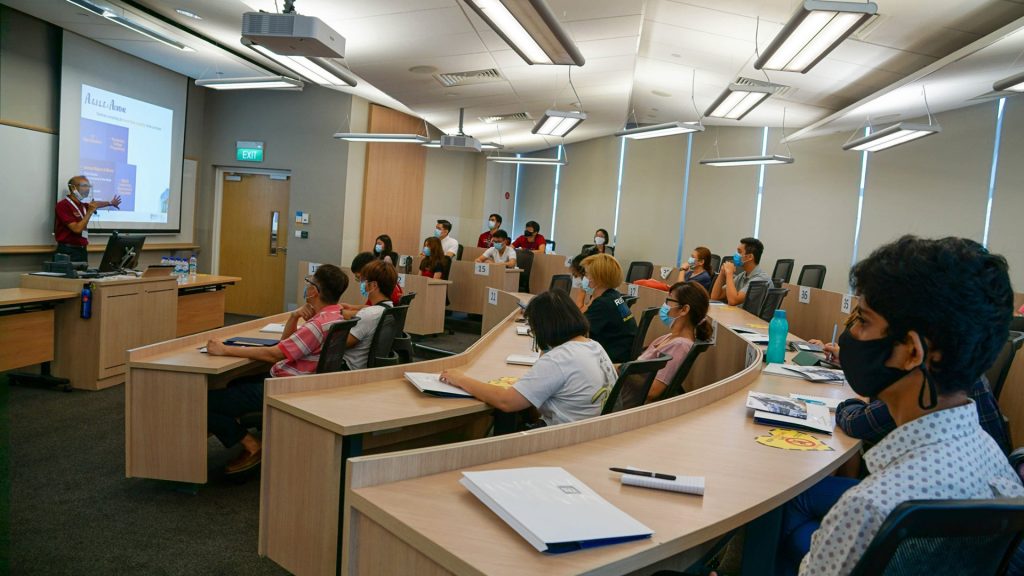
In today’s volatile, uncertain, complex and ambiguous (VUCA) world, staying stagnant is never an option. Now, more than ever, universities have to prepare students to thrive in a fast-changing and unpredictable post-COVID reality through an interdisciplinary education.
Just ask the incoming batch of freshmen, who have given a thumbs-up to the University’s recent interdisciplinary initiatives – specifically, the setting up of the College of Humanities and Sciences (CHS), and the new Common Curriculum for the Faculty of Engineering and the School of Design and Environment.
During the admissions exercise this year, 71 per cent of those who had applied to these programmes as the first choice accepted the offer. Among the incoming batch of freshmen, over 4,000 will be exposed to an interdisciplinary education. By August 2022, NUS hopes to push this number to more than 6,000.
“We are quite heartened that the applicants have responded very well,” said NUS President Professor Tan Eng Chye, as he spoke on the new changes in NUS’ curriculum. “They are receptive to the flexibility that they will have. No more are you confined to one discipline.”
Prof Tan noted that the world faces many wicked problems that cannot be solved with only one discipline.
He cited COVID-19 as a wicked problem, requiring more than just medical sciences to solve. “Even with the right medical knowledge, many countries had difficulties handling COVID-19 and its spread,” he noted.
The pandemic, in fact, prompted NUS to ramp up efforts in remodelling its educational philosophy and pedagogies to prepare its graduates for this dynamic reality.
At the centre of these reforms is the push for lifelong learning, as well as the shift towards interdisciplinary education to ensure students are adaptable and future-ready.
A lifetime of learning
While universities used to prepare their graduates for a single job, this approach is fast becoming obsolete. Today, graduates will change jobs at least 10 times over the course of their lifetime.
In line with this trend, NUS has been future-proofing its education to prepare students for lifelong learning.
“A student’s enrolment is valid for 20 years from the point they enter the university,” Prof Tan explained. “We want to remove the conception that university is only for four years. You can always come back to (NUS) to learn new skills and knowledge.”
For instance, the NUS Lifelong Learners (L3) programme upskills alumni through a wide array of skill-based, industry-relevant courses, carefully tailored to focus on emerging skills identified under SkillsFuture such as data analytics or digital literacy.
The process of returning to NUS for further studies is also made seamless. If a student does not complete a second major or degree in their initial four years, they are welcome to return to the university to read the necessary remaining modules even after graduation.

Towards interdisciplinary learning
Recognising the benefits of interdisciplinary learning, NUS is rolling this out to more students.
This started with the launch of CHS, which brings together the Faculty of Arts and Social Sciences and the Faculty of Science.
In the upcoming semester, CHS will admit 2,200 students and they will take a new Common Curriculum within their first three semesters – consisting of integrated modules with a problem-based pedagogy.
Similarly, a Common Curriculum has been introduced for the Faculty of Engineering and the School of Design and Environment to encourage knowledge transfer between the two complementary disciplines.
For instance, NUS’ very own net-zero energy building at SDE4 is a product of melding both architecture and engineering – the first of its kind in Singapore.
“The building’s beautiful architectural design alone doesn’t contribute to it being net-zero energy. What you have is a lot of deep engineering work embedded into it. It shows that architects have to work very closely with engineers in order to achieve this,” explained Prof Tan.
With interdisciplinary learning, the proportion of Unrestricted Elective modules a student can take has also been increased to up to 30 per cent, encouraging students to have two or more specialisations.
In the four faculties that now have an interdisciplinary common curriculum, this works out to more than 700 possible double major pairings, 1,700 major-minor pairings, and 100,000 major with double minor combinations.
Expanding choices for students
Ultimately, these educational innovations create greater flexibility for students to curate their own curriculum.
They will no longer have to make an immediate commitment to a single discipline. Instead, they are given time to decide on their academic calling through the common curriculum.
These efforts are central to NUS’ flagship role as a creator, integrator and propagator of knowledge.
Looking ahead, the structural barriers between faculties will further dissolve, allowing students to build even broader connections between disciplines.
“Right now, we have 70 majors and 80 minors, but we may actually have more as we go along. We start with a minor. If there’s enough interest, we push it to a second or full major. The possibilities are endless especially as we move online,” said Prof Tan.
This story first appeared on NUSnews on 26 July 2021.
The potential of language as a powerful platform for society is explored
(Article is in Malay Language)
13 July 2021, Berita Harian Singapore
Rencana
Potensi bahasa sebagai wadah perkasa masyarakat dikupas
NUR DHUHA ESOOF
KONSEP bahasa liberatif, yang melawan penyenyapan dan mendorong pemerkasaan, dapat dilihat dalam bidalan dan peribahasa orang Melayu yang diturunkan oleh nenek moyang dari berdekad lalu.
Antaranya ialah peribahasa lama 'raja adil raja disembah, raja zalim raja disanggah' yang bererti raja (pemerintah) yang adil disayangi dan raja yang tak adil (zalim atau menindas) dilawan, kata pensyarah di Jabatan Pengajian Melayu, Universiti Nasional Singapura (NUS), Dr Azhar Ibrahim Alwee di sesi Ceramah Arif Budiman ke-17 baru-baru ini.
"(Peribahasa) itu dari mana? Itu belum ada zaman revolusi, belum ada demokrasi. Itu daripada nenek moyang kita yang tidak pernah tertulis dalam karya istana.
"Karya istana sebaliknya mengatakan betapa raja itu adil atau zalim, taatnya mesti mutlak. Berbanding dengan nenek moyang yang menurunkan raja adil raja disembah, raja zalim raja disanggah. Itu 'kan sisi liberatif, bahawa tidak boleh diinjak manusia," katanya.
Dr Azhar berkata demikian ketika memberi jawapan dalam soal jawab di hujung sesi yang diadakan di Pusat Bahasa Melayu Singapura (MLCS) yang disiarkan kepada lebih 130 peserta termasuk guru dan guru pakar menerusi sidang Zoom.
Beliau telah menyampaikan ucaptama di ceramah itu yang membawa judul 'Menjejaki Bahasa Liberatif dalam Lingkungan dan Sejarah: Potensi dan Hambatan'.
"Bidalan Melayu... sebenarnya sangat mencerah. Bagaimana mengatur kepimpinan, apa yang dimaksudkan dengan, contohnya, pemimpin yang adil, pemimpin yang bongok, pemimpin yang bebal. Itu bidalan yang menerangkan. Kemudian setelah menerangkan, ada pantunnya pula. Itu luar biasa," kata Dr Azhar.
Beliau menambah, bidalan seperti itu harus diajarkan, di samping peribahasa yang menyentuh "hal-hal yang estetis".
"Bidalan kita lebih banyak daripada itu, yang tidak tersentuh, dan itu kita harus usahakan supaya kita dapat melihat sisi-sisi yang mencerah dalam kebudayaan," katanya.
Menerangkan lebih lanjut tentang bahasa liberatif, Dr Azhar berkata ia mempunyai sisi menguatkan, menyanggah, memberdaya dan mencerah.
Empat ciri ini adalah ciri positif, katanya.
Ini berbanding dengan lawannya iaitu bahasa dominatif, yang selalu menekankan satu sisi yang membelenggu dan mencengkam, menyangkak, mengkerdilkan, dan menyenyapkan idea seperti idea reformis atau pembaharuan.
Dr Azhar berkata adalah penting untuk membicarakan bahasa liberatif kerana bahasa dan pemikiran kita masih dibelenggu penjajahan, dan proses pemodenan bahasa belum tercapai atau tidak seiring dengan pemodenan idea.
Memberi contoh bahasa liberatif dilantunkan, beliau berkata tokoh kesusasteraan Melayu Munshi Abdullah telah melafazkan peri penting bahasa kepada peradaban dan kemajuan manusia.
"Munshi Abdullah menggunakan bahasa Melayu sebagai bahasa untuk mengeluarkan masyarakat Melayu daripada kepompong. Itu sisi liberatif," katanya.
Dr Azhar menambah, bahasa liberatif boleh dibangunkan antara lain dengan menggunakan bahasa secara optimum dan terpakai luas dalam semua ranah kehidupan.
"Bahasa dominatif menghendaki penyenyapan, bahasa liberatif mengajukan keberanian melafazkan pembungkaman. Apabila bahasa dominatif semakin mapan, konsep kritis akan hilang; kelompok yang terdidik tidak lagi berminat untuk berwacana dan menjadi pasrah.
"Kemudian hal-hal bahasa diserahkan kepada kementerian dan pusat bahasa. Orang yang tidak mengajar tentang bahasa tidak lagi mahu peduli tentang hal bahasa. Mereka serahkan kepada cikgu-cikgu kanan untuk fikirkan.
"Bila terjadi itu, ia adalah sebahagian daripada penyeyapan. Hilanglah semangat solidaritas atau rasa kebersama," kata Dr Azhar.
Creating New Internship Opportunities: Engaging Employers to See Value in Humanities and Social Sciences
IN BRIEF | 4 min read
-
Mr Jonathan Sim, instructor from the Department of Philosophy, describes how he engaged with local employers to open internship opportunities to humanities and social sciences students who would not previously have been considered.

Humanities and social science majors are frequently misunderstood, in Singapore as in many other parts of the world. The value of their education is regularly questioned, and many employers are unaware of the value such majors can bring to the table. They prefer to hire graduates with more explicitly “practical” degrees for jobs that humanities and social sciences students could excel in.
As a result, humanities and social sciences students are not typically considered for many organisations and roles, despite offering relevant and useful skills.
So when developing an internship module, I began reaching out to organisations to create internship opportunities in such roles, to boost receptivity to hiring students from these disciplines. This enabled potential employers to better understand how students in subjects they might have previously overlooked can fill gaps in their talent pool.
Compounding the issue is that many humanities and social sciences students are unaware of the diversity of careers available to them and tend to limit themselves to roles stereotypical of their majors. There is a good reason for this. When these students apply for non-stereotypical roles, they are often turned down due to having an “impractical” major.
I regularly hear employers and people in the corporate sector lamenting the lack of creativity and critical-thinking and communication skills in their industries. These key capabilities are needed to challenge assumptions, innovate and improve processes within organisations. Employers’ lack of awareness of the value of humanities and social sciences is preventing them considering this potential talent pool.
Starting an internship module
I teach a module on data analysis and philosophical reasoning to hundreds of students each semester. With so many students under my charge, I was inspired by the idea that education is more than just about imparting knowledge. Rather, it is about facilitating growth in one’s students by providing them with opportunities for challenge and development.
As a result, I decided it would be worthwhile to experiment with an internship module where I approach employers, explain the value my students can bring to their organisation and ask them to offer temporary roles not typically filled by humanities and social sciences majors. A model designed to be mutually beneficial to both employers and students.
Here are my key lessons in how to do this:
Start by approaching contacts working in human resources (HR) and ask them to link you up with senior management or with department heads of your target companies. I initially spoke to friends in HR and some of them linked me up with HR professionals from other organisations.
Provide reassurance that you will be guiding and mentoring the students throughout the programme. My credentials as a university educator meant employers were generally open to exploring this strategic partnership.
Prepare and present a pitch clearly describing what value and skills your students can bring to the companies where you wish to secure internships. I explained how my students were excellent in data analytics, coding and problem-solving, and their training in humanities and social sciences meant they could bring unique perspectives thanks to creativity and critical thinking. Having worked with the students for one semester already, I could also vouch for their character, including attributes such as work attitude, independence and willingness to learn.
Discuss the job scope and be honest and realistic about what your students can and cannot do. I helped advise the hiring managers on my students’ capabilities, based on what I had taught them, and sometimes this meant suggesting new items in the job scope that the organisation may not have considered.
Invite students to apply for the roles available by submitting their CVs, then interview shortlisted candidates. I found interviews useful to get a better understanding of what students wanted to do and what they hoped to achieve during the internship. The application process also provided an opportunity to work with students to improve their CVs and interview skills before they spoke to employers.
Try to match students with internship roles that will best suit their personality, skills and career aspirations.
During the internships, check in on students regularly and ask them to share any challenges, so you can help them troubleshoot any issues. My role was more like an adviser pointing them to resources or giving life advice on how to handle novel social or professional situations.
Ask the students to write reflections centred on how their training in humanities and social sciences can be applied to the work they do as an intern. This helped me gauge the extent of their learning but also nudged students towards deeper reflection on their discipline to see its value and relevance in the work they did. It was very eye-opening to see concrete examples of how students found connections and applications between their studies and their work.
Benefits to organisations and students
These collaborations have proven mutually beneficial. They allow participating organisations to develop strategic partnerships with the university, helping employer branding and making it easier for them to attract talent.
At the same time, the student interns become living proof to employers that their major makes them as good as, if not better than, some students from more “practical” disciplines. The internships help inform humanities and social sciences students that they can take on roles they never thought were open to them.
We have completed one round of internships with organisations such as Henkel, a German multinational chemical and consumer goods company, and Azendian, a local AI data analytics start-up.
Students were pleased with the chance to take up roles they would not have ordinarily pursued, or been given a chance to try, in areas such as supply chain and logistics management, database management and data analytics for marketing. The internships provided profound insights on how they can apply the skills from their majors in ways that allow them to craft a niche in such roles.
The first round of placements seems to have persuaded employers to be more receptive when it comes to hiring humanities and social sciences students, as they have asked for more interns in subsequent iterations.
This is just the beginning, and there is a lot more that we can achieve in our capacity as university faculty by engaging with local organisations and employers. We can work to create more internship opportunities and help employers better understand the capabilities of our students across multiple disciplines here in Singapore and further afield.
This story first appeared on Times Higher Education on 21 June 2021.
Commencement 2021: Special Message of Congratulations to the Classes of 2020 and 2021!
IN BRIEF | 3 min watch
-
FASS Faculty and students congratulate the Classes of 2020 and 2021 and wish them all the best as they go out to change the world for the better!
“We believe in you. I believe in you. Go out there, do us proud. Make the world a better place.” — Associate Professor Loy Hui Chieh, FASS Vice Dean of External Relations and Student Life FASS, joint committee member of the NUS Philosophy, Politics, and Economics (PPE) programme, and also Faculty member of staff at the NUS Department of Philosophy.
Faculty and students talk about what life has been for them this past year, what they miss about campus life, and extend words of advice and congratulations to the graduating Classes of 2020 and 2021.
This video features Assoc Prof Loy and Dr Lohsnah Jeevanandam, Senior Lecturer, NUS Department of Psychology, as well as students from the graduating Classes of 2020 and 2021: Alvarez Brielle Clavel ('20); Somesh s/o Sailesh ('20); Douglas Ong ('20), Christina Chen (Doctoral Class of '20); Ng Qian Qian ('21); and, Lai Wei Na ('21).
Meet the Neighbours: The Seven Animals You’ll Spot in NUS
IN BRIEF | 5 min read
-
NUS is not only a second home for staff and students, but also a place for a wide range of biodiversity to call home. Mr Athanasius Koh, a management trainee with the NUS Faculty of Arts and Social Sciences (FASS) and FASS Political Science alumnus ('21) tells us about the interesting animals he has spotted around campus.
Beyond the lecture theatres, classrooms and student hangout spots, it is hard to miss the lush greenery that surrounds NUS. This has made the campus environs not only a second home for staff and students, but also a place for a wide range of biodiversity to call home.
These habitats are here to stay too. Emphasising NUS’ commitment to preserving its rich biodiversity, fighting climate change and being an environmentally responsible campus, the “Planting 10,000 Trees” initiative launched by NUS President Professor Tan Eng Chye in 2018 saw 500 mature trees planted throughout the campus, as well as 9,500 saplings nurtured in the NUS nursery. In addition, a strict policy to protect existing trees was also implemented.
Mr Athanasius Koh, a management trainee with the NUS Faculty of Arts and Social Sciences (FASS) Corporate Communications team for the past six months, and avid nature photographer, takes regular photo walks exploring these habitats. Mr Koh, who is also from the FASS Class of 2021, shares about the interesting animals he has spotted along the way.
Collared Kingfisher (Todiramphus chloris)
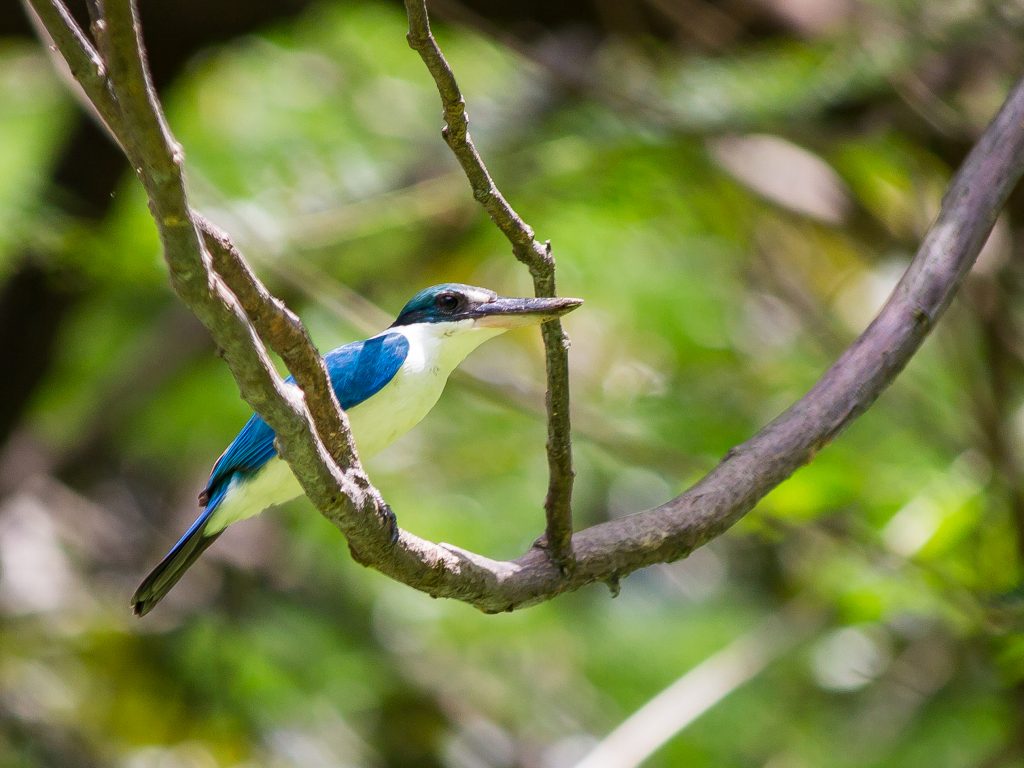 A collared kingfisher perched on a tree at AS8. (Photo: Mr Athanasius Koh)
A collared kingfisher perched on a tree at AS8. (Photo: Mr Athanasius Koh)
Dressed in beautiful blue feathers and a broad white “collar” around its neck, the collared kingfisher is a vocal bird spotted about campus with its series of harsh “kee-kee” notes, described by some as a maniacal laugh.
The collared kingfisher has also been quite the icon in Singapore’s history, gracing not only stamps but even the now decommissioned $10 note as part of The Bird Series Currency Notes from 1976 to 1984.
Look out for the collared kingfisher’s outstanding blue plumage as it rests atop trees and lamp posts. This sharply dressed celebrity is an easy spot around FASS and NUS Faculty of Engineering.
Red Junglefowl (Gallus gallus)
 Male red junglefowls proudly flaunt their dark green tail feathers and black primary feathers. (Photo: Mr Athanasius Koh)
Male red junglefowls proudly flaunt their dark green tail feathers and black primary feathers. (Photo: Mr Athanasius Koh)
Even if you have never personally caught sight of the resident FASS red junglefowl, you are more than likely to have heard its signature “cock-a-doodle-doo” around the faculty. Often confused for the domestic chicken, the red junglefowl is in fact its wild ancestor.
According to a study led by NUS ornithologist Associate Professor Frank Rheindt, the red junglefowl can be quite easily distinguished from the domestic chicken. Male red junglefowls proudly flaunt their dark green tail feathers and black primary feathers while females have distinguishing grey legs and sport black primary feathers.
While it remains a mystery why it crosses the road, the red junglefowl and its loud presence has certainly captured the attention of students and staff alike.
Plantain Squirrel (Callosciurus notatus)
 A plantain squirrel resting on a tree behind AS4. (Photo: Mr Athanasius Koh)
A plantain squirrel resting on a tree behind AS4. (Photo: Mr Athanasius Koh)
Scurrying and leaping from tree to tree, the plantain squirrel is an adorable sight if you are lucky to observe one at rest or enjoying its meal. This active animal is one of the most common mammals in Singapore and can be identified by distinctive black and white stripes on the sides of its body and its long bushy tail.
These physical features might have you thinking what a beautiful squirrel it is, and you are not alone! In fact, Callosciurus, the plantain squirrel’s taxonomic group, translates to “beautiful squirrel”.
Blink and you just might miss this nimble creature, but the plantain squirrel can be commonly found on the trees around NUS such as at the NUS Faculty of Science. Listen out for the rustling of leaves and you just might come face-to-face with this lovable rodent.
Rose-Ringed Parakeet (Psittacula krameri)
 A rose-ringed parakeet perches on a branch after breakfast along the AS6-AS8 walkway. (Photo: Mr Athanasius Koh)
A rose-ringed parakeet perches on a branch after breakfast along the AS6-AS8 walkway. (Photo: Mr Athanasius Koh)
Often moving in flocks and squawking in unison, the rose-ringed parakeet is a loud presence in NUS. Sporting a bright green plumage, orange beak and blue-tipped tail, males also have an added pink collar around their neck in their third year.
The rose-ringed parakeet was introduced to our green spaces as escaped pets. Native to the Indian subcontinent and northern Southeast Asia, it is a resilient bird that has thrived even in locations as far as Europe!
A bird that you might hear before you see, the rose-ringed parakeet has been spotted on sunny mornings at FASS’ Lovers’ Park and along the walkway between Blocks AS6 and AS8 grabbing its breakfast.
Yellow-vented Bulbul (Pycnonotus goiavier)
 The Yellow-vented Bulbul is easily distinguishable from its black eye-mask, olive-brown back and yellow undertail (Photo: Mr Athanasius Koh)
The Yellow-vented Bulbul is easily distinguishable from its black eye-mask, olive-brown back and yellow undertail (Photo: Mr Athanasius Koh)
One of the most common birds in Singapore’s many green spaces besides the mynah, the yellow-vented bulbul is an easy spot with its black eye-mask, olive-brown back and wings and most strikingly, yellow undertail.
An unfussy fellow, the yellow-vented bulbul has been observed to feed on a variety of small fruits and insects. In addition, it can sometimes be seen carrying strips of man-made waste like plastic bags and tissue paper to be used as nesting material. You might have heard its distinct chirps before, without knowing that it was the yellow-vented bulbul, but now you can keep an eye out for them too! Spot them in shrubs and trees around campus, such as the patch of greenery right outside NUS Press at Block AS3.
Changeable Lizard (Calotes versicolor)
 Adult male changeable lizards develop an orange-coloured head and black patches over their cheeks during the mating season (Photo: Mr Athanasius Koh)
Adult male changeable lizards develop an orange-coloured head and black patches over their cheeks during the mating season (Photo: Mr Athanasius Koh)
Often mistaken for the chameleon, the changeable lizard definitely is not one at all, but that does not stop it from changing its colours when it needs to! Usually brownish to greenish yellow with faint stripes along its body, adult males develop an orange-coloured head and black patches over their cheeks during the mating season.
As common as this rapid reptile is, you might be surprised to know that it is not native to Singapore. It is believed that it was accidentally introduced in the 1980s and has since populated in numbers, aggressively displacing the native green crested lizard (Bronchocela cristatella).
While the changeable lizard is somewhat adept at camouflaging, its timid nature means that you are more likely to find it scurrying away the moment there is a slightest disturbance, rustling up the grass. They can be seen all around campus such as at the FASS Fragrant Plant Garden or outside The Deck.
Oriental Pied Hornbill (Anthracoceros albirostris)
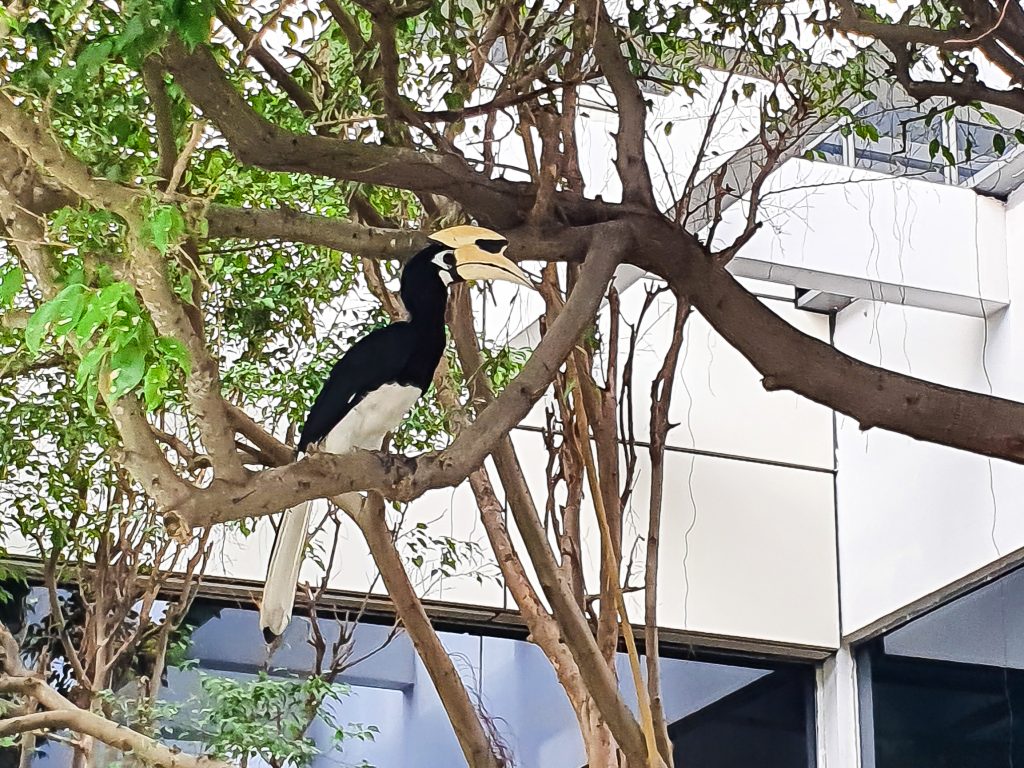 An oriental pied hornbill perches on a tree outside of AS7, Shaw Foundation Building. (Photo: Mr Athanasius Koh)
An oriental pied hornbill perches on a tree outside of AS7, Shaw Foundation Building. (Photo: Mr Athanasius Koh)
The oriental pied hornbill has certainly made an impactful comeback to Singapore’s shores. Once thought to be locally extinct, the large bird can be identified by its casque atop its beak as well as its black and white plumage.
Along with other “celebrity wildlife” like the otters in Singapore, the oriental pied hornbills’ return to the mainland can be largely attributed to conservation efforts by the National Parks Board, Wildlife Reserves Singapore and the local research community. These efforts include providing sufficient mature trees for hornbills that favour nesting in tree holes.
Spotted across a number of locations in Singapore, NUS is no exception. It has been spotted in University Town and around FASS Block AS1 as well as the trees outside AS7, Shaw Foundation Building.
Now that you have met some of the interesting wildlife that have called NUS their home, be sure to keep an eye out for our neighbours in nature between classes! Do appreciate them from a safe distance and refrain from feeding them.
This story first appeared on NUSnews on 17 June 2021.
COMMENTARY: Cultural Heritage & Social Justice, why both need to be preserved and progress together
(Article is in Malay Language) 13 June 2021, BERITA Mediacorp KOMENTAR: Warisan Budaya & Keadilan Sosial, mengapa kedua-duanya perlu dilestari dan maju seiring Oleh: DR AZHAR IBRAHIM ALWEE BERITAmediacorp: Setiap masyarakat memerlukan imaginasi warisan yang dinamik, progresif dan hidup. Ini adalah keterbalikan dari tanggapan yang mudah, dan sering kali tanpa sengaja, yang melihat warisan sebagai suatu benda yang diwariskan dari generasi terdahulu, kemudian diperaga, dipamer atau diceritakan. Pastinya ini wajar dan diperlukan, dan pastinya juga belum mencukupi. Memerhatikan kecenderungan masa kini terhadap warisan, bisa dikesani terselit semacam kenostalgiaan akan zaman yang telah hilang dan hari ini ghairah terpamer dan tercerita di merata tempat awam. Kenostalgiaan bisa memberi perangsang minat kepada sejarah, tetapi berlebih-lebihnya perasaan ini bisa menjadi perlarian dari keterkaitan sejarah dan realiti masa kini. Ya, sejarah dan masa kini ada keterkaitan yang tidak bisa kita lepaskan. Sesiapa yang gagal memahami bahawa proses perubahan sosial, akan terjebak dengan suatu pandangan yang tidak produktif, yakni sikap ahistorical, kecenderungan menafikan sejarah, tidak menghargainya, tidak memberatinya dalam erti kata sebenar. Wacana warisan hari ini telah mendapat perhatian dunia akademik, perencanaan birokrat, penajaan korporat, serta minat dari kelompok tertentu, khasnya dari kelompok yang banyak sumber, pendedahan dan keseleraan budaya yang tinggi. Rata-rata perihal warisan kini menjadi kepedulian penguasa yang mengurusi hal-ehwal warisan kerana ia dilihat sebahagian daripada pembinaan negara bangsa. Malah ada penguasa beria-ia mengurusi warisan kerana potensi perwisataan yang kelak bisa menjana wang dan pelaburan. MELESTARI WARISAN BUKAN SETAKAT UNTUK MENJANA DANA Dunia akademik juga memberi perhatian kepada wacana warisan kerana ia adalah sebahagian dari kajian sejarah, kebudayaan dan kemasyarakatan, sehingga meraih biaya dan geran penyelidikan. Semua ini wajar kita alu-akukan kerana dalam menjaga warisan, ertinya kita diberikan ruang dan sumber untuk melestarikan kebudayaan dengan rasa bangga dan bermartabat. Namun penting untuk dibicara dalam minat mendukung dan merawat warisan ini, kita harus melihat dinamika bagaimana idea warisan telah direncana, diperluaskan dan didukung dalam masyarakat. Sekiranya ada beberapa negara yang memberikan premium kepada warisan demi menjana tarikan wisata, begitu juga ada yang mendukung warisan kerana ada faktor kepentingan kelas yang dapat dikaitkan dengan selera dan kepentingan kelompok tertentu. Ini bermaksud, hanya segolongan tertentu yang terwakil sangat baik dalam naratif warisan, sedangkan yang lain tersenyap, atau tidak terangkum sama dalam naratif tersebut. Wacana warisan dalam sesebuah masyarakat majmuk sebenarnya berpotensi untuk menjadi wadah yang merangkum lebih menyeluruh dengan perwakilan kelompok berdasarkan etnik, bahasa, kebudayaan, agama, generasi, geografi, jantina, pekerjaan dan kategori-kategori lain. Ini penting di saat naratif sejarah “rasmi” sebagaimana yang dikaji di perguruan tinggi, diajarkan di sekolah, dipamerkan di muzium dan perpustakaan masih lagi dalam takuk dominan, yang belum terlepas dengan sifat elitis, yakni masih dibelenggu naratif kolonialisme ataupun nasionalisme sektarian, dan sering ditonjolkan cerita orang-orang besar, yang umumnya lelaki golongan atasan yang berpengaruh dalam sejarah. PERLU WUJUDKAN KESADARAN YANG LEBIH INKLUSIF Dengan adanya wadah dan wacana warisan, dan mendapat perhatian besar di dekad-dekad kebelakangan ini, maka terbitlah kesadaran akan representasi sejarah yang lebih inklusif. Kekadang dapat kita bandingkan betapa wadah warisan lebih bersifat inklusif sedangkan naratif sejarah dominan masih dalam takuk yang sama. Pastinya banyak lagi yang boleh dilakukan agar perwakilan dalam warisan yang adil dapat merangkul yang lainnya. Termaklum, pemikiran dominan sama ada di pihak penggubal dasar dan pentadbiran, serta keahlian pakar yang menyokongnya, menjadi penyebab utama dalam “pemilihan” warisan tertentu. Yakni, mana warisan yang menjadi premium yang berprestij dalam usaha menyemarakkan warisan ini. Dalam keadaan seperti ini wadah warisan ternyata sudah berat sebelah. Di sinilah letaknya peri penting mengaitkan persoalan warisan dengan keadilan sosial. PERSOALAN ANTARA WARISAN BUDAYA DAN KEADILAN SOSIAL Di satu sisi, wadah dan wacana warisan memberi peluang kepada kelompok-kelompok yang belum pernah, jarang atau tertinggal dalam naratif sejarah dan warisan sebelum ini. Ini harus ditabik dan diteruskan. Masalahnya ialah apabila satu paradigma tentang sejarah dan warisan yang dipegang oleh penggubal dan pengurusnya masih dibelenggu oleh pandangan sejarah sebagaimana yang disebutkan di atas, ditambah lagi dengan kepentingan dan selera kelas sosial yang melatari latar belakang mereka. Inilah antara sebab jelas, kenapa keprihatinan dan pendanaan kepada warisan cenderung berpihak kepada kelompok elit dan golongan tertentu, sedangkan yang lain tidak menerima perhatian yang sama besar, baik pendanaan dan dukungan. Dalam mengaitkan persoalan warisan dengan keadaan sosial mungkin dua soalan berikut wajar dipertanyakan. Pertama, bagaimana warisan bisa diolah dan dijayakan seiringan dengan aspirasi keadilan sosial. Kedua, sejauh manakah dalam ranah warisan kita hari ini telah membenarkan akses kepada pelbagai kelompok, ataupun akses ini lebih banyak ditumpukan kepada kelompot elit dalam masyarakat. NIKMAT WARISAN BUKAN UNTUK GOLONGAN ELIT SAJA Umumnya apa yang kita lihat dan faham tentang warisan sering kali berkenaan dari pengalaman dan kelaziman yang pernah ada di kalangan mereka yang berada, dengan penyimpanan, pengisahan, perawatan alat, benda, gaya hidup lebih tercatat lebih baik dibandingkan dari kelompok-kelompok lain. Pastilah kita tidak boleh menghalangi kelompok ini dari menikmati wadah warisan yang sedia ada. Yang boleh kita persoalkan --- bagaimana pula golongan bawahan boleh turut sama terakrab dalam medan warisan. Demi menilai perkara yang ditimbulkan di atas, sayugia kita meninjau bagaimana warisan terpamer di muzium, galeri seni, perpustakaan, instalasi awam, termasuk program sampingan menjejaki warisan. Termasuk juga wacana dan pendidikan warisan yang telah diterapkan di institusi pendidikan. Sama pentingnya ialah mempersoalkan sama ada naratif warisan itu substantif sifatnya, termasuk adanya sisi pendidikan yang tersedia di dalamnya. Adakah wadah dan wacana warisan yang kita bangunkan benar-benar inklusif sifatnya, dan akses kepadanya dapat diperolehi dengan mudah dan selesa oleh kelompok yang kita sasarkan itu. Perencanaan serta visi yang kukuh dan jelas sangat penting dalam masyarakat membangun. Perancangan warisan budaya sayugia melihat tiga dimensi yang harus dapat memastikan keadilan sosial, malah boleh juga disebut sebagai keadilan warisan (heritage justice) yang merangkumi: (a) pemerangkulan pelbagai kelompok dalam narasi warisan; (b) pemerolehan oleh khalayak dan (c) penjanaan sikap pemersatu lewat warisan, selain menjadi sumber pemberdayaan kepada kelompok sasaran tertentu. KESIMPULANNYA Usaha membangun warisan adalah milik bersama. Pihak yang berwenang seperti Lembaga Warisan Negara (NHB) telah sangat proaktif menggerakkan kesadaran, wadah, wacana warisan untuk masyarakat Singapura yang berbilang budaya dan bangsa. Terwujudnya pusat warisan untuk pelbagai kelompok etnik dan budaya di republik ini adalah contoh kepedulian dan keprihatinan tentang warisan yang pelbagai. Perhatian besar ini harus dilihat sebagai sebahagian daripada pembangunan negara, dan di pihak komuniti masing-masing, ia sebagai pembangunan komuniti. Kedua-dua ranah ini penting demi menjadikan negara yang berbudaya dan beradab. Sama pentingnya ialah wujudnya kesadaran bahawa wadah inilah juga yang mampu memberi peluang kepada kelompok-kelompok kecil dan kepentingan tertentu, untuk dapat tampil terangkum dalam naratif warisan. Warisan adalah penceritaan yang hidup, yang harus diserikan oleh kepedulian bahawa setiap satu berharga diingati dan dimaklumi dalam sejarah. Cerita yang “hidup” ini biarpun berkenaan perorangan, peristiwa dan benda yang telah lalu, tetap wajar tampil dalam imaginasi warisan kita. Warisan yang hidup dan menghidupi inilah yang harus kita teruskan. Harusnya kita bersyukur kerana perihal warisan semakin mendapat tempat, bersamaan kesadaran tentang sejarah lisan, sejarah sosial, dan sejarah dari bawah. Namun sekiranya warisan hanya barang pameran, sambutan, dan kegiatan musiman, ia sebenarnya biasa-biasa sahaja, betapa banyak sumber telah diperuntukkan untuknya. Bila imaginasi warisan kita dapat memastikan warisan yang tersedia itu menjadi pemacu bagi kesadaran kritis, kefahaman sejarah yang jelas, menyuguhkan rasa bangga kepada mereka yang boleh mengaitkan warisan itu sebahagian daripada jati diri mereka, maka di situlah letaknya segi keadilan sosial dalam ranah warisan. Disimpulkan mudah, inilah sisi keadilan sosial yang harus terpaut sama dalam ranah warisan. Penataan warisan tidak boleh bersifat elitis. Akses kepada warisan harus tersedia kepada semua warga, dan sekiranya ada kelompok yang kurang mampu, program yang lebih menarik harus tersedia untuk mereka, selain diyakinkan bahawa warisan itu sebahagian daripada milik mereka. Jangan pula ia dibuat asing bagi mereka. Ini semua perlukan perancangan cermat, dan terpaling dimulakan dengan kesadaran bahawa keadilan sosial wajar terlafaz dalam wadah, wacana dan semangat warisan. Ia menjanjikan, bahkan suatu pertanggungjawaban. MENGENAI PENULIS: Dr Azhar Ibrahim Alwee ialah Pensyarah Pengajian Melayu di Universiti Nasional Singapura (NUS). Selain kesusasteraan klasik dan moden Melayu, fokus penyelidikan beliau adalah wacana penulisan kritikal dan pembangunan intelektual Melayu-Indonesia. - BERITAmediacorp/fz
NUS CHS Case Competition: Solutions for Tomorrow
IN BRIEF | 1 min read
- The NUS College of Humanities and Sciences has launched the Case Competition Series. Register your interest now!
 The NUS College of Humanities and Sciences has launched the Case Competition Series, which seeks to encourage undergraduate and post graduate students to apply their curriculum learning to tackle complex real-world challenges that require interdisciplinary approaches to their solution. The students, who are expected to work in teams comprising members from across different disciplines, will be presented with a complex problem (to be shared at the start of the competition in late July), and given four weeks to build their cases in consultation with participating industry and Faculty advisers before their presentation for the first round of judging. Scan the QR code below or just click here to register your interest as team leader for this competition now. More details will be released to participants next month.
The NUS College of Humanities and Sciences has launched the Case Competition Series, which seeks to encourage undergraduate and post graduate students to apply their curriculum learning to tackle complex real-world challenges that require interdisciplinary approaches to their solution. The students, who are expected to work in teams comprising members from across different disciplines, will be presented with a complex problem (to be shared at the start of the competition in late July), and given four weeks to build their cases in consultation with participating industry and Faculty advisers before their presentation for the first round of judging. Scan the QR code below or just click here to register your interest as team leader for this competition now. More details will be released to participants next month.

Honouring five outstanding alumni from Arts and Social Sciences
IN BRIEF | 3 min read
- Five exceptional NUS Faculty of Arts and Social Sciences (FASS) alumni from diverse backgrounds were lauded at the annual FASS Distinguished Arts and Social Sciences Alumni Awards 2020 in a simple presentation ceremony on 30 April at Swissotel The Stamford.
 (From left to right): FASS alumni Mr Yatiman Yusof, Mr Niam Chiang Meng, Ms Lim Sau Hoong, Mr Ravi Menon and Dr Liang Wern Fook have made singular contributions to the areas of the arts, education, media, finance, policy and community development.
(From left to right): FASS alumni Mr Yatiman Yusof, Mr Niam Chiang Meng, Ms Lim Sau Hoong, Mr Ravi Menon and Dr Liang Wern Fook have made singular contributions to the areas of the arts, education, media, finance, policy and community development.
Five exceptional NUS Faculty of Arts and Social Sciences (FASS) alumni from diverse backgrounds were lauded at the annual FASS Distinguished Arts and Social Sciences Alumni Awards 2020 in a simple presentation ceremony on 30 April at Swissotel The Stamford.
All have left their distinct mark in the wide-ranging fields that they serve. They are namely:
- Mr Yatiman Yusof (Geography and Malay Studies, ’72), Non-Resident High Commissioner of Singapore to Kenya
- Mr Niam Chiang Meng (Economics, ’83), Chairman of the Maritime and Port Authority of Singapore (MPA)
- Ms Lim Sau Hoong (Chinese Studies, ’83), Founder, Former CEO and Executive Creative Director of advertising agency 10AM Communications
- Mr Ravi Menon (Economics, ’87), Managing Director of the Monetary Authority of Singapore (MAS)
- Dr Liang Wern Fook (Chinese Studies, ’89 and Master of Arts, ’92), Writer, musician and educator
Congratulating the award recipients, FASS Dean Professor Robbie Goh said, “Ms Lim Sau Hoong, Dr Liang Wern Fook, Mr Ravi Menon, Mr Niam Chiang Meng and Mr Yatiman Yusof, have made singular contributions to the arts, education, media, finance, policy and community development. Not only do their wide-ranging achievements bring pride to the FASS family, but I believe that it also attests to the disciplinary range, intellectual curiosity and critical thinking that are the hallmarks of the FASS educational experience.”
This disciplinary diversity, Prof Goh elaborated, would soon be enhanced by FASS’ partnership with the NUS Faculty of Science in the NUS College of Humanities and Sciences (CHS) where students would be able to choose any major that is offered by both faculties. He added that this would be a major boost to FASS students’ educational experience as “the CHS common curriculum will prepare students for a disruptive world – by giving them a compulsory grounding in essential skills such as writing and communication, data literacy, digital literacy, design thinking and AI.”
Our alumni and their contributions
 Present at the ceremony were (clockwise from top left): FASS Dean Prof Robbie Goh; Mr Menon; Dr Liang; Mr Bernard Toh, Director of NUS Alumni Relations; Mr Niam; Ms Lim; Mr Yatiman; and NUS President Prof Tan Eng Chye.
Present at the ceremony were (clockwise from top left): FASS Dean Prof Robbie Goh; Mr Menon; Dr Liang; Mr Bernard Toh, Director of NUS Alumni Relations; Mr Niam; Ms Lim; Mr Yatiman; and NUS President Prof Tan Eng Chye.
A teacher and a journalist early on in his career, Mr Yatiman served key government appointments including as a Member of Parliament and Senior Parliamentary Secretary of the Ministry of Foreign Affairs and the then-Ministry of Information and the Arts, before his retirement in 2006. In addition to being Singapore’s non-resident envoy to Kenya, Mr Yatiman is a Board Member of the Singapore Press Holdings Foundation and the Chairman of the Malay Language Council of Advisors.
Contributing extensively to the public sector too was Mr Niam who served in the Ministries of Finance, Trade and Industry, Health, Law, and Information, Communications and the Arts – including Permanent Secretary appointments in several of these Ministries. He also served at the National Population and Talent Division, and the National Climate Change Secretariat. Aside from his current MPA chairmanship, Mr Niam is also the Chairman of Gardens by the Bay Pte Ltd and MediaCorp Pte Ltd.
A heavyweight in the media, marketing, and advertising industry, Ms Lim’s creative leadership of 10AM Communications has garnered over 300 prestigious global awards including The One Show, the Clio Awards, and the Communication Arts. Identified for her unique creative talent, Ms Lim was Visual Advisor to the Planning Committee for the 2008 Beijing Olympics’ Opening Ceremony and headed the Shanghai World Expo 2010 Singapore Pavilion Advisory Panel. In 2007, Ms Lim was awarded the President’s Design Award and was named Designer of The Year for her extensive contributions to media, marketing and culture in Singapore.
Prior to his appointment at MAS, Mr Menon served as Permanent Secretary at the Ministry of Trade and Industry, and Deputy Secretary at the Ministry of Finance. A recipient of the Singapore Government’s Meritorious Service Medal and Public Administration (Gold) Medal, he has served on boards in the public, private, and people sectors. He is currently Chairman of the Institute of Banking and Finance, and serves on the Board of Trustees of the Singapore Indian Development Association.
A singer-songwriter, poet and academic in Chinese literature and language, Dr Liang is a respected cultural figure and pioneer of Xinyao – a movement of locally composed Mandarin pop songs from the 1980s. To date, Dr Liang is the only artist who has received the National Arts Council’s Young Artist Award (Literature) and the prestigious Cultural Medallion (Music) across different art genres. He was also honoured recently with the Singapore Chinese Cultural Contribution Award for his outstanding contribution to the promotion, enrichment and development of Chinese Singaporean culture. His canon of work includes over 15 publications of literature, more than 200 songs, and two Mandarin musicals – a number of his most important works were written and composed during his university days.
On receiving the awards
Also present at the event was NUS President Professor Tan Eng Chye who presented the awards to the five alumni. Invited guests were also treated to videos of the award recipients who shared about their university days in FASS and their career highlights.
Recalling the moment he received news of the award, Mr Yatiman humbly shared, “To be frank, I’m quite surprised when I was told about it. And I thought there are hundreds, if not thousands of people who are more suitable to receive this award. I’m just a small worker in the community, not doing much in my lifetime. I think there are many others. So, for those who’ve been working hard for the good of the community, I take this award as recognition of their effort too.”
Mr Niam recalled some of his best memories were during university days where he learnt a lot about networking and life skills. It was also where he found his life partner. He said, “It is a privilege to be given this award. I would like to thank NUS and the organising committee for bestowing this honour on me and the other recipients…it means a great deal.”
 Taking the form of a rising star, the alumni award represents the inspiration these individuals bring to society through their brilliant contributions towards the Faculty, University and Singapore.
Taking the form of a rising star, the alumni award represents the inspiration these individuals bring to society through their brilliant contributions towards the Faculty, University and Singapore.
Established in 2015, the Awards recognise individuals for their distinguished scholarship and outstanding service to the Faculty, the University and Singapore. These outstanding recipients have made significant impact in various fields locally and internationally, which has contributed to the betterment and promotion of the arts and social sciences.
Previous recipients of the Awards include luminaries such as former President Mr S R Nathan, Emeritus Senior Minister and former Prime Minister Mr Goh Chok Tong, former United Nations Under-Secretary General Dr Noeleen Heyzer; Permanent Member of the Presidential Council for Minority Rights Mr Abdullah Tarmugi; and Executive Chairman of Banyan Tree Holdings Limited Mr Ho Kwon Ping.
Click here for more details on this year’s award recipients.
This story first appeared on NUSnews on 6 May 2021.
Singapore through the years: A digital cartographic record
IN BRIEF | 3 min read
- Professor Taylor and Associate Professor Feng Chen-Chieh, along with their department colleagues at NUS Geography, created Historical Maps of Singapore, an online resource hosted by NUS Libraries that provides a series of maps of different scales dating from 1846 to 2010.
 A plan of Singapore town and the adjoining districts produced by John Turnbull Thomson, a Government Surveyor, and published by J.M. Richardson in London in 1846.
A plan of Singapore town and the adjoining districts produced by John Turnbull Thomson, a Government Surveyor, and published by J.M. Richardson in London in 1846.
From quiet colonial backwater to thriving city-state, Singapore has undergone rapid transformation over the last 200 years or so.
If you are interested in finding out how the Central Business District has developed since the 1828 Jackson Plan or have a general interest in the country’s ever-changing landscape, do check out Historical Maps of Singapore, an online resource created by NUS Geography and hosted by NUS Libraries.
Historical Maps of Singapore provides a series of maps of different scales dating from 1846 to 2010. The maps have been carefully converted to a digital format and georeferenced to facilitate cross-comparison.
The work was funded through a Strategic Initiative award from NUS, and both the Singapore Land Authority and Ministry of Defence kindly provided permission for the maps to be made available online.
NUS Geography faculty members who worked on the project included the Head of Department Professor David Taylor, as well as Associate Professor Feng Chen-Chieh.
“Maps are extremely important resources, and not only for geographers. Maps are time-stamped windows not only on the ever-changing landscapes they represent in reduced form but also on the minds and values of the map-makers and those who they thought might be interested in the results of their endeavours,” said Prof Taylor.
“For example, the 1873 map shows the locations of 29 police stations, but only one hospital ~ was crime really a much greater concern than health in late 19th century Singapore? Making the maps available in digital form opens them to a wider audience and to new forms of analysis.”
 (From left to right) The changing landscape of the Telok Ayer Basin from 1860 to 1993.
(From left to right) The changing landscape of the Telok Ayer Basin from 1860 to 1993.
The online resource is being used in teaching by NUS Geography, and has proved particularly valuable during the COVID-19 pandemic when teaching was moved largely online.
The digitised maps have also been used in research. For example, geographers have used the maps as a basis for plotting changes in Singapore’s coastline and the extent to which coastal habitats such as mangrove forests have been lost, while researchers at NUS Chinese Studies have plotted changes in the locations of Chinese temples and kampungs – and in some cases their disappearances.
The Historical Maps of Singapore web-based resource has been made as straightforward as possible to use. Once on the website, users may select the maps that they are interested in and zoom in and out, revealing higher or lower levels of detail. They can also arrange several maps on top of one another as layers, and search for common features on the different maps. Layer swipes can also be done to compare different maps.
Clicking on the metadata, one can also view a description of the map, provenance and citation. These maps can be exported and viewed in Google Earth, QGIS or ArcGIS as layers. These features provide researchers and students from a range of disciplines with the analytical and visualisation tools needed to carry out more detailed studies of the digitised maps.
 Users may swipe to compare the maps over different years.
Users may swipe to compare the maps over different years.
Prof Taylor added, “The popularity of the Historical Maps of Singapore web-based resource has not surprised me. Singapore has changed so much in a relatively short period of time.
“Maps are one way of capturing and evaluating those changes. But they are capable of providing much more than a simple record of change. I hope that we are able to add to the current collection of digitised maps and associated resources in the coming years as we move increasingly into an era where geospatial information underpins so much of what we do and who we are”.
This story first appeared on NUSnews on 22 April 2021.
COMMENTARY: Understanding Labor Day - stories of workers, ideals of justice and well-being
(Article is in Malay Language)
29 April 2021, BERITA MediacorpKOMENTAR: Pengertian Hari Buruh - cerita pekerja, cita keadilan dan kesejahteraan
Oleh: DR AZHAR IBRAHIM ALWEE
BERITAmediacorp: Hari Buruh 1 Mei sebagai hari keramat untuk kita saling beringat dan fikirkan kesejahteraan dan kebajikan yang lebih besar dalam masyarakat.
Dalam sejarah, banyak pergerakan untuk mencapai keadilan telah digerakkan oleh para pekerja, yang dipimpin oleh tokoh-tokoh politik, cendekiawan dan kepimpinan kesatuan sekerja. Wajar dikatakan tiada gerakan dalam masyarakat yang akan berjaya sekiranya para pekerja tidak dirangkul sama.
Namun pada realitinya, para pekerja bukan semena-mena memasuki pergerakan itu dan ini. Yang menjadi keprihatinan utama mereka ialah soal upah yang munasabah, jaminan sosial serta kebajikan yang diperuntukkan kepada mereka.
Tetapi ini bukanlah sesuatu yang turun dari langit, tetapi harus didapatkan, direncanakan dan dinegosiasikan antara pekerja, majikan dan pemerintah.
Perundangan yang diatur oleh pemerintah adalah sangat penting untuk memastikan hak pekerja terus terjamin. Dasar majikan yang lebih pro-pekerja harus terus digalakkan lewat insentif yang ditawarkan pemerintah.
Tambah lagi, bila nurani masyarakat menyebar kukuh, setidaknya kita dapat pastikan keprihatinan yang lebih manusiawi.
Namun tidak kurang pula dalam sejarah dan pengalaman semasa menunjukkan sesetengah pemerintah dan majikan bersekongkolan. Contohnya bila upah rendah dan pemotongan kemudahan kepada para pekerja atas sebab penjimatan kos, dan itu dilegitimasikan.
PENGIKTIRAFAN PEKERJA
Hari Buruh yang disambut seluruh dunia pada setiap 1 Mei setiap tahun adalah hari pengiktirafan kepada setiap pekerja. Ia juga hari perenungan tentang perjuangan mendapatkan hak para pekerja.
Renunglah dari sejarah, betapa pernah tercatat nasib kuli yang tidak terbela. Mereka diinjak dan mereka diperah selasak-lasaknya.
Pada awal abad kesembilan belas, Tuan Simi yang menulis “Syair Potong Gaji” mengungkapkan penderitaan para kuli asal Bengkulu yang bekerja dengan Kompeni Hindia Timur Inggeris di Singapura.
Dengan perubahan dasar Kompeni yang berpangkalan di Bengal yang mengarahkan penjimatan demi memaksimumkan laba, upah para kuli dipotong, sedang kerja mereka dilipat-gandakan, dengan kondisi kerja kian memburuk.
RINTIHAN DAN KELUHAN
Rintihan para kuli yang tercatat dalam syair tersebut, bisa saja dapat kita kaitkan dengan keluhan yang mungkin kita dengar hari ini. Perhatikan, bait sebegini:
“Gaji pun dipotong kerja-kerja ditambahTempat pekerjaan ditukar dipindah
Di manakah hati sekalian tak gundah
Kerja yang bertiga seorang sudah”
Yang paling menyedihkan ialah keberadaan mereka tidak dipandang langsung
“Perasaan hati sangatlah rendahKebajikan dibuat tidak berfaedah
Beberapa lamanya bekerja sudah
Harganya dinilai setimbang ludah”
Dengan peredaran zaman, kebajikan para pekerja dari zaman kolonial beralihan menjadi sedikit membaik setelah kemerdekaan tercapai. Proses pembangunan memberi peluang yang lebih menjanjikan dan dunia azab itu telah kita tinggalkan, sehingga Usman Awang menyebut sedemikian sempena Kemuncak Afro-Asia pada 1955:
“Dulu kita dipaksa jadi tukang sapu,Tuan-tuan gemuk bayar gaji sambil goyang kaki,
Ada sahabat belakangnya dicemeti,
Jadi lembu pedati kerja tanpa gaji.”
MENGINGATKAN PENDERITAAN
Itulah nasib pekerja zaman berlalu. Namun pada 1971, puisi “Satu Mei” oleh Usman terungkap menggigit kerana mengingatkan penderitaan yang masih membelenggu pekerja yang “menyusun lapis-lapis besi waja,”; yang “membunyikan mesin-mesin kilang.” Namun mereka yang bekerja hempas pulas ini “upah yang diterimanya sekadar besar segenggam.”
Begitulah tantangan yang dihadapi pekerja di saat ekonomi dunia tidak menentu, memberi tekanan fizikal dan mental. Bayangkan hari ini bukan saja para pekerja harus terus memastikan hak untuk menjaga periuk nasi dan kebajikan mereka, malah juga “bekas” pekerja yang baru dibuang kerja, atau yang lama menganggur. Ramai yang pernah bekerja tetapi penyusunan semula industri, serta syarikat yang gulung tikar, terus berlaku di sana sini.
Juga pekerja dalam sektor yang dipanggil 'gig economy', yang mekar menyebar hari ini yang upahnya mungkin menarik dalam jangka pendek, namun tidak memberi jaminan dalam jangka panjang.
Kerana dianggap sebagai pekerja sambilan, tiadalah hak yang tercantum kepada kontrak kerja mereka. Dengan tiada cuti, dan tiada kebajikan, mereka berkerja terus untuk menyambung kehidupan.
LEBIH TERHEMPIT
Dalam dekad-dekad mendatang, kita bisa bayangkan betapa mereka yang berada dalam sektor ini akan lebih terhempit sekiranya ekonomi meleset. Sesuatu yang munasabah dan adil harus difikirkan untuk golongan ini, menjangkau konvensi yang selalu menyebut “pelatihan semua demi mempertingkatkan produktiviti.”
Rata-rata dengan aturan ekonomi neoliberal yang manteranya adalah kos rendah, produktiviti tinggi dan efisiensi, kebajikan pekerja makin tidak terjamin, kerana sistem kontrak ertinya bila-bila masa saja pembuangan kerja boleh berlaku atau penyambungan kontrak tidak tersedia lagi.
Sebaliknya untung syarikat korporat melambung naik, dengan gaji golongan eksekutif di atas makin membesar dengan imbuhan yang berbagai-bagai. Yang dibawah pula kerja menambah dan upah tidak berubah-ubah.Dengan upah tidak meningkat sedangkan inflasi meningkat, kesejahteraan pekerja semakin tergugat. Dalam negara di mana yang tiada keterjaminan perundangan dari penguasa, kondisi pekerja bertambah teruk.
Hari ini suasana dan kesadaran moral dalam masyarakat dan di peringkat global kian kuat diseru dan diaju. Rata-rata orang awam kuat menolak segala bentuk perhambaaan, perdagangan manusia, perlecehan kepada pekerja asing, pencerobohan alam persekitaran yang merosak ekologi, dasar dan praktis rasis yang dilakukan oleh penguasa keselamatan.
KEWAJIPAN BERSAMA
Pastinya kesadaran berpihak kepada para pekerja yang dilayan buruk oleh majikan dan pelanggan sangat tidak ditoleran. Satu sisi ia adalah petanda baik bahawa melayani para pekerja dengan manusiawi adalah kewajipan bersama.
Di era COVID-19 ini, dengan ketidaktentuan sangat dirasakan, kebajikan para pekerja adalah antara paling genting untuk ditangani dan diperhatikan.
Dengan terlumpuhnya kegiatan ekonomi, banyak syarikat yang gulung tikar, dan ada yang terpaksa membuang pekerja. Pastilah pekerja yang di peringkat bawahan yang paling terjejas sekali, kerana simpanan mereka pasti tidak mencukupi, itupun kalau ada yang menyimpan.
Rata-rata pekerja peringkat bawahan menerima upah setakat cukup makan, minum dan pakai seadanya, tanpa ada lebihan untuk disimpan. Dengan golongan ini makin terjejas, bayangkan pula penderitaan yang dihadapi oleh keluarga mereka yang perlukan makanan dan tempat teduh.
KESEJAHTERAAN PEKERJA
Di sinilah jaminan sosial yang direncana pemerintah masing-masing sangat penting. Memastikan upah yang sewajarnya kepada para pekerja harus menjadi kepedulian utama. Kesejahteraan mereka harus dapat dijamin, termasuk kesihatan mental dan fizikal.
Ini semua harus dilakukan sebagai pertanggungjawaban dan bukan setakat “ihsan” atau charity kepada mereka. Hak mereka mendapat keadilan dalam bayaran upah dan kemudahan lain harus menjadi pertimbangan dari majikan dan pemerintah. Itu harus dipertekankan terus.
Masyarakat yang maju dan produktif memerlukan pekerja yang sihat, kreatif, bertenaga, cukup istirahat, dan tenang fikirannya. Upah saja belum menjamin. Kebajikan lain seperti sokongan psikologi, pelatihan semua, pendidikan sepanjang hayat dan kegiatan riadah dan sukan, harus sama mendapat perhatian oleh pihak majikan.
Pekerja adalah manusia, yang sama seperti yang lain, yang mempunyai keluarga, teman dan tetangga. Mereka perlukan waktu untuk melapangkan masa bersama dengan orang terdekat. Inilah antara keprihatinan yang harus kita tumpukan di saat kita ghairah menyeru diligatkan kemajuan dan pembangunan.
Hanya dengan pembangunan yang manusiawi, bahawa kita dapat menjamin dasar dan praktis yang berihsani. Itulah yang diperlukan oleh para pekerja kita, termasuk saya, dan anda pembaca.
HARI KERAMAT
Sesungguhnya Hari Buruh 1 Mei ini adalah hari keramat untuk kita saling beringat. Saya yakin pekerja bukan meminta disanjung tetapi mengharapkan sama kita fikirkan kesejahteraan dan kebajikan yang lebih besar dalam masyarakat.
Yakni pertimbangan adil yang terencana dalam praktis, selain dapat memikirkan sejumlah ratusan yang menganggur tidak bekerja, serta gerombolan anak-anak muda yang bakal memasuki dunia pekerjaan sejurus selepas tamat pendidikan.
Mencapai dunia yang adil bukanlah angan-angan kosong. Ia harus diusahakan dan ia bukan sesuatu yang mustahil. Sepanjang zaman, kita telah melihat perubahan yang sedikit memperbaiki kebajikan para pekerja, walaupun tidak sempurna.
Asal kita terus berpegang dengan cita-cita ini, makanya ia membekali kita kesadaran dan prinsip bahawa keadilan dan kesejahteraan yang dapat diberikan kepada semua, dan pastilah para pekerja yang paling terpenting di antaranya.
Moga Hari Buruh ini menjadi renungan cita kita bersama.
MENGENAI PENULIS:
Dr Azhar Ibrahim Alwee ialah Pensyarah Pengajian Melayu di Universiti Nasional Singapura (NUS). Selain kesusasteraan klasik dan moden Melayu, fokus penyelidikan beliau adalah wacana penulisan kritikal dan pembangunan intelektual Melayu-Indonesia.
- BERITAmediacorp/fz
#DiscoverFASS@CHS 2021 | Sign Up for Masterclasses, Learn All About Our Majors
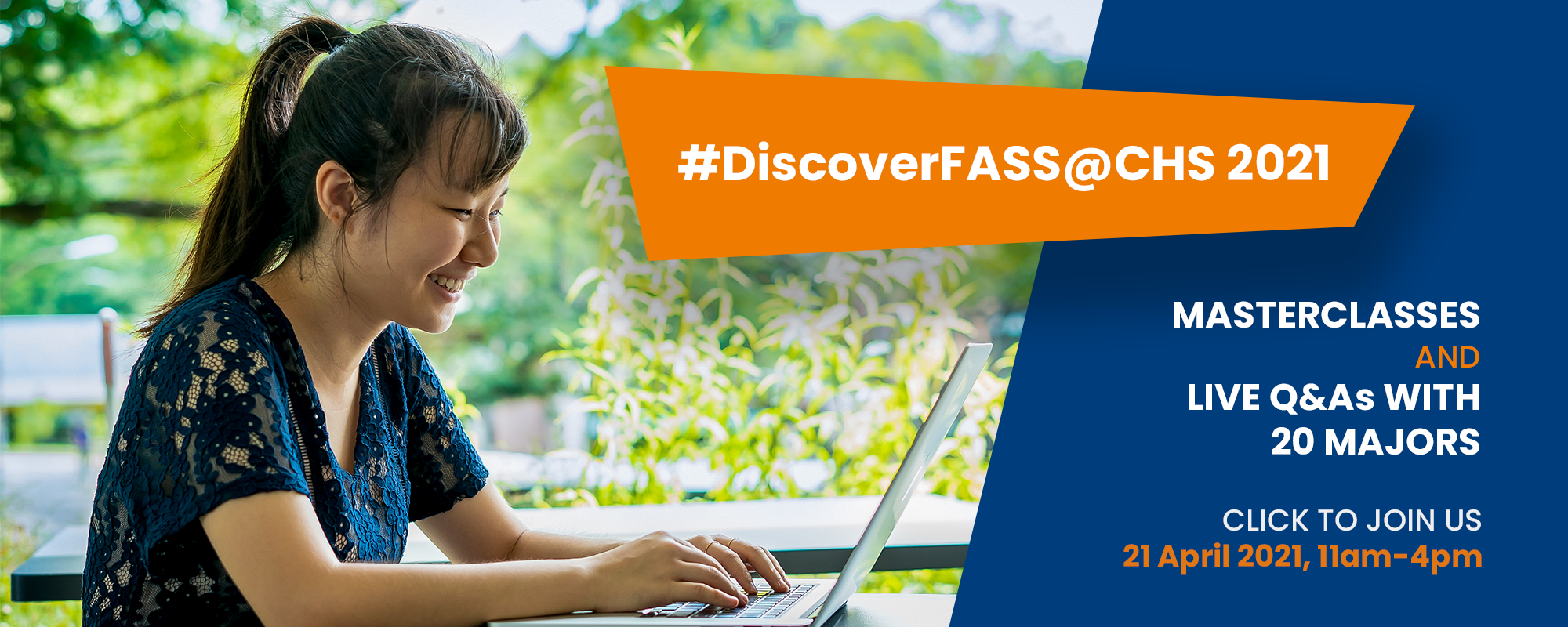
As part of the #DiscoverFASS@CHS campaign leading up to our Open House in May this year, we are holding 'live' Masterclasses presented by three of our award-winning Faculty members, and our Departments are hosting 'live' Q&A sessions for prospective students. These are opportunities not to be missed if you wish to know all you need to know about classes here and the myriad programmes available to you if you are a part of the FASS community. Masterclasses by Award-Winning Faculty
Experience lessons led by our dynamic faculty members.  Roasted Fetuses and Corpse Magic: An Introduction to Supernaturalism in Southeast Asia
Roasted Fetuses and Corpse Magic: An Introduction to Supernaturalism in Southeast Asia
Presented by Associate Professor Irving Johnson, Department of Southeast Asian Studies
The class aims to foreground the fascinating world of beliefs in supernaturalism that pervade Southeast Asian lives. Many of us enjoy telling and listening to creepy stories, watching horror movies on Netflix or dabbling in the esoteric. In this masterclass, we will look at some of the beliefs that structure constructions of the supernatural in modern Southeast Asia. The class revolves around a series of interrelated questions that seek to discover commonalities in popular belief systems and their prominence in the region, linking supernaturalism to larger issues of power, gender and politics.  Evidence and Promise Making
Evidence and Promise Making
Presented by Assistant Professor Zachary Barnett, Department of Philosophy
Promise-making is an important part of life. We make promises to our friends, families, and significant others, and they make promises to us. We will look at a puzzle that arises when we think about "promising against the odds": How should I feel about making a promise, if I know that most of the people in my exact situation end up breaking that promise? For example, suppose that I promise to quit smoking cigarettes. At the same time, I know that most people who sincerely promise to quit smoking do not actually succeed on their first attempt. Should I believe that I will be the exception to the rule? If not, am I justified in making the promise in the first place? And if I do make the promise, should my friends and family believe me? These questions arise in many different contexts, ranging from the superficial to the serious, involving addiction or relationships.  Making Sense of Self-Awareness and What That May Mean
Making Sense of Self-Awareness and What That May Mean
Presented by Dr Peace Wong Yuh Ju, Department of Social Work
In this talk, Dr Wong will attempt to broaden our understanding about ‘self’ and what that may mean to us. It is not uncommon for students in wanting to gain greater self-awareness with the attempt to learn more about one’s beliefs/feelings in relation to the observed world around us. Yet, how do we deepen our understanding of ‘self’, given that we are both familiar with who we are, and yet at times finding ourselves baffled by our reactions, and wondered why we respond in a certain manner? We will briefly discuss the various influences that may impact our values and beliefs, as well as consider what knowing your ‘self’ may mean to you.
To register for Masterclasses, click here.
Live Q&As with our Departments
Meet key Faculty and student representatives of every FASS Department and major programme in their respective Zoom meeting rooms and ask them specific questions about the requirements, content and value of the programmes they offer.
Department of Chinese Studies
The Chinese Studies Department provides training in diverse areas of Chinese Studies and Chinese Language, with the aim of preparing students for employment in a wide range of sectors. Graduates are offered career opportunities as professionals in the educational and business sectors, academia, the translation service industry and the mass media.
Join the Department's #DiscoverFASS@CHS 2021 'Live' Q&A session on 21 April (2-4 pm) here.
In the meantime, visit the College of Humanities Programmes page for more details on what this Department offers.
Department of Communications and New Media
Communications and New Media (CNM) at the National University of Singapore is the only Department in Southeast Asia that offers media studies, interactive media design, cultural studies, and communication management with a focus on new media.
Join the Department's #DiscoverFASS@CHS 2021 'Live' Q&A session on 21 April (2-4 pm) here.
In the meantime, visit the College of Humanities Programmes page for more details on the programmes offered by this Department.
Department of Economics
The Department of Economics has an established reputation as one of the largest and leading departments of Economics in the Asia-Pacific region. Faculty members’ research areas span a wide range of economic fields, with strength in the core areas of microeconomics, macroeconomics and econometrics, as well as in particular fields such as game theory and industrial organization, labor economics, education, financial economics, and growth theory and development with special reference to Asia.
The Department's #DiscoverFASS@CHS 2021 'Live' Q&A session on 21 April (2-4 pm) here. This session includes discussion of the Data Science and Economics Cross-Disciplinary Programme (DSE-XDP).
In the meantime, visit the College of Humanities Programmes page for more details on the programmes offered by this Department.
Department of English Language, Literature and Theatre Studies
The Department of English Language, Literature and Theatre Studies houses three undergraduate majors and three graduate programmes. The English Language major offers an education in linguistics, the study of human language. The undergraduate programme in English Literature is designed to provide a broad foundation in reading and analysing texts of all kinds. And, the Theatre Studies curriculum delivers education in all areas of theatre and performance history, production and interpretation.
The Department's #DiscoverFASS@CHS 2021 'Live' Q&A session on 21 April (2-4 pm) here.
In the meantime, visit the College of Humanities Programmes page for more details on the programmes offered by this Department.
Department of Geography
Modules in the Department of Geography are organized along four areas of enquiry: environmental processes and change; global political economy; society and culture; and regional specializations (with a focus on Asia). The Department also offers a Field Studies module in which students travel to countries in the region such as Thailand and Malaysia where they conduct field work and collect research material over a 3-5 week period. Home-stays and visits to local universities and key sites of interest are part of the overseas learning experience it delivers.
The Department's #DiscoverFASS@CHS 2021 'Live' Q&A session on 21 April (2-4 pm) here. This session includes discussion of the Bachelor of Environmental Studies Programme (BES-XDP).
In the meantime, visit the College of Humanities Programmes page for more details on the programmes offered by this Department.
Department of History
The Department of History offers training at undergraduate and graduate levels, and its teaching and research expertise lies primarily in the history of Southeast and East Asia, but there is strong selection of module offerings in European, American, and military history, as well as the history of art, business, religion, science and technology.
The Department's #DiscoverFASS@CHS 2021 'Live' Q&A session on 21 April (2-4 pm) here.
In the meantime, visit the College of Humanities Programmes page for more details on the programmes offered by this Department.
Department of Japanese Studies
Founded in 1981, the Department of Japanese Studies is one of the largest area studies departments devoted to the study of Japan in the Asia-Pacific region, and offers BA, MA and PhD degrees in Japanese Studies taught by specialists with qualifications from leading universities around the world.
The Department's #DiscoverFASS@CHS 2021 'Live' Q&A session on 21 April (2-4 pm) here.
In the meantime, visit the College of Humanities Programmes page for more details on the programmes offered by this Department.
Department of Malay Studies
The Department of Malay Studies actively engages in research on a wide range of issues concerning the Malay world from a multi-disciplinary perspective, promotes exchanges with centres of Malay studies worldwide, and encourages the development of new and alternative approaches to the understanding of Malay history, economy, politics, society and culture.
The Department's #DiscoverFASS@CHS 2021 'Live' Q&A session on 21 April (2-4 pm) here.
In the meantime, visit the College of Humanities Programmes page for more details on the programmes offered by this Department.
Department of Philosophy
The Department of Philosophy is one of Asia’s leading centres for philosophical education and research. It is the top English-language philosophy program in Asia, and the inaugural Asian member of the Australasian Association of Philosophy. The faculty members have a broad range of interests spanning diverse philosophical traditions, offer a philosophical education spanning diverse philosophical traditions.
The Department's #DiscoverFASS@CHS 2021 'Live' Q&A session on 21 April (2-4 pm) here. This session will also include discussion of the Philosophy, Politics, and Economics Cross-Disciplinary Programme (PPE-XDP).
In the meantime, visit the College of Humanities Programmes page for more details on the programmes offered by this Department.
Department of Political Science
The Department of Political Science offers modules in comparative politics, international relations, political theory, and public administration. It also houses the Global Studies Programme, a new, multidisciplinary field of inquiry that examines the processes and effects of globalisation across political, economic, social and cultural domains around the world.
The Department's #DiscoverFASS@CHS 2021 'Live' Q&A session on 21 April (2-4 pm) here. This session includes discussion of the Global Studies Programme.
In the meantime, visit the College of Humanities Programmes page for more details on the programmes offered by this Department.
Department of Psychology
The Psychology programme at NUS aims to equip students with knowledge in the key areas of psychology (such as human biological processes, developmental processes, social processes, cognitive processes, mental health and adjustment of individuals) as well as an understanding of the applications of psychology. It also develops skills for undertaking studies of behaviour, including statistical skills and the use of computers for data analyses.
The Department's #DiscoverFASS@CHS 2021 'Live' Q&A session on 21 April (2-4 pm) here.
In the meantime, visit the College of Humanities Programmes page for more details on the programmes offered by this Department.
Department of Social Work
The main objective of the undergraduate General and Honours degree programme offered by the Department of Social Work is to equip its graduates for entry into the social work profession at the direct-service level. Students are exposed to social service visits, skills laboratory training, fieldwork placements and module projects, among other applied learning methods.
Go to this Department's #DiscoverFASS@CHS 2021 'Live' Q&A session on 21 April (2-4 pm) here.
In the meantime, visit the College of Humanities Programmes page for more details on the programmes offered by this Department.
Department of Sociology
The Department of Sociology is a diverse, dynamic and innovative research and teaching unit with strong expertise in research on Southeast Asia, East Asia and South Asia as well as on Singapore society. One of the largest Sociology departments in the world, it offers comprehensive undergraduate, honours and graduate programmes, led by a group of dedicated and creative researchers and educators.
The Department's #DiscoverFASS@CHS 2021 'Live' Q&A session on 21 April (2-4 pm) here.
In the meantime, visit the College of Humanities Programmes page for more details on the programmes offered by this Department.
South Asian Studies Programme
South Asian Studies, as offered by the South Asian Studies Programme (SASP), focuses on the region comprising India, Pakistan, Bangladesh, Sri Lanka, Nepal, Bhutan and the Maldives. At the undergraduate level, students are offered a range of modules in economics, religious and cultural studies, history, international relations, philosophy, politics and gender studies. The aim is to provide graduates of the programme with a broad understanding of the region from different points of view - knowledge that will be useful in dealing with this changing region in the 21st century.
The Department's #DiscoverFASS@CHS 2021 'Live' Q&A session on 21 April (2-4 pm) here.
In the meantime, visit the College of Humanities Programmes page for more details on the programmes offered by this Department.
Department of Southeast Asian Studies
The Department of Southeast Asian Studies is located in the Asian Studies Division of the Faculty of Arts and Social Sciences, and offers distinctive programmes for anyone interested in studying Southeast Asia, from the undergraduate to the PhD level.
The Department's #DiscoverFASS@CHS 2021 'Live' Q&A session on 21 April (2-4 pm) here.
In the meantime, visit the College of Humanities Programmes page for more details on the programmes offered by this Department.
Centre for Language Studies
The Centre for Language Studies was established in 2001 to serve the foreign language needs of the Faculty of Arts and Social Sciences and has today over 80 full-time and part-time faculty members. It teaches thirteen different languages - Arabic, Bahasa Indonesia, Chinese, French, German, Hindi, Japanese, Korean, Malay, Spanish, Tamil, Thai and Vietnamese - to app. over 3,300 students per semester and thus helps them acquire a very valuable economic and social resource in today's world of growing globalisation and internationalisation.
The Department's #DiscoverFASS@CHS 2021 'Live' Q&A session on 21 April (2-4 pm) here.
In the meantime, visit the College of Humanities Programmes page for more details on the programmes offered by this Department.
Munshi Abdullah is a ‘genius of his own’, interested in technology and not pro-Western
(Article is in Malay Language)
27 February 2021, BERITA MediacorpMunshi Abdullah adalah 'genius tersendiri', minat teknologi dan bukan pro-Barat
Oleh: IRA MUSFIRAH
SINGAPURA: Tahukah anda, Munshi Abdullah bukan setakat seorang tokoh persuratan sahaja, malah beliau juga seorang 'genius' tersendiri yang cukup berminat dengan teknologi serta bukan pro-Barat.
Demikian antara hujah-hujah beberapa sarjana terkemuka Asia Tenggara mengenai ketokohan Munshi Abdullah, atau nama sebenarnya Abdullah Bin Abdul Kadir Munshi, yang kini diberi perspektif-perspektif segar dan baru.
Bapa kesusasteraan Melayu moden itu menerusi pelbagai penulisannya pada separuh pertama abad ke-19, banyak merakamkan tentang sejarah Singapura dan Asia Tenggara.
Namun sejarawan-sejarawan Barat turut memaparkan Munshi Abdullah sebagai seorang yang pro-Barat serta bergantung kepada penaung-penaung penjajah Inggeris.
"Saya rasa bahawa ia tidak tepat dan berbaur Orientalis," tegas Prof Madya Farish Noor, sarjana dan sejarawan Asia Tenggara.
"Dewasa ini kalau kita melihat bagaimana Munshi Abdullah dikaji kembali dan dibaca kembali, khususnya daripada ilmuan-ilmuan Asia Tenggara sendiri, kita dapat lihat bahawa sebenarnya beliau mempunyai suara dan pendirian yang lebih kukuh dan tidak begitu kagum kepada kuasa kolonial Eropah pada waktu itu. Kita dalam proses menilai kembali, pendapat belia, idea beliau, legasi warisan yang ditinggalkan beliau."
Prof Madya Farish merumuskan bahawa Munshi Abdullah adalah seorang individu yang "jauh lebih kompleks dari yang kita sangka".
Penilaian semula tentang ketokohan Munshi Abdullah itu dibincangkan hari ini (27 Feb) dalam satu sesi mengupas buku ilmiah dua jilid terbaru berjudul 'Abdullah Bin Abdul Kadir Munshi' tulisan sarjana pengajian Melayu terkemuka, Prof Madya Hadijah Rahmat.
Prof Madya Farish merupakan antara anggota panel sesi itu berlangsung di Perpustakaan Negara, selain sejarawan terkemuka Prof John Miksic, pensyarah Jabatan Pengajian Melayu di Universiti Nasional Singapura (NUS) Dr Azhar Ibrahim dan konsultan perniagaan antarabangsa Tengku Sri Indra.
Buku itu, yang mengambil masa 25 tahun untuk dihasilkan, adalah kajian paling komprehensif mengenai Munshi Abdullah yang pernah dibuat sejauh ini.
Ia cukup kaya dengan pelbagai sudut pandangan baru tentang tokoh tersebut dan menyatukan banyak bahan arkib baru dari Eropah, Amerika Syarikat dan Indonesia yang belum diteroka sebelum ini.
Dalam pencerakinan beliau pula Prof John Miksic menarik perhatian betapa Munshi Abdullah punya kerjaya yang panjang iaitu selama 30 tahun.
Dalam tempoh itu, Munshi Abdullah katanya didapati memaparkan idea-idea yang berubah dan berkembang.
"Apabila beliau mendapat lebih banyak idea tenang teknologi contohnya. Beliau bukan setakat sarjana persuratan - beliau juga seorang teknisyen, tahu bagaimana mengendalikan mesin cetak dan mengajar orang Melayu lain bagaimana mencetak buku. Beliau juga berminat tentang perkara seperti kapal wap.
"Jadi kita tahu beliau bukan minat dalam sastera sahaja, tetapi juga perkara-perkara yang praktikal," kata pengkaji terkenal itu yang merupakan Profesor Pengajian Asia Tenggara di Universiti Nasional Singapura (NUS).
Bagi Prof Madya Hadijah sendiri, beliau bermotivasi untuk mengkaji dan menulis buku itu kerana ada banyak persoalan dan kontroversi berkenaan tokoh persuratan abad ke-19 itu yang belum terjawab sebelum ini
"Jadi saya rasa perlu untuk mencari hakikat sebenar mengenai tulisan beliau (Munshi Abdullah) dan latar belakang beliau supaya kontroversi itu dapat dijawab.
"Bahan-bahan yang dikaji itu tak ada di Singapura, ada di Eropah, di Amerika dan di Indonesia dan di beberapa tempat yang lain. Jadi saya terpaksa mengembara, merentas lautan dan benua, untuk melihat dan meneliti karya-karya tersebut dan penelitian itu memerlukan masa. Dan saya mengambil cuti belajar (sabbatical)sebanyak dua kali, untuk melakukan kajian-kajian ini," cerita Prof Madya Hadijah kepada BERITAmediacorp.
Antara sumber-sumber utama yang diperolehinya adalah daripada Sekolah Pengajian Ketimuran dan Afrika, Universiti Harvard dan Perpustakaan Nasional Indonesia.
Yang pasti, para sarjana itu percaya Munshi Abdullah adalah tokoh intelektual yang melihat pentingnya sejarah.
Menurut Prof Madya Farish, kisah Munshi Abdullah "masih relevan buat kita pada zaman ini".
"Khususnya bagaimana beliau melihat pentingnya sejarah, sifat rasional, akal fikiran, pentingnya inovasi baik dalam bidang kerja mahupun dalam bidang ekonomi. Saya rasa ini merupakan idea-idea yang masih relevan. Malah lebih relevan pada wkatu itu.
"Jadi kerana itulah saya sarankan anak-anak muda dan ilmuan-ilmuan membaca buku ini dan dapat sudut pandangan yang berbeza daripada apa yang kita ketahui 20, 30 tahun yang lalu," tambah pemikir Asia Tenggara itu.
Prof Miksic pula menarik perhatian betapa sebagai seorang intelek pada zamannya,Munshi Abdullah mementingkan akal serta mengetengahkan hujah dan analisis logikal tentang "dialog-dialog semasa" dalam masyarakat beliau ketika itu.
Penulis "Hikayat Abdullah" juga banyak memberi reaksi kepada "semua evolusi baru yang berlaku pada awal tahun-tahun 1800-an.
"Abdullah sentiasa menekankan 'akal' dan bukan khayalan... Beliau sentiasa sangat prihatin dengan realiti dan tidak mengada-adakan sesuatu.
"Tulisan beliau sentiasa mengenai sebahagian daripada hujahdan dialog-dialog yang sedang berlangsung dalam masyarakat. Ini sangat baru bagi zamannya... bagaimana beliau melaksanakannya beberapa idea baru buat pertama kalinya.
"Beliau kelihatannya tidak dipengaruhi oleh sesuatu yang tertentu dalam kerjanya. Dia kelihatannya, sebilangan orang menyifatkannya sebagai 'genius' tersendiri. Beliau tidak begitu dipengaruhi oleh sesiapa. Beliau seorang yang unik," menurut Prof Miksic semasa berkongsi pandangannya kepada BERITAmediacorp.
Kini, dengan lahir sudah kajian dan buku yang dianggap sebagai suatu penerobosan mengenai Munshi Abdullah, Prof Madya Hadijah memendam dua keping harapan.
"Harapan saya yang pertama adalah masyarakat akan membacanya, menelitinya dan membahaskannya sebab nilainya akan menjadi sia-sia jika tidak dibaca oleh masyarakat. Dan jangan pula sampai orang luar dan masyarakat lain membaca dan mendapat manfaat sementara masyarakat kita tidak mempedulikannya.
Kedua, ujar Ketua Kumpulan Akademik Bahasa dan Budaya Asia Institut Pendidikan Nasional NTU itu, beliau berharap agar akan ada golongan generasi muda yang meneruskan pengajian mengenai Munshi Abdullah dari sudut-sudut yang berbeza.
Buku 'Abdullah Bin Abdul Kadir Munshi' yang meliputi dua jilid itu boleh anda beli di kedai-kedai buku utama ataupun secara naskhah elektronik bermula S$72.
- BERITAmediacorp/ha
by Ira Musfirah for BERITAMediacorp
Instructor / Teaching Assistant Positions in the Faculty of Arts and Social Sciences
- 4 Full-Time Teaching Assistant/Instructor (Integrated Humanities)
- 3 Full-Time Teaching Assistant/Instructor (Integrated Social Sciences)
- 2 Full-Time Teaching Assistant/Instructor (Integrated Asian Studies)
- Conduct tutorials (discussion groups) and support students via email, office hours.
- Provide administrative support and assist in the day to day running of the module.
- Prepare educational resources and course materials.
- Evaluate module assessment components.
- A Bachelor’s degree or Masters’ degree, or recent PhD in a relevant discipline.
- Candidates must have excellent verbal, reading, and written skills, and be able to explain difficult concepts clearly.
- Be able to work well independently, and as a member of an interdisciplinary team with diverse interests and opinions.
- Strong interest in continued engagement with a variety of humanities and non-humanities disciplines, as well as pedagogical improvement.
- Strong ability to facilitate discussions for undergraduate students.
- Past teaching and facilitation experience (especially at the university level) with good student feedback will put candidates in a strong standing.
- Completed, signed copies of the NUS Personal Data Consent Form and Personal Particulars Form – available here and here.
- CV: An abridged CV (5-page maximum), including details on education, employment history, past experience of teaching and supervision, research activities (including publications) and achievements, honours and awards, and service accomplishments.
- Qualifications: Include scanned copies of academic degrees.
- Teaching Portfolio:
- A Teaching Statement that commences with a preface (maximum 300 words) that makes the case for appointment. This should be a highly distilled summary of key contributions to student learning and, if applicable, educational leadership, guided by key points from the candidate’s teaching philosophy. The rest of the Statement should focus on outlining the teaching philosophy, providing evidence of a strong commitment to education and learning and, if applicable, innovation and leadership in teaching, and on future pedagogical plans.
- Teaching evaluations and peer review reports, if available. Other evidence of teaching excellence and/or other contributions to education, e.g., curriculum development, pedagogical innovation etc., should also be provided.
- A Research Statement, if applicable, highlighting how a candidate plans to advance pedagogical and/or disciplinary knowledge through inquiry.
- THREE referees’ letters (one of whom must be the applicant’s PhD supervisor, if applicable).
To apply, please go to NUS Careers.
Lecturer Positions in the Faculty of Arts and Social Sciences
Beginning in August 2021, the National University of Singapore will launch the College of Humanities and Sciences (CHS), an enhanced undergraduate experience for students of the Faculty of Arts & Social Sciences (FASS) and the Faculty of Science (FOS). For more information about CHS, please visit https://chs.nus.edu.sg. CHS includes a Common Curriculum of 13 modules that provide foundational skills in literacy, numeracy and critical thinking, as well as broad exposure to Integrated Humanities, Social Sciences, and Asian Studies. The Faculty of Arts & Social Sciences (FASS) at the National University of Singapore (NUS) seeks to hire a team of dedicated educators to help implement its interdisciplinary offerings in three new core modules: Integrated Humanities, Social Sciences, and Asian Studies. FASS will hire multiple positions at the rank of Lecturer to support these modules. Candidates from any discipline in the Humanities, Social Sciences, or Asian Studies may apply. Interdisciplinary research expertise and/or experience teaching in an interdisciplinary environment will be advantageous. Successful candidates will be primarily responsible for the implementation and support of the new core modules. They will be academically housed in one of the Departments or Programmes in FASS. Candidates will be expected to teach up to 240 contact hours per academic year. Additional responsibilities will depend on rank (see below) and may include administrative service. The anticipated start date is 1 July 2021 prior to the beginning of the new academic year commencing in August 2021. The appointment is for a period of two or three years with the possibility of extension. Successful candidates will be hired on the Educator Track. The Educator Track at NUS aims to attract, nurture, and retain suitably qualified and highly effective faculty members who approach teaching as a scholarly practice, and who therefore focus on and are passionate about excellence in teaching as a means of supporting student learning. The Educator Track offers a path for career progression (up to Full Professor), and it rewards effective, innovative, and thoughtful pedagogical practices that demonstrate student learning. FASS seeks the following:
- 1 Lecturer (Integrated Humanities)
- 2 Lecturers (Social Sciences)
- 2 Lecturers (Asian Studies)
- Conduct lectures and tutorials (discussion groups) and support students via email, office hours.
- Provide administrative support and assist in the day to day running of the module.
- Prepare educational resources and course materials.
- Evaluate module assessment components.
- A PhD in a relevant discipline (in the Humanities, Social Sciences, or Asian Studies)
- Candidates must have excellent verbal, reading, and written skills, and be able to explain difficult concepts clearly.
- Ability to work well independently and as a member of an interdisciplinary team with diverse interests and opinions; team teaching experience preferred.
- Experience with and commitment to interdisciplinary teaching and research, particularly across cultural traditions/regions.
- Experience with interdisciplinary curriculum design and development preferred.
- Experience teaching in a common curriculum for first-year students preferred.
- Ability to facilitate discussions for undergraduate students, especially with first-year students of diverse backgrounds, interests and abilities.
- Teaching experience with good student feedback preferred.
- Commitment to continual pedagogical improvement and a scholarly approach to education.
Joint-Educator Track Position, Department of Malay Studies and Department of Communications and New Media of the National University of Singapore
The Department of Malay Studies and Department of Communications and New Media of the National University of Singapore seek to fill an Educator Track position in studies of the arts, heritage, built environment, urban histories and public cultures of Indonesia, Malaysia and Singapore. The successful applicant will be expected to teach undergraduate and graduate courses in both departments. Candidates are expected to teach courses in some of the following areas: peoples and institutions in heritage, cities and public cultures, arts and heritage curation, and social histories of built environments. In addition to teaching, the successful candidate will be expected to supervise undergraduate and graduate students. Depending on qualification the candidate may be hired at the rank of lecturer, senior lecturer or associate professor.
Successful candidates must have:
- A Ph.D. in a related degree from an internationally acclaimed institution at the time of appointment.
- Excellent communication and pedagogical skills, and dedication to academic teaching excellence and collegiality. A strong and diverse teaching portfolio is a must.
- To be considered for a senior position, a candidate must also demonstrate the potential to be research active.
A leading global university centred in Asia, the National University of Singapore is a leader of scientific and social scientific research in the city-state of Singapore. Its transformative education includes a broad-based curriculum underscored by multi-disciplinary courses and cross-faculty enrichment, as well as special programmes which allow students to realise their potential. Over 30,000 students from 100 countries further enrich the community with their diverse social and cultural perspectives, making campus life vibrant and exciting. The university emphasizes excellence in both teaching and research, with internationally competitive salaries and opportunities for substantial research funding. As the university's medium of instruction is English, applicants must exhibit a high level of English-competency.
Applications should submit the following materials to mlssec@nus.edu.sg
- Full CV
- Letter of interest
- Teaching statement (maximum 3 pages)
- Research statement (maximum 3 pages)
- Evidence of teaching ability such as student feedback or peer review reports, and/or evidence of other contributions to education, if available.
- A list of 4 external referees (names, contact details, applicant's relationship to them).
For further inquiries, please email mlssec@nus.edu.sg
Review of applications will start on 18 January 2021. Campus visits will be in early 2021, if necessary virtually through Zoom. Early applications are encouraged so as to get full consideration by the committee. Only short-listed candidates will be notified.
Visit our websites at https://fass.nus.edu.sg/mls/ and https://fass.nus.edu.sg/cnm/ for information on both Departments, and http://www.nus.edu.sg for information on the University.
Negotiating Art and Craft in the Malay World, 31 Oct, Sat

A look into the works of two Singaporean artists, their art practices and how they negotiated and at times, resisted categorisations.
About the Speaker Syed Muhammad Hafiz is an independent curator whose research and writing interests include the visual art histories of the Malay archipelago. He has curated exhibitions for museums, commercial galleries and independent art spaces over the past decade. He is currently a PhD candidate at the Malay Studies Department, National University Singapore. Register here!CitaSeni: Raden Saleh: The enigma from the Orient, Sat, 17th Oct, 11am

DESCRIPTION
Featuring Syed Muhammad Hafiz Moderated by Dr Azhar Ibrahim
The name ‘Raden Saleh’ is not just found at the beginning chapters of most Indonesian art history books. His paintings regularly fetch a premium in auction houses and currently, adorn the permanent galleries of museums in Indonesia, The Netherlands, Germany and also Singapore. At the same time, art historians and critics are equally divided about his artistic legacy. Who is Raden Saleh and how did he end up living in Europe for over two decades, when European countries were colonising other parts of the world during the 19th century? What do his paintings tell us about the art world then, and now? The session will be conducted online and details will be released closer to the event date. ––– About Syed Muhammad Hafiz Syed Muhammad Hafiz is an independent curator who researches on modern and contemporary Southeast Asian art, with a special focus on Singapore, Malaysia and Indonesia. He has previously curated exhibitions for national museums, commercial art galleries and corporate art collections. Currently, he is pursuing his PhD studies at National University Singapore, writing a thesis on the Singapore art world.Register here!
Public Lecture Series | Yang Merangsang dan Yang Menggiur
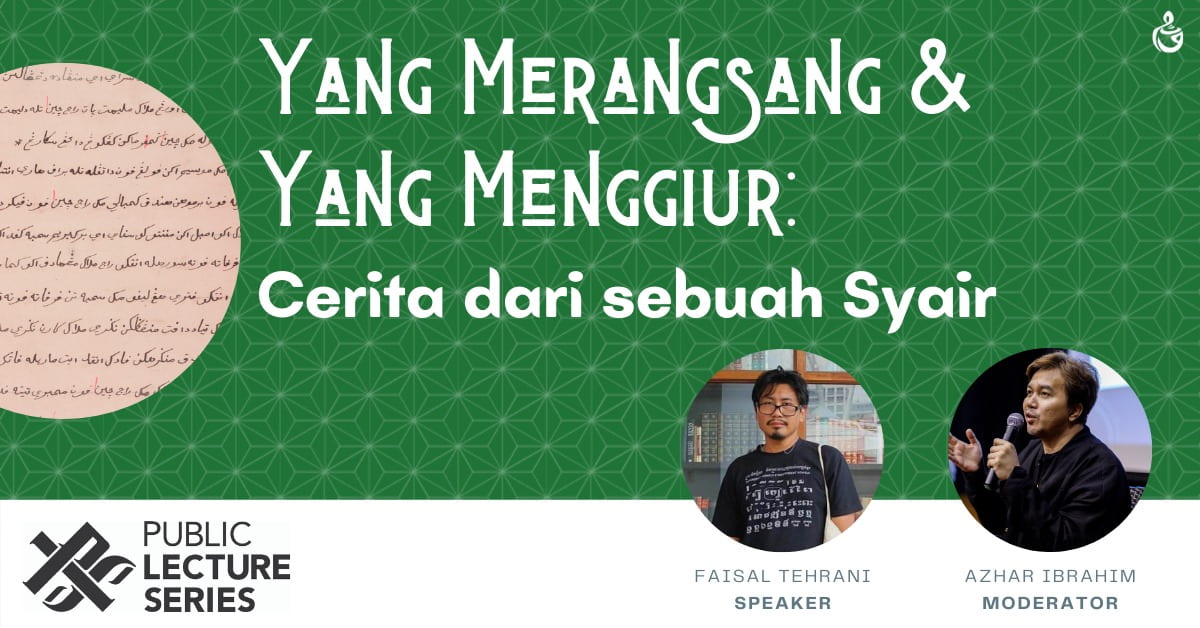
Malay Studies Graduation Celebration
*NEW* MINOR IN ASIAN STUDIES (COMMENCING SEMESTER 1, AY 2020/2021)
The Minor in Asian Studies will be of interest to students across all faculties who seek to develop a critical awareness of Asia in terms of it socio-economic, political, language and cultural features and trajectories. The programme utilizes an array of multidisciplinary perspectives and intellectual traditions to bring a multifaceted, inter-Asia approach to the dynamics of Asia providing students the opportunity to take courses on a variety of topics concerning Asia based in the humanities, languages, and social sciences. This Minor will feature strong coverage to the growing connections among Asian nations, examine Asian societies’ vital institutions, and the major problems and challenges that confront them amidst unprecedented social, political, economic change with technological advancement and globalization. Through such training, students will develop a critical awareness of Asian society and culture, business histories and practices, and the historical, contemporary and the future political and economic dynamics of the vibrant region. Appreciating the value of language for students who intend to work in Asia, the Minor will also count one Asian Language module offered at the Centre for Language Studies (CLS). For more information, check out our Minor in Asian Studies page.
Malay Studies Alumni Sharing Session
Monday, 17 February 2020 — 11 undergraduates majoring in Malay Studies and 11 young graduates from the same department met for a brief session on academic life and post-graduation plans at the Asian Studies meeting room. The alumni shared their personal experiences on how to effectively apply for jobs amid the current economic climate, and how to market their training in the Malay Studies department to future employers. Coming from various sectors like academia, public and civil service, and advocacy work, the young professionals affirmed that Malay Studies majors continue to be in demand. As students of the arts, Malay Studies majors can carry their skills in research and writing across multiple industries. The alumni further advised the students to start making plans on their future careers early, informing them that they have ready access to a network of fellow graduates from the department should they need any advice on jobs or university life. The students were also informed of external platforms that could be useful for them, like the Centre for Future Ready Graduates (CFG) and MENDAKI networking sessions. Besides discussing issues relating to job prospects and academics, the current students were also concerned about overseas programmes and internships. The alumni encouraged the students to participate in as many extra-curricular programmes as possible. They shared about their experiences during overseas exchange, internships, winter and summer programmes, and study trips. While some students were worried about financial constraints, the alumni assured them that international programmes can be both inexpensive and exciting, especially if they are situated in the ASEAN region. The department also has a record supporting overseas programmes for students. The session ended with an enthusiastic note and the exchange of contact information. Click here to view photos from the event:
New Publication: The Divine Bureaucracy and Disenchantment of Social Life: A Study of Bureaucratic Islam in Malaysia by Maznah Mohamad
 Maznah Mohamad, The Divine Bureaucracy and Disenchantment of Social Life: A Study of Bureaucratic Islam in Malaysia, Palgrave Macmillan, 2020
This book traces the expansion of Islamisation within a modern and plural state such as Malaysia. It elaborates on how elements of theology, sacred space, resources, and their interactivity with secular instruments such as legislative, electoral, and new social technological platforms are all instrumentally employed to consolidate a divine bureaucracy. The book makes the point that religious social movements and political parties are only few of the important agents of Islamisation in society. The other is the modern and secular state structure itself. Weber’s legal rational bureaucracy or Hegel’s ethical bureaucracy predominantly characterises a modern feature of governmentality. In this instance an Islamic bureaucracy is advantageously situated not only within an ambit of modernity and therefore legality, but divinity and therefore sacrality as well. This positioning gives religious state agents more salience than any other form of bureaucracy leading to their unquestioned authority in the current contexts of societies with Muslim majority rule. One of the requisites of this condition is the homogenisation of Islam followed by ring-fencing of its constituents. The latter can involve contestations with women, other genders, ‘secular’ Muslims, non-Muslims as well as dissenting Muslims with their differing truthful ‘Islams’.
For more information: https://www.palgrave.com/gp/book/9789811520921#aboutBook
Maznah Mohamad, The Divine Bureaucracy and Disenchantment of Social Life: A Study of Bureaucratic Islam in Malaysia, Palgrave Macmillan, 2020
This book traces the expansion of Islamisation within a modern and plural state such as Malaysia. It elaborates on how elements of theology, sacred space, resources, and their interactivity with secular instruments such as legislative, electoral, and new social technological platforms are all instrumentally employed to consolidate a divine bureaucracy. The book makes the point that religious social movements and political parties are only few of the important agents of Islamisation in society. The other is the modern and secular state structure itself. Weber’s legal rational bureaucracy or Hegel’s ethical bureaucracy predominantly characterises a modern feature of governmentality. In this instance an Islamic bureaucracy is advantageously situated not only within an ambit of modernity and therefore legality, but divinity and therefore sacrality as well. This positioning gives religious state agents more salience than any other form of bureaucracy leading to their unquestioned authority in the current contexts of societies with Muslim majority rule. One of the requisites of this condition is the homogenisation of Islam followed by ring-fencing of its constituents. The latter can involve contestations with women, other genders, ‘secular’ Muslims, non-Muslims as well as dissenting Muslims with their differing truthful ‘Islams’.
For more information: https://www.palgrave.com/gp/book/9789811520921#aboutBookFriday Evening Talk: Sovereign Women in a Muslim Kingdom: The Sultanahs of Aceh, 1641-1699 (Friday, 22 November 2019, 7pm)

Join A/P Sher Banu at Ngee Ann Auditorium, Asian Civilisations Museum on Friday 22 November 2019 at 7pm.
This is a public event organised by the Friends of the Museums Singapore. The series of free Friday evening talks offering fascinating insights into diverse topics. Click on the Facebook Events link here for more details: https://www.facebook.com/events/966367493718322/The voices of 'suppressed' indigenous Malays in Singapore before 1867 unfolds in exhibition
(Article is in Malay Language) Monday, 11 November 2019, BERITA Mediacorp Suara-suara pribumi Melayu 'ditindas' sebelum 1867 dirungkai dalam pameran UMMU RABBISYFINA ABDUL HAMID SINGAPURA: Acara memperingati 200 Tahun Singapura bukan hanya membuka ruang untuk memberi pengiktirafan kepada para pemimpin Melayu yang menyumbang kepada pembangunan negara, malah ia juga memberi kesedaran dan pengajaran tentang golongan pribumi Melayu yang ‘tersisih’. Demikian hujah pensyarah Jabatan Pengajian Melayu di Universiti Nasional Singapura (NUS), Dr Azhar Ibrahim. Beliau menambah, sudah tiba masanya untuk masyarakat Melayu memberi lebih banyak perhatian terhadap sejarah masyarakat mereka sendiri. Dr Azhar menyampaikan pandangannya itu ketika ditemui di pameran "Yang Tersurat: Singapura Sebelum 1867" (On Paper: Singapore Before 1867). SUARA PRIBUMI YANG TERKESAMPING Menampilkan 150 bahan artifak, pameran yang terletak di Perpustakaan Negara itu meliputi rekod rasmi, bahan-bahan yang diterbitkan seperti buku, peta dan lukisan.Kesemua artifak itu menceritakan tentang kehidupan di Singapura sebelum 1867. Selain mengumpulkan 100 bahan pameran milik Perpustakaan Negara dan Arkib Negara Singapura, pameran itu juga mempamerkan 50 artifak yang dipinjam dari institusi luar. Antaranya ialah dua naskhah Syair - Syair Potong Gaji dan Syair Dagang Berjual Beli, yang dipinjam dari Perpustakaan Negara Perancis, iaitu Bibliotheque nationale de France. Menurut Dr Azhar, kedua syair tersebut ditulis oleh seorang penulis yang sama iaitu - Tuan Simi. Meskipun tidak diketui dengan mendalam tentang keperibadian Tuan Simi, namun tidak dapat dinafikan bahawa catatannya bukan sahaja penting dalam rekod sastera, malah juga kepada sejarah Singapura. Dianggap sebagai karya 'langka' yang berbentuk protes, penulisan Tuan Simi menceritakan tentang rasa tidak puas hatinya terhadap Syarikat Hindia Timur Inggeris (EIC) pada tahun 1830-an. "SEPERTI SETIMBANG LUDAH" Dalam Syair Potong Gaji misalnya, ia memberi gambaran bagaimana "kuli-kuli" Melayu dari Bengkulu menerima tamparan apabila gaji mereka dipotong ketika mereka bekerja di bawah EIC. Penindasan dalam sektor pekerjaan juga jelas digambarkan oleh Tuan Simi dalam Syair Potong Gaji yang mana para pekerja ditekan dengan kuat oleh orang atasan. "Digambarkan tiga orang punya kerja itu dibuat satu orang. Dengan gaji yang sangat rendah. Yang penting harga diri mereka itu tidak lagi dipertekankan. "Ada satu ayat yang dikata 'harganya kami itu seperti setimbang ludah' itu sangat pedih dan kita dapat rasakan bagaimana kelompok Melayu kelas bawah yang berada dalam konteks ekonomi kolonial tersisih dan terpinggir," tekan Dr Azhar. BACA: Pelbagai perwajahan Stamford Raffles yang 'kompleks' dirungkai dalam pameran ini Begini bunyi salah satu bait daripada Syair Potong Gaji: Gaji yang dipotong kerja-kerja ditambah tempat pekerjaan ditukar dipindah di manakah hati sekalian tak gundah kerja yang bertiga seorang sudah Sampai hatinya sungguh perintah sekarang memberi kecewa pada sekalian orang berlainan sekali dulu dan sekarang susahnya bukan lagi sekarang-barang Pemerhatian terhadap karya klasik seperti penulisan Tuan Simi penting menurut pakar akademik NUS itu kerana ia bukan setakat memperkenalkan masyarakat tentang penulis Melayu tempatan. Lebih dari itu, ia memperlihatkan isu kritikal yang lebih besar, iaitu tentang keadaan sehari-hari masyarakat yang selalunya tidak dirakam dalam sejarah dominan. "Kita sedia maklum bahawa pendekatan menulis sejarah, berbeza-beza ada aliran tertentu dan kecenderungan tertentu, namun kalau ada sesetengah pihak yang tidak menganggap ini adalah satu karya sejarah yang boleh disahihkan sebagai satu dokumentasi iaitu terpulang kepada mereka. "Tetapi yang tidak boleh dinafikan ialah ia merupakan satu teks sastera yang merakam tentang kehidupan, masyarakat pada waktu itu, dan teks itu wujud. Kalau dinafikan ketidakhadirannya adalah satu penafian sejarah," tegas Dr Azhar, memberi respons tentang kesahihan teks sastera bagi dijadikan sebagai bahan rujukan sejarah. BACA: Bagaimana teks Sejarah Melayu buktikan Singapura bukan 'kampung yang mundur' RAKAMAN PIHAK PENJAJAH YANG TIDAK TEPAT Pameran tersebut turut mempamerkan sebuah banci penduduk yang difahamkan 'tidak tepat'. Banci yang dijalankan oleh pihak British itu menunjukkan jumlah penduduk pada tahun 1824 adalah sekitar 10,000 orang. Namun Pustakawan Kanan Lembaga Perpustakaan Negara (NLB), Encik Mazelan Anuar berkata rekod yang dicatat dalam banci tersebut adalah tidak tepat. Encik Mazelan berkongsi bahawa percanggahan itu berlaku kerana banci penduduk hanya dijalankan di tempat-tempat yang diketahui pihak British sahaja. Selain daripada itu, terdapat pelbagai faktor lain yang menyumbang kepada ketidaktepatan banci yang dijalankan pihak British itu, tambah Encik Mazelan. "Sebenarnya... bukan kerana sengaja, tetapi juga kerana mereka (British) ada halangan, atau kekurangan sumber untuk melakukan banci tersebut. "Jadi, tak semestinya kita tolak tepi bahan-bahan orang Barat yang mungkin tidak tepat. Tapi kita juga boleh menggunakan bahan-bahan yang ditulis oleh bahan setempat Singapura kerana kita tahu juga ada penulis-penulis seperti Munshi Abdullah dan Tuan Simi dan juga bangsa-bangsa lain yang menghasilkan karya mereka," kata Encik Mazelan. Pameran On Paper: Singapore Before 1867 akan berlangsung sehingga 22 Mac ini. – BERITAmediacorp/ur by Ummu Rabbisyfina Abdul Hamid for BERITAMediacorp
MENDAKI Commemorative Book: Malay Community have shown progress in education; middle-class groups urged to do more to help
(Article is in Malay Language) Thursday, 10 October 2019, BERITA Mediacorp Buku Peringatan MENDAKI: Masyarakat Melayu sudah tunjukkan pendakian dalam pendidikan; lebih ramai golongan pertengahan digesa tampil hulur bantuan UMMU RABBISYFINA ABDUL HAMID SINGAPURA: Sepanjang 37 tahun sejak penubuhan Yayasan MENDAKI, badan tersebut sudah mengatur pelbagai bentuk program dan bantuan bagi mempertingkatkan masyarakat Melayu di sini. Di sebalik setiap bantuan yang dihulurkan itu, soal pendidikan masyarakat Melayu tidak pernah terlepas daripada menjadi fokus utama MENDAKI. Dalam merakam perjalanan usaha badan bantu diri itu, buku peringatan "Melayari Pembangunan Pendidikan: MENDAKI dan masyarakat Melayu" dilancarkan oleh Presiden Halimah Yacob, sempena Bulan Raikan Ilmu baru-baru ini. Semalam (9 Okt), satu sesi dialog dianjurkan yang membincangkan sekitar buku tersebut, yang dihadiri para pemimpin masyarakat, golongan akademik dan belia. Turut hadir selaku tetamu terhormat ialah Setiausaha Parlimen Kanan Pendidikan merangkap Pembangunan Sosial dan Keluarga Profesor Madya Faishal Ibrahim. MERAKAM PERJALANAN PEMBANGUNAN PENDIDIKAN Buku setebal 194 mukasurat itu ditulis Profesor Madya Noor Aisha Abdul Rahman, seorang profesor dari Jabatan Pengajian Melayu NUS dan suaminya, Encik Idris Rashid Khan Surattee. Mengambil masa sekitar tujuh bulan untuk menulisnya, buku tersebut dimulakan dengan memberikan konteks sejarah sosial tentang pembangunan awal pendidikan dan kesannya terhadap masyarakat. Memberikan perspektif kritis, ia juga menyingkap kehadiran golongan kelas pertengahan dalam bidang pendidikan yang turut memberi kesan terhadap kepimpinan MENDAKI. KELAS PERTENGAHAN & CITA SEMPURNA Topik sekitar kelas dan kaitannya terhadap pendidikan mendapat perhatian utama dalam sesi dialog yang berlangsung sekitar sejam semalam. Barisan panelnya terdiri daripada Anggota Parlimen GRC Jalan Besar, Dr Yaacob Ibrahim, yang juga mantan Menteri Bertanggungjawab bagi Ehwal Masyarakat Islam, Dr Mukhlis Abu Bakar, Profesor Madya dari Kumpulan Akademik Bahasa & Budaya Asia, Institut Pendidikan Nasional (NIE), serta graduan sarjana dari Jabatan Pengajian Melayu Cik Hazirah Mohamad. "Tentang kelas pertengahan, bagaimana peranan mereka begitu penting. Kalau kita renung kembali dari segi sejarah MENDAKI, kelas pertengahan yang datang bersama untuk memikirkan apa yang harus dilakukan oleh masyarakat Melayu dengan itu wujudnya MENDAKI. Buat masa sekarang kita juga ada kelas pertengahan yang berkeupayaan dan bagaimana mereka boleh tampil ke hadapan untuk menolong masyarakat kita melalui MENDAKI "Saya rasa ini adalah satu isu yang penting kerana pembahagian kelas yang berlaku di masyarakat lain, kalau ia berlaku kepada kita, akan ada kerugian yang besar," tekan Dr Yaacob, yang merupakan mantan Pengerusi MENDAKI. Bagi Encik Idris sendiri, bagi sebuah masyarakat untuk mencapai Cita Sempurna menerusi pendidikan, golongan intelektual Melayu perlu ke depan untuk mencorak dan memandu masyarakat. "Saya rasa isu kritikal yang diutarakan dalam buku itu ialah bagaimana golongan intelektual Melayu perlu sensitif terhadap perubahan landskap pelajaran, landskap ekonomi dan landskap masyarakat itu sendiri, supaya mereka memanfaatkan dasar-dasar yang diutarakan oleh Pemerintah. Itu yang penting. "Kalau mereka tidak dapat rasakan kepentingan itu, barangkali peluang-peluang yang diberikan itu akan terlepas," tekan Encik Idris. MENGENAL PASTI JURANG Masalah jurang dalam isu pendidikan turut dibincangkan dalam sesi tersebut. Memandangkan pokok masalah yang sering berkait dengan pendidikan seringkali bersangkut dengan faktor kelas, Cik Hazirah mencadangkan agar bantuan seharusnya diberikan kepada golongan yang memerlukan berdasarkan faktor sosio-ekonomi mereka, dan bukan menerusi pendekatan etnik atau kaum. Dengan cara ini, masalah akan diatasi di peringkat nasional sepenuhnya dan masyarakat juga dijauhi daripada stereotaip "masalah Melayu". Mengulas kepada pihak media, Dr Faishal berkata wacana seperti itu digalakkan dalam membangunkan huraian masa depan bagi masyarakat. "Apa yang menarik pada saya adalah peluang-peluang yang sedia ada pada masa lampau sehingga ke hari ini, bagaimana masyarakat Singapura membangun dan bagaimana masyarakat Melayu membangun dan juga dalam aspek pembangunan MENDAKI, di mana pada setiap detik pembangunan, ada peluang-peluang yang sedia ada, bagaimana kita mengambil peluang-peluang ini untuk membangun masyarakat kita," kongsinya. Buku "Melayari Pembangunan Pendidikan: MENDAKI dan Melayu" dijual dengan harga $100 setiap satu dan hasilnya akan disalurkan kepada Dana Amanah Pendidikan (ETF) MENDAKI. - BERITAmediacorp/ur by Ummu Rabbisyfina Abdul Hamid for BERITAMediacorp
FASS Awards 2019
The annual FASS Awards Ceremony celebrates the pursuit of excellence across all domains, academic and non-academic achievements alike. From Special Book Prizes and Gold Medals for high-performing undergraduates to the FASS Student Leadership Award (#FSLA) which rewards leadership in extra-curricular activities, the Faculty’s bid to cultivate well-rounded students is an unceasing one. Our heartiest congratulations our award winners!
- Nurshirah Tabrani Malay Heritage Foundation Prize NUS Malay Studies Prize (Best Malay Studies Honours in Year 4)
- Izzah Hafizah Omar Special Book Prize in Malay Studies (Best Malay Studies Major in Year 3) NUS Malay Studies Prize (Bilingual Prize for Best Year 3 Student in Malay/Indonesian Literature)
- Muhammad Fahmi Hazmi NUS Malay Studies Prize (Best Malay Studies Major in Year 3)
- Wan Hazimah Mohammad Salemi Jamiyah Prize (Best Malay Studies Major in Year 2)
- Amirul Zulhilmi Zulkifli NUS Malay Studies Prize (Best Malay Studies Major in Year 2)
- Nur Fadhlin Sakina Ismail NUS Malay Studies Prize (Bilingual Prize for Best Year 2 Student in Malay/Indonesian Literature)
- Sharifah Afra Alatas Graduate Student Teaching Award
NUS News Education - Lessons from Syed Hussein Alatas
By NUS Office of Corporate Relations, Friday 20 September 2019 for NUS News The late Professor Syed Hussein Alatas, internationally renowned Malaysian social scientist and public intellectual, was honoured on 17 September at the Second Syed Hussein Alatas Memorial Lecture. His legacy lives on through this annual series organised by NUS Malay Studies where eminent scholars and thought leaders are invited to discuss issues contributing to the deepening of awareness of the challenges of globalisation, change and social reconstruction. The series aims to continue the vibrant discourse and vigorous scholarship on society and systems grounded by Prof Alatas. “Prof Alatas’ personality, his speech and his writings continue, in the present tense, to set the tone for the study of the Malay world, its people and its interconnections with the Global,” said Associate Professor Maznah Mohamad, Head of Department of NUS Malay Studies, in her opening remarks. Prof Alatas was appointed to the Foundation Chair of Malay Studies at the then University of Singapore in 1967 and served as Head of the Department until 1987. Aptly held on what would have been Prof Alatas’ 91st birthday, the lecture featured Professor Tommy Koh, Professor of Law at NUS and Ambassador-at-Large at the Ministry of Foreign Affairs. He highlighted four specific facets of Prof Alatas’ legacy — his thoughts on Sir Stamford Raffles, the Western stereotypes surrounding Southeast Asians, his belief in multiculturalism, and his lifelong campaign against corruption.
Prof Tommy Koh: Don't let 'religious politics' pollute Singapore
(Article is in Malay Language) Wednesday, 18 September 2019, BERITA Mediacorp Prof Tommy Koh: Jangan biarkan 'politik agama' cemari S'pura SINGAPURA: Dalam dunia kontemporari, malangnya sesetengah ahli politik mempergunakan agama untuk mencetuskan keadaan huru-hara baik di dalam mahupun luar negara. Maka itu Singapura, yang berpegang teguh kepada prinsip yang tidak mahu mencampuradukkan politik dengan agama, perlu memastikan agar konflik seumpama itu tidak akan membawa negara ini ke ambang kemusnahan. Demikian pengamatan Duta Kelana Kementerian Ehwal Luar (MFA) Profesor Tommy Koh semasa Ceramah Memperingati Prof Syed Hussein Alatas - pemikir dan cendekiawan ulung yang bertekad memperjuangkan ideologi berbilang budaya - di Perpustakaan Negara pada Selasa (17 Sep). Siri ceramah yang diadakan secara tahunan itu dianjurkan oleh Jabatan Pengajian Melayu NUS. PEMIKIRAN PROF ALATAS MASIH RELEVAN DALAM KONTEKS ANTARABANGSA Meskipun sudah 12 tahun Prof Syed Hussein Alatas berpulang, namun kajian pasca penjajahan Allahyarham dalam menangkis mitos pribumi malas, ideologi berbilang budaya dan penentangannya terhadap gejala dan budaya rasuah masih utuh berdiri mewarnai dunia kesarjanaan dan akademik. Bukan hanya penulisannya, langkah berani Prof Alatas pada 1968 untuk menubuhkan Parti Gerakan yang memperjuangkan prinsip negara berbilang kaum dan budaya serta menolak politik berunsur kaum, juga dipuji dan disanjungi Profesor Koh. Sehingga ke hari ini, 'suara lantang' dan pemikiran bernas Allahyarham Syed Hussein Alatas kekal relevan dalam konteks masyarakat setempat mahupun di peringkat antarabangsa. Antaranya termasuk tentang bahaya memperalatkan agama, di mana dunia menyaksikannya berlaku terhadap agama Katolik, Hindu, Buddha dan Islam di negara-negara seperti Amerika Syarikat, Sri Lanka, Myanmar dan negara-negara Timur Tengah. AGAMA ISLAM TURUT DIPOLITIKKAN Mengulas tentang kecenderungan sedemikian, Profesor Koh berkata, ini jelas dilakukan sesetengah ahli politik bagi menyerlahkan agenda politik masing-masing, yang akhirnya mengakibatkan kekacauan besar. Agama Islam tidak terkecuali. "Trend masa kini lebih menjurus kepada konservatisme. Penganut Islam di Asia Tenggara kini lebih konservatif berbanding 50 tahun lalu. Dan pengaraban (arabization) Islam kian membuak-buak di Asia Tenggara," kata Profesor Koh, yang juga Profesor Undang-Undang NUS, ketika berkongsi pengamatannya. Ia menjadi lebih runcing dengan percanggahan pengaruh Sunni-Syiah melibatkan Arab Saudi dan Iran di pentas global. Meskipun demikian, Profesor Koh percaya, Singapura terselamat daripada konflik ideologi sedemikian kerana pemerintahnya berpegang teguh kepada prinsip tidak mencampuradukkan politik dan agama, di samping melindungi kerencaman budaya di sini. JANGAN BIARKAN INI CEMARKAN S'PURA "Malangnya ini berlaku di merata dunia dan saya berharap ia tidak akan mencemarkan keadaan di Singapura. "Sekurang-kurangnya di Singapura, kita boleh bersyukur kerana penganut Syiah dibenarkan mempunyai tempat ibadah mereka sendiri. Dan mereka tidak dianggap sebagai kafir tetapi penganut yang baik," jelasnya lagi. Profesor Koh menambah, prinsip berbilang budaya seperti yang diperjuangkan Allahyarham Syed Hussein Alatas, sememangnya sangat penting dan beliau percaya, pengiktirafan buat tokoh ulung seperti Allahyarham memang wajar. Tiga isu lain yang turut dibangkitkan semasa ceramah sempena memperingati warisan dan ketokohan Allahyarham termasuk usaha tegarnya dalam membanteras rasuah, perspektif tentang peranan Sir Stamford Raffles dalam pembangunan Singapura serta mitos penduduk terawal di rantau ini. - BERITAmediacorp/aq by Afiqah Hussain for BERITAMediacorp
FOCUS: What are the characteristics that shapes the identity of the 'Malay Women of Singapore'?
(Article is in Malay Language) Sunday, 15 September 2019, BERITA Mediacorp FOKUS: Apakah ciri-ciri yang membentuk identiti 'Wanita Melayu S'pura'? BERITAmediacorp: Sekiranya anda ditanya, apakah ciri-ciri yang membentuk identiti wanita Melayu Singapura, apa agaknya jawapan anda? Sebenarnya apa dan siapa dia ‘wajah' wanita Melayu Singapura? Dalam bahagian ketujuh dan terakhir siri mingguan FOKUS yang bertemakan 'Singapura Kita', BERITAmediacorp keluar bertemu dengan lebih 60 orang wanita daripada pelbagai lapisan masyarakat untuk merisik jawapan mereka kepada persoalan tersebut. PELBAGAI JAWAPAN Sebagai sebuah masyarakat di negara yang cukup kosmopolitan dan moden, orang-orang Melayu Singapura boleh dianggap sebagai berdaya bingkas, berinovasi dan berwawasan. Menurut Perdana Menteri Lee Hsien Loong dalam Rapat Umum Hari Kebangsaan 2019 bulan lalu, masyarakat Melayu Singapura hari ini berkembang maju seiring dengan pembangunan negara setelah 54 tahun Singapura merdeka. Kami turun padang bertemu orang ramai untuk mendengar dari mulut mereka sendiri, apa dia 'wajah’ wanita Melayu Singapura dan jawapannya cukup menarik! Ini antara jawapan spontan daripada mulut wanita-wanita Melayu sendiri apabila soalan 'apakah ciri-ciri wanita Melayu Singapura' diajukan kepada mereka: "Wanita Melayu Singapura kini lebih kuat, berdikari," kata Shikin seorang pegawai perkhidmatan pelanggan. "Saya rasa wanita Melayu Singapura ini amat moden," kongsi Amirah Raihanah Samsir. Bagi Nurul Aini pula, beliau seorang wanita Melayu yang "takkan tinggalkan agama semata-mata untuk kerjaya". Sementara Ily Iman Samsuddin berpendapat bahawa wanita Melayu kini mampu "mengimbangi kerja dan kerja rumah". Ada juga yang lebih yakin untuk menzahirkan hakikat tentang sumbangan kaum wanita dalam membangun negara. "Sebagai wanita Melayu Singapura saya rasa kita sama-sama membangun untuk negara ini bersama dengan rakyat lelaki," luah Rubinah Karyeo, seorang pegawai perkhidmatan pelanggan, kepada BERITAmediacorp. BEBAS DARI 'MINDA TERTAWAN' Jelas dari luahan-luahan tersebut, ciri yakin diri wanita Melayu begitu menyerlah sehingga ada yang melihat diri mereka setaraf dengan wanita lain di negara-negara dunia pertama. Semestinya ini mencerminkan bahawa mereka juga bebas daripada belenggu ‘minda tertawan’ atau dijajah. "Saya rasa wanita Melayu Singapura semakin mendapat perhatian kerana keupayaan kami untuk menembus dalam pekerjaan dan bukan sahaja dalam pekerjaan lokal tetapi di syarikat antarabangsa. "Itu adalah sesuatu yang membanggakan bagi masyarakat Singapura dan saya tidak rasa diri saya lain seperti wanita-wanita lain, Amerika, Perancis dan juga wanita Rusia," kongsi Anis Ab Ghapar, yang berkerja sebagai seorang pegawai ekesekutif di salah sebuah syarikat komunikasi. Seorang lagi wanita Melayu Nur Athirah turut menyampaikan pandangan yang serupa dengan berkata bahawa wanita Melayu kini tidak takut untuk "keluar dan melawan stereotaip di luar sana". 75% PILIH PENDIDIKAN Kesemuanya sekitar 60 wanita Melayu dari pelbagai lapisan kami dekati untuk mendengar suara dan jiwa mereka. Setelah kami amati kerencaman jawapan-jawapan dan maklum balas mereka, kami mendapati bahawa 75% daripada mereka sebenarnya bersetuju bahawa ciri “Pendidikan” adalah ciri terpenting yang membentuk identiti mereka. Cik Sue Hudojo misalnya menarik perhatian tentang fakta bahawa rata-rata semua wanita Melayu ada pelajaran, sekali gus menjadi suatu penanda identiti. "Bagi saya pendidikan memberdayakan dan memperkasakan wanita Melayu Singapura kerana bukan sahaja ia mendedahkan kita kepada perkara-perkara yang mungkin kita tidak mengetahui sekiranya kita tidak masuk ke pendidikan formal, tapi ia juga akan menaikkan taraf pekerjaan kita di masa hadapan," kata seorang mahasiswa Universiti Nasional Singapura (NUS), Nur Hikmah Md Ali. Seorang lagi mahasiswa tahun empat, Izzah Hafizah Omar menjelaskan bahawa memang agama itu ciri penting. Namun hujah beliau, pendidikanlah yang "membentuk identiti saya sebagai seorang wanita". Menurut rakannya pula, Fatimah Khalid, tanpa pendidikan, wanita hari ini tidak boleh maju atau mendapat peluang-peluang pekerjaan yang selayaknya. LEBIH RAMAI WANITA MELAYU 'KELAS PERTAMA' Sememangnya, golongan wanita Melayu Singapura terus berjaya dalam pendidikan. Misalnya, pada tahun lalu, lebih 70 pelajar Melayu lulus dengan Ijazah Kepujian Kelas Pertama dan dijulang dengan Anugerah tertinggi MENDAKI. Namun lebih menarik lagi, hampir separuh penerimanya adalah wanita Melayu! Pada tahun 2007, hanya dua daripada tujuh lulusan Melayu/Islam dengan Ijazah Kepujian Kelas Pertama dan menerima Anugerah tertinggi MENDAKI, adalah wanita. Jelas, pendidikan adalah anak kunci yang mengupaya wanita Melayu Singapura. CONTOH WANITA MELAYU SG HARI INI Bagi meneroka dengan lebih mendalam tentang keperibadian wanita hari ini, BERITAmediacorp bertemu dengan seorang wanita Melayu 'teladan'. Cik Ramona Kamis berusia 48 tahun dan merupakan seorang ibu tiga orang anak. tapi beliau juga dengan sukarela mengambil tanggungjawab menjaga lagi tiga orang anak titipan. Bukan itu sahaja, Cik Ramona yang bekerja sebagai seorang guru sepenuh masa, juga berjiwa masyarakat. Sejak lima tahun yang lalu, beliau memasak dan memberikan makanan 'panas-panas' kepada keluarga-keluarga memerlukan - tidak kira bangsa dan agama - pada setiap hari Jumaat. Malah, anak-anak daripada keluarga tersebut juga akan diberikan 'kelas percuma' pada hujung minggu, yang mana beliau akan mengajar mereka subjek-subjek seperti matematik dan bahasa Inggeris. Sungguhpun sibuk dengan pelbagai tugas sama ada di rumah, di tempat kerja ataupun dengan kerja-kerja kebajikan, Cik Ramona masih mengenepikan masa untuk pendidikan dirinya. Ini kerana pada malam hari pula beliau akan menjadi seorang pelajar NTU (Universiti Teknologi Nanyang), kerana beliau kini melanjutkan pelajaran di peringkat sarjana dalam bidang kesusasteraan Inggeris. Suatu bukti betapa wanita Melayu ini cukup mementingkan pendidikan. Malah Cik Ramona percaya bahawa kesedaran, tanggungjawab dan peranan-peranan yang dipikulnya hari ini semuanya adalah hasil cernaan pendidikan tinggi yang diraihnya sekitar 20 tahun yang lalu. "Pendidikan untuk kaum wanita sekarang memang amat penting. Ada banyak-banyak sebab. Ia akan membuka banyak pintu untuk mereka, banyak peluang. Ia juga baik untuk minda mereka," tekan beliau. PENDIDIKAN - TIANG WANITA MELAYU SINGAPURA Ciri-ciri yang membentuk wanita Melayu Singapura merupakan antara topik yang dibahaskan dalam dua modul yang diajar Dr Suriani Suratman, pensyarah dan Timbalan Ketua di Jabatan Pengajian Melayu Universiti Nasional Singapura (NUS). Menurutnya, kupasan BERITAmediacorp itu mencerminkan betapa status wanita hari ini berkait rapat dengan faktor 'kelas'. Dr Suriani menjelaskan bahawa pendidikan sebagai 'cultural capital' (modal budaya) merupakan satu penanda sosial untuk membezakan seseorang dari kelas menengah dan dari kelas pekerja. "Jadi, bila wanita menggunakan pendidikan atau memberi kepentingan kepada pendidikan sebagai penanda identiti mereka, mereka ini menyatakan bahawa mereka itu moden dan mereka juga ingin meningkatkan tahap sosial mereka," tekan Dr Suriani. Menurut Dr Suriani lagi persoalan tentang identiti juga mempunyai kaitan rapat dengan aspek konteks masyarakat, ekonomi dan politik semasa. Ini juga bermakna bahawa ciri-ciri yang diungkap wanita-wanita yang ditemui kami boleh bertukar pada masa hadapan. Namun, Dr Suriani menarik perhatian bahawa pendidikan buat setakat ini dipilih sebagai penanda utama kerana penekanan Pemerintah hari ini yang memberatkan dan mengutamakan pendidikan. Hasilnya, kaum wanita meraih manfaat daripada keutamaan itu dan sekali gus menjadikan faktor tersebut sebagai "kunci"bagi mobiliti sosial mereka. Jadi mungkin boleh dirumuskan, bahawa jika pemudi sering dikatakan sebagai tiang negara, semestinya “Pendidikan”lah tiang yang mencorak wanita Melayu Singapura sekali gus membentuk 'Singapura Kita' sekarang ini. – BERITAMediacorp/ur by Ummu Rabbisyfina Abdul Hamid for BERITAMediacorp
New Publication: Islam in Malaysia : An Entwined History by Khairudin Aljunied
 Khairudin Aljunied, Islam in Malaysia: An Entwined History, UK: Oxford University Press, 2019
This book surveys the growth and development of Islam in Malaysia from the eleventh to the twenty-first century, investigating how Islam has shaped the social lives, languages, cultures and politics of both Muslims and non-Muslims in one of the most populous Muslim regions in the world. Khairudin Aljunied shows how Muslims in Malaysia built upon the legacy of their pre-Islamic past while benefiting from Islamic ideas, values, and networks to found flourishing states and societies that have played an influential role in a globalizing world. He examines the movement of ideas, peoples, goods, technologies, arts, and cultures across into and out of Malaysia over the centuries.
Interactions between Muslims and the local Malay population began as early as the eighth century, sustained by trade and the agency of Sufi as well as Arab, Indian, Persian, and Chinese scholars and missionaries. Aljunied looks at how Malay states and societies survived under colonial regimes that heightened racial and religious divisions, and how Muslims responded through violence as well as reformist movements. Although there have been tensions and skirmishes between Muslims and non-Muslims in Malaysia, they have learned in the main to co-exist harmoniously, creating a society comprising of a variety of distinct populations. This is the first book to provide a seamless account of the millennium-old venture of Islam in Malaysia.
Khairudin Aljunied, Islam in Malaysia: An Entwined History, UK: Oxford University Press, 2019
This book surveys the growth and development of Islam in Malaysia from the eleventh to the twenty-first century, investigating how Islam has shaped the social lives, languages, cultures and politics of both Muslims and non-Muslims in one of the most populous Muslim regions in the world. Khairudin Aljunied shows how Muslims in Malaysia built upon the legacy of their pre-Islamic past while benefiting from Islamic ideas, values, and networks to found flourishing states and societies that have played an influential role in a globalizing world. He examines the movement of ideas, peoples, goods, technologies, arts, and cultures across into and out of Malaysia over the centuries.
Interactions between Muslims and the local Malay population began as early as the eighth century, sustained by trade and the agency of Sufi as well as Arab, Indian, Persian, and Chinese scholars and missionaries. Aljunied looks at how Malay states and societies survived under colonial regimes that heightened racial and religious divisions, and how Muslims responded through violence as well as reformist movements. Although there have been tensions and skirmishes between Muslims and non-Muslims in Malaysia, they have learned in the main to co-exist harmoniously, creating a society comprising of a variety of distinct populations. This is the first book to provide a seamless account of the millennium-old venture of Islam in Malaysia.Hamka and Islam: Cosmopolitan Reform in the Malay World by Khairudin Aljunied
 Khairudin Aljunied, Hamka and Islam Cosmopolitan Reform in the Malay Word, Cornell University Press, 2018
Since the early twentieth century, Muslim reformers have been campaigning for a total transformation of the ways in which Islam is imagined in the Malay world. One of the most influential is the author Haji Abdul Malik bin Abdul Karim Amrullah, commonly known as Hamka. In Hamka and Islam, Khairudin Aljunied employs the term “cosmopolitan reform” to describe Hamka’s attempt to harmonize the many streams of Islamic and Western thought while posing solutions to the various challenges facing Muslims. Among the major themes Aljunied explores are reason and revelation, moderation and extremism, social justice, the state of women in society, and Sufism in the modern age, as well as the importance of history in reforming the minds of modern Muslims. Aljunied argues that Hamka demonstrated intellectual openness and inclusiveness toward a whole range of thoughts and philosophies to develop his own vocabulary of reform, attesting to Hamka’s unique ability to function as a conduit for competing Islamic and secular groups.
Khairudin Aljunied, Hamka and Islam Cosmopolitan Reform in the Malay Word, Cornell University Press, 2018
Since the early twentieth century, Muslim reformers have been campaigning for a total transformation of the ways in which Islam is imagined in the Malay world. One of the most influential is the author Haji Abdul Malik bin Abdul Karim Amrullah, commonly known as Hamka. In Hamka and Islam, Khairudin Aljunied employs the term “cosmopolitan reform” to describe Hamka’s attempt to harmonize the many streams of Islamic and Western thought while posing solutions to the various challenges facing Muslims. Among the major themes Aljunied explores are reason and revelation, moderation and extremism, social justice, the state of women in society, and Sufism in the modern age, as well as the importance of history in reforming the minds of modern Muslims. Aljunied argues that Hamka demonstrated intellectual openness and inclusiveness toward a whole range of thoughts and philosophies to develop his own vocabulary of reform, attesting to Hamka’s unique ability to function as a conduit for competing Islamic and secular groups.The Civilisational and Cultural Heritage of Iran and the Malay World: A Cultural Discourse by Syed Farid Alatas and Abdolreza Alami (eds.)
 Syed Farid Alatas and Abdolreza Alami (eds.), The Civilisational and Cultural Heritage of Iran and the Malay World: A Cultural Discourse, Malaysia: Gerakbudaya, 2018
Syed Farid Alatas and Abdolreza Alami (eds.), The Civilisational and Cultural Heritage of Iran and the Malay World: A Cultural Discourse, Malaysia: Gerakbudaya, 2018
The Malays in Multi-Religious ASEAN: Protecting Identity; Upholding Integrity (Saturday, 12 May 2018)
Inaugural Syed Hussein Alatas Memorial Lecture Speaker: Dr Chandra Muzaffar Date : Saturday, 12 May 2018 Time : 11:00am - 2:00pm Venue : The Pod, National Library, 100 Victoria Street, Singapore 188064 [wmd-buttons style="flat" button_color="#1279b5" font_color="#ffffff" size="1" border_radius="4" position="left" target="_blank" ls-id="5d9d75c2366f8"][wmd-buttons-button label="Opening by A/P Yaacob Ibrahim, Guest of Honour" link="https://blog.nus.edu.sg/mlsnews/files/2018/04/Opening-Remarks-by-Dr-Yaacob-Ibrahim_12-May-2018.pdf"/][wmd-buttons-button label="Speech by A/P Noor Aisha, HOD" link="https://blog.nus.edu.sg/mlsnews/files/2018/04/AP-Noor-Aisha-Speech.pdf"/][wmd-buttons-button label="Event Photographs" link="https://www.facebook.com/pg/nus.malaystudies/photos/?tab=album&album_id=2011504402217142 "/][/wmd-buttons] ABSTRACT Malays who are preponderantly Muslim constitute one of the most significant ethnic groups in ASEAN. Whether they are the majority or a minority in different ASEAN states they have been concerned about their identity in various ways. By identity one means not just the conventionally accepted identity markers such as language, cultural practice and religion but also the position of the community in politics, economics, in social life and in the history of the nation. Concern about identity has been shaped by a number of factors which are specific to a particular country but also by larger regional and global forces which have evolved over time. Thus, in the case of Malaysia perceptions of Malay identity have been determined by local demographics, economic realities associated with the Malay and non‐Malay communities, institutions and the practice of politics and power and increasingly the relationship of different segments of the Malay populace to Islam. At the same time, there is no doubt at all that the multi‐religious ethos of ASEAN is beginning to shape specific expressions of religious identity within the region. Beyond ASEAN, the interface between Muslim societies and Islam, on the one hand, and the rest of the world, on the other, has begun to affect politics and inter‐religious ties within ASEAN states. It explains for instance why Islam in recent years has emerged as one of the most important determinants of identity even in Indonesia. The way Islamic identity is conceived has begun to impinge upon values and principles of governance such as integrity and honesty, accountability and transparency. There have been occasions in Indonesia and Malaysia where in the name of protecting Islamic identity, integrity as an attribute of governance and leadership has been set aside. What are the consequences of such an attitude for the practice of Islam itself? How will it impact upon the integrity and the dignity of the Malays as a people? How do we evolve a notion of identity which incorporates and integrates integrity and other such noble values? More than integrating integrity, can integrity or justice or compassion establish itself as the defining characteristic of a people’s identity? ABOUT THE SPEAKER Dr. Chandra Muzaffar is the President of the International Movement for a Just World (JUST), an international NGO based in Malaysia, which seeks to critique global injustice and to develop an alternative vision of a just and compassionate civilisation guided by universal spiritual and moral values. Chandra is also the Chairman of the Board of Trustees of the 1Malaysia Foundation. He has published extensively on civilizational dialogue, international politics, religion, human rights and Malaysian society. The author and editor of 31 books in English and Malay, among his most recent are A World in Crisis: Is There a Cure? and Critical Concerns from East to West. Chandra was Professor and Director of the Centre for Civilisational Dialogue, University of Malaya (1997‐1999) and Professor of Global Studies at Universiti Sains Malaysia (2007‐2012).Chandra is the recipient of a number of international awards related to his scholarship and social activism.
Historical Imagination and Cultural Responses to Colonialism and Nationalism: A Critical Malay(sian) Perspective by Azhar Ibrahim
 Azhar Ibrahim, Historical Imagination and Cultural Responses to Colonialism and Nationalism: A Critical Malay(sian) Perspective, Malaysia: Gb Gerakbudaya Enterprise Sdn Bhd, 2017
History conditions the way that society discusses its problems. Treating history as a form of 'imagination', Azhar Ibrahim invites readers to probe the colonialist and nationalist tampering, suppression, and distortion of narratives on the Malays. In this thought-provoking book, the author encourages contemporary historians to move beyond the practice of Orientalist scholars: collecting data and describing facts. Instead, he promotes an alternative reading of history, one that departs from mainstream versions. Reflecting a strong understanding of classical Malay texts, the author also touches on broad themes such as psychological feudalism, orientalism, and the contestation of nationalist and colonialist perspectives on the community. Azhar's book is a welcomed contribution and a must-read for those interested in alternative discourses in Malay Studies.
Azhar Ibrahim, Historical Imagination and Cultural Responses to Colonialism and Nationalism: A Critical Malay(sian) Perspective, Malaysia: Gb Gerakbudaya Enterprise Sdn Bhd, 2017
History conditions the way that society discusses its problems. Treating history as a form of 'imagination', Azhar Ibrahim invites readers to probe the colonialist and nationalist tampering, suppression, and distortion of narratives on the Malays. In this thought-provoking book, the author encourages contemporary historians to move beyond the practice of Orientalist scholars: collecting data and describing facts. Instead, he promotes an alternative reading of history, one that departs from mainstream versions. Reflecting a strong understanding of classical Malay texts, the author also touches on broad themes such as psychological feudalism, orientalism, and the contestation of nationalist and colonialist perspectives on the community. Azhar's book is a welcomed contribution and a must-read for those interested in alternative discourses in Malay Studies.Sovereign Women in a Muslim Kingdom: The Sultanahs of Aceh, 1641-1699 by Sher Banu A.L. Khan
 Sher Banu A.L. Khan, Sovereign Women in a Muslim Kingdom: The Sultanahs of Aceh, 1641-1699, Singapore: NUS Press, 2017
The Islamic kingdom of Aceh was ruled by queens for half of the 17th century. Was female rule an aberration? Unnatural? A violation of nature, comparable to hens instead of roosters crowing at dawn? Indigenous texts and European sources offer different evaluations. Drawing on both sets of sources, this book shows that female rule was legitimised both by Islam and adat (indigenous customary laws), and provides original insights on the Sultanah’s leadership, their relations with male elites, and their encounters with European envoys who visited their court. The book challenges received views on kingship in the Malay world and the response of indigenous polities to east-west encounters in Southeast Asia’s Age of Commerce.
Sher Banu A.L. Khan, Sovereign Women in a Muslim Kingdom: The Sultanahs of Aceh, 1641-1699, Singapore: NUS Press, 2017
The Islamic kingdom of Aceh was ruled by queens for half of the 17th century. Was female rule an aberration? Unnatural? A violation of nature, comparable to hens instead of roosters crowing at dawn? Indigenous texts and European sources offer different evaluations. Drawing on both sets of sources, this book shows that female rule was legitimised both by Islam and adat (indigenous customary laws), and provides original insights on the Sultanah’s leadership, their relations with male elites, and their encounters with European envoys who visited their court. The book challenges received views on kingship in the Malay world and the response of indigenous polities to east-west encounters in Southeast Asia’s Age of Commerce.Singapore Chronicles: Malays by Noor Aisha Abdul Rahman and Azhar Ibrahim
 Noor Aisha Abdul Rahman & Azhar Ibrahim, Singapore Chronicles: Malays, Straits Times Press, 2017
This work offers a glimpse of the Malay community as it adapted to its minority status and responded to the myriad challenges of historical, social and political changes. Unlike among the Chinese and the Indians, there is remarkable cohesiveness within the community as most speak Malay and practise Islam. Yet, like the other communities, it struggles to retain its culture, tradition and values against the onslaught of urbanisation and Westernisation. With a focus on Malay leadership, education, religion, Syariah laws, language and literary tradition, this book evaluates how these aspects have evolved over the decades. Problems pertaining to the community’s socio-economic progress and future challenges are also discussed. This primer is an introduction to one of Singapore’s small yet resilient and remarkable communities.
Noor Aisha Abdul Rahman & Azhar Ibrahim, Singapore Chronicles: Malays, Straits Times Press, 2017
This work offers a glimpse of the Malay community as it adapted to its minority status and responded to the myriad challenges of historical, social and political changes. Unlike among the Chinese and the Indians, there is remarkable cohesiveness within the community as most speak Malay and practise Islam. Yet, like the other communities, it struggles to retain its culture, tradition and values against the onslaught of urbanisation and Westernisation. With a focus on Malay leadership, education, religion, Syariah laws, language and literary tradition, this book evaluates how these aspects have evolved over the decades. Problems pertaining to the community’s socio-economic progress and future challenges are also discussed. This primer is an introduction to one of Singapore’s small yet resilient and remarkable communities.Oral History Course by the National Archive of Singapore (NAS)
The National Archive of Singapore (NAS) will be embarking on an oral history project on the Malay/Muslim community of Singapore in 2017. The aim is to document significant aspects of Malay-Muslim history, culture and institutions. The project is part of the nation-building efforts at preserving the historical and social memory of Singaporeans in the context of rapid social change and development. NAS aims to enlarge its Malay collection of oral history. It plans to recruit volunteers, especially students who can assist in documenting and transcribing interviews. In conjunction with this objective, NAS is offering to conduct a half-day short course for students of Malay Studies on Saturday, 21 Jan 2017. The course comprises an introduction to oral history. Students will also be taught major techniques and the art of compiling oral history, alongside other relevant skills. A team of trainers from NAS will be conducting the course. The course provides good exposure to learn more about collecting data for oral history and the processes involved. The opportunity will also facilitate students’ research in the coming years and a better understanding of NAS’s role and vast collection of archival resources on Singapore. We strongly encourage our students to attend the course. Please contact Dr Azhar Ibrahim at email mlsai@nus.edu.sg if you have any queries. Date: 21st Jan 2017 (Saturday) Time: 9.00 am – 12 noon Venue: National Library Board, Imagination Room, L5 100 Victoria Street, Singapore (188064)
Oral History Course by the National Archive of Singapore (NAS)
The National Archive of Singapore (NAS) will be embarking on an oral history project on the Malay/Muslim community of Singapore in 2017. The aim is to document significant aspects of Malay-Muslim history, culture and institutions. The project is part of the nation-building efforts at preserving the historical and social memory of Singaporeans in the context of rapid social change and development. NAS aims to enlarge its Malay collection of oral history. It plans to recruit volunteers, especially students who can assist in documenting and transcribing interviews. In conjunction with this objective, NAS is offering to conduct a half-day short course for students of Malay Studies on Saturday, 21 Jan 2017. The course comprises an introduction to oral history. Students will also be taught major techniques and the art of compiling oral history, alongside other relevant skills. A team of trainers from NAS will be conducting the course. The course provides good exposure to learn more about collecting data for oral history and the processes involved. The opportunity will also facilitate students’ research in the coming years and a better understanding of NAS’s role and vast collection of archival resources on Singapore. We strongly encourage our students to attend the course. Please contact Dr Azhar Ibrahim at email mlsai@nus.edu.sg if you have any queries. Date: 21st Jan 2017 (Saturday) Time: 9.00 am – 12 noon Venue: National Library Board, Imagination Room, L5 100 Victoria Street, Singapore (188064)
Radicals: Resistance and Protest in Colonial Malaya by Syed Muhd Khairudin Aljunied
 Syed Muhd Khairudin Aljunied, Radicals: Resistance and Protest in Colonial Malaya, Northern Illinois University Press, 2015
Syed Muhd Khairudin Aljunied, Radicals: Resistance and Protest in Colonial Malaya, Northern Illinois University Press, 2015
Contemporary Islamic Discourse in the Malay-Indonesian World: Critical Perspectives by Azhar Ibrahim
 Azhar Ibrahim, Contemporary Islamic Discourse in the Malay-Indonesian World: Critical Perspectives, Malaysia: Strategic Information and Research Development Centre (SIRD), 2014
While many books have probed the role of Islam in political and social change in Southeast Asia over the past three decades, few have focused on the power of the religious discourse itself in shaping this transformation. Contemporary Islamic Discourse in the Malay–Indonesian World captures the interplay between religion and social thought in comparative case studies from Malaysia, Indonesia and Singapore. Drawing on a critical sociology of knowledge and a profound understanding of historical contexts, the central focus is on Muslim intellectuals who have grappled with the impact of modernity in these societies, between those seeking to reform Islam’s role and those who take a hardline defensive stance. The discussion deals successively with the role of religious traditionalism, the upsurge of dakwah revivalism and the public sphere, attitudes towards democracy and pluralism, and finally the ideas advanced by liberal Islam and its opponents. Above all, Azhar Ibrahim offers the reader a creative way of understanding the modern Islamic discourse and its relationship to the remaking of society at large.
Azhar Ibrahim, Contemporary Islamic Discourse in the Malay-Indonesian World: Critical Perspectives, Malaysia: Strategic Information and Research Development Centre (SIRD), 2014
While many books have probed the role of Islam in political and social change in Southeast Asia over the past three decades, few have focused on the power of the religious discourse itself in shaping this transformation. Contemporary Islamic Discourse in the Malay–Indonesian World captures the interplay between religion and social thought in comparative case studies from Malaysia, Indonesia and Singapore. Drawing on a critical sociology of knowledge and a profound understanding of historical contexts, the central focus is on Muslim intellectuals who have grappled with the impact of modernity in these societies, between those seeking to reform Islam’s role and those who take a hardline defensive stance. The discussion deals successively with the role of religious traditionalism, the upsurge of dakwah revivalism and the public sphere, attitudes towards democracy and pluralism, and finally the ideas advanced by liberal Islam and its opponents. Above all, Azhar Ibrahim offers the reader a creative way of understanding the modern Islamic discourse and its relationship to the remaking of society at large.Family Ambiguity and Domestic Violence in Asia: Concept, Law and Strategy by Maznah Mohamad and Saskia E. Wieringa (eds.)
 Maznah Mohamad and Saskia E. Wieringa (eds.), Family Ambiguity and Domestic Violence in Asia: Concept, Law and Strategy, UK: Sussex Academic Press, 2013
Domestic violence in Asia is explored in this analysis through questions of family ambiguity and the relationship between concept, law, and strategy. Comparative experiences in the Asian context enable an examination of the effectiveness of family regulations and laws in diverse national, cultural, and religious settings. Key questions relate to the limits and relevance of the human rights discourse in resolving family conflicts; the extent to which power and control in intimate relationships can actually be regulated by a set of inanimate, homogeneous, and uniform policies and legislations; and how the state relates to the family as an ambiguous unit given state rules of governance that perpetuate unequal gender relations. Carefully considering the many components of domestic violence—such as state intervention versus the private domain and differences in legislation across Asia—the book offers new theoretical insights to the conceptualization of the family, culture, and law, and provides reasoned new perspectives on the effectiveness or inadequacy of present policies and enforcement strategies against domestic violence in Asia.
Maznah Mohamad and Saskia E. Wieringa (eds.), Family Ambiguity and Domestic Violence in Asia: Concept, Law and Strategy, UK: Sussex Academic Press, 2013
Domestic violence in Asia is explored in this analysis through questions of family ambiguity and the relationship between concept, law, and strategy. Comparative experiences in the Asian context enable an examination of the effectiveness of family regulations and laws in diverse national, cultural, and religious settings. Key questions relate to the limits and relevance of the human rights discourse in resolving family conflicts; the extent to which power and control in intimate relationships can actually be regulated by a set of inanimate, homogeneous, and uniform policies and legislations; and how the state relates to the family as an ambiguous unit given state rules of governance that perpetuate unequal gender relations. Carefully considering the many components of domestic violence—such as state intervention versus the private domain and differences in legislation across Asia—the book offers new theoretical insights to the conceptualization of the family, culture, and law, and provides reasoned new perspectives on the effectiveness or inadequacy of present policies and enforcement strategies against domestic violence in Asia.Problematic Singapore Malays : Sustaining a Portrayal by Suriani Suratman
 Suriani Suratman, Problematic Singapore Malays : Sustaining a Portrayal, Singapore : Leftwrite Center in collaboration with the Reading Group Singapore, 2010
This monograph is about the portrayal of the Malays by the government, as found in the mainstream media. The dominant feature of this portrayal is what the author describes as the ‘problematic Singapore Malays’. Two main characteristics emerged: that the Malays are “lagging behind” despite visible progress, and portrayal of their “doubtful loyalty”. Through a survey of newspaper reports from the period of the 1960s to the 1990s, this paper argues that the sustained reproduction of ‘the problematic Malays’ occurs through (1) continuous identifying of new areas requiring attention, and (2) making comparisons of progress between ethnic groups at a given point of time instead of looking at longitudinal progress. Overall, it is a clear indication of the consistent gazing upon the Malays.
Suriani Suratman, Problematic Singapore Malays : Sustaining a Portrayal, Singapore : Leftwrite Center in collaboration with the Reading Group Singapore, 2010
This monograph is about the portrayal of the Malays by the government, as found in the mainstream media. The dominant feature of this portrayal is what the author describes as the ‘problematic Singapore Malays’. Two main characteristics emerged: that the Malays are “lagging behind” despite visible progress, and portrayal of their “doubtful loyalty”. Through a survey of newspaper reports from the period of the 1960s to the 1990s, this paper argues that the sustained reproduction of ‘the problematic Malays’ occurs through (1) continuous identifying of new areas requiring attention, and (2) making comparisons of progress between ethnic groups at a given point of time instead of looking at longitudinal progress. Overall, it is a clear indication of the consistent gazing upon the Malays.

